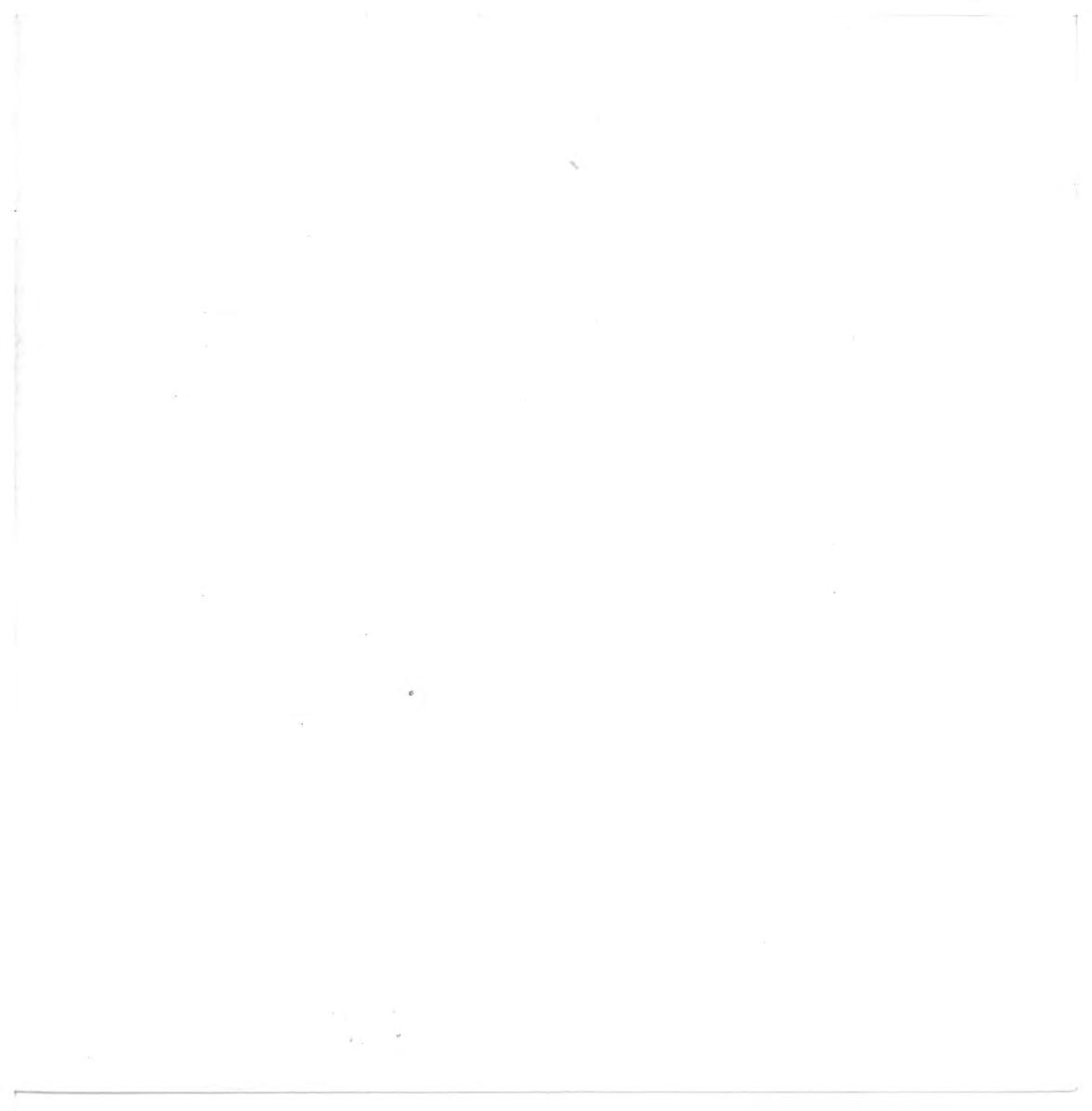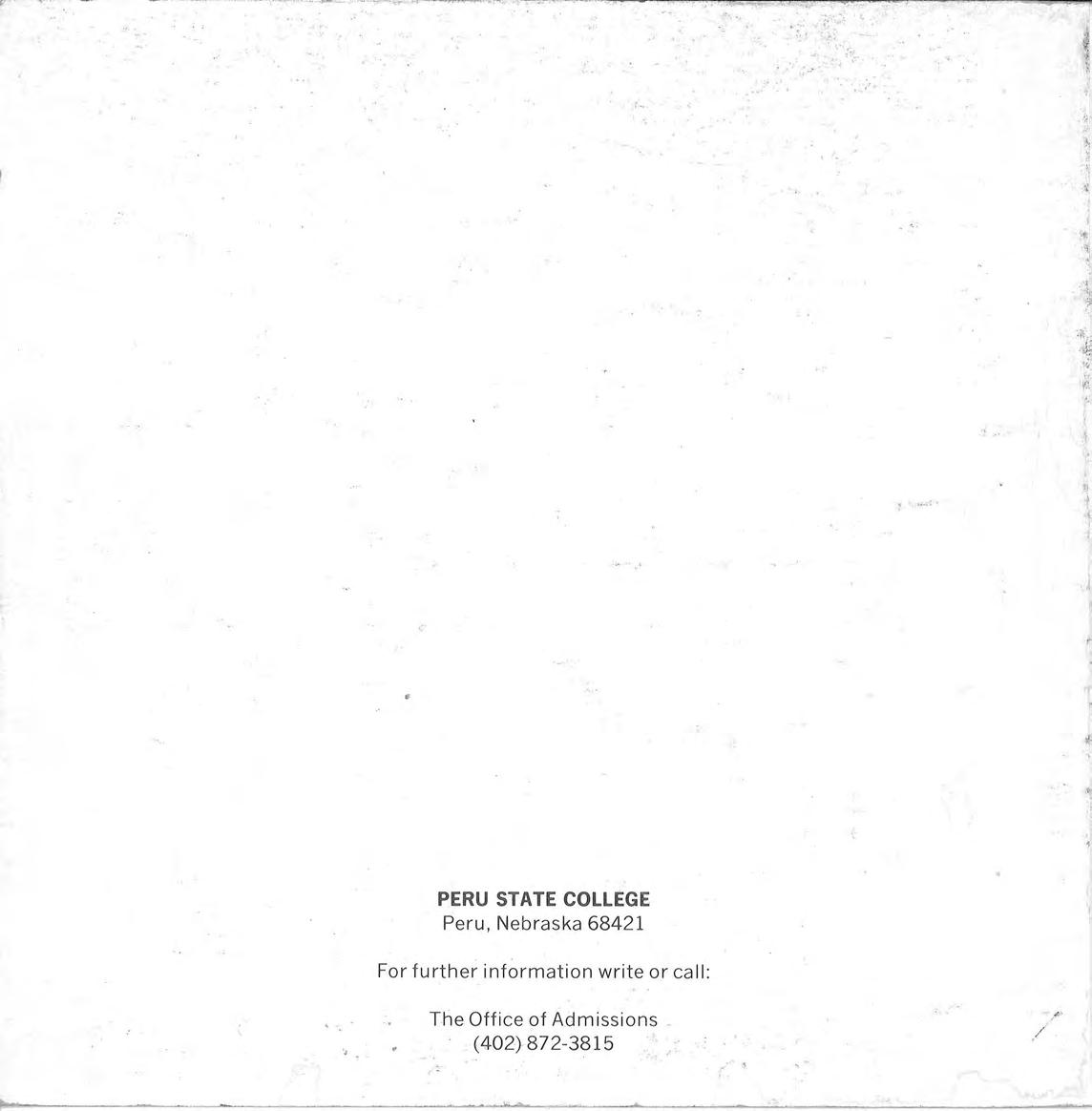PERU /TATE COLLEGE






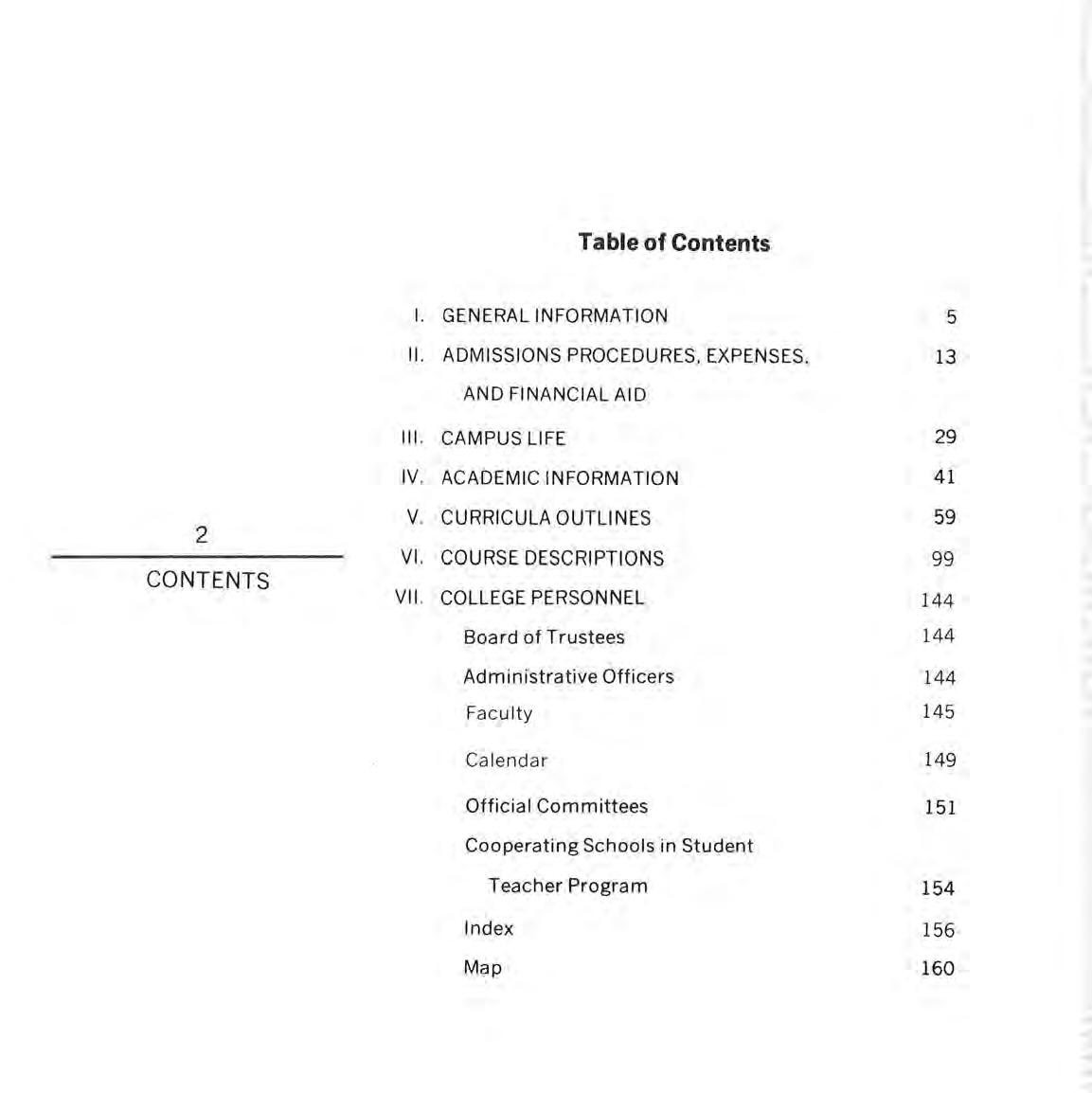
Peru State is the oldest college in Nebraska and the third oldest teacher -training institution established west of the Missouri river . Peru was founded the same year Nebraska became a state. For more than a century thousands of young people have crossed the Campus of a Thousand Oak s and have gone forth to become teachers and leaders in business and industry in Nebraska and throughout the nation.
The people of Nebraska have mad e the facilities of this College av a ilable to students at a minimum of personal cost. The taxpayers of the st a te bear a major portion of the cost of colleg e education of the students , exclusive of personal expenses .
Public institutions such as Peru State generally have an "open door" admission policy, i.e ., admit graduates of accredited high schools without special entrance examinations.
Peru State believes every young person is entitled to a chance to succeed at the collegiate level. We believe a young person with ability and a willingness to work has an excellent opportunity for success at Peru State.
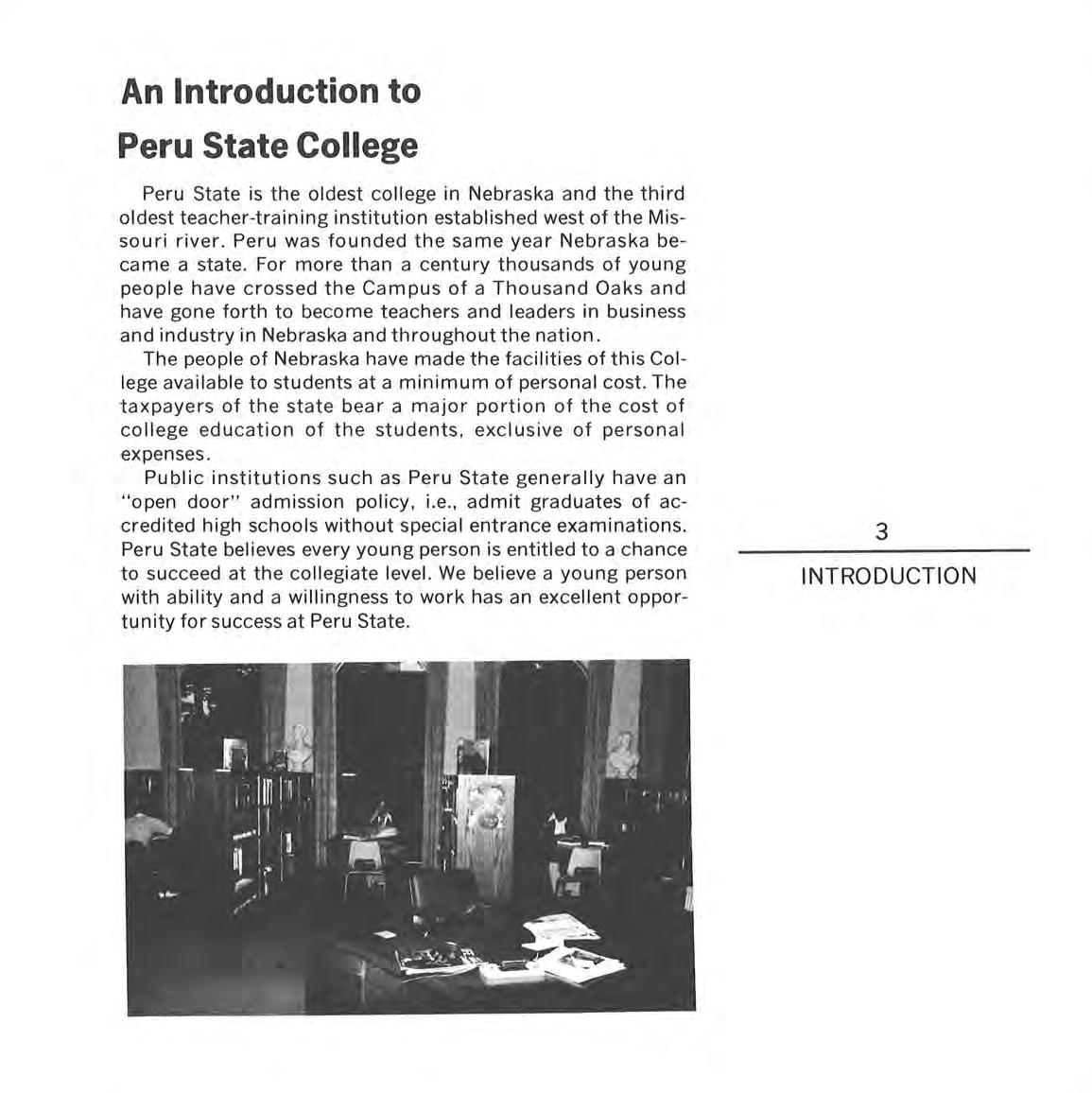
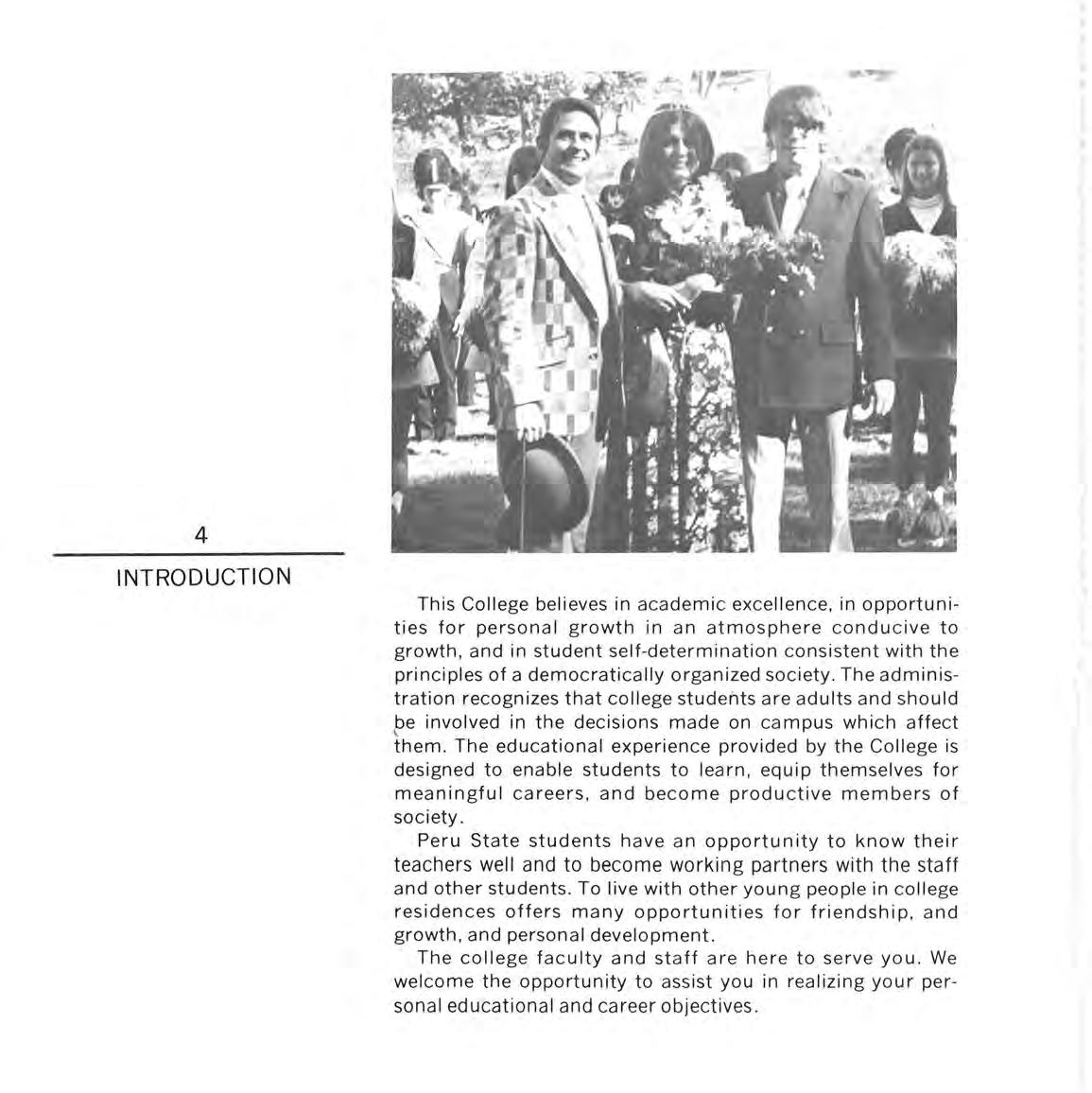
This College believes in academic exce ll ence, in opportunities for personal growth in an atmosphere conducive to growth, and in student se lf -determination cons i stent with the principles of a democratically organized soc i ety . The administration recognizes that college students are a dults and should be involv ed in the decisions made on campus which affect I them. The educational experience provided by the College is des i gned to enable students to l earn , equ ip themse lv es for meaningful careers, and become productive members of society.
Peru State students have an opportunity to know their teachers well and to become working partners with the staff and other students To live with other young people in college residences offers many opportun i ties for friendsh i p , and growth, and personal development .
The co ll ege faculty and staff are here to serve you We welcome the opportunity to assist you in rea li zing your personal educat i onal and career object iv es .
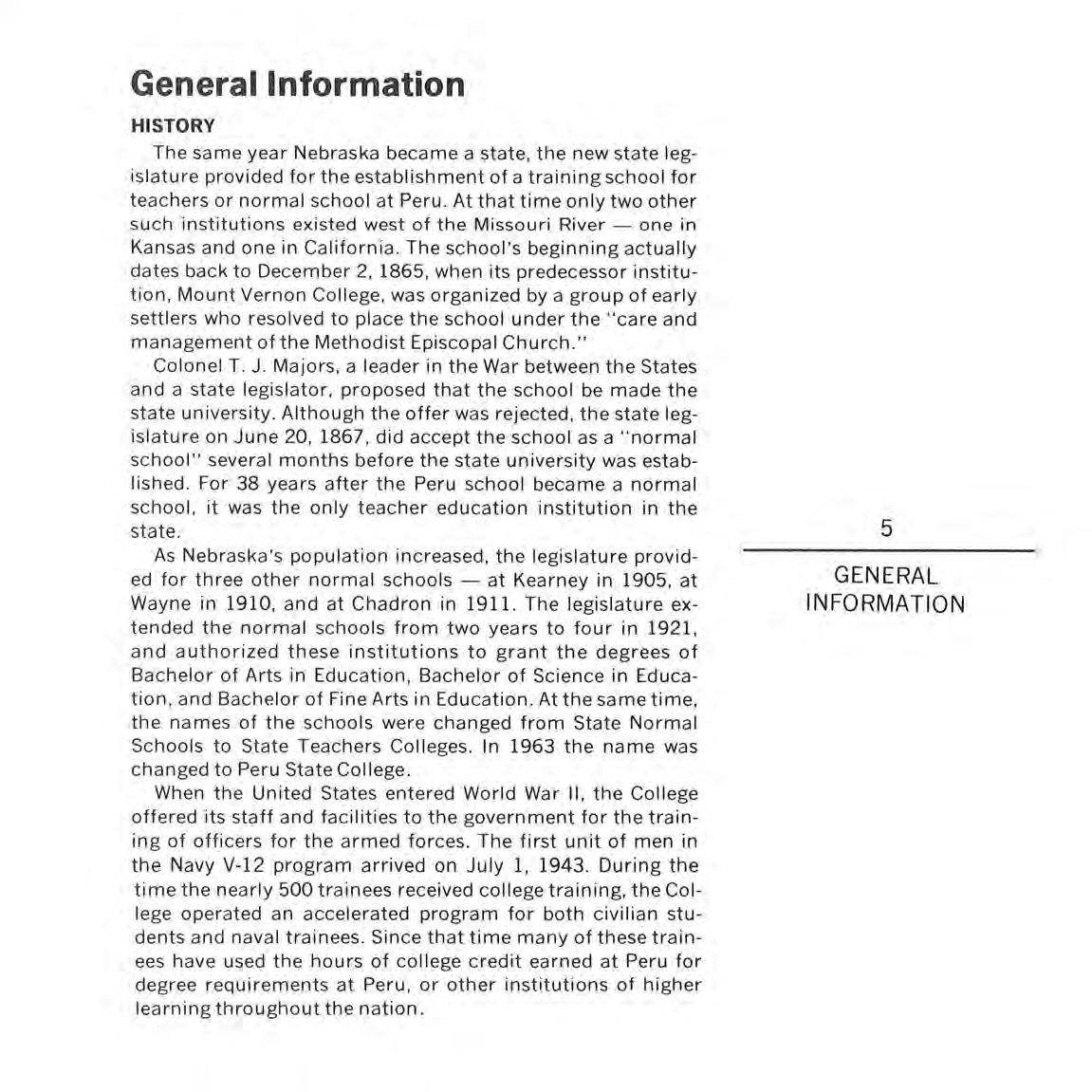
The same year Nebraska became a state, the new state legi s lature provided for the establishment of a training school for teachers or normal school at Peru. At that time only two other such institutions existed west of the Missouri River - one in Kansas and one in California . The school's beginning actually dates back to December 2, 1865, when its predecessor institution, Mount Vernon College, was organized by a group of early sett lers who resolved to place the school under the "care and management of the Methodist Episcopal Church . "
Colonel T. J. Majors, a leader in the War between the States and a state legislator , proposed that the school be made the state university . Although the offer was rejected, the state legi s latu re on June 20, 1867, did accept the school as a " normal school" several months before the state university was established For 38 years after the Peru school became a normal school, it was the only teacher education institution in the state.
As Nebraska's population increased, the legislature provided for three other normal schools - at Kearney in 1905, at Wayne in 1910, and at Chadron in 1911. The legislature extended the normal schoo ls from two years to four in 1921, and authorized these institutions to grant the degrees of Bachelor of Arts in Education, Bachelor of Science in Education, and Bachelor of Fine Arts in Education. At the same time, the names of the schoo ls were changed from State Normal Schools to State Teachers Colleges . In 1963 the name was changed to Peru State College.
When the United States entered World War II, the College offered its staff and facilities to the government for the trainin g of officers for the armed forces. The first unit of men in the Navy V- 12 program arr ived on July 1, 1943. During the time the nearly 500 trainees received college training, the Coll ege operated an acce lerated program for both civilian students and naval trainees Since that time many of these trainees have used the hours of college credit earned at Peru for degree requirements at Peru, or other institutions of higher learning throughout the nation.
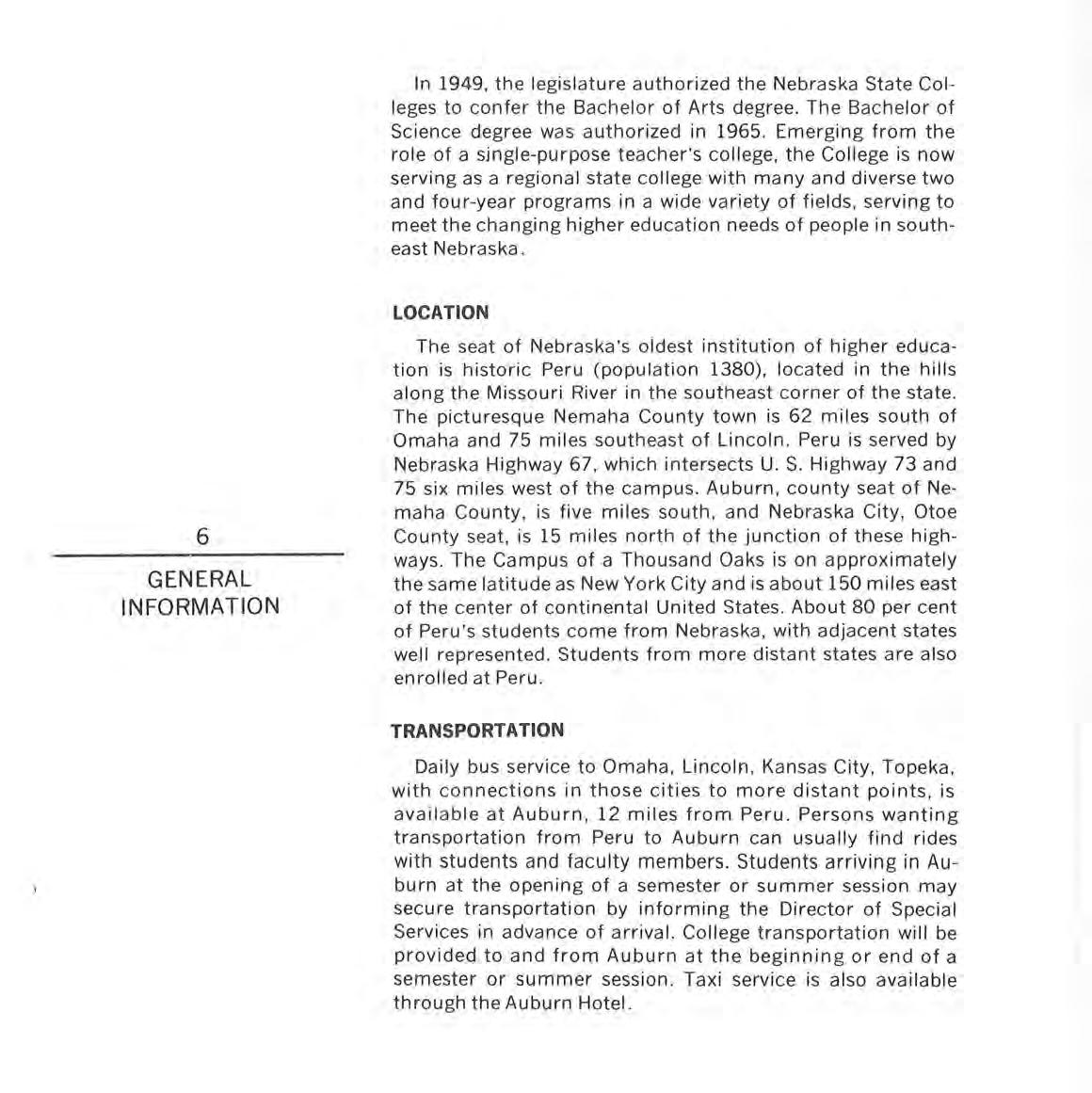
In 1949, the legislature authorized the Nebraska State Colleges to confer the Bachelor of Arts degree The Bachelor of Science degree was author ized in 1965. Emerging from the role of a sjng le -purpose teacher's college , the College is now serving as a regional state college w i th many and diverse two and four-year programs in a wide variety of fields, serving to meet the changing higher education needs of people in southeast Nebraska .
The seat of Nebraska's oldest institution of higher education is historic Peru (population 1380), located in the hills along the Missouri River in the southeast c orner of the state . The picturesque Nemaha County town is 62 miles south of Omaha and 75 miles southeast of Lincoln. Peru is served by Nebraska Highway 67, which intersects U.S. Highway 73 and 75 six miles west of the campus. Auburn, county seat of Nemaha County, is five miles south, and Nebraska City , Otoe County seat, is 15 miles north of the junction of these highways . The Campus of a Thousand Oaks is on approximate ly the same latitude as New York City and is about 150 miles east of the center of continental United States. About 80 per cent of Peru's students come from Nebraska, with adjacent states well represented. Students from more distant states are a lso en rolled at Peru
Daily bus service to Omaha, Lincoln , Kansas City, Topeka, with connections in those cities to more distant points, is available at Auburn, 12 miles from Peru. Persons wanting transportation from Peru to Auburn can usually find rides with students and faculty members. Students arriving in Auburn at the opening of a semester or summer session may secure transportation by informing the Director of Special Services in advance of arrival. Co ll ege transportation will be provided to and from Auburn at the beginning or end of a semester or summer session . Taxi service is also available through the Auburn Hotel.
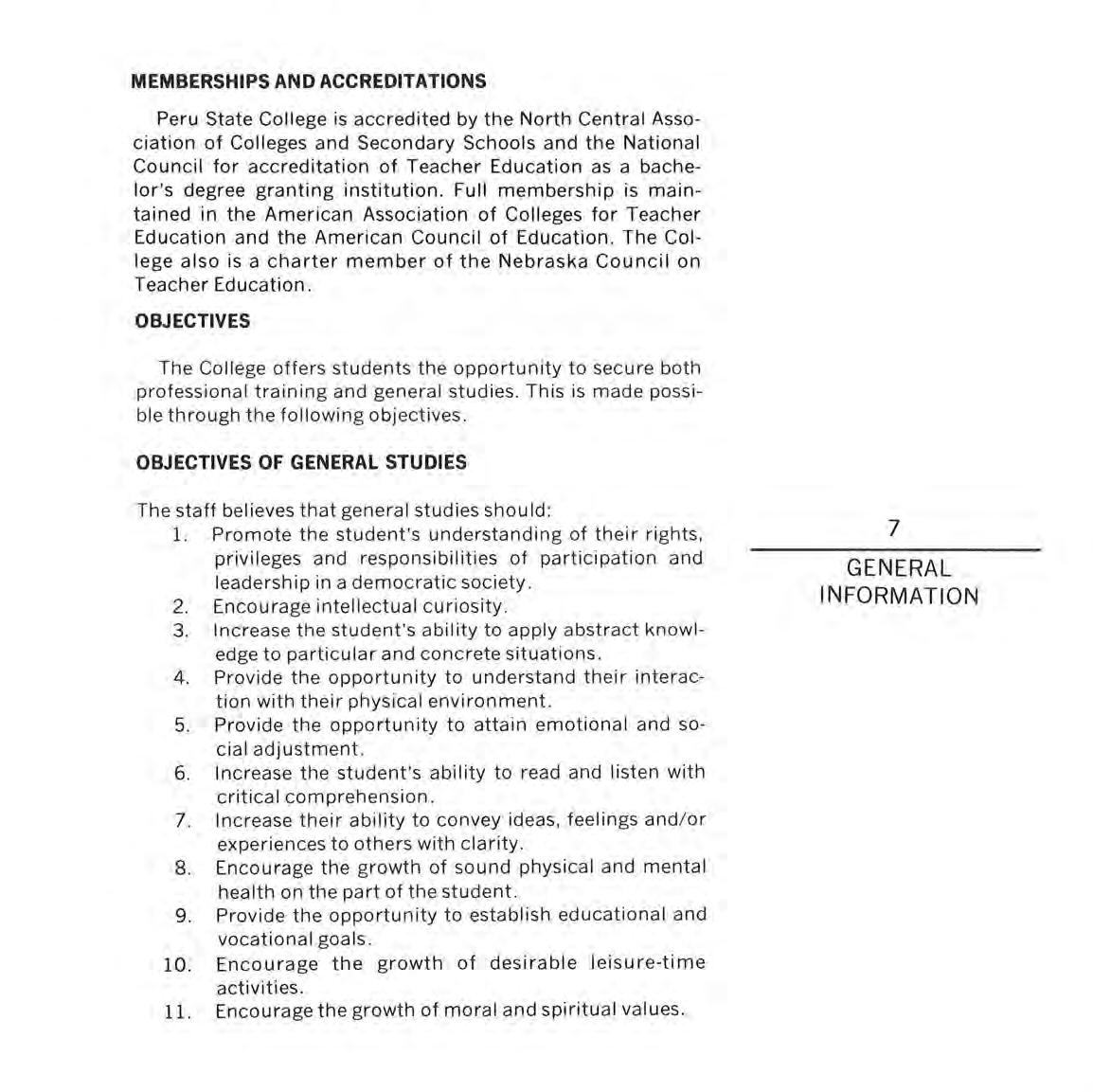
Peru State College is accredited by the North Central Association of Colleges and Secondary Schools and the National Council for accreditation of Teacher Education as a bachelor's degree granting institution . Full membership is maintained in the American Association of Colleges for Teacher Education and the American Council of Education. The College also is a charter member of the Nebraska Council on Teacher Education.
The College offers students the opportunity to secure both professional training and general studies This is made possible through the following objectives.
The staff believes that general studies should:
1. Promote the student ' s understanding of their rights, privileges and responsibilities of participation and leadership in a democratic society .
2. Encourage intellectual curiosity.
3 . Increase the student ' s ability to apply abstract knowledge to particular and concrete situations .
4. Provide the opportunity to understand their interaction with their physical environment
5. Provide the opportunity to attain emotional and social adjustment.
6. Increase the student's ability to read and listen with critical comprehension.
7. Increase their ability to convey ideas, feelings and / or experiences to others with clarity .
8 . Encourage the growth of sound physical and mental health on the part of the student.
9. Provide the opportunity to establish educational and vocational goals.
10 . Encourage the growth of desirable leisure-time activities .
11. Encourage the growth of moral and spiritual values.
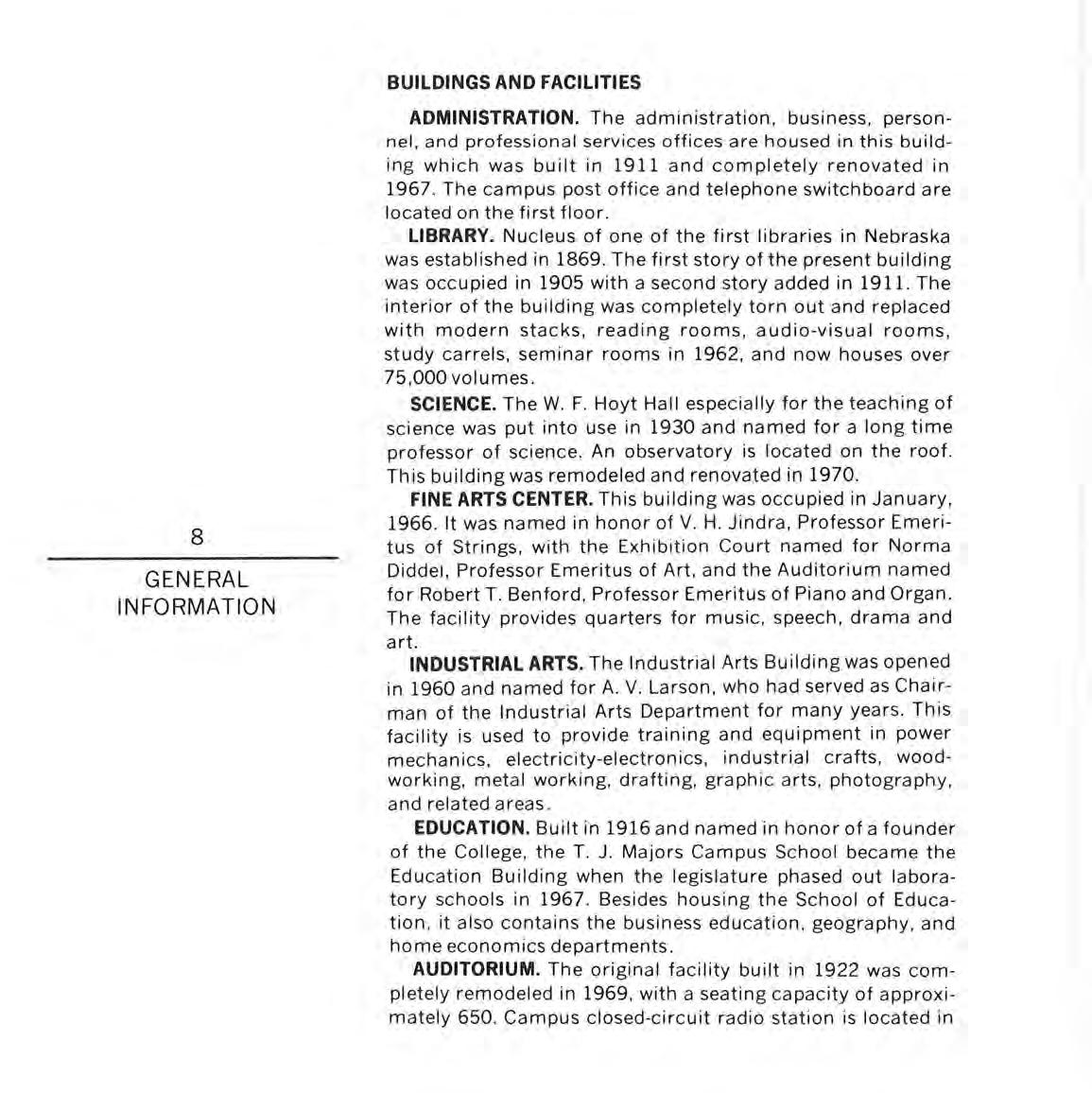
ADMINISTRATION. The administration, business, personnel, and professional services offices are housed in this buildin g which was built in 1911 and completely renovated in 1967 . The campus post office and telephone switchboard are located on the first floor .
LIBRARY. Nucleus of one of the first libraries in Nebraska was established in 1869 . The first sto r y of the present building was occupied in 1905 with a second story added in 1911. The interior of the building was completely torn out and replaced with modern stacks, reading rooms, audio-visual rooms, study carrels , seminar rooms in 1962 , and now houses over 75 ,000 volumes.
SCIENCE. The W. F. Hoyt Hall especially for the teaching of science was put into use in 1930 and named for a long time professor of science . An observatory is located on the roof . This building was remodeled and renovated in 1970.
FINE ARTS CENTER. This building was occupied in January , 1966. It was named in honor of V. H. Jindr a, Professor Emeritus of Strings , with the Exhibition Court named for Norma Diddel, Professor Emeritus of Art, and the Auditorium named for Robert T . Benford, Professor Emeritus of Piano and Organ . The facility provides quarters for music, speech , drama and art.
INDUSTRIAL ARTS. The Industrial Arts Building was opened in 1960 and named for A. V Larson, who had served as Chairman of the Industrial Arts Department for many years This facility is used to provide training and equipment in power mechanics, electricity-electronics, industrial crafts, woodworking, metal working, drafting, graphic arts, photogr a phy, and related areas .
EDUCATION. Built in 1916 and named in honor of a founder of the College , the T J Majors Campus School became the Education Building when the legislature phased out laboratory schools in 1967 Besides housing the School of Education, it also contains the business education , geography, and home economics departments
AUDITORIUM. The original facility built in 1922 was completely remodeled in 1969 , with a seating capacity of approximately 650. Campus closed-circuit radio station is located in
the south wing over the lobby .
GYMNASIUM. The gymnasium evolved from remodeling of the original College Chapel building in 1921, through reconstruction projects in 1928 and 1949, to the present facility which houses two basketball floors, gymnastics and wrestling rooms, tile swimming pool, locker and shower rooms for men and women, as well as physical education offices and c lassrooms.
OAK BOWL. Concrete seats were built on the west side of a natural bowl in 1915, to provide seating for more than 2,500 spectators at athletic events. Complete dressing rooms for home and visiting teams were added to the area in 1968. Surfaced tennis courts are south of the Oak Bowl; the baseball diamond is north of the playing field .
HEALTH CENTER. The Student He alth Service, which provides first aid treatment and hospitilization for students needing emergency medical care, operates in the Health Center . A registered nurse is in residence at the Center and works under the direction of the College physician.
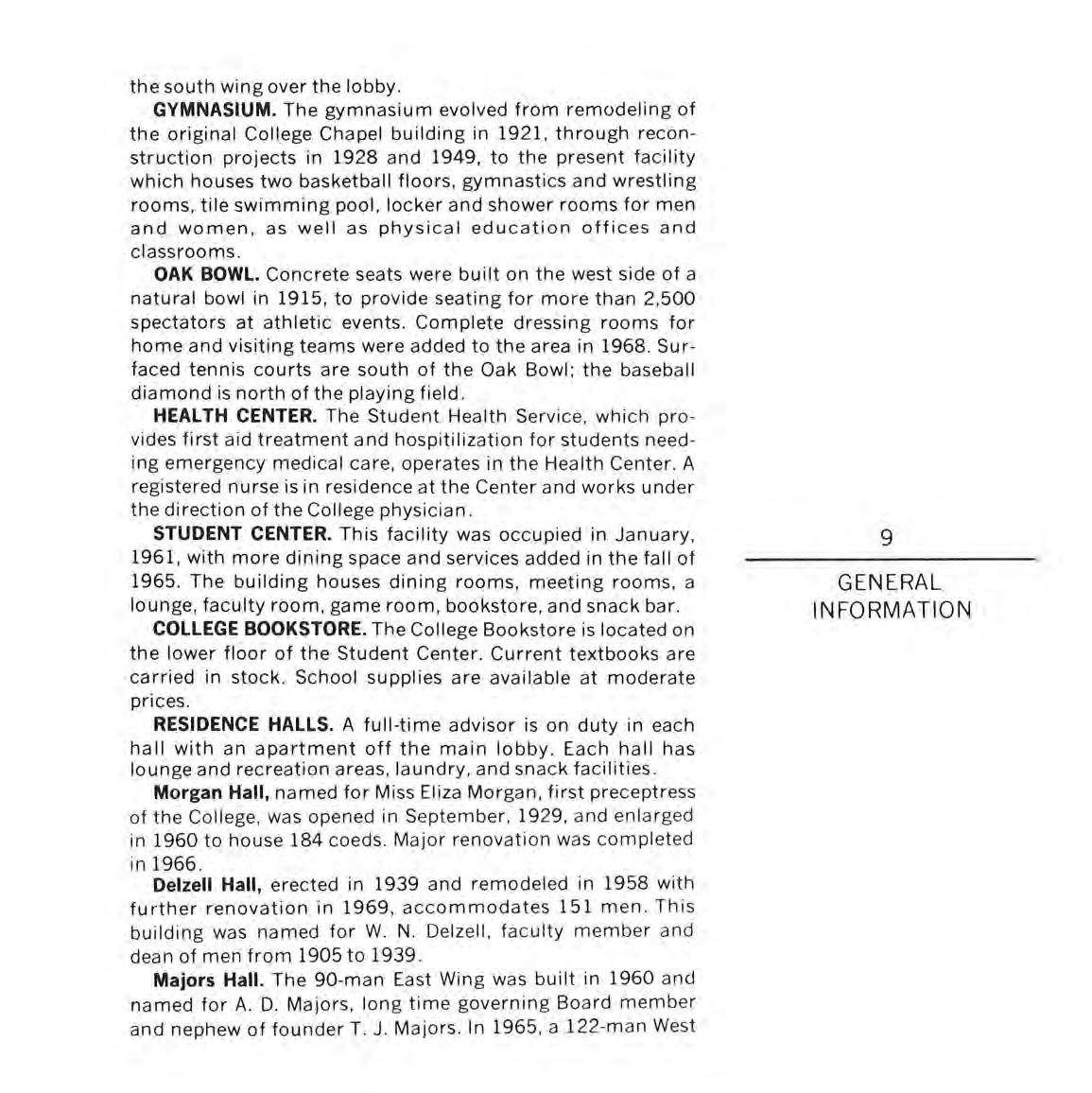
STUDENT CENTER. This facility was occupied in Janu ary, 1961, with more dining space and services added in the fall of 1965 The building houses dining rooms, meeting rooms, a lounge , faculty room, game room, bookstore, and snack bar .
COLLEGE BOOKSTORE. The College Bookstore is loc ated on the lower floor of the Student Center. Current textbooks are carried in stock . School supplies are available at moderate prices .
RESIDENCE HALLS. A full-time advisor is on duty in each hall with an apartment off the main lobby . Each hall has lounge and recreation areas, laundry, and snack facilities.
Morgan Hall, named for Miss Eliza Morg an, first preceptress of the College, was opened in September, 1929, and en l arged in 1960 to house 184 coeds . Major renovation was completed in 1966.
Delzell Hall, erected in 1939 and remodeled in 1958 with further renovation in 1969, accommodates 151 men. This building was named for W. N. Delzell, faculty member and dean of men from 1905 to 1939.
Majors Hall. The 90-man East Wing was built in 1960 and named for A. D. Majors, lon g time governing Board member and nephew of founder T. J. Majors. In 1965, a 122-man West
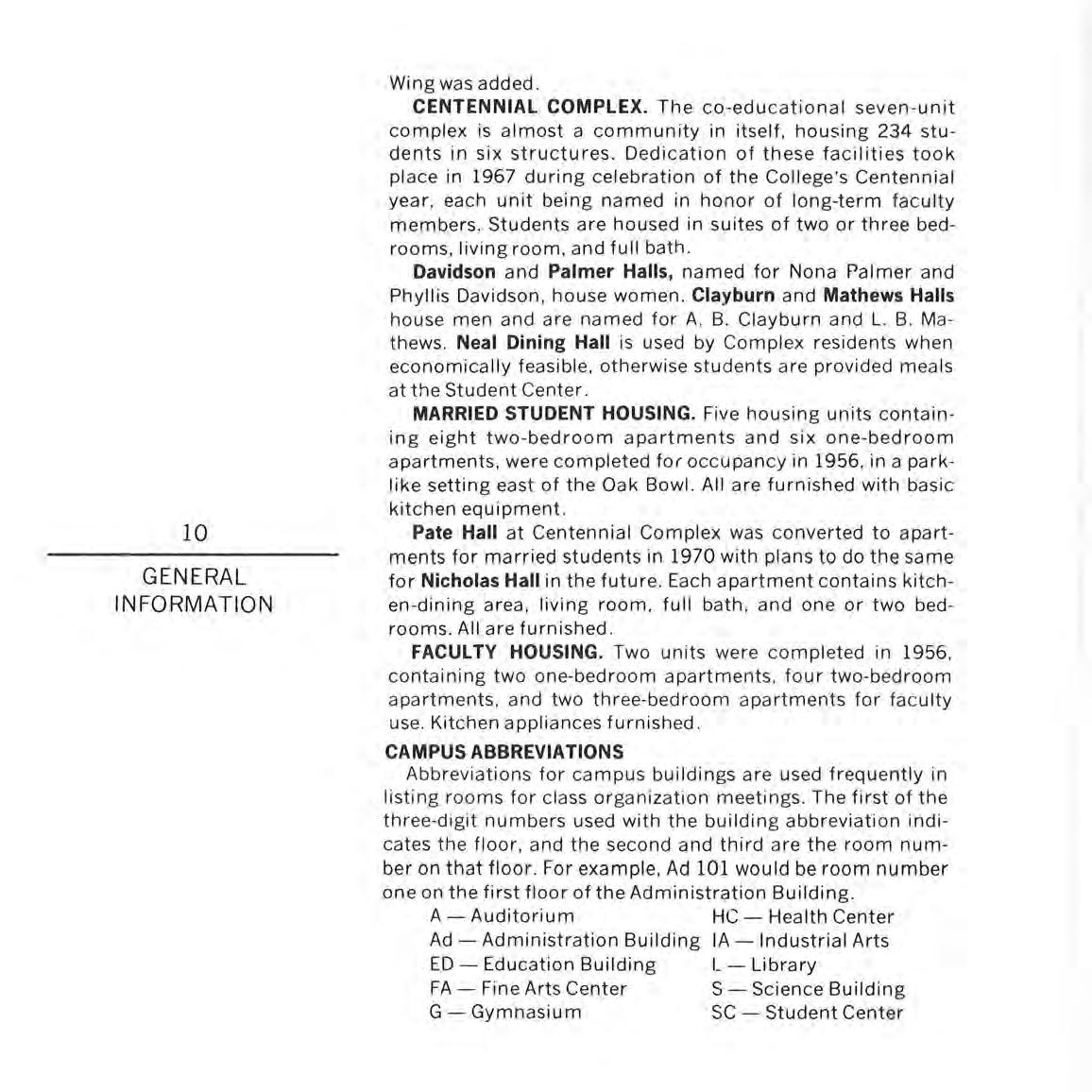
Wing was added .
CENTENNIAL COMPLEX. The co-educational seven-unit complex is almost a community in itself, housing 234 students in six structures. Dedication of these facilities took place in 1967 during celebration of the College's Centennial year, each unit being named in honor of long -term faculty members. Students are housed in suites of two or three bedrooms , living room , and full bath .
Davidson and Palmer Halls, named tor Nona Palmer and Phyllis Davidson, house women . Clayburn and Mathews Halls house men and are named tor A. B . Clayburn and L. B. Mathews Neal Dining Hall is used by Complex residents when economically feasible , otherwise students a re provided meals at the Student Center.
MARRIED STUDENT HOUSING. Five housing units containing eight two-bedroom apartments a nd six one-bedroom apartments, were completed tor occupancy in 1956, in a parklike setting east of the Oak Bowl. All are furnished with basic kitchen equipment
Pate Hall at Centennial Complex was converted to apartments tor married students in 1970 with plans to do the same tor Nicholas Hall in the future . Each apartment contains kitchen-dining area, living room , full bath, and one or two bedrooms . All are furnished.
FACULTY HOUSING. Two units were completed in 1956 , containing two one-bedroom apartments, tour two-b edroom apartments, and two three - bedroom apartments tor faculty use. Kitchen appliances furnished .
Abbreviations for campus buildings are used frequently in listing rooms tor class organization meetings The first of the three-digit numbers used with the building ab breviation indicates the floor , and the second and third a re the room number on that floor . For example, Ad 101 would be room number one on the first floor of the Administration Building.
A-Auditorium
Ad - Administration Building
ED - Education Building
FA - Fine Arts Center
G - Gymnasium
HC - Health Center
IA - Industrial Arts
L - Library
S - Science Building
SC - Student Center
Peru Alumni Association membership includes a ll graduates and former students of Peru State College. Each year, luncheons, receptions , and reunions are sponsored. Local alumn i chapters, organized in Omaha and Lin coln in 1955, in Denver in 1957, in Berkeley, Caiifornia in 1958, in Los Angeles in 1961 , a nd the 1000 Oaks Chapter in Peru , Nebraska in 1973 , sponsor activities in their areas with the assistance of the a lumni office.
The 50-year c lass reunion , a tradition at commencement, and the 25 and 40-year class reunions at Homecoming are arranged by the a lumni office. Since 1969 , reunions have been planned for the 60-and 70-y ear c lasses at commencement. At Home com in g special invitations are extended to c lasses of five-year intervals for the a lumni lun cheon.
The Alumni Office. Located in the Administration Building, the office maintains a file of al l graduates and many former students. Degree and diploma recipients are filed by c lasses as well as alphabetically and geographica lly A co ll ect i on of yearbooks, commencement programs, a lumni publications and other memorabilia i s housed in the Services Building. The office cooperates with the Library in m aintenance of archival materia Is in the special co lle ction room of the Libr ary.
The Peru Stater. The College publishes The Peru Stater, which is distributed in Npvember and May to a lumni , former students, and friends of the Colle ge. The Director of Peru Achievement Foundation edits and publishes the m agaz in e.
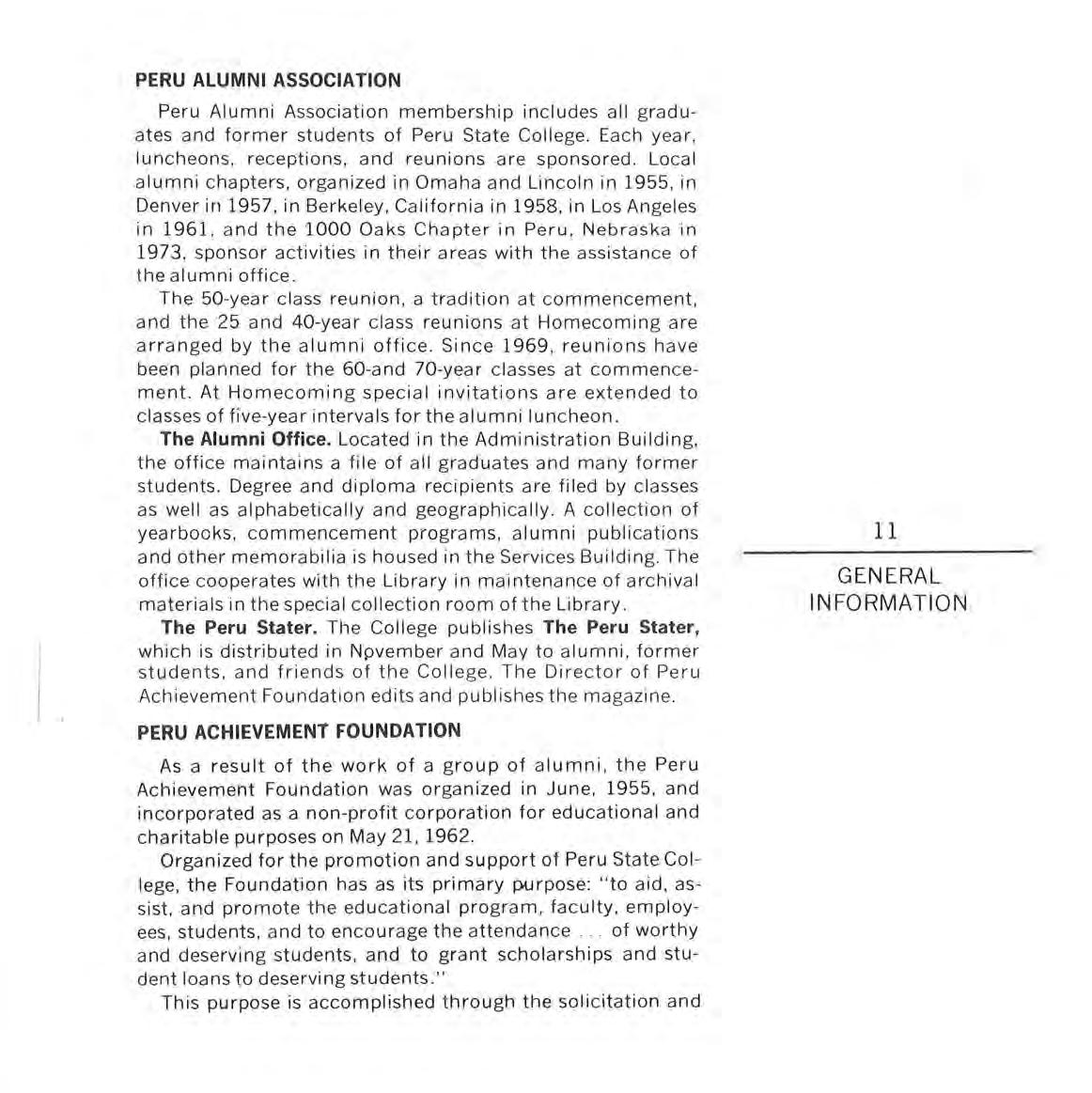
As a result of the work of a group of alu mni , the Peru Achievement Foundation was organized in June, 1955, and incorpor ated as a non-profit corporation for educational and charitable purposes on May 21, 1962.
Organized for the promotion and support of Peru State College, the Foundation has as its primary purpose: "to aid, assist, and promote the educational program, faculty, emp loyees, students, and to encourage the attendance . . of worthy and deserving students, and to grant scholarships and student lo ans to deserving students ."
This purpose is accomp lished through the solicitation and
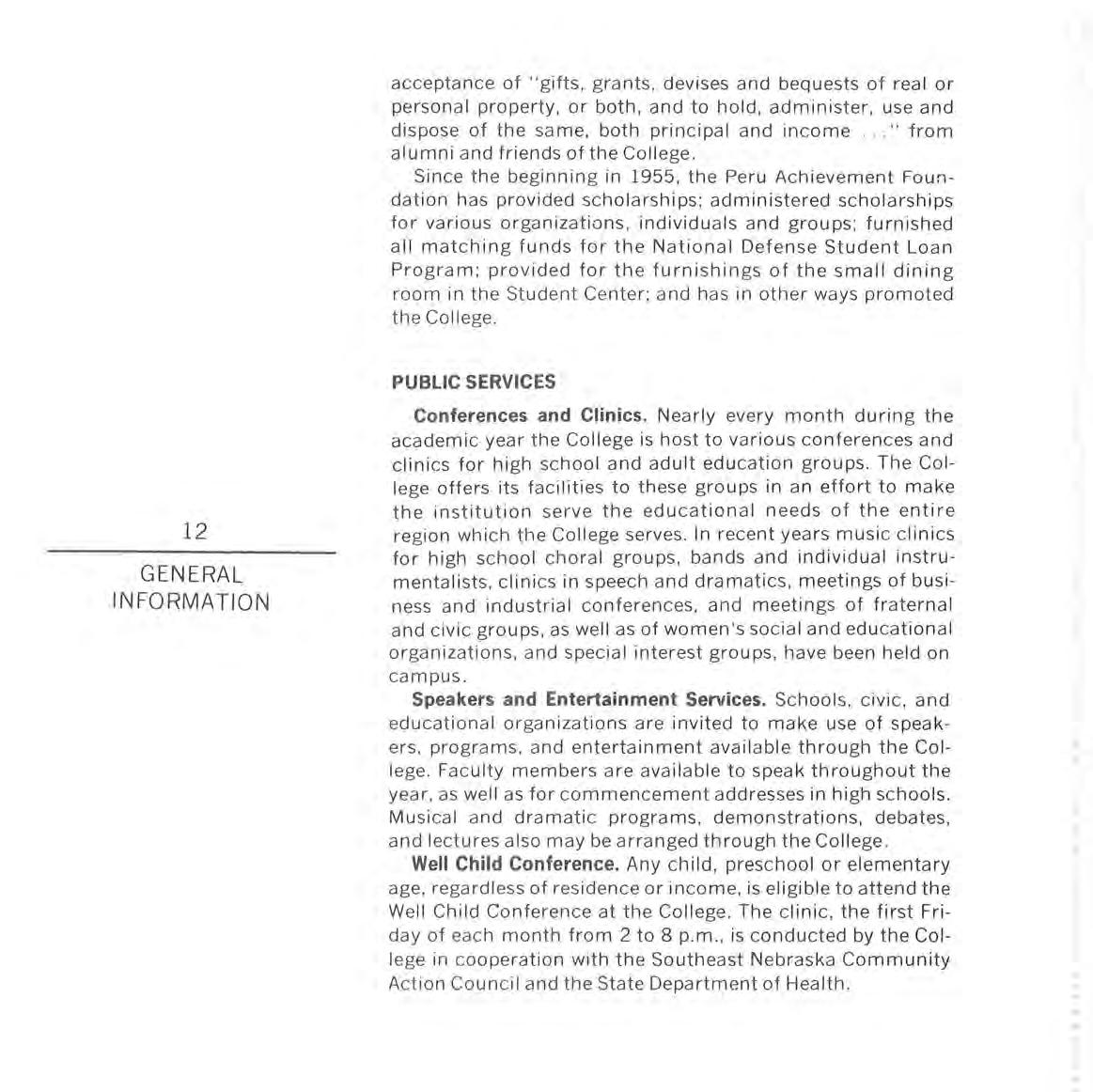
acceptance of "gifts, grants, devises and bequests of real or personal property, or both, and to h o ld , administer, use a nd dispose of the same, both principa l and income .. . " from a lumni and friends of the College.
Since the beginning in 1955, the Peru Achievement Foundation has provided scho l arsh ip s; administered sc hol ars hips for various organizations, individuals and groups; furnished a ll matching funds for the National Defense Student Loan Program; provided for the furnishings of the small dining room in the Student Center; and has in other ways promoted the College .
Conferences and Clinics. Nearly every month during the academic year the Col l ege is ho st to various conferences and c lini cs for high schoo l and adu lt education groups. The Co llege offers its faci liti es to these groups in a n effort to make the institution serve the educat i ona l needs of the entire region which the Col l ege serves. In recent years music c lini cs for high school chora l groups, bands and individual instrumentalists, c lini cs in speech and dramatics, meetings of business and industrial conferences, and meetings of fraternal and civic groups, as well as of women's soc i a l and ed u cat ion a l organizations, and spec i al interest groups, have been held on campus.
Speakers and Entertainment Services. Schoo l s, c ivi c, and educat i onal organ i zat i ons are invited to make use of s peakers, programs, and entertainment avai lab l e through the Co llege. Faculty members are avai l ab l e to speak throughout the year, as wel l as for commencement addresses in hi g h schoo ls. Musical and dramatic programs, demonstrations, debates, and lectures also may be arranged through the College.
Well Child Conference. Any chi ld , preschool or elementary age , regard l ess of residence or in come, is e li gible to attend the Well Child Conference at the College. The c lini c, the first Friday of each month from 2 to 8 p . m., is conducted by the College in cooperation with the Southeast Nebraska Community Action Council and the State Department of Health.
A A
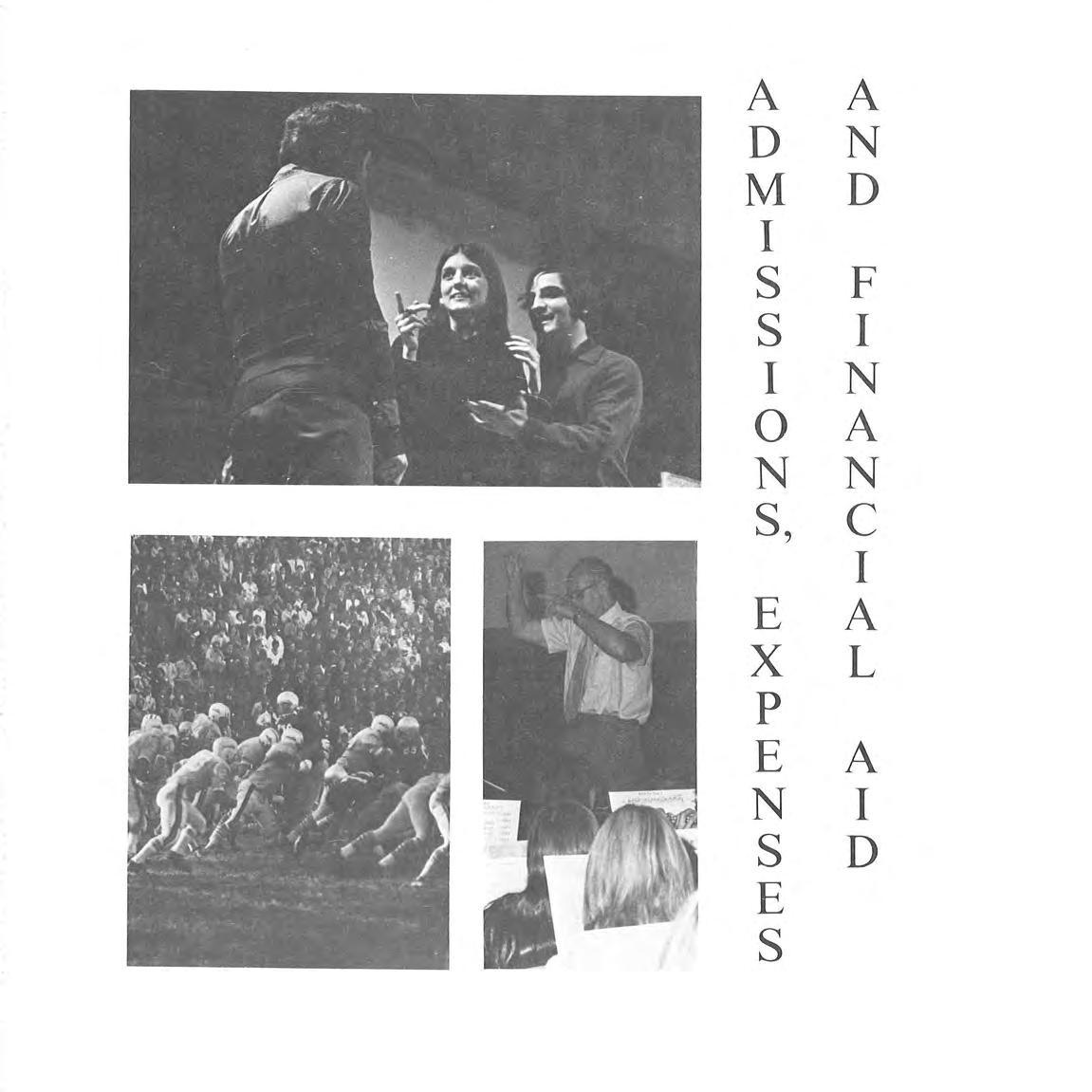
D N
M D I
s F s I
I N 0 A N N S, C I
E A X L p E A N I s D E s
A
N M D I S F S I I N 0 A N N S, C I E A X L p E A N I S D E s
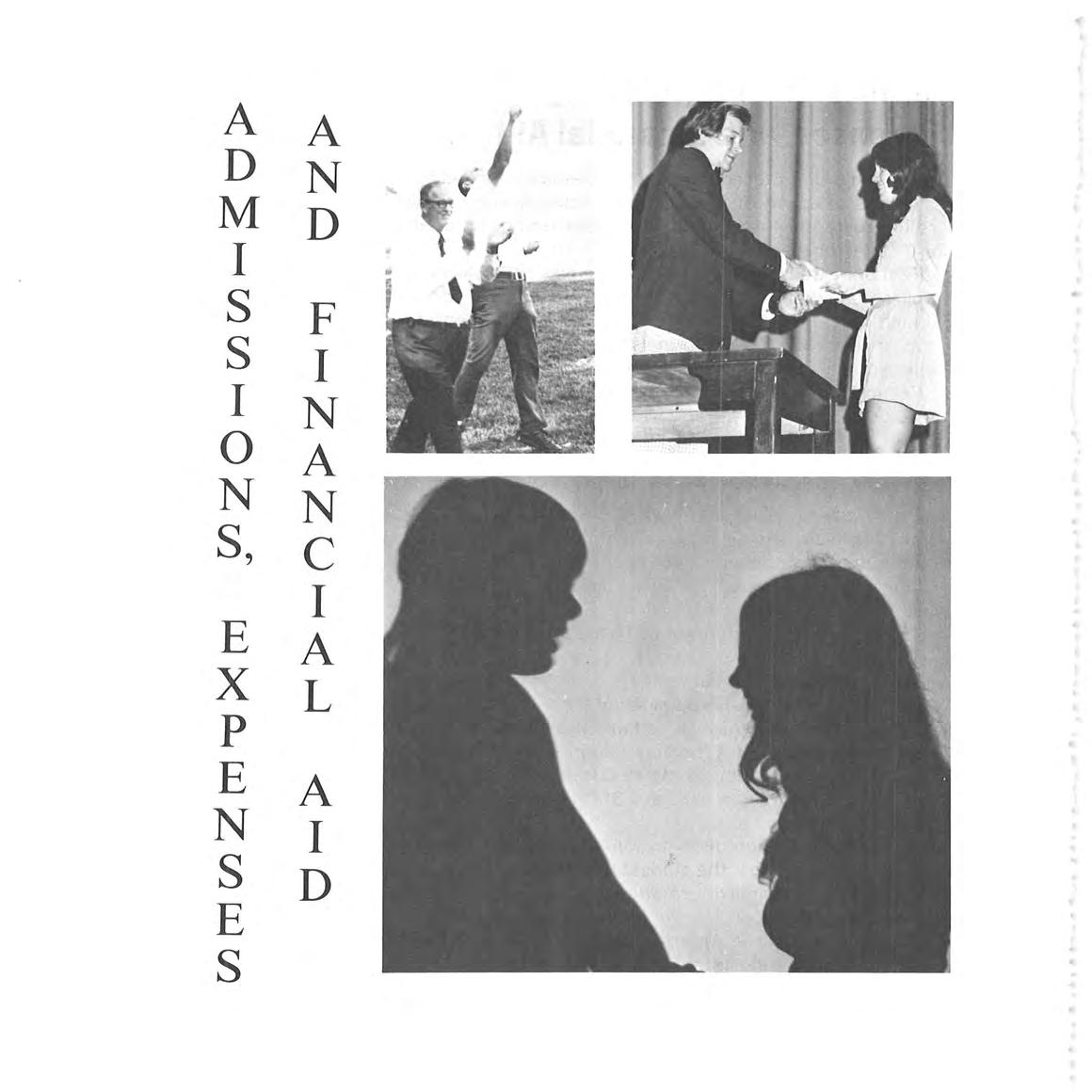
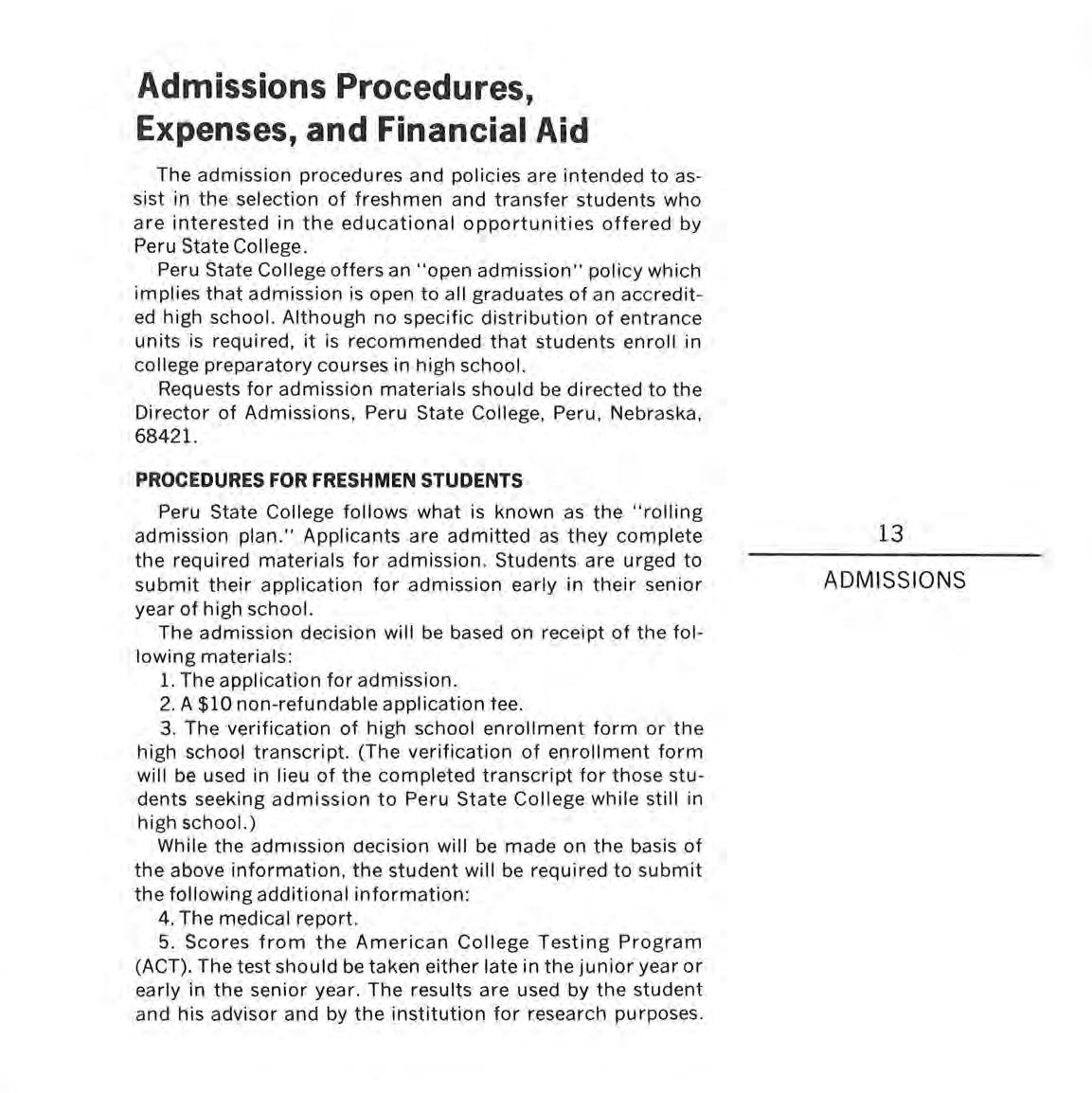
The admission procedures and policies are intended to assist in the selection of freshmen and transfer students who are interested in the educational opportunities offered by Peru State College .
Peru State College offers an "open admission" policy which implies that admission is open to all graduates of an accredited high school. Although no specific distribution of entrance units is required, it is recommended that students enroll in college preparatory courses in high school
Requests for admission materials should be directed to the Director of Admissions, Peru State College, Peru , Nebraska, 68421.
Peru State College follows what is known as the "rolling admission plan." Applicants are admitted as they complete the required materials for admission. Students are urged to submit their application for admission early in their senior year of high school .
The admission decision will be based on receipt of the following materials :
1. The application for admission .
2. A $10 non-refundable application tee .
3 . The verification of high school enrollment form or the high school transcript. (The verification of enrollment form will be used in lieu of the completed transcript for those students seeking admission to Peru State College while still in high school.)
While the admission decision will be made on the basis of the above information , the student will be required to submit the following additional information:
4 . The medical report.
5. Scores from the American College Testing Program (ACT). The test should be taken either late in the junior year or early in the senior year. The results are used by the student and his advisor and by the institution for research purposes .
Information about the ACT may be obtained from your high school guidance counselor, or by writing directly to the American College Testing Program, P. 0 . Box 451, Iowa City , Iowa 52240.
6. An application for campus housing (if applicable) , and a $25 room damage deposit
7. The completed transcript. A complete (eight semesters) high school transcript must be requested from the high school principal 's office by the student. The request should be made just prior to or at the end of the student's last semester in high school.
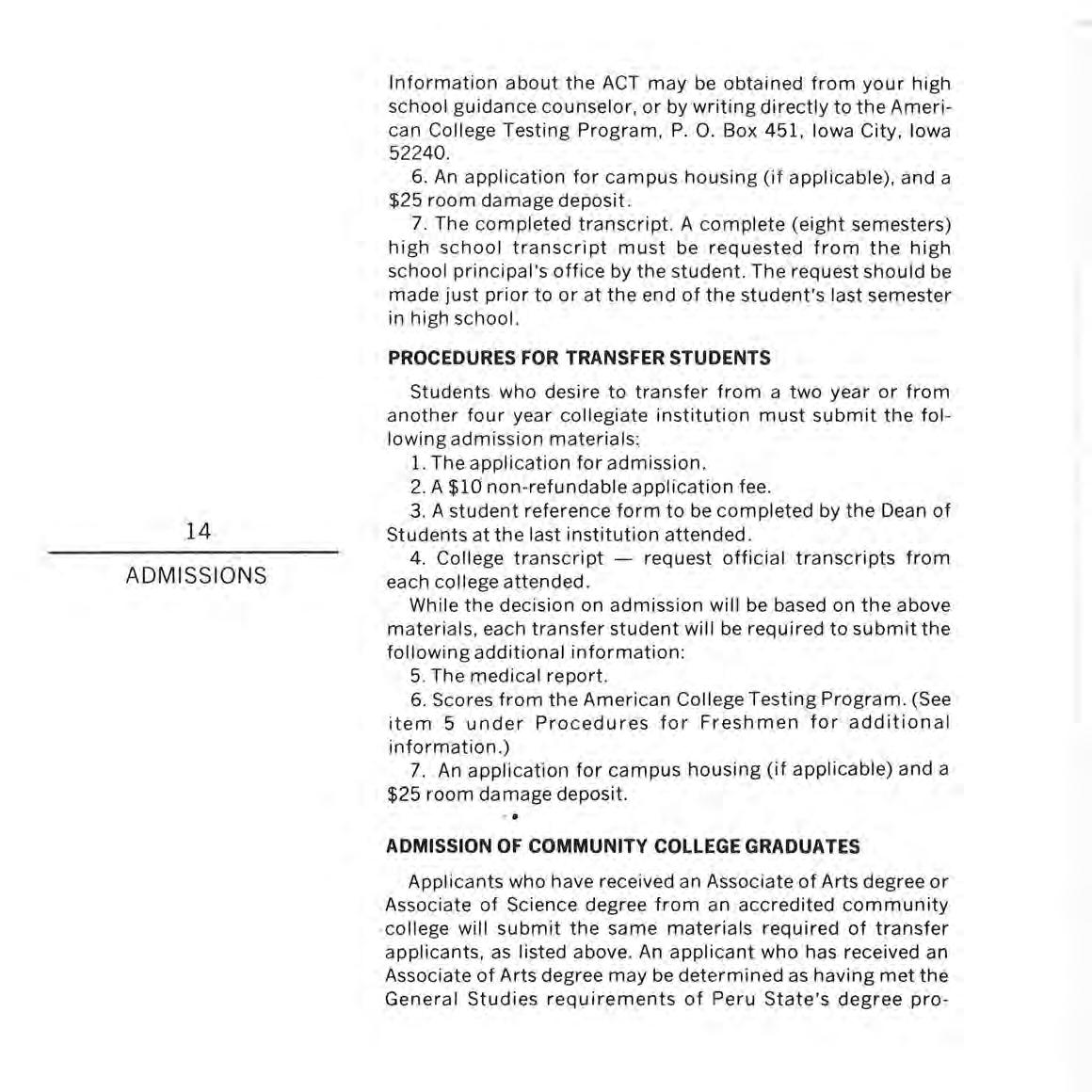
Students who desire to transfer from a two year or from another four year collegiate institution must submit the followin g admission materials :
1. The application for admission.
2. A $10 non-refundable application fee .
3 . A student reference form to be completed by the Dean of Students at the last institution attended.
4 . College transcript - request official transcripts from each college attended.
While the decision on admission will be based on the above materials, each transfer student will be required to submit the following additional information:
5 . The medical report.
6 . Scores from the American College Testing Program. (See item 5 under Procedures for Freshmen for additional information .)
7 . An application for campus housing (if applicable) and a $25 room damage deposit.
Applicants who have received an Associate of Arts degree or Associate of Science degree from an accredited community college will submit the same materials required of transfer applicants, as listed above. An applicant who has received an Associate of Arts degree may be determined as having met the General Studies requirements of Peru State's degree pro-
grams. Associate of Arts programs are reviewed and approved by the Academic Affairs Commission of Peru State College.
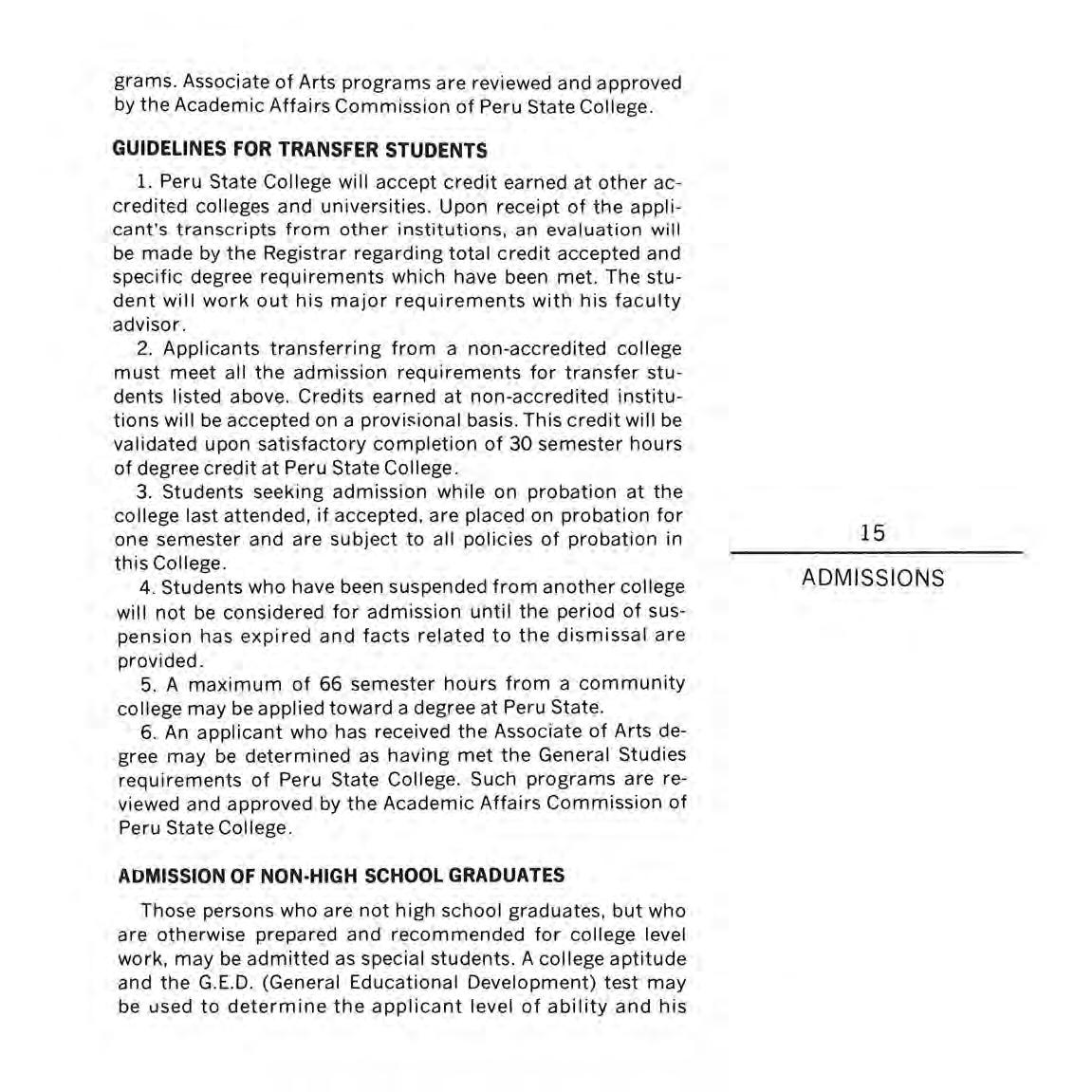
1. Peru State College will accept credit earned at other accredited colleges and universities Upon receipt of the applicant's transcripts from other institutions, an evaluation will be made by the Registrar regarding total credit accepted and specific degree requirements which have been met. The student will work out his major requirements with his faculty advisor
2. Applicants transferring from a non-accredited college must meet all the admission requirements for transfer students listed above. Credits earned at non-accredited institutions will be accepted on a provi$ional basis. This credit will be validated upon satisfactory completion of 30 semester hours of degree credit at Peru State College.
3. Students seeking admission while on probation at the college last attended, if accepted. are placed on probation for one semester and are subject to all policies of probation in this College.
4 . Students who have been suspended from another college will not be considered for admission until the period of suspension has expired and facts related to the dismissal are provided
5. A maximum of 66 semester hours from a community college may be applied toward a degree at Peru State.
6. An applicant who has received the Associate of Arts degree may be determined as having met the General Studies requirements of Peru State College . Such programs are reviewed and approved by the Academic Affairs Commission of Peru State College.
Those persons who are not high school graduates, but who are otherwise prepared and recommended for college level work, may be admitted as special students. A college aptitude and the G.E.D. (General Educational Development) test may be used to determine the applicant level of ability and his
qualification for admission. For additional information, please coritact the Registrar or Director of Admissions.
Former Peru State College students seeking readmission may obtain the necessary materials from the Registrar's office. A $10 non -refundable application fee is required of a ll app lic ants for readmission.
A student may apply for admission to Peru State College at three different academic periods:
Fall Semester -August
Spring Semester - January
Summer School -,June
Please check the calendar in the back of this publication for exact beginning dates .
A stude.nt who completes his high school program at midyear may avoid loss of time by entering Peru State at the beginning of the second semester . If this semester of work is followed with attendance in the spring "m ini -term" and the summer session , the student may be classified as a· sophomore for the following school year. Transfer students will find that the transition to Peru State at mid-year can be accomplished with minimal disruption to their educational program.
Ma triculation (p ayab le on ly once)
Tuition (Resident) $15 . 50 per semester
(15 semester hours would equal)
Non-Resident) $27 , 50per semester
(15 semest e r hours would equal) Soard
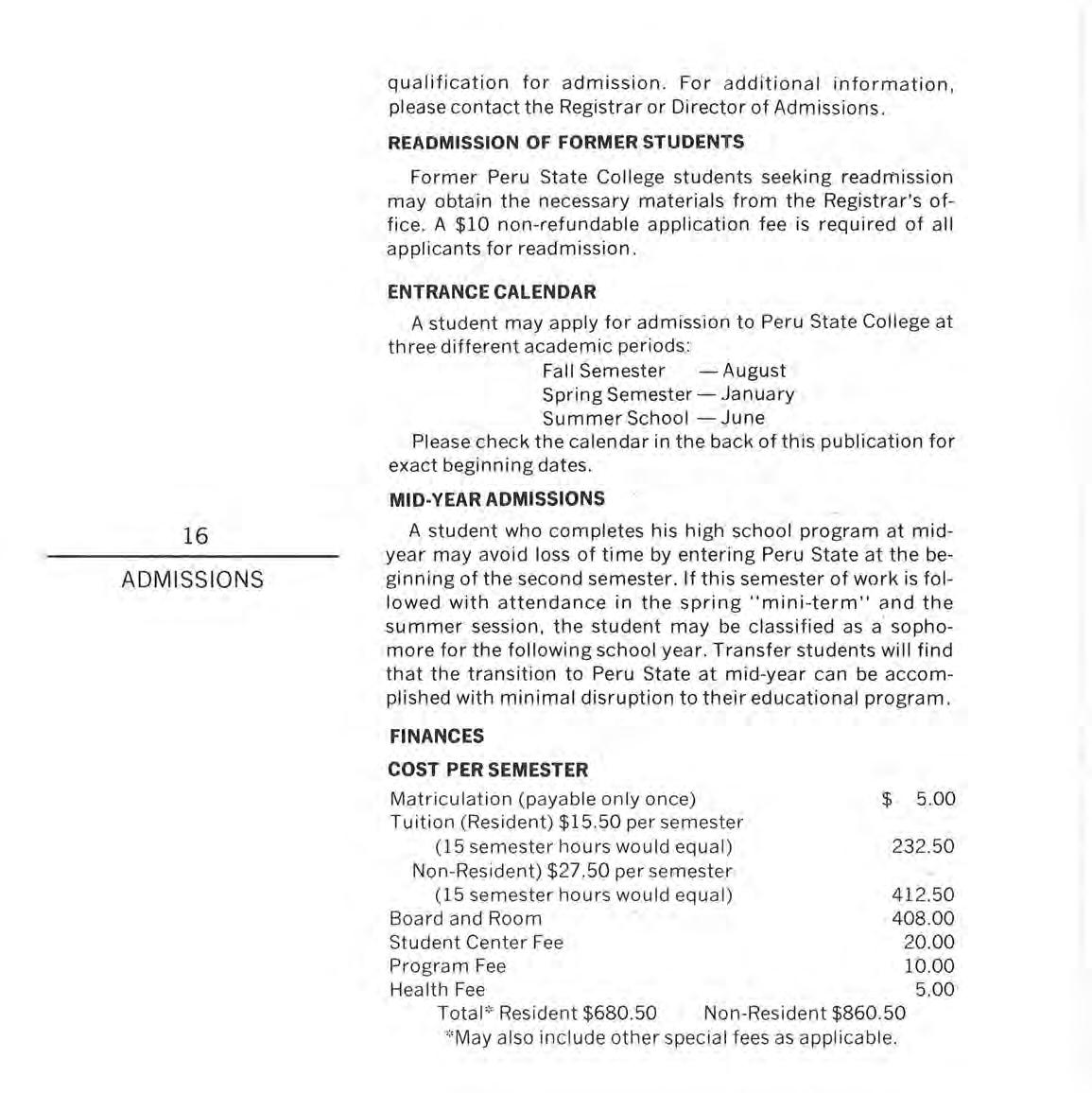
Fees must be paid at the time of registration . No person may enroll in classes, attend classes, take any examination or enroll for succeeding semesters until all fees, rents, and other financial obligations to the college have been paid .
All fees and charges may be changed at any time by the State College Board
Matriculation (non-refundable - payable only once) $5.00
Regular Session, each semester
Full time student (12 or more hours)
· Part time student (fewer than 12 hours)
Summer Session
All students each session
The Student Center Fee is not refundable.
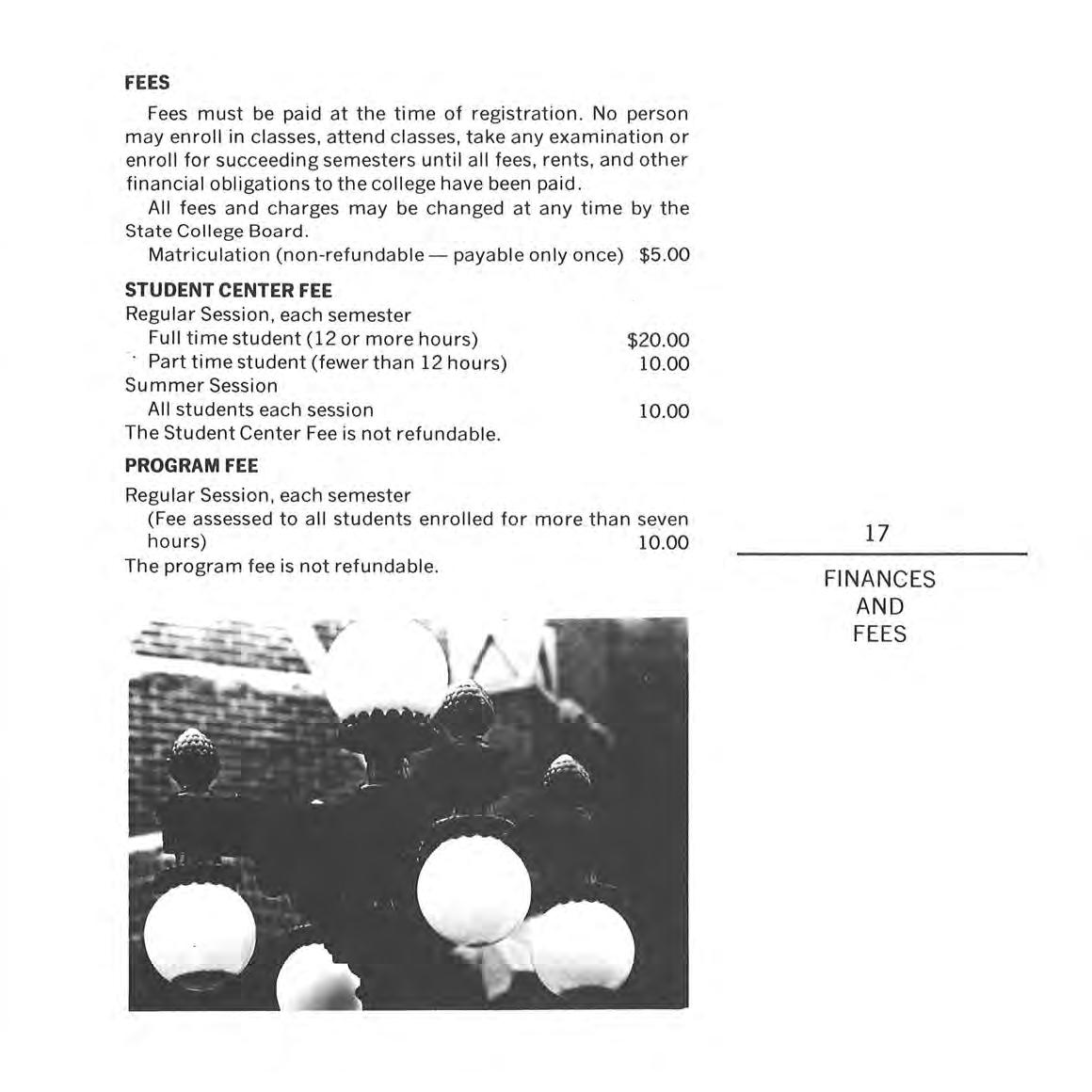
Regular Session, each semester
(Fee assessed to all students enrolled for more .than seven hours) 10.00
The program fee is not refundable .
Regular session, each semester $5.00 Summer Session 3.00
(Fee assessed to ALL students enrolled for seven or more hours in regular session)
The health fee is not refundable .
Identification Card
Late Registration (effective first day of classes)
Change of Schedule
Placement Bureau (each year service is used)
Transcript of record (after first free copy)

Graduation Fee (includes cap and gown)
Duplicate degree
Late test or make up examination
Validation of courses for credit
Automobile registration
Spouse Athletic event ticket (per semester)
Pr ivate Music Lessons (each)
Certain courses require a materials fee in addition to regular fees. ADMISSION
An admission fee of $10 must accompany all applications for admission or readmission. This fee will not be refunded .
HOUSING AND DINING
Regular sessions, each semester
Board and Room (5-day board) per semester
$408.00
If private room is contracted, add $75.00 to the above semester charges .
If housing at the Centennial Complex is desired. add $42.50 to the above semester charges .
1973 Spring Mini-session Board and room 50 .00
A student may enter into a contract with the College, enabling him to pay board and room charges in four payments each semester. Fall
Monthly payments are to be made when due. A $5 .00 late fee will be assessed on payments received five days or later after the due date.
If a student withdraws from the College before the end of a term , board and room are refundable on a pro - rated basis. Refund begins when a student is properly checked out and has surrendered his meal ticket. Students who remain in school, but move from a residence hall while under contract, will not be entitled to a refund of board and room payments . In case of illness , refund of board only will be made, providing the student has missed no less than ten (10) consecutive class days.
Married Student Housing
Oak Hill Apartments (partially furnished)
One-bedroom units, per month
Two-bedroom units , per month
( includes heat , I ight and water)
Complex Apartments (furnished)
One-oedroom units, per month
Two-bedroom units, per month (includes heat. light. and water)
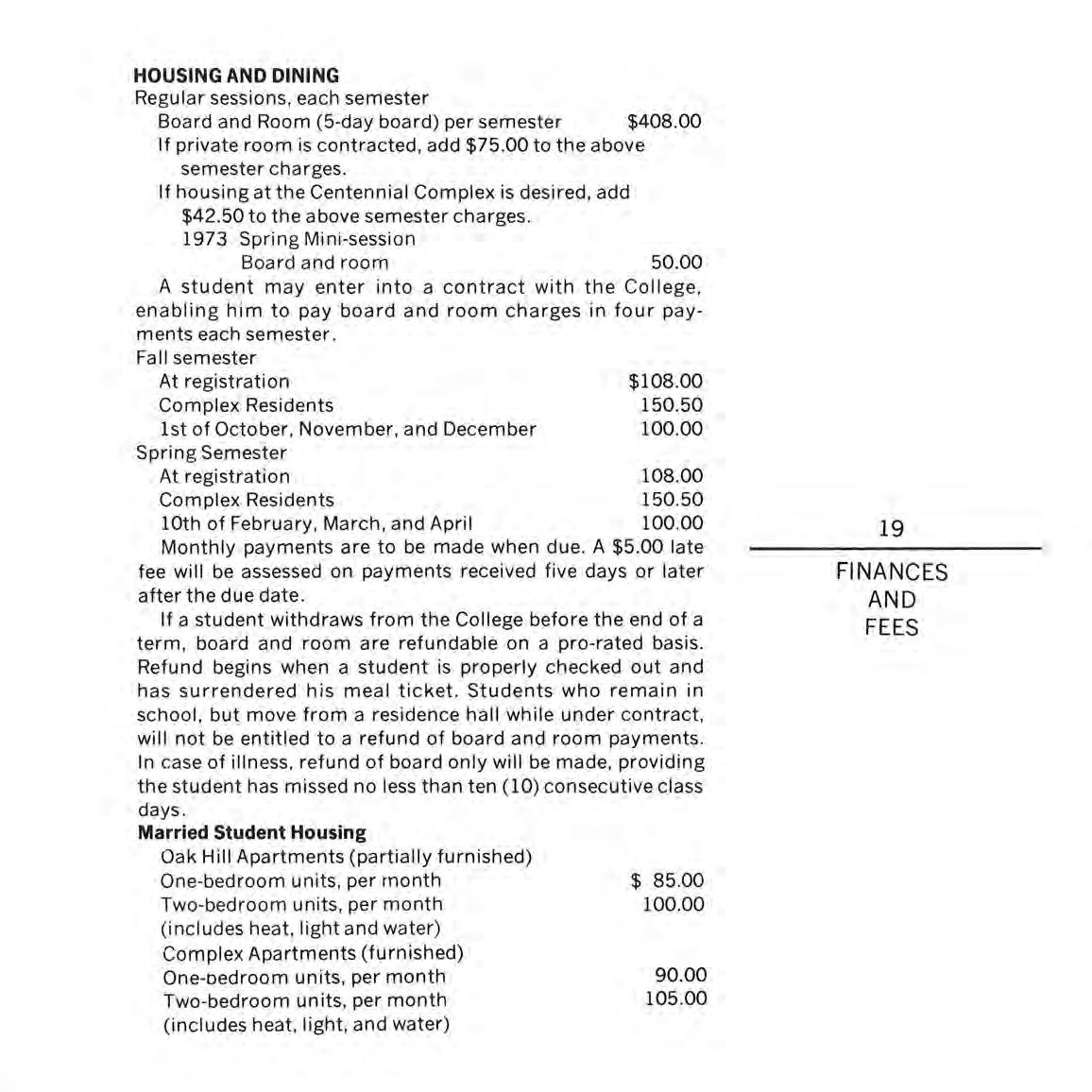
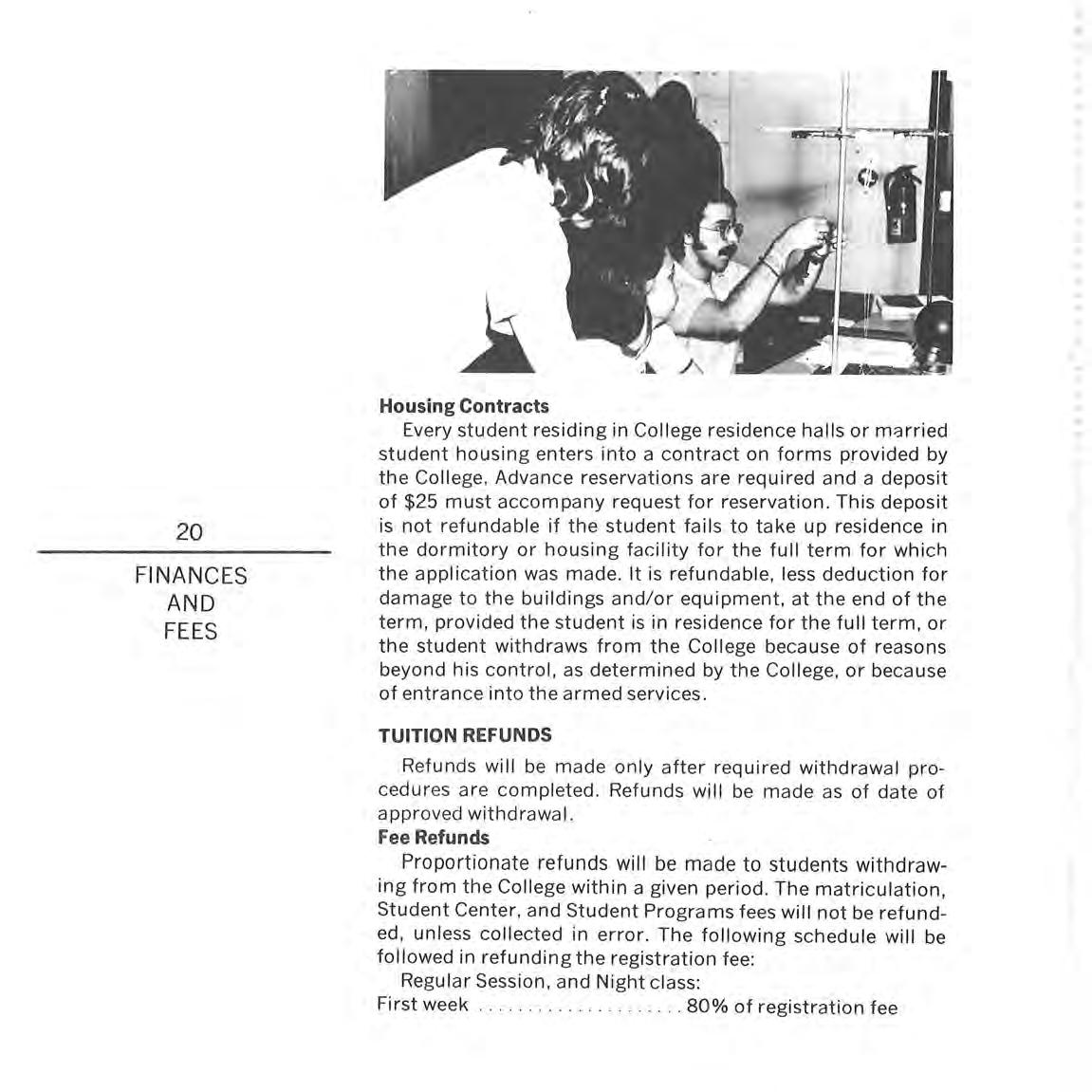
Every student residing in Col l ege residence halls or m::irried student housing enters into a contract on forms provided by the College. Advance reservations are required and a deposit of $25 must accompany request for reservation. This deposit is not refundable if the student fails to take up residence in the dormitory or housing facil ity for the full term for which the application was made. It is refundab l e, l ess deduction for damage to the build in gs and/or equ ipm ent, at the end of the term, provided the student is in residence for the full term, or the student withdraws from the College because of reasons beyond his control, as determined by the Co ll ege, or because of entrance into the armed services.
Refunds wi ll be made only after required withdrawal procedures are comp leted. Refunds will be made as of date of a pp roved withd rawa I.
Proportionate refunds will be made to students withdrawing from the Co ll ege within a given period. The matriculation, Student Center, and Student Programs fees will not be refunded, unless co ll ected in error. The following schedu l e wi ll be followed in refunding the registration fee:
Regular Session, and Night Class:
First week
.......... 80% of registration fee
Second and third weeks ... . ... , 60% of registration fee
Fourth, fifth and sixth weeks . .. 40% of registration fee
After
Second
The purpose of financial assistance is to provide students with sufficient funds to meet all costs of obtaining a college education beyond whatthey and their parents are able ,to pro~ide. Thus, financial aid enables many stu dents from lo'w and middle income families to attend college who could not otherwise afford that opportunity
Any assistance granted is awarded according to the financial need . of the applicant. (Financial need is the difference between the money a student and his parents can provide ,for an education and the costs of that education ) To be considered for assistance, the applicant must demonstrate financial need .
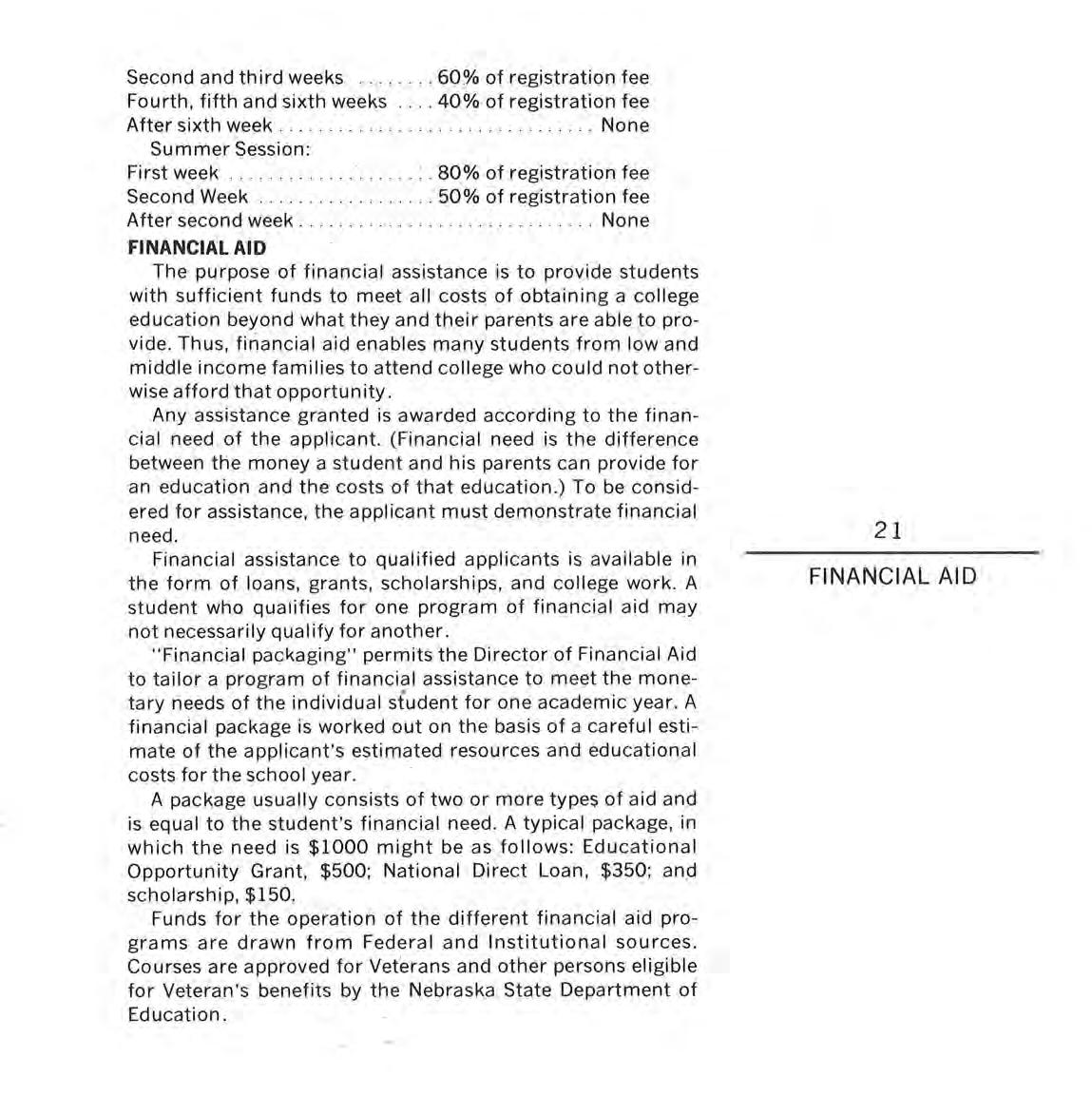
Financial assistance to qualified applicants is available in the form of loans, grants , scholarships, and college work A student who quaiifies for one program bf financial aid may not necessarily qualify for another.
" Financial packaging" permits the Director of Financial Aid to tailor a program of financial assistance to meet the monetary needs of the individual st udent for one academic year A financial package is worked out on the basis of a careful esti c mate of the applicant ' s estimated resources anq educational costs for the school year .
A package usually consists of twp or more types of aid and is equal to the student ' s financial need A typical package, in which the need is $1000 might be as .follows : Educational Opportunity Grant, $500; National Direct Loan, $350; and scholarship, $150 '
Funds for the operation of the different financial aid programs are drawn from Federal and Institutional sources . Courses are approved for Veterans and other persons eligible for Veteran's benefits by the Nebraska State Department of Education.
Any student who needs financial assistance, or desires to apply for a scholarship, should contact the Director of Financial Aid. Students are advised to begin the application procedure well before the deadline date , because establishing financial need is often a lengthy process . Applications for financial assistance for the coming year should be submitted to the Financial Aids office by April 15 .
Basic Educational Opportunity Grant - BEOG. The Higher Education Amendments of 1972 established a Basic Educational Opportunity Grant. The size of the grant is determined after considering the cost of attending the college and the Family Educational cost contribution . This family contribution is determined from a Financi a l Statement which is a part of the Application .
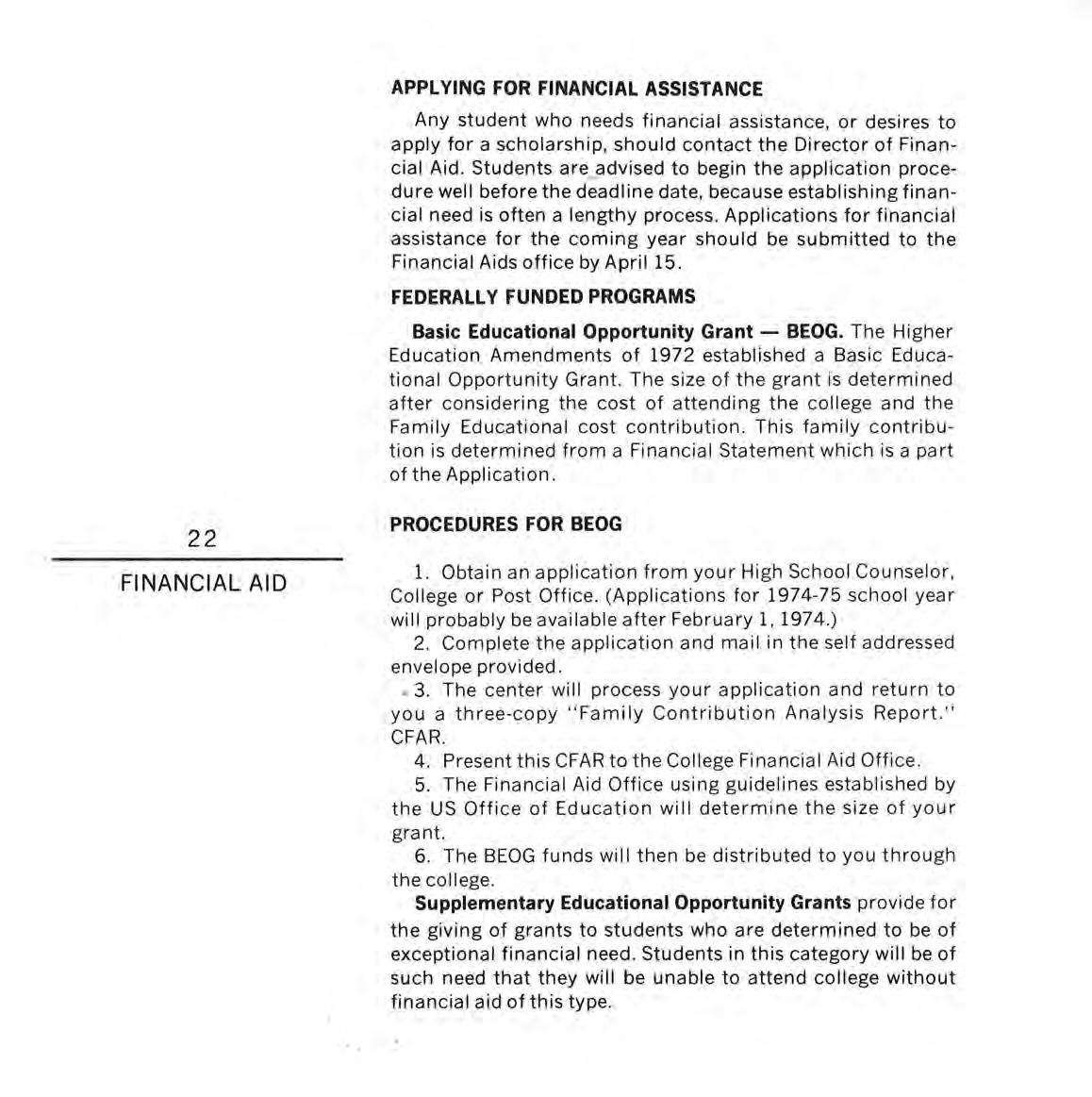
1. Obtain a n application from your Hi g h School Counselor , College or Post Office. (Applications for 1974-75 school y ear will probably be avail a ble after February 1, 1974 )
2. Complete the application and mail in the self a ddressed envelope provided .
• 3 . The center will process your application and return to you a three - copy " Family Contribution An a lysis Report . " CFAR
4. Present this CFAR to the College Financi a l Aid Office
5. The Financial Aid Office using guidelines establi s hed by the US Office of Education will determine the size of your grant.
6 . The BEOG funds will then be distributed to you through the college.
Supplementary Educational Opportunity Grants provide for the giving of grants to students who are determined to be of exceptional financial need . Students in this category will be of such need that they will be unable to attend college without financial aid of this type.
The SEOG amounts range from $200 to $1000 a year, and can be no more than one-half of the total assistance given a student. The grant is "matched" with other financial aid to meet the student's financial need. Grants are a-·.varded on a yearly basis, with the maximum duration of a grant being four years.
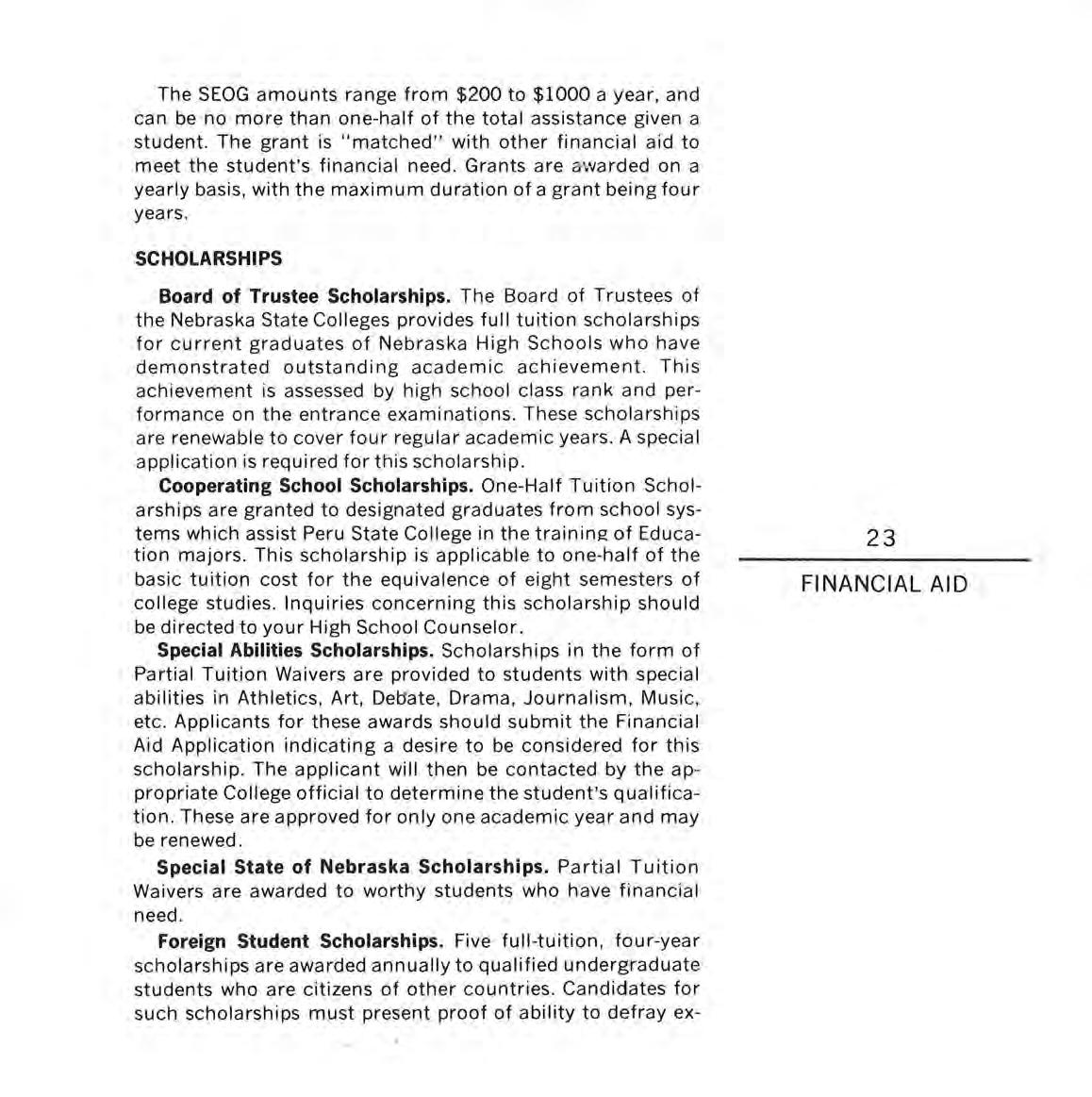
Board of Trustee Scholarships. The Board of Trustees of the Nebraska State Colleges provides full tuition scholarships for current graduates of Nebraska High Schools who have demonstrated outstanding academic achievement. This achievement is assessed by high school class rank and performance on the entrance examinations . These scholarships are renewable to cover four regular academic years. A special application is required for this scholarship.
Cpoperating School Scholarships. One-Half Tuition Scholarships are granted to designated graduates from school systems which assist Peru State College in the training of Education majors. This scholarship is applicable to one-half of the basic tuition cost for the equivalence of eight semesters of college stu"dies. Inquiries concerning this scholarship should be directed to your High School Counselor .
Special Abilities Scholarships. Scholarships in the form of Partial Tuition Waivers are provided to students with special abilities in Athletics, Art, Del:1ate, Drama, Journalism, Music, etc. Applicants for these awards should submit the Financial Aid Application indicating a desire to be considered for this scholarship. The applicant will then be contacted by the appropriate College official to determine the student's qualification. These are approved for only one academic year and may be renewed.
Special State of Nebraska Scholarships. Partial Tuition Waivers are awarded to worthy students who have financial need.
Foreign Student Scholarships. Five full-tuition, four-year scholarships are awarded annually to qualified undergraduate students who are citizens of other countries. Candidates for such scholarships mu?t present proof of ability to defray ex-
penses other than tuition and fees. Applications must be filed with the Registrar no later than June 1, prior to fall entrance.
Peru Achievement Foundation Scholarships. Through .the generosity of alumni and friends of Peru State College,. the Peru Achievement Foundation, Inc., awards scholarships which have been established on a permanent basis.
A listing of th€ amounts and qualifications for Scholarships that are awarded through the Foundation can be found at the conclusion of the information on Financial Aid.
Students may make application for a specific scholarship or any available scholarship on the College's scholarship application form, which may be obtained from the office of the Director of Financial Aids.
College Work-Study is intended primarily for students from low-income families and permits them to earn a part of their college expenses. During the time they are attending classes full time, the student can work a maximum of 15 hours per week. During vacation periods the students may be allowed to work 40 hours per week. Work-Study jobs are usually on -campus or for the city of Peru, and are vitai to the efficient operation of both the College and the city. College Work-Study jobs are often used for matching purposes with a student's SEOG grant.
National Direct Student Loans are made to students who need financial assistance in meeting educational expenses. To be eligible, the student must be in good standing and be registered as a full-time student . NDSL loans are also commonly used for matching purposes with an SEOG .
Federally Insured Student Loans are intended primarily for students who do not qualify for the other programs of financial assistance but who, nonetheless, need financial help.
Federal Insured Student Loan - State of Nebraska, LB152. If a Nebraska resident is unable to obtain a Feaerally Insured Student Loan through a commercial agency, he or she may obtain such a loan from the State of Nebraska . The request for the loan should be initiated in the College Financial Aid office.
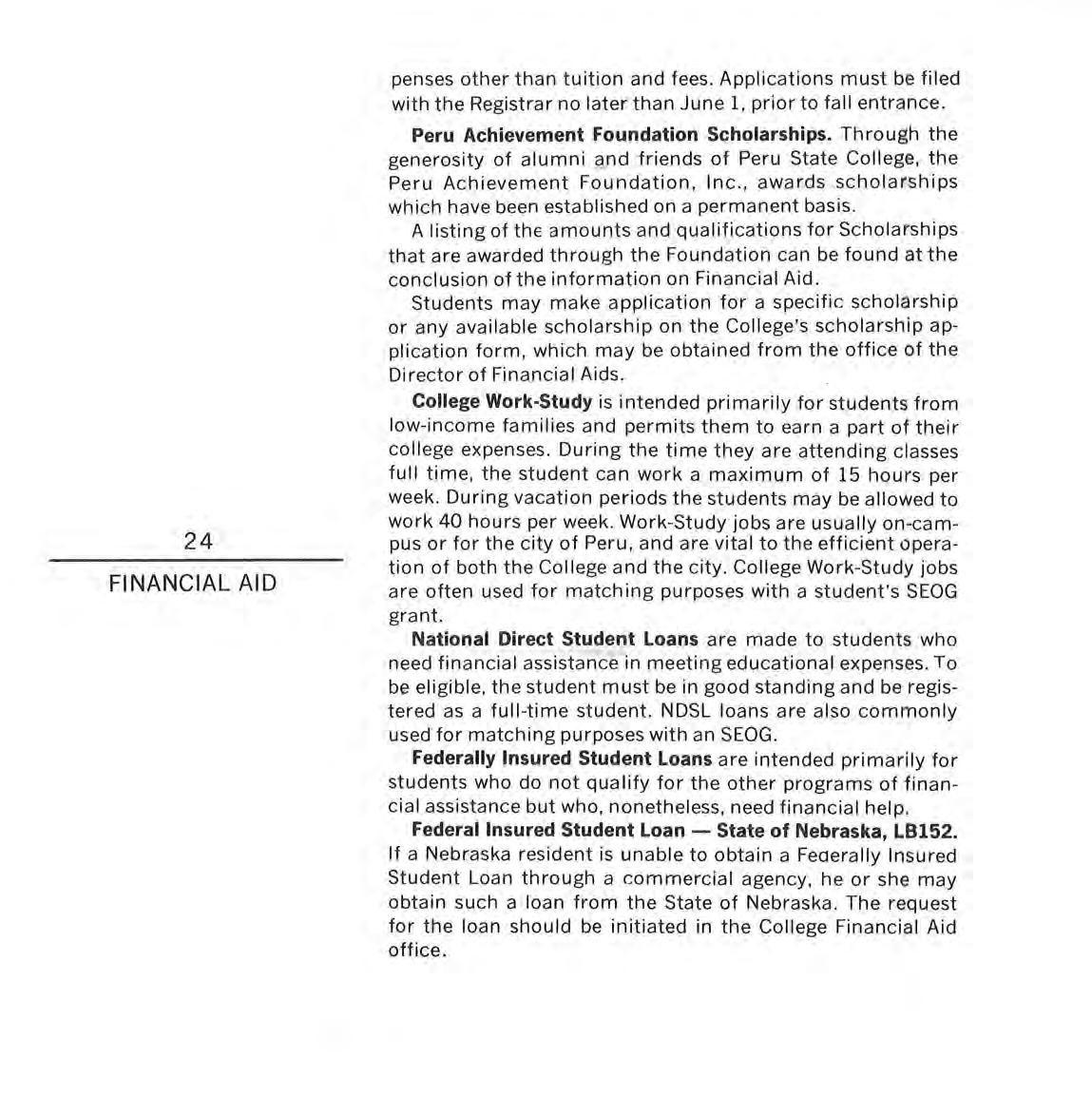
College Work jobs are similar to the Work-Study jobs in pay scale, type of work performed, and hours worked.
Memorial Loan Funds established by various donors include: the $200 Willie Ethel Crone Loan Fund, established in 1943 by Miss Ruth Crone in memory of her mother; the $300 Harriet Louise Lindstrom Loan Fund, established in 1946 by the late C . R. Lindstrom and Mrs . Lindstrom in memory of their daughter; the Mrs. Eva Fischer Loan Fund provided in 1962 by a $500 bequest by the late Mrs. Eva Fischer of Beatrice; the Towne Loan Fund provided by a $1,411.24 bequest by the late Norman L. Towne of Bozeman, Montana, husband of the late Lola Howe Towne, class of 1906; the $250 Patricia Buethe Loan Fund, established in 1962 by friends of the late Mrs. L. Chris Buethe.
Although there is some variation in the specific requirements for these loans, the general qualifications are the same as for the College Loan Fund: (1) be a student in the College, (2) plan to teach, (3) be in need of financial assistance. Loans from the College Loan Fund and Memorial Loan Fund are generally made on a short-term basis.
Scholarships are granted by the Nebraska Congress of Parents and Teachers to full-time students of the Nebraska State Colleges who are Nebraska residents training to become teachers . In order to be eligible for these scholarshipswhich vary in number with available funds - the student must have a pleasing personality, have high moral and social standards, and show an aptitude for teaching . Applications are sent to the College by the Nebraska Congress of Parents and Teachers shortly after the beginning of the fall semester.
Through the Division of Vocational Rehabilitation individuals with physical disabilities which constitute vocational handicaps are eligible for financial assistance in meeting costs of tuition, plus certain other financial help, depending upon the extent of their financial need.

Students interested in receiving this aid should contact the Director of Financial Aid for additional information.
Alpha Mu Omega Freshman Award. Presented by Alpha Mu Omega, honorary mathematics fraternity, to a member of the freshman class for excellence in mathematics .
A.V. and Wilhelmina Larson Memorial Industrial Arts Award. A $100 scholarship to be presented to a student completing his sophomore year who demonstrates promise as a teacher in the area of industrial arts.
B. E. Swenson, Jr., Athletic Award. Established in 1925 by Bert E. and Stella Swenson in memory of their son, B. E. , Jr. , and their parents who made possible their early education at Peru . Juniors and seniors are eligible and no student shall receive the award more than once. Basis for judging: 100 points . General - Character and personality, 15; Scholarship, 15 ; Loyalty to school tradition, 20 ; Athletics - Must receive school letter in at least two different sports, including either major or minor sports, 50 points . The two letters need not be earned in any one year.
Business Club Award. Presented by the United Business Education Association to an outstanding student in Business Education .
Dramatic Club Awards. Presented each year to the senior man and senior woman who have contributed most to dramatics during the four years in the College .
Epsilon Pi Tau Award. Presented by the local ETA Chapter of Epsilon Pi Tau, an International Honorary Fraternity in Industrial Arts , for the purpose of honoring a graduating member whose scholastic ability is outstanding.
Kappa Delta Pi Educational Award. Presented by the Beta Mu Chapter of Kappa Delta Pi, national honorary educational fraternity , to the freshman whose scholarship and professional attitude are outstanding
Louise Mears Geographical Award. Presented to a student with high scholastic performance in the field of geography.
Neal S. Gomon Award. The Neal S. Gomon Award is presented annually to the Pedagogian staff member who is voted most outstanding in his contributions to the paper . ,
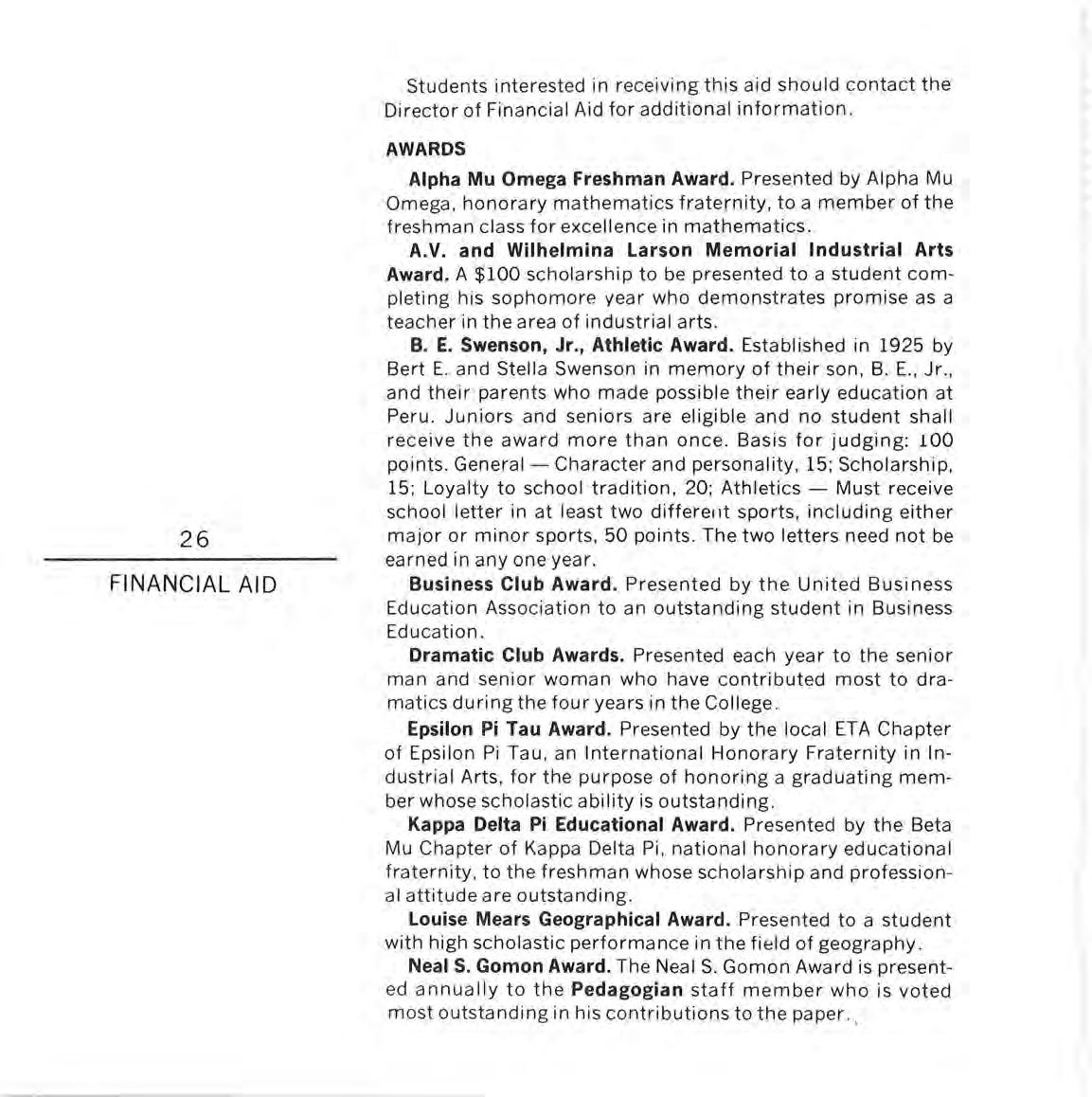
John C. Christ Award. An award established in honor of Dr John C . Christ , Professor of Biological Science. The award of fifty dollars is to be g iven to an outstanding high school senior who plans to major in the natural sciences at Peru State College.
Sigma Tau Delta Award. Students of high scholastic standing who have shown an outstanding interest in lit erature and have properly submitted samples of their original writings may be presented memberships in Sigma Tau Delta.
Silas Summers Writing Award. Th e Sigma T aw Delta National honorary English fraternity, and the English Club present cash awards for the best original written co ntributions. Winning scripts may be published in the Sifting Sands.
Zelma R. Wonderly Award. An a nnual award of $50 to the outstanding second grade student teacher.
Pearl A. Kenton Language Arts Award. A $50 award is presented annually to an outstanding student majoring in the area of language arts.
Helen E. Cole Pollard Founders Award. Presented at spring honors convocation to the senior who during his collegiate career has demonstrated loyalty and service to the College.
Mac Dunning Industrial Arts Award. A $50 annual cash grant to an outstanding student in the area of industrial arts .
Bill Tynon Memorial Athletic Award. A $50 award is presented to a Nebraska resident for his senior year who has made an outstanding contribution to intercollegiate a thletics
A. B. Clayburn Memorial Award. A $100 awar d is for a junior in teacher education who is majoring in social sciences and has displayed the qualities of outstanding citizenship, progress, and potential.
Lura Hendricks Eichler Memorial Kindergarten Education Award. The $50 award is presented annually to a student who has demonstrated ability, aptitude, and interest in kindergarten education.
A. V. Larson Award. Presented to the student contributing most to the College yearbook .
Chemistry Award. The Chemical Rubber Co has made available the New 53rd Edition of the CRC Ha ndbook of Chemistry and Physics and a scroll to be presented to the student ranking at the top in the freshman chemistry courses.
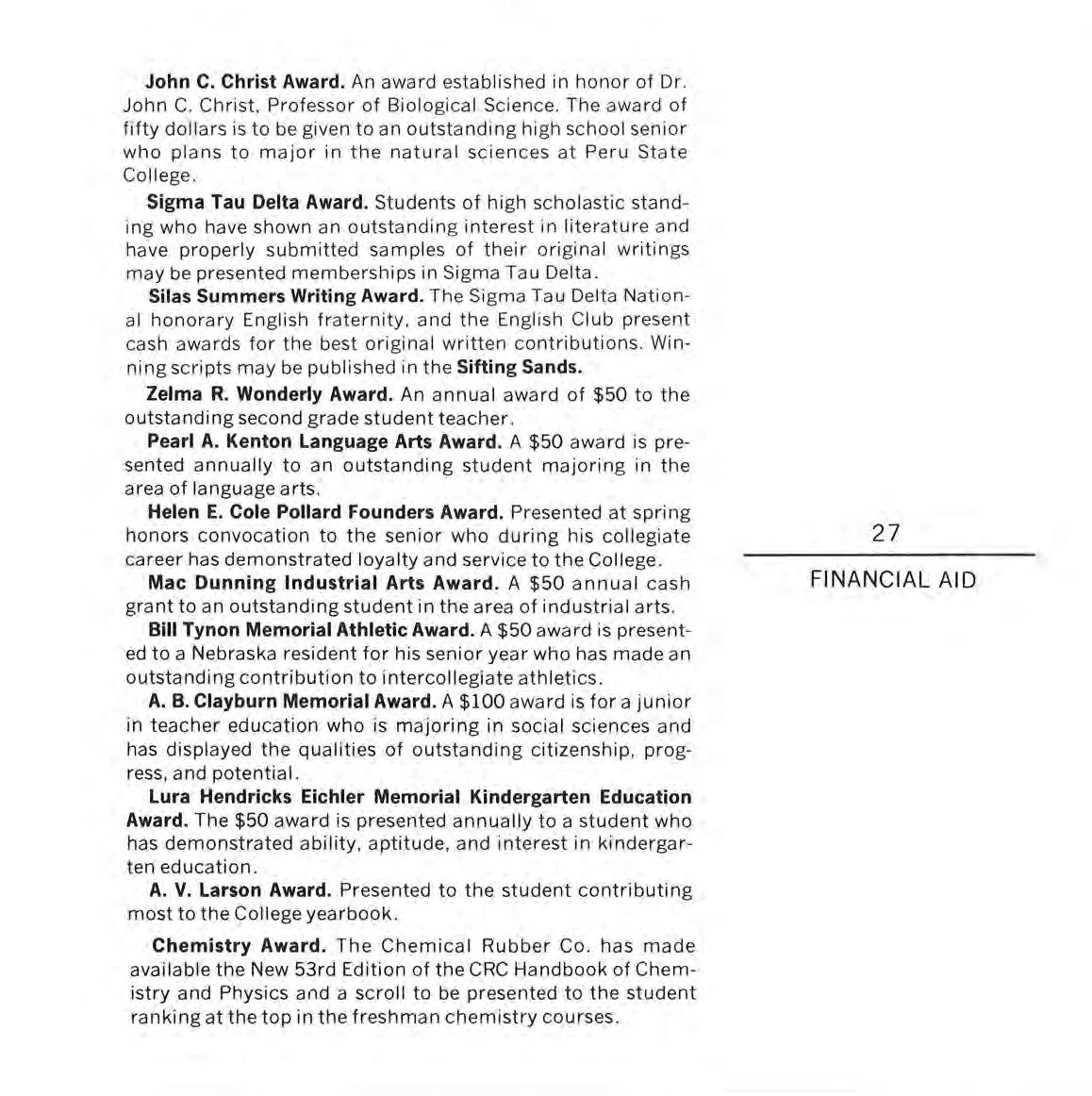
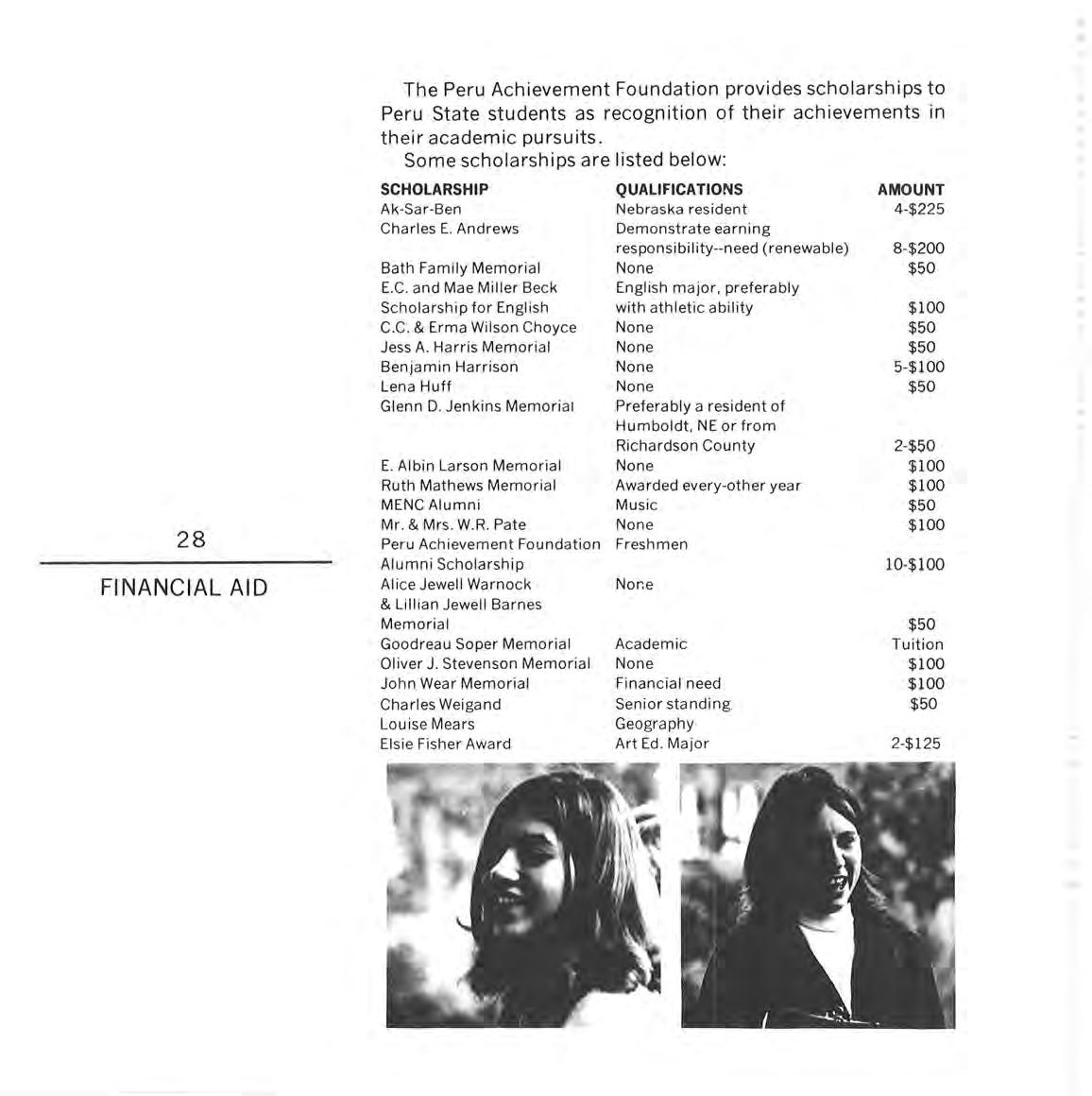
The Peru Achievement Foundation provides scholarships to Peru State students as recognition of their achievements in their academic pursuits.
Some scholarships are listed below:
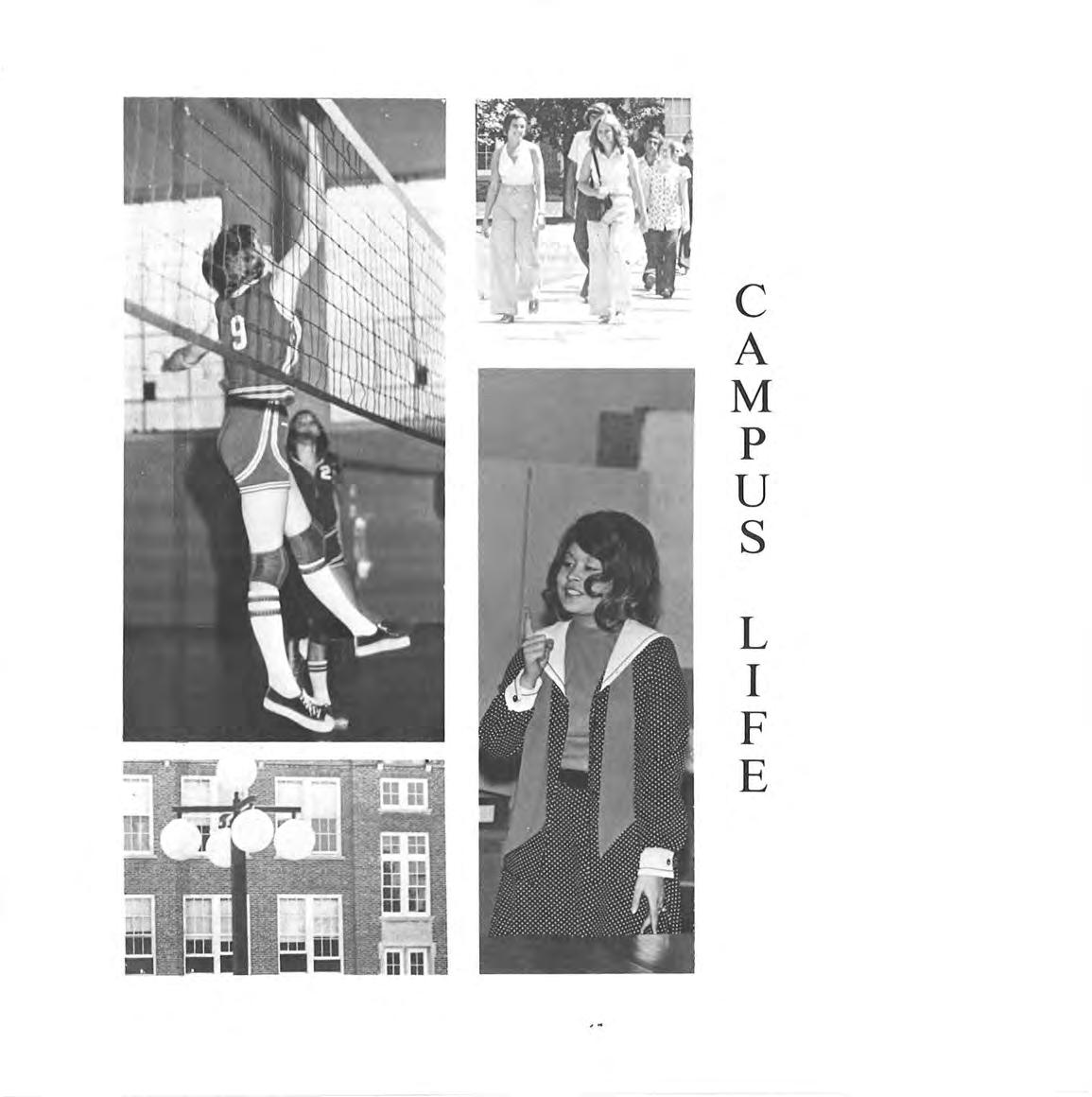
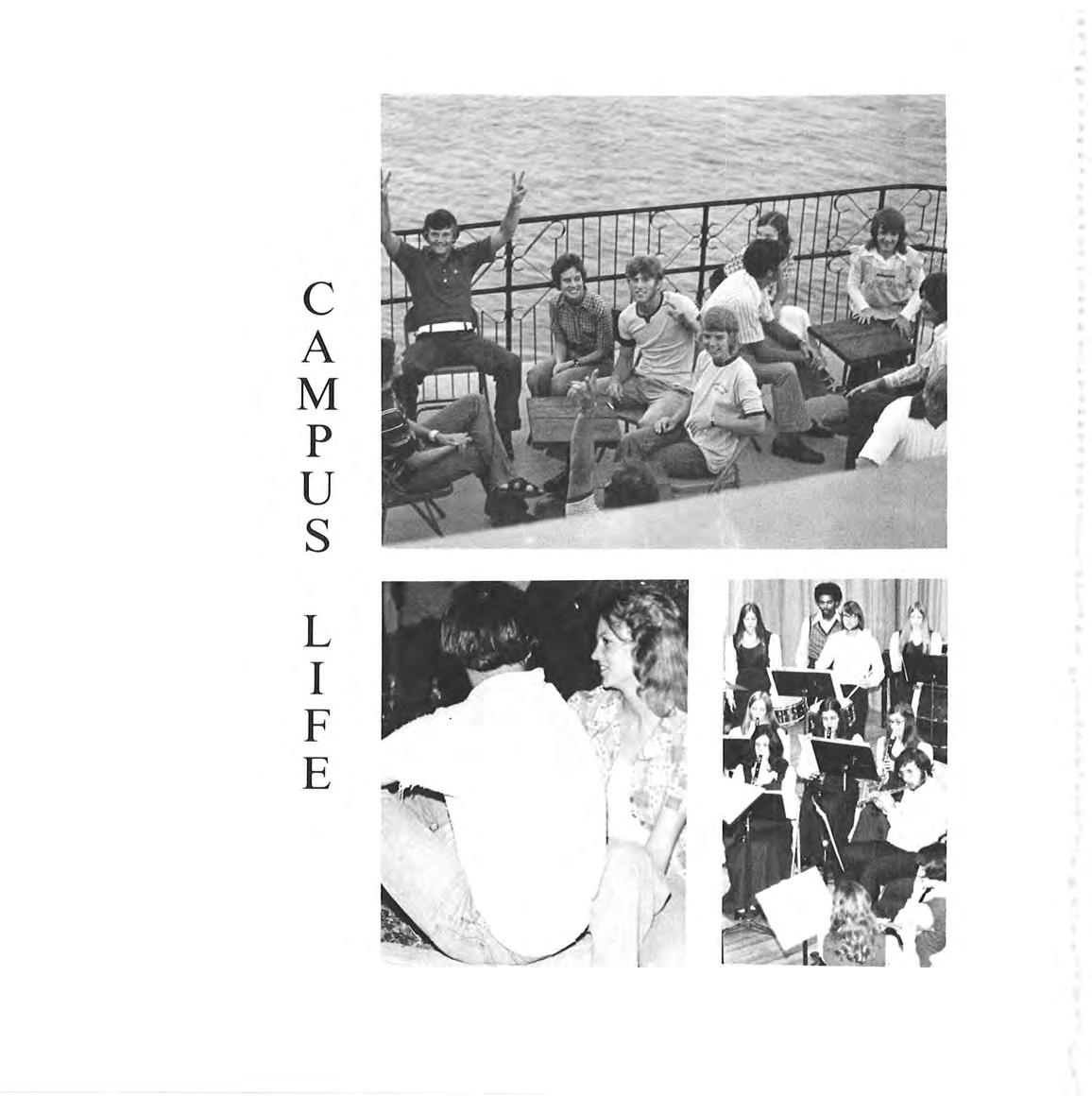
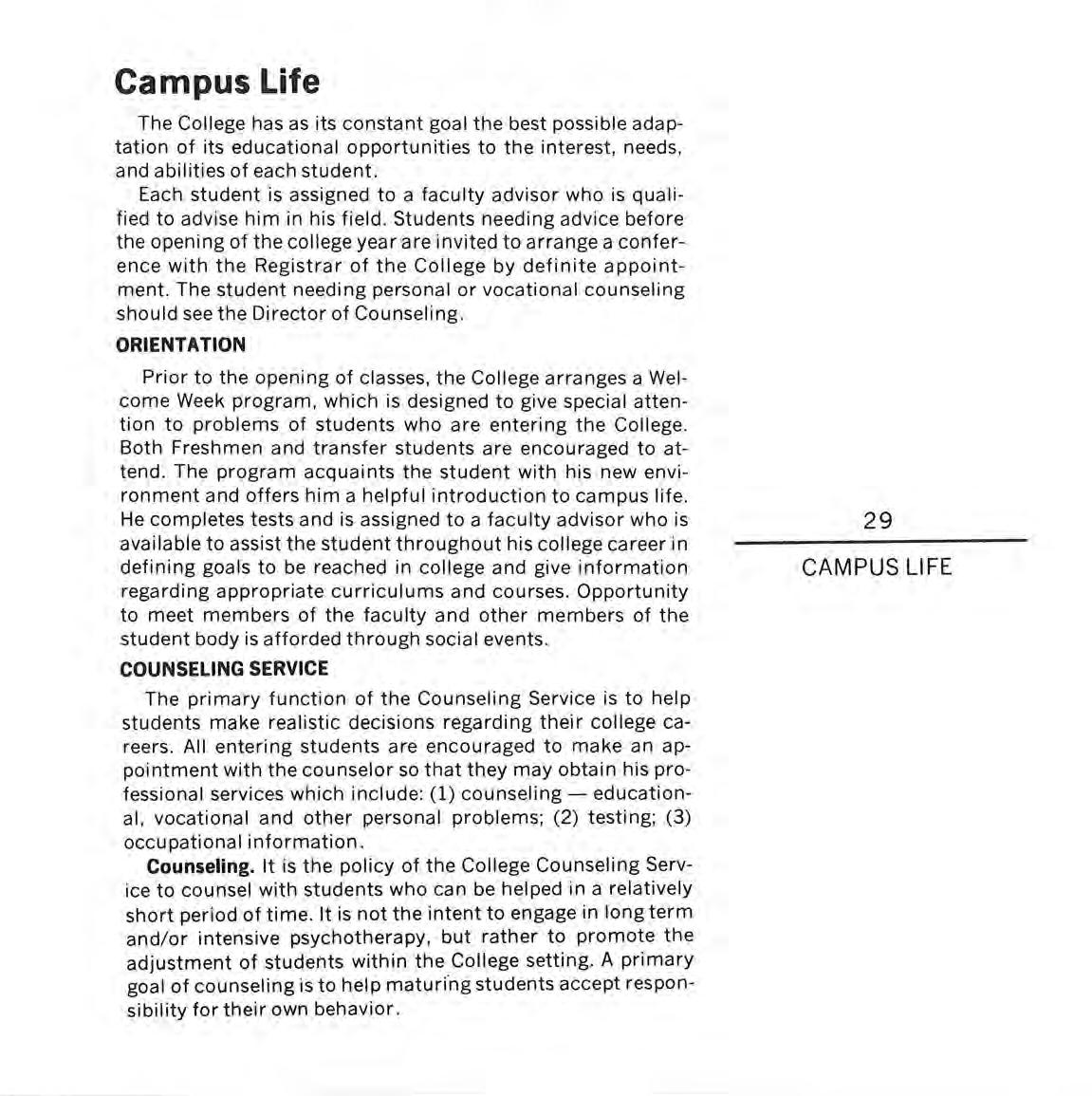
The College has as its constant goal the best possible adaptation of its educational opportunities to the interest, needs, and abilities of each student.
Each student is assigned to a faculty advisor who is qualified to advise him in his field. Students needing advice before the opening of the college year are invited to arrange a conference with the Registrar of the College by definite appointment. The student needing personal or vocational counseling should see the Director of Counseling .
Prior to the opening of classes, the College arranges a Welcome Week program, which is designed to give special attention to problems of students who are entering the College. Both Freshmen and transfer students are encouraged to attend . The program acquaints the student with his new environment and offers him a helpful introduction to campus life. He completes tests and is assigned to a faculty advisor who is available to assist the student throughout his college career in defining goals to be reached in college and give information regarding appropriate curriculums and courses. Opportunity to meet members of the faculty and other members of the student body is afforded through social events.
The primary function of the Counseling Service is to help students make realistic decisions regarding their college careers. All entering students are encouraged to make an appointment with the counselor so that they may obtain his professional services which include: (1) counseling - educational, vocational and other personal problems; (2) testing; (3) occupational information .
Counseling. It is the policy of the College Counseling Service to counsel with students who can be helped in a relatively short period of time. It is not the intent to engage in long term and/or intensive psychotherapy, but rather to promote the adjustment of students within the College setting A primary goal of counseling is to help maturi"ng students accept responsibility for their own behavior.
Testing Services. Tests of achievement , ability, interest, and adjustment are given to all students who request them through a counselor. The data from these tests are used as a basis for counseling in educational, occupational, and personal problems. The testing service provides psychological test data for the use of counselors and faculty advisors, placement tests for various academic groups at the College, and assistance in the preparation, administration, and scoring of subject-matter tests as requested by various departments in the College.
Occupational Information Services. A comprehensive, current co llection of essential occupational information is maintained in the Counseling Service library . Current catalogs of the major universities and technical schools are also on file . These materials are available to all students seeking inform ation about particular vocational opportunities or information about employment in general.
Teacher Placement. Peru State College maintains a central office for the confidential recommendations of students and alumni. Each candidate is to provide personal information and recommendations that will assist him in securing a position. Prospective employers may receive credentials without charge .
Business and Industrial Placement. Assistance is given ~tudents in finding full time employment in business, industry,
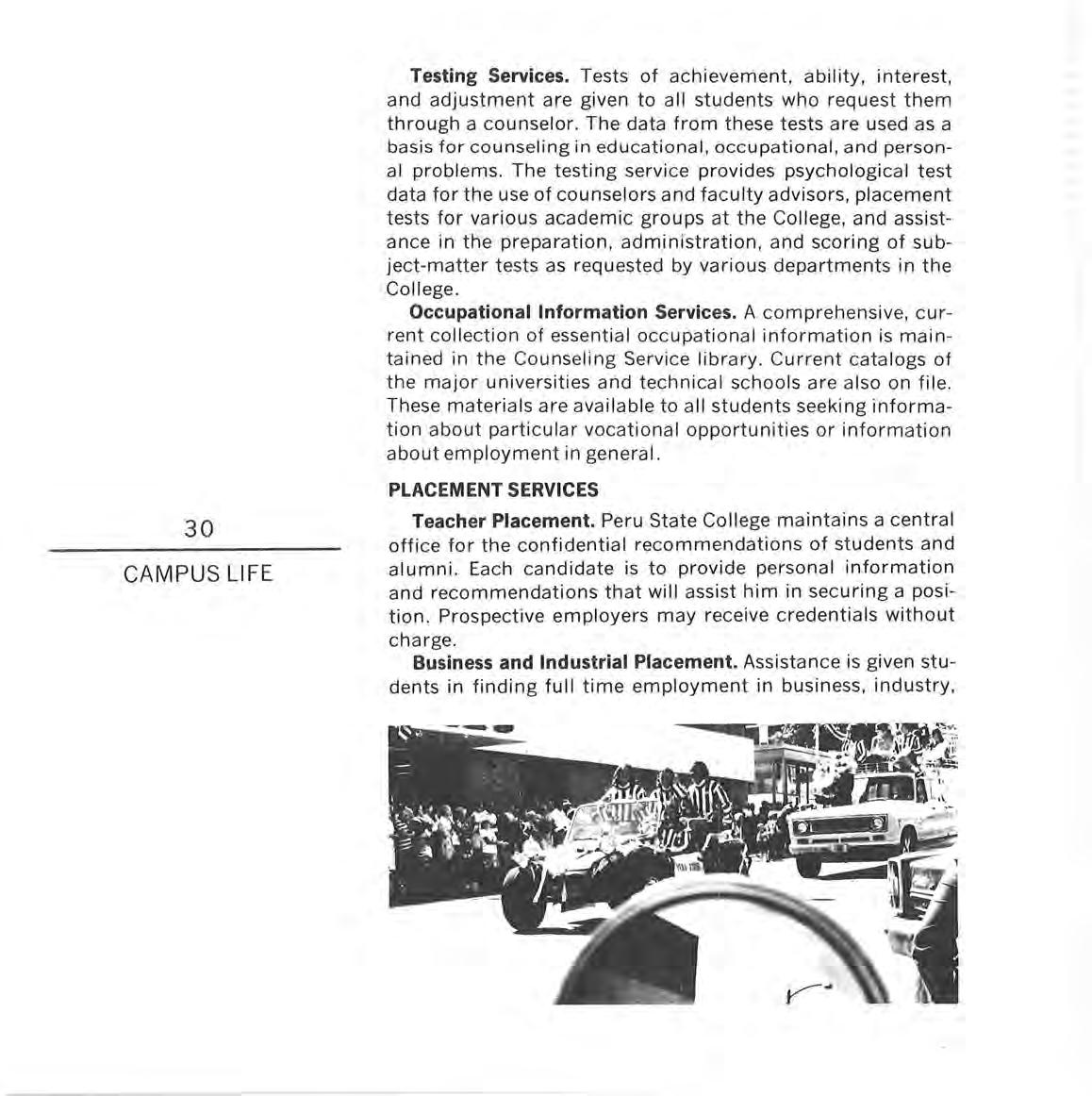
and governmental services. Literature on various companies is available to students who may be interested .
Sample letters of inquiry, letters of application, personal data sheets, etc ., are available to assist the candidates. Employment interviews are often held on campus The P l acement Office maintains a library of occupational information .
There is a nominal fee for send ing credentials and the mailing of vacancy lists which are issued periodically. The fee includes service from September 1 to August 31 of the following year.
Required Health Examination. All students attend in g the College during the regular academic year are required to furnish evidence of being in good health as part of the application for admission.
Students participating in physical activities such as football, basketball, baseball, cross country, track and field, swimming, tennis, wrestling, volleyball, and intr amura l s must be certified as physically fit by the college physician at the beginning of the activity .
Health Care. Any student may consult the nurse at the Health Center at any time during her regular office hours. The College doctor has regular hours at the Health Center . Visi.ts with the doctor outside of his regular hours may be scheduled through the college nurse at no charge to the student. Aspirin, first aid, and dressings are provided from the Health Serv ice free of charge. The College's responsibility for medical expenses is limited to the services as listed above.
Health Insurance. Blue Cross-Blue Shield hospital and medical insurance is available to all students at very reasonable group rates . It is recommended that students purchase some type of protection.
All requests for information concerning living accommodations and requests for room reservations in one of the residence halls shou ld be directed to the office of Student Affairs. Schedule of room and board rates is listed in the Financial Information Section.
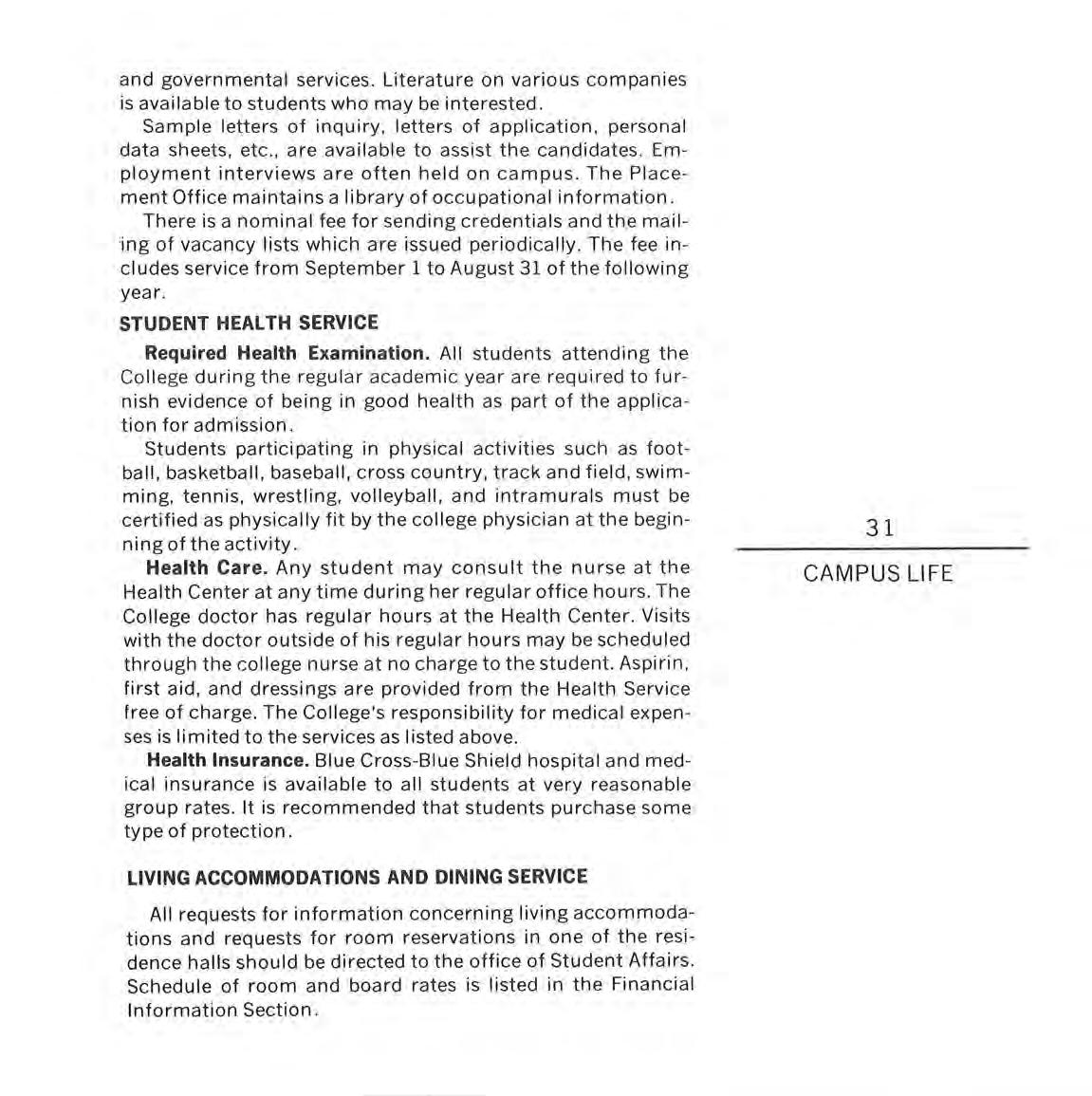
Residence Halls. The College residence halls offer attractive living accommodations near the classrooms and library. Halls are maintained for both men and women students.
Each residence hall at the College is responsible for setting its own hours of visitation within guidelines established by the College . Guests of the opposite sex register when they enter and leave halls.
All unmarried freshman and sophomore men and women, except those living with parents or guardians, must live in college residence halls. Exceptions to this will be handled by the College on an individual basis, with requests for exceptions to be submitted to the office of the Vice President for Student Affairs.
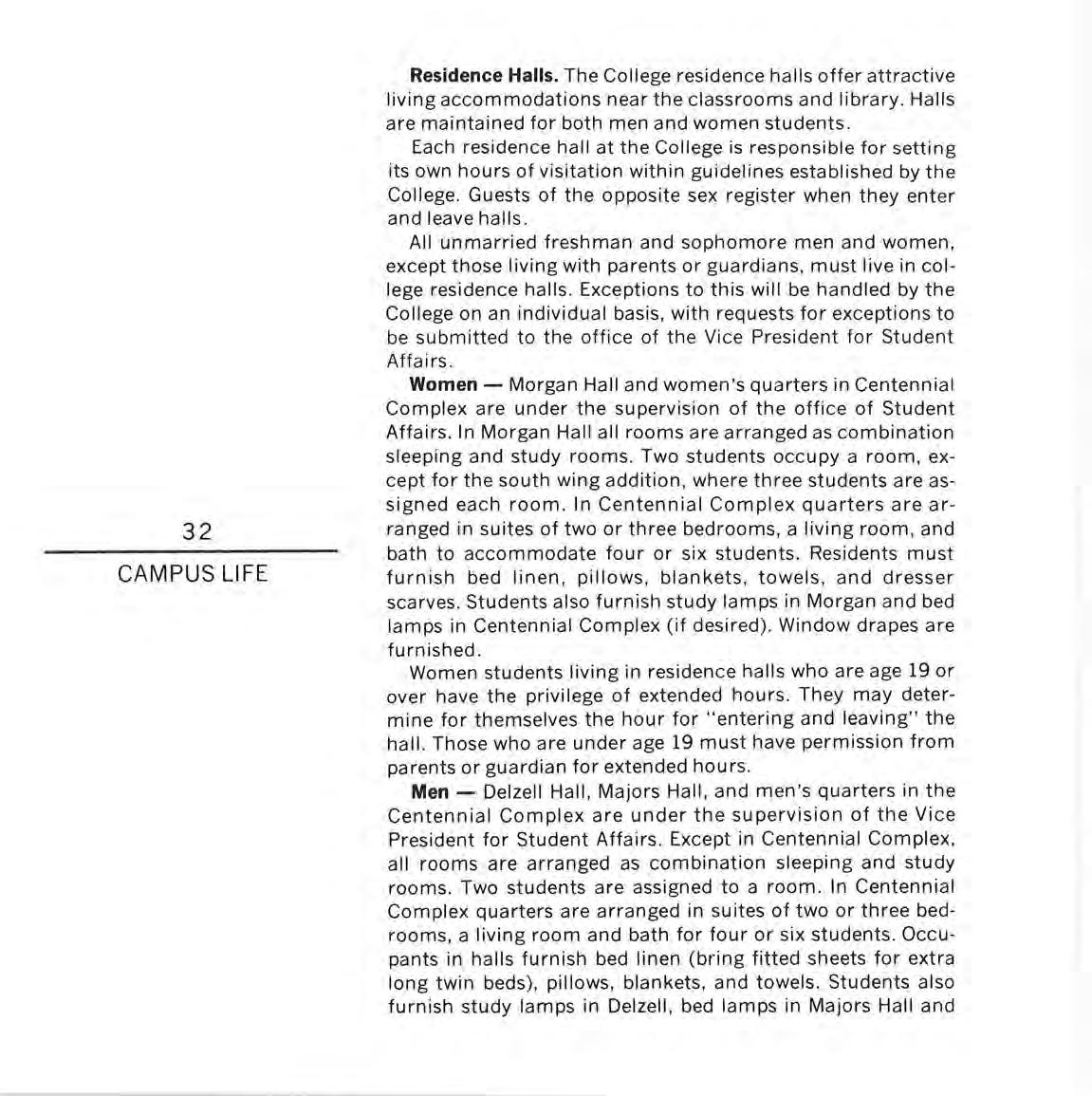
Women - Morgan Hall and women's quarters in Centennial Complex are under the supervision of the office of Student Affairs. In Morgan Hall all rooms are arranged as combination sleeping and study rooms. Two students occupy a room , except for the south wing addition, where three students are assigned each room. In Centennial Complex quarters are arranged in suites of two or three bedrooms, a living room, and bath to accommodate four or six students. Residents must furnish bed linen, pillows, blankets, towels, and dresser scarves. Students also furnish study lamps in Morgan and bed lamps in Centennial Complex (if desired). Window drapes are furnished
Women students living in residence halls who are age 19 or over have the privilege of extended hours. They may determine for themselves the hour for "entering and leaving" the hall. Those who are under age 19 must have permission from parents or guardian for extended hours.
Men - Delzell Hall, Majors Hall, and men's quarters in the Centennial Complex are under the supervision of the Vice President for Student Affairs. Except in Centennial Complex, all rooms are arranged as combination sleeping and study rooms. Two students are assigned to a room. In Centennial Complex quarters are arranged in suites of two or three bedrooms, a living room and bath for four or six students. Occupants in halls furnish bed linen (bring fitted sheets for extra long twin beds), pillows, blankets, and towels. Students also furnish study lamps in Delzell, bed lamps in Majors Hall and
Centennial Complex, if desired. Window drapes are furnished .
Other Housing Accommodations. Lists of rooms and apartments available in private homes off -campus are maintained by the Vice President for Student Affairs
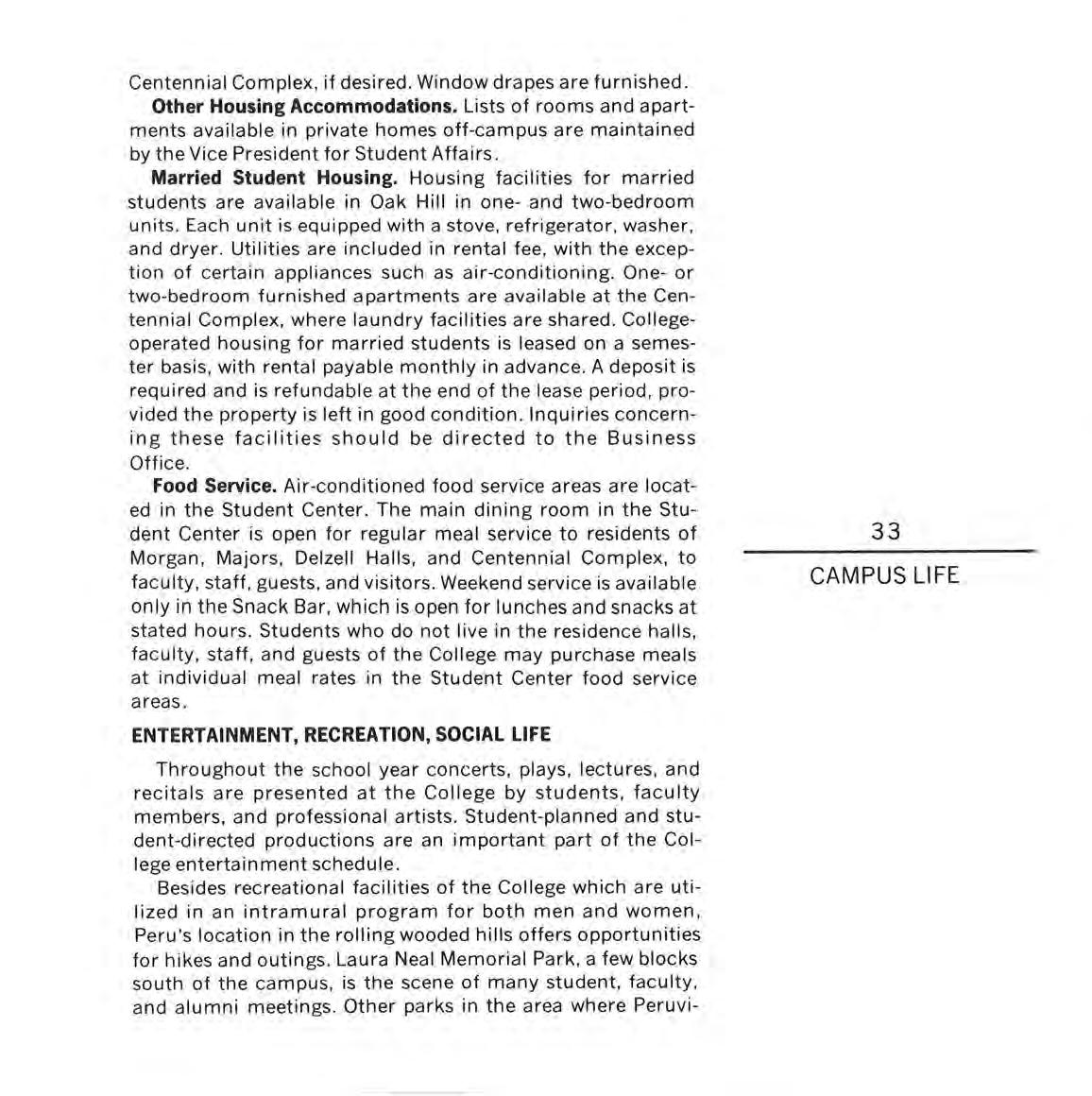
Married Student Housing. Housing facilities for married students are available in Oak Hill in one- and two - bedroom units . Each unit is equipped with a stove , refrigerator, washer, and dryer. Utilities are included in rental fee, with the exception of certain appliances such as air-conditioning. One- or two-bedroom furnished apartments are available at the Centennial Complex, where laundry facilities are shared. Collegeoperated housing for married students is leased on a semester basis, with rental payable monthly in advance. A deposit is required and is refundable at the end of the lease period , provided the property is left in good condition. Inquiries concerning these facilities should be directed to the Business Office .
Food Service. Air-conditioned food service areas are located in the Student Center . The main dining room in the Student Center is open for regular meal service to residents of Morgan , Majors , Delzell Halls , and Centennial Complex , to faculty, staff, guests, and visitors . Weekend service is available only in the Snack Bar, which is open for lunches and snacks at stated hours. Students who do not live in the residence halls, faculty , staff, and guests of the College may purchase meals at individual meal r ates in th e Student Center food service areas .
Throughout the school year concerts, plays, lectures , and recitals are presented at the College by students , faculty members, and professional artists. Student-planned and student -directed productions are an important part of the College entertainment schedule .
Besides recreational facilities of the College which are utilized in an intramural program for both men and women, Peru's loc ation in the rolling wooded hills offers opportunities for hikes and outings Laura Neal Memorial Park, a few blocks south of the campus, is the scene of many student, faculty, and alumni meetings Other parks in the area where Peruvi-
ans gather are Corye ll Park near Brock, the city parks at Auburn and Nebraska C ity , and the Arbor Lodge State Park, a l so in Nebraska City . During the summer months many Peru Staters enjoy the outdoor municipal swimming pools in Auburn and Nebraska City.
The social season at the Co ll ege centers arou nd the fo ll owing events - Homecoming , Thanksgiv in g, Christmas, Valentine's Day and Spring Week - when a ll -c ollege dances are given. Other social activities are sponsored by various student organizations These groups give dances, teas, parties, receptions, and picnics tor their members and guests. Faculty organizations inc l ude the Facu lty Women's C lub and a branch of the American Association of University Women
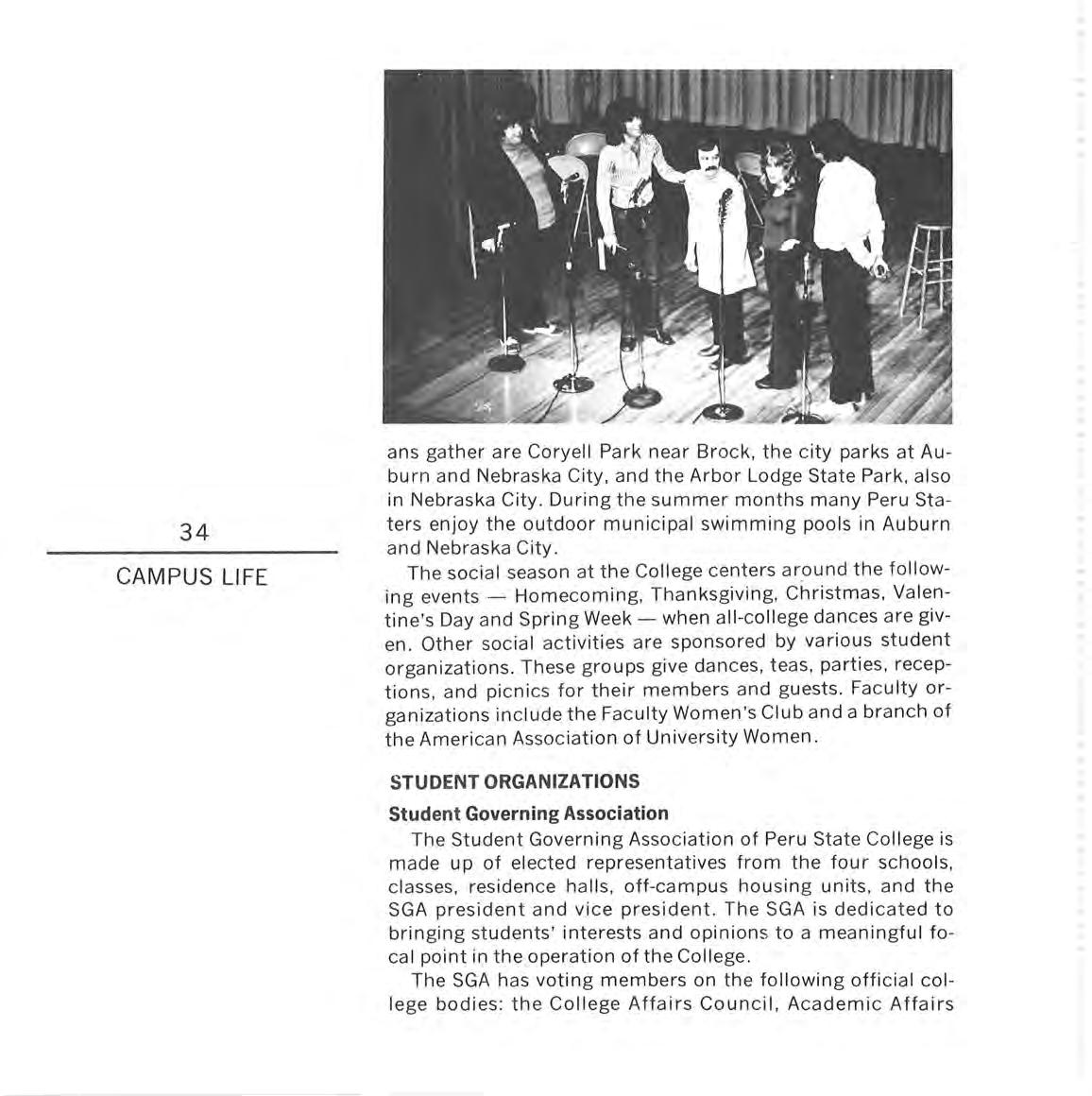
The Student Governing Association of Peru State College i s made up of e l ected representatives from the four schools, classes, residence halls , off-campus housing units , and the SGA president and vice president. The SGA is dedicated to br in ging students' interests and opinions to a meaningful foca l point in the operation of the Co ll ege.
The SGA has voting members on the fo llowin g official college bodies : the Co ll ege Affairs Council, Academic Affairs
Commission, Library Committee, Teacher Education Committee, Student Affairs Commission, Financial Aids and Scholarship Committee, School and Community Relations Committee, and the Student Conduct Committee . SGA offices are located in the Student Center.
SENIOR, JUNIOR, SOPHOMORE, AND FRESHMAN classes are considered definite organiz·a-tions. Each class is assisted with its activities by a member of the faculty , who acts as sponsor during the school year .
MEN'S HALL COUNCILS AND WOMEN STUDENTS ASSOCIATION are representative councils selected by the residents of the men's and women 's residence halls, respectively . The governing bodies of the halls handle problems and plan social activities for the residents.
The Student Center Board is a coordinating body for Student Center activities , as well as campus social events. Numerous activities of a social nature are $ponsored throughout the year under the sponsorship of the Student Center Board. Concerts by nationally kno\im groups are scheduled to appear on the Peru State Campus during each school year.
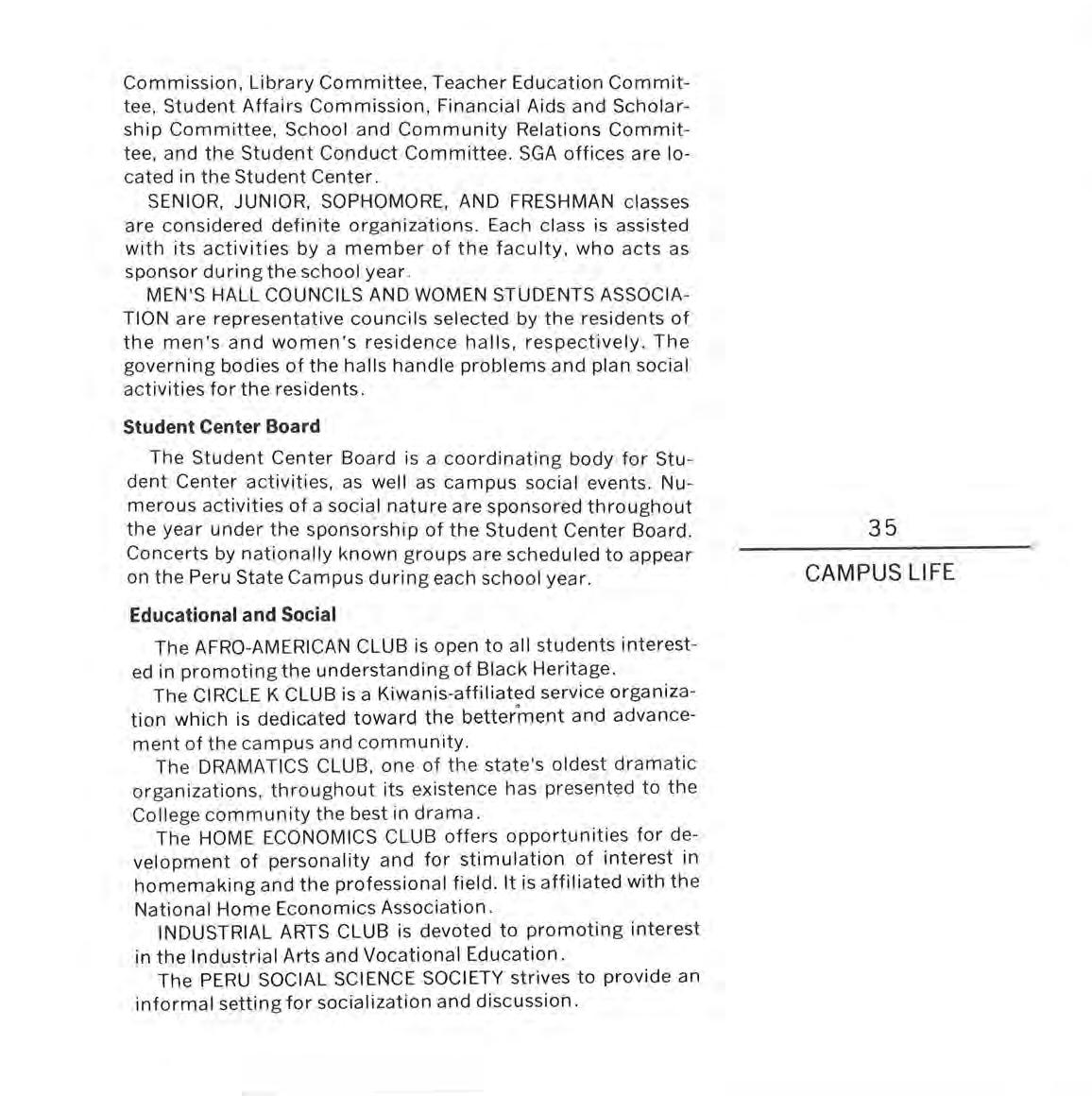
The AFRO-AMERICAN CLUB is open to all students interested in promoting the understanding of Black Heritage .
The CIRCLE K CLUB is a Kiwanis-affiliated service organization which is dedicated toward the better 0 ment and advancement of the campus and community.
The DRAMATICS CLUB, one of the state's oldest dram atic organizations, throughout its existence has presented to the College community the best in drama.
The HOME ECONOMICS CLUB offers opportunities for development of personality and for stimulation of interest in homemaking and the professional field . It is affiliated with the National Home Economics Association.
INDUSTRIAL ARTS CLUB is devoted to promoting interest in the Industrial Arts and Vocational Education.
The PERU SOCIAL SCIENCE SOCIETY strives to provide an informal setting for socialization and discussion.
The KPSC RADIO CLUB programs and operates the campus radio station. Membership is open to all students who desire to actively assist in the total operation of the station .
STUDENT EDUCATION ASSOCIATION is an organization for potential teachers. It is affiliated with the Nebraska State Education Association and the National Education Association. The activities of the association are devoted to the improvement of education
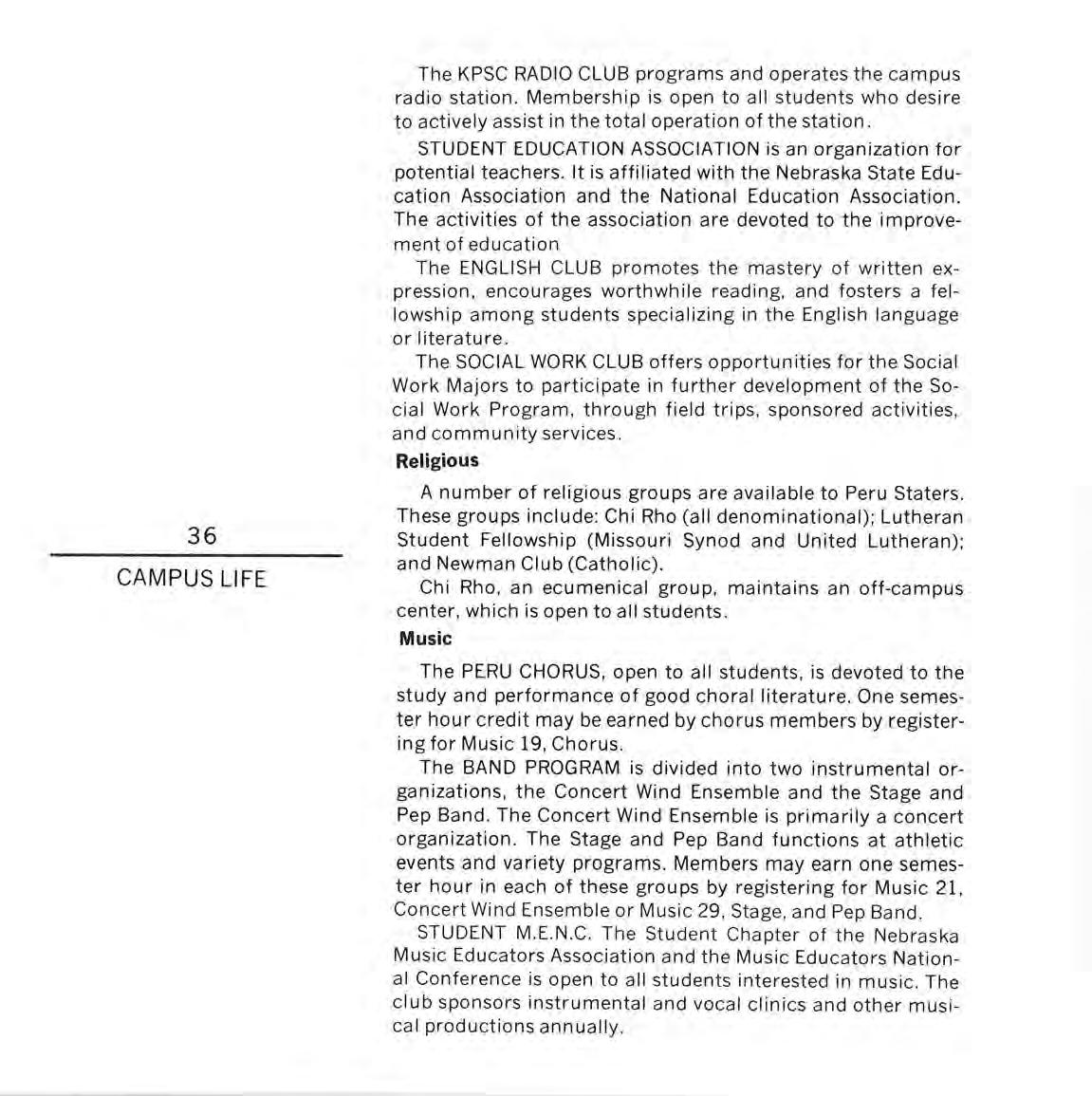
The ENGLISH CLUB promotes the mastery of written expression, encourages worthwhile reading, and fosters a fellowship among students specializing in the English language or literature .
The SOCIAL WORK CLUB offers opportunities for the Social Work Majors to participate in further development of the Social Work Program, through field trips, sponsored activ ities , and community services.
A number of religious groups are available to Peru Staters. These groups include: Chi Rho (all denominational); Lutheran Student Fellowship (Missouri Synod and United Lutheran); and Newman Club (Catholic) .
Chi Rho, an ecumenical group, maintains an off -campus center, which is open to all students . Music
The PERU CHORUS, open to all students, is devoted to the study and performance of good choral literature One semester hour credit may be earned by chorus members by registering for Music 19, Chorus.
The BAND PROGRAM is divided into two instrumental organizations , the Concert Wind Ensemble and the Stage and Pep Band . The Concert Wind Ensemble is primarily a concert organization. The Stage and Pep Band functions at athletic events and variety programs. Members may earn one semester hour in each of these groups by registering for Music 21, Concert Wind Ensemble or Music 29, Stage, and Pep Band .
STUDENT M.E N C. The Student Chapter of the Nebraska Music Educators Association and the Music Educators National Conference is open to all students interested in music The club sponsors instrumental and vocal clinics and other musical productions annually .
STUDENT N.S B.A The Student Chapter of the Nebraska State Bandmaster Association is open to all students who are instrumental music majors This organization promotes instrumental activities on the Peru State College campus and participates in activities sponsored by the State Bandmasters Association
The " P" CLUB membership is made up of Peru State College men who have lettered in any intercollegiate sport. The fostering of good sportsmanship is the club's purpose .
The WOMEN'S ATHLETIC ASSOCIATION is open to women students interested in women's physical education.
The BLUE DEVILS , men ' s pep organization, was organized in 1946 to stimulate interest in not only athletic, but also other student events. Second semester freshmen or above may pledge membership into the organization .
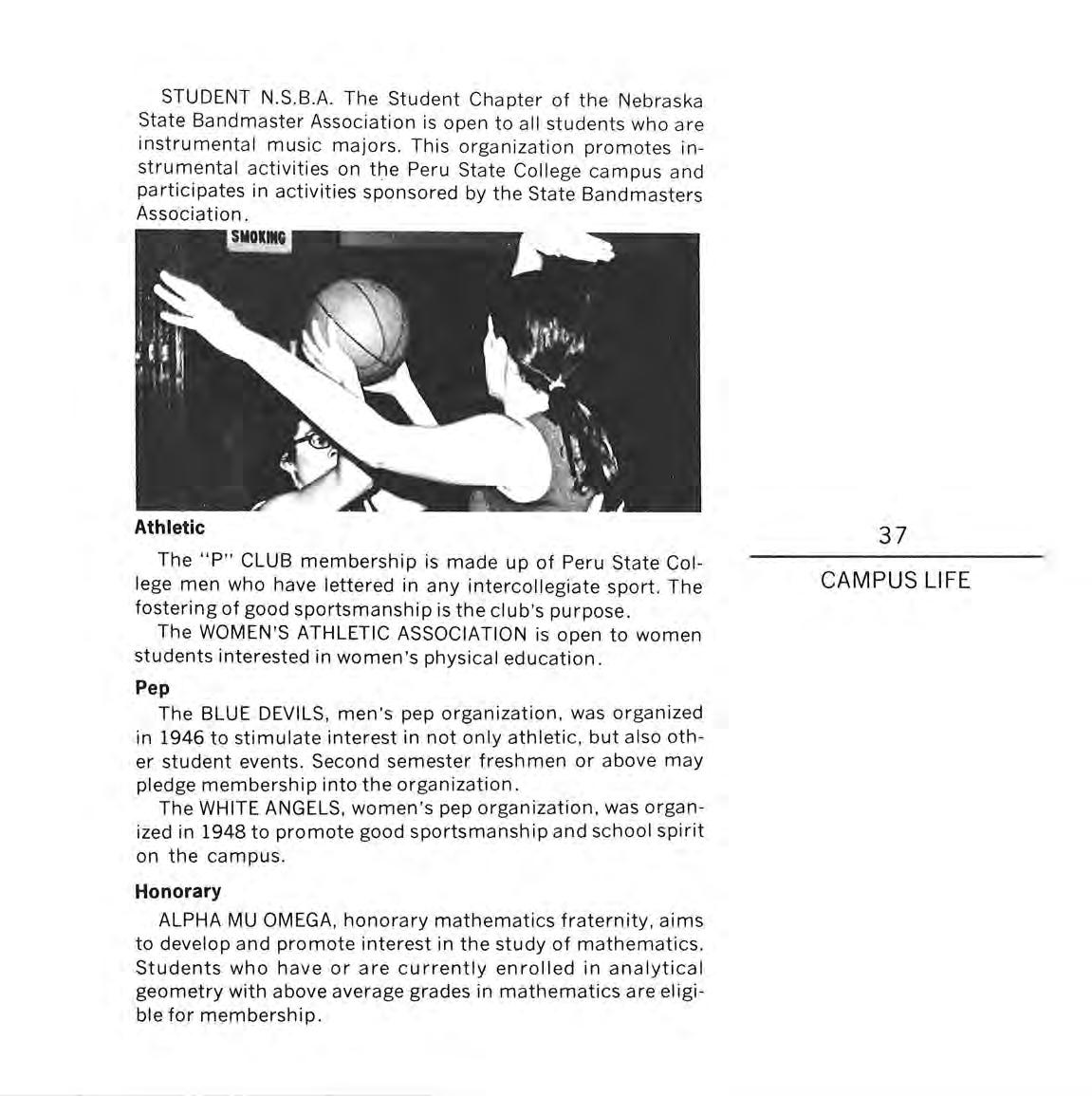
The WHITE ANGELS, women ' s pep organization , was organized in 1948 to promote good sportsmanship and school spirit on the campus.
ALPHA MU OMEGA , honorary mathematics fraternity, aims to develop and promote interest in the study of m a thematics. Students who have or are currently enrolled in analytical geometry with above average grades in mathematics are eligible for membership.
EPSILON Pl TAU is a national hono r ary professional industrial arts education and vocational education fraternity . Members are selected from students of junior or senior standing who have a grade point average of 6.40 in the industrial arts and an average grade of 5.00 in other fields
KAPPA DELTA Pl, national honorary education fraternity, is open to men and women of junior standing ranking in the upper quintile of the class and who show evidence of a continued interest in the field of education.
MU EPSILON NU is a national undergraduate fraternity in education.
PHI ALPHA THETA, national honorary history fraternity, is open to those of high scholastic stand i ng who have more than 12 hours of history.
SIGMA TAU DELTA, a National honorary English fraternity, granted the Phi Alpha Chapter of Peru State College a charter in 1926. Students who demonstrate an interest in literature and creative writing, and who are above average in scholar-
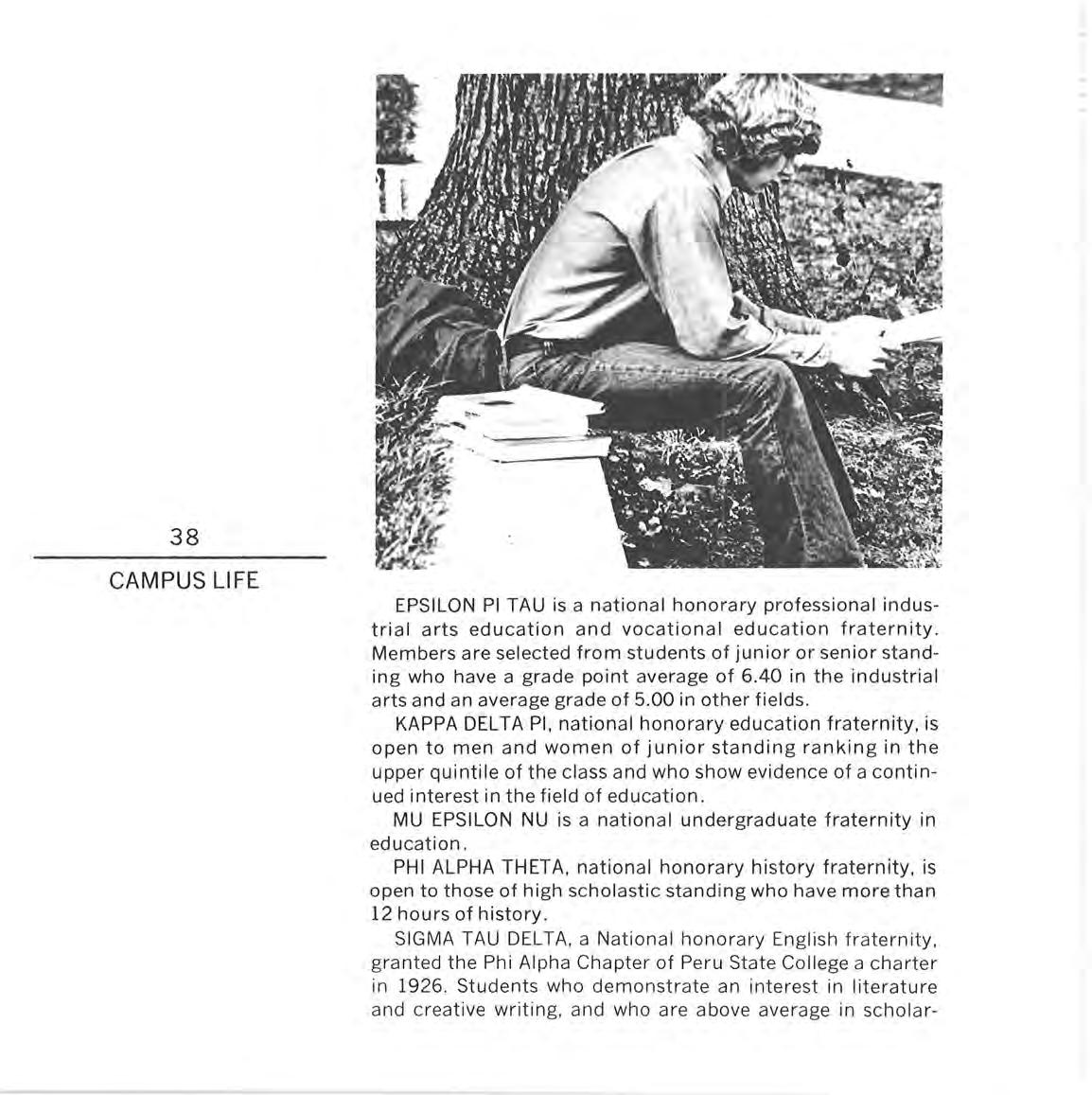
ship are eligible for membership. The local fraternity aids the English Club in publishing Sifting Sands.
BETA BETA BETA, professional honorary biology fraternity, is open to juniors and seniors whose field of concentration is biologic a l science. Candidates for membership must be above a v erage in scholarship and must plan to make biology their pe r manent interest.
GAMMA THETA UPSILON, international honorary geographical society, is open to students who have high scholastic standing in three membership classes: regular, hono ra ry, or associate.
P HI BETA LAMBDA . The local chapter, Epsilon Tau , is a business fraternity affiliated at both the state and nation a l levels . Memb e rship is open to all students interested in bu s iness
LAMBDA DELTA LAMBDA is a n honor ar y fraternity for all people who are interested in phy sica l science
WHO'S WHO Among Students in American Universities a nd Colleges annually determines the number of students with senior standing in the College who may be selected for this honor. These honorees are selected by a committee of students and faculty on the basis of scholarship , leadership and participation in academic and extracurricular activities, citizenship a nd service to the College , and promise of future usefulness in business and society.
The Pedagogian is the official college newspaper. It is published weekly during the academic year under the supervision of the journalism instructor. Although co ntributions are welcomed, the majority of the writing and editing is done by the students in journalism classes.
The Peruvian is the co ll ege yearbook and is a st ud e nt publica ti on. Inter es t ed st ud ents accept the r espons ibility of raising funds, s ubmittin g copy a nd pi c tures , a nd distributing th e ann u a l s
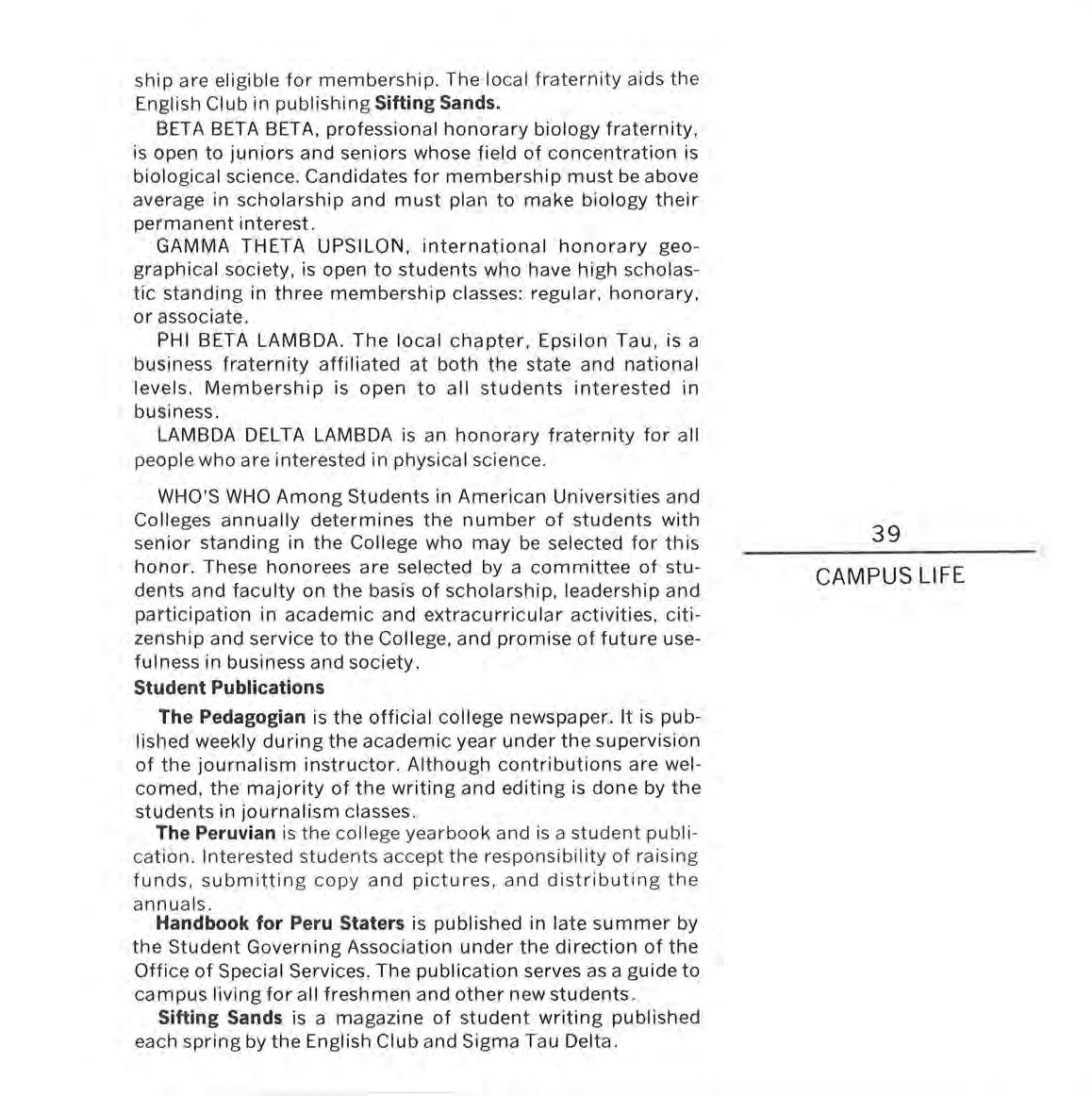
Handbook for Peru Staters is publish e d in late summer by the Student Governing Association under the direction of the Office of Special Services The publication serves as a guide to campus living for all freshmen and other new students .
Sifting Sands is a magazine of student writing published eac h spr in g by the English Club a nd Sigma T a u Delta.
KPSC is the call number for t h e Peru State Co ll ege radio stat i on. This stat i on broadcasts to buildings on the camp u s, and serves as a l aboratory for rad i o and speec h c lasses .
Each student is expected to conduct hims elf in accorda n ce with the regulations of the co lle ge a nd s u c h l aws of the City, State. and Federal Governments as app ly to m atters of persona l conduct.
The Col l ege reser v es the right to exclude at any time students whose co ndu ct i s deemed und es irable or injuriou s to the best interests of the Co lle ge, or of the student. In eve nt of such d ismissa l , fees will not be refu nd ed.
For detai l ed i nformat ion regarding student conduct, see t h e Peru State Co ll ege Student Agreement a n d the Handbook for Peru Staters.
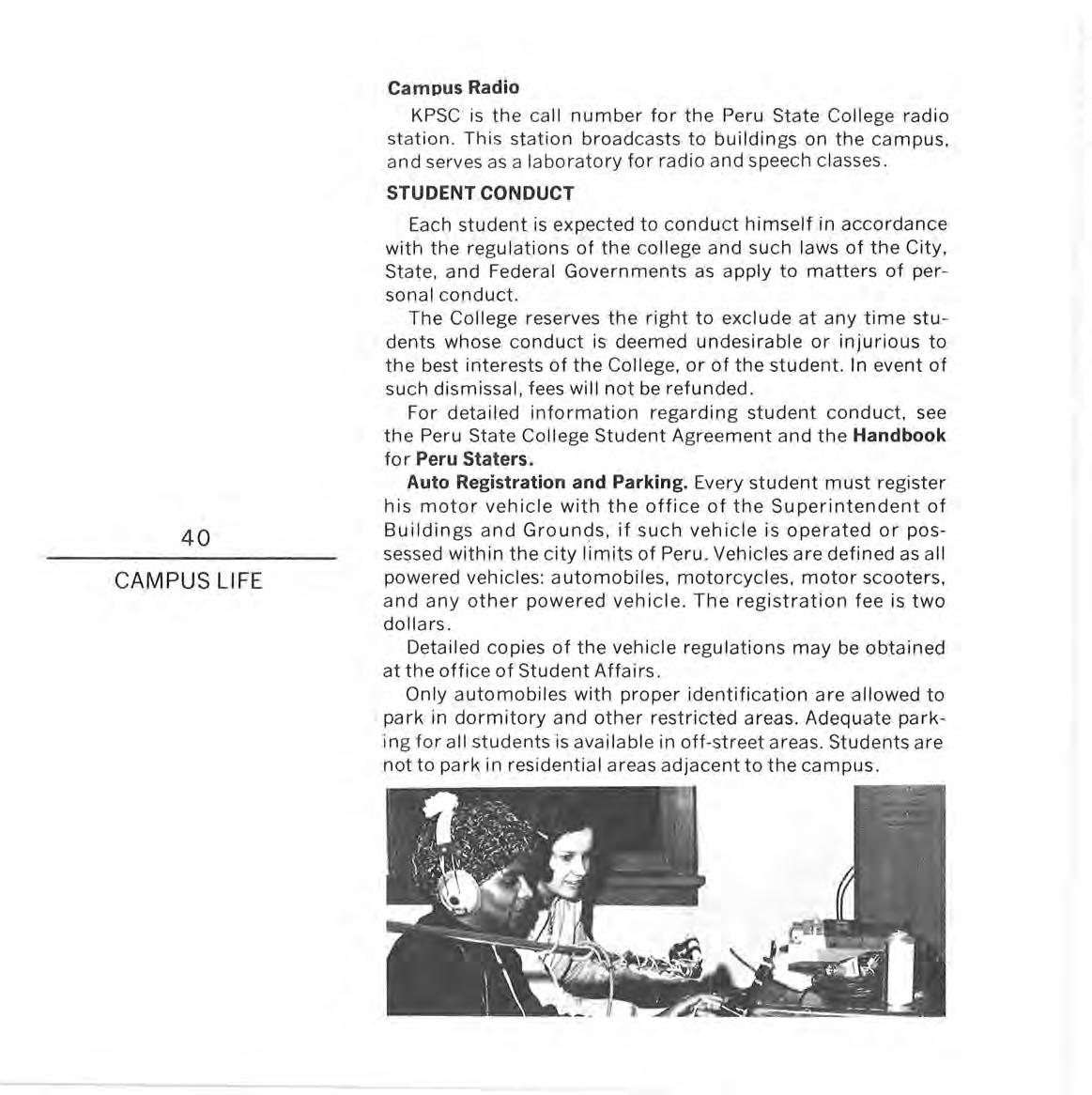
Auto Registration and Parking. Every student mu st reg ister his motor vehicle with the office of the Superi nt endent of Bu ildin gs and Grounds, if suc h vehicle is operated or possessed w i th in t h e city li mits of Peru. Vehicles are defined as a ll powered vehicles : automobi le s, motorcycles, motor scooters, and any other powered vehicle. The registration fee i s two dollars .
Detailed cop i es of t h e vehicle regulations may be obtained at the off i ce of St ud ent Affairs.
Only automob il es with proper identif icat i on are a ll owed to park in dorm itory and other restr icted areas. Adequate parking for al l students is ava il ab l e in off-street areas . Students are not to park in residential areas adjace nt to the campus .
A C A D E M I C I N F 0 R M A T I 0 N
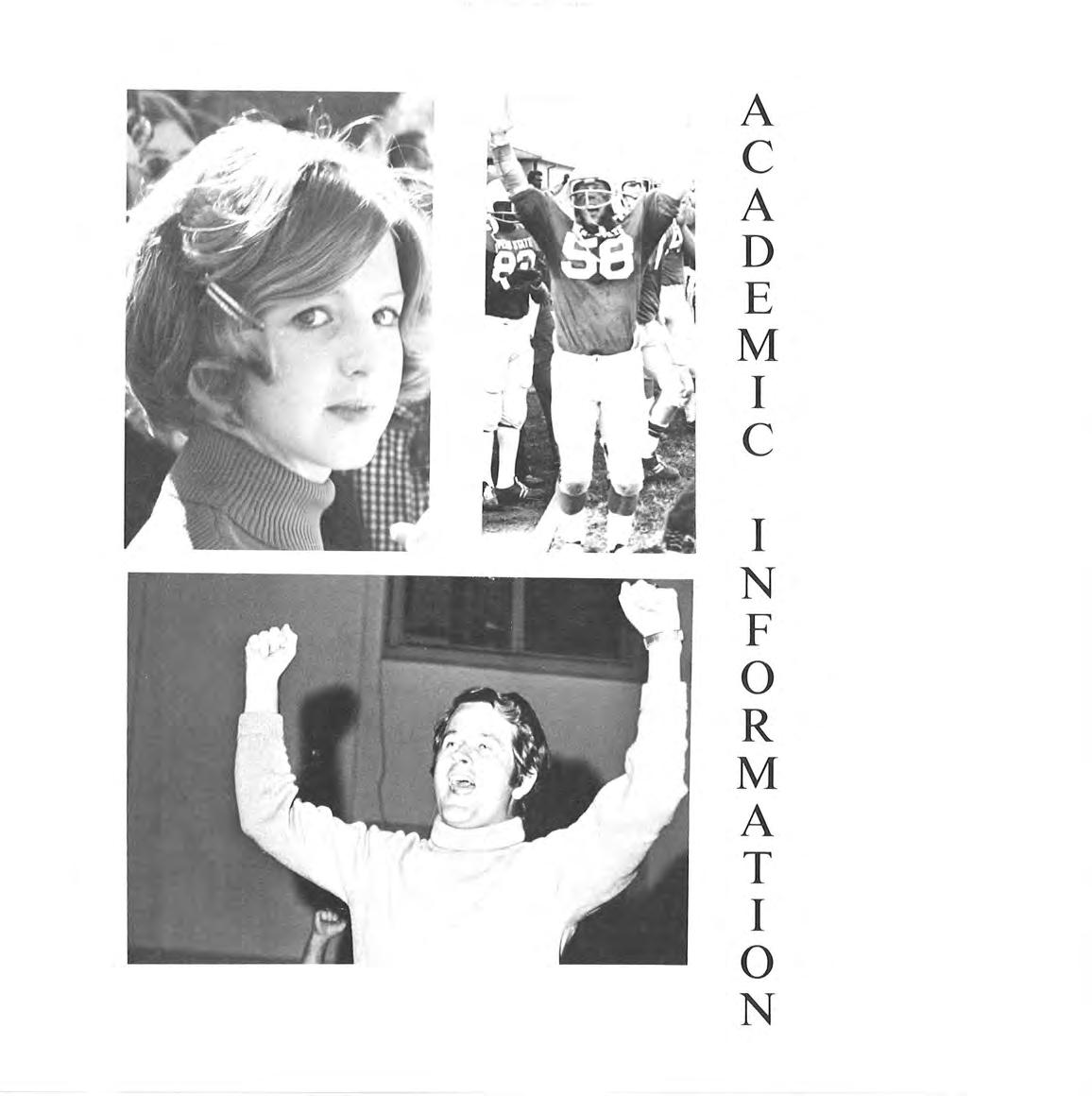


The College is supported by the State of Nebraska for the purpose of meeting the educational needs at the college level of citizens of the state. The College is a multi-purpose regional institution with a broad variety of programs in general liberal arts, vocational-technical education, teacher education, and a variety of pre-professional or terminal vocational education programs culminating in a Bachelor of Arts or Bachelor of Science degree and Associate of Arts degrees in certain vocational areas. The College also provides programs of instruction for adults in learning centers throughout southeast Nebraska.
The studies offered by the College include four-year professional curricula in elementary education and in secondary education; a four-year liberal arts program; a bachelor of science program flexible enough to satisfy a variety of interest s and objectives; and a number of one-year and two-year terminal and pre-professional curricula.
In genera l , the various curricula offered by the College consist partly of general studies courses and partly of specialized courses. The general studies courses are those set forth and impo rta nt for all individuals for effective living, regardless of their vocations. The specialized courses are those that prepare specif ically tor teaching or other vocations, or satisfy special avocational or cultural interests .
Upon enrolling, a student chooses a vocational objective or a major of principal cultural interest. This determines the curriculum that he will follow and the advisor who will guide him in his educational experiences. The choice may be tentative and may be changed later Students who desire special assistance in selecting a vocational goal may request vocational counseling from the office of .the Director of Counseling. This office maintains a complete laboratory of aptitude, interest and ability tests which may be administered to a student. Students may find the interpretation of the results of these tests extremely valuable in making a vocational choice.
Students who are undecided in regard to a vocational
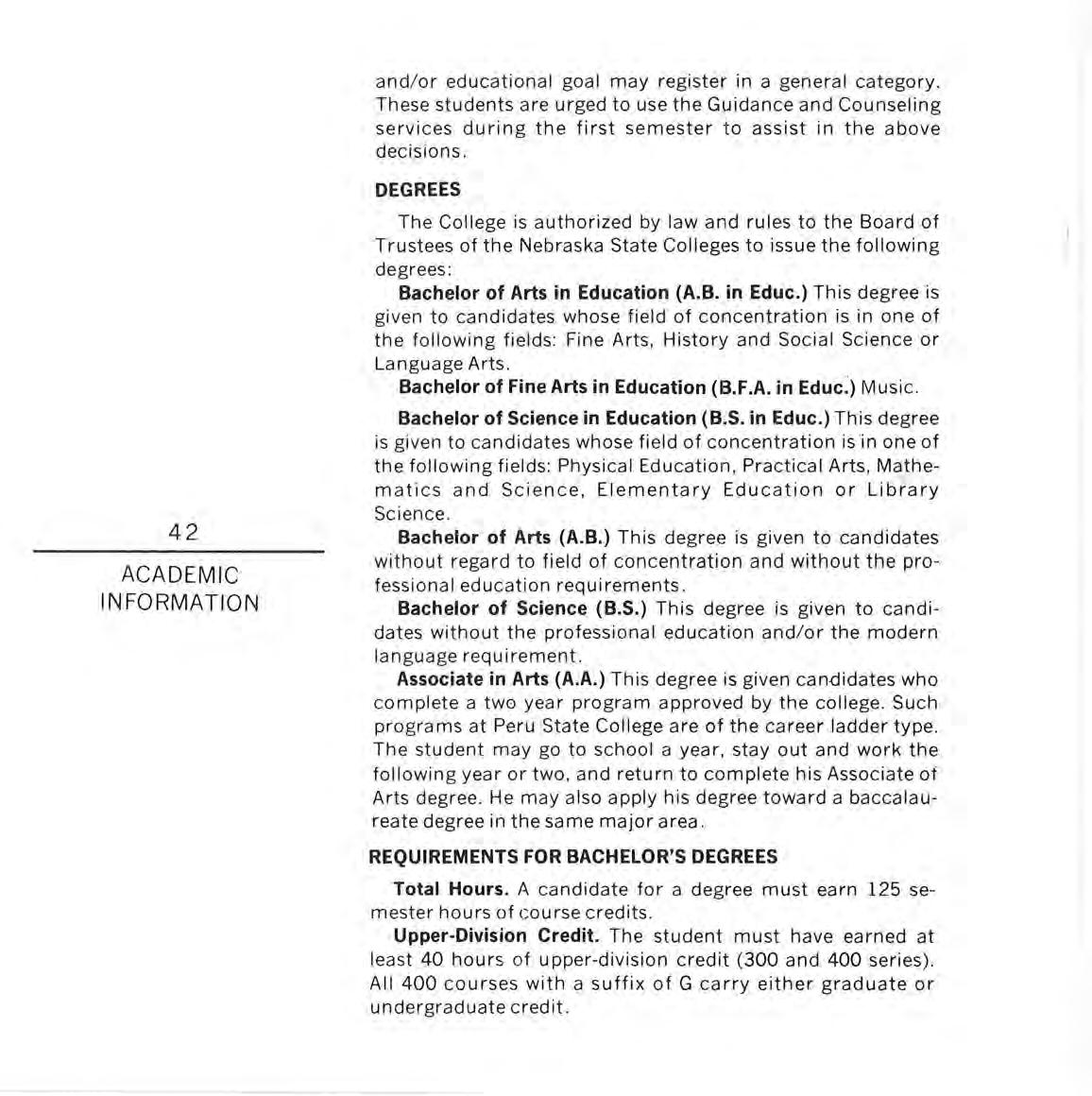
and / or educat ion al goa l may register in a general category. These students are urged to use the Guidance and Counseling services during the first semester to assist in the above decisions.
The College is authorized by law and rules to the Board of Trustees of the Nebraska State Colleges to issue the following degrees :
Bachelor of Arts in Education (A.B. in Educ.) This degree is given to candidates whose field of concentration is in one of the following fields : Fine Arts, History and Social Science or Language Arts.
Bachelor of Fine Arts in Education (B.F.A. in Educ:) Music.
Bachelor of Science in Education (B.S. in Educ.) This degree is given to candidates whose field of concentration is in one of the following fields: Physical Education, Practical Arts , Mathematics and Science, Elementary Education or Library Science
Bachelor of Arts (A.B.) This degree is given to candidates without regard to field of concentration and without the professional education requirements .
Bachelor of Science (B.S.) This degree is given to candidates without the professional education and/or the modern l anguage requirement.
Associate in Arts (A.A.) This degree is given candidates who comp let e a two year program approved by the college. Such programs at Peru State College are of the career ladder type. The student may go to school a year, stay out and work the following year or two, and return to complete his Associate of Arts degree . He may also apply his degree toward a baccalaureate degree in the same major area.
Total Hours. A candidate for a degree must earn 125 semester hours of course credits.
Upper-Division Credit. The student must have earned at least 40 hours of upper-division credit (300 and 400 series). All 400 courses with a suffix of G carry either graduate or undergraduate credit .
Grade Point Average. A grade average of 5.25 is required for all degrees in Teacher Education . An average of 5.00 is requi red for other degrees.
Resident Credit. A minimum of 30 resident credits is required. A student who has not been enrolled in on-campus classes within the 10 years prior to application for graduation, must earn a minimum of nine hours of on-campus credit in order to qualify for a degree The resident credit must be to the extent of 24 hours of the last 30 hours for a degree This resident requirement may be waived in cases where any of the required resident credit is earned in any one of the four State Colleges .
Professional School Residence Credit. Under certain circumstances in which a pre-professional student has successfully completed three years of training at Peru State College in a specific approved program, he may transfer to an accredited professional school during his fourth year, and qualify for the baccalaureate degree, provided he meets all other graduation requirements
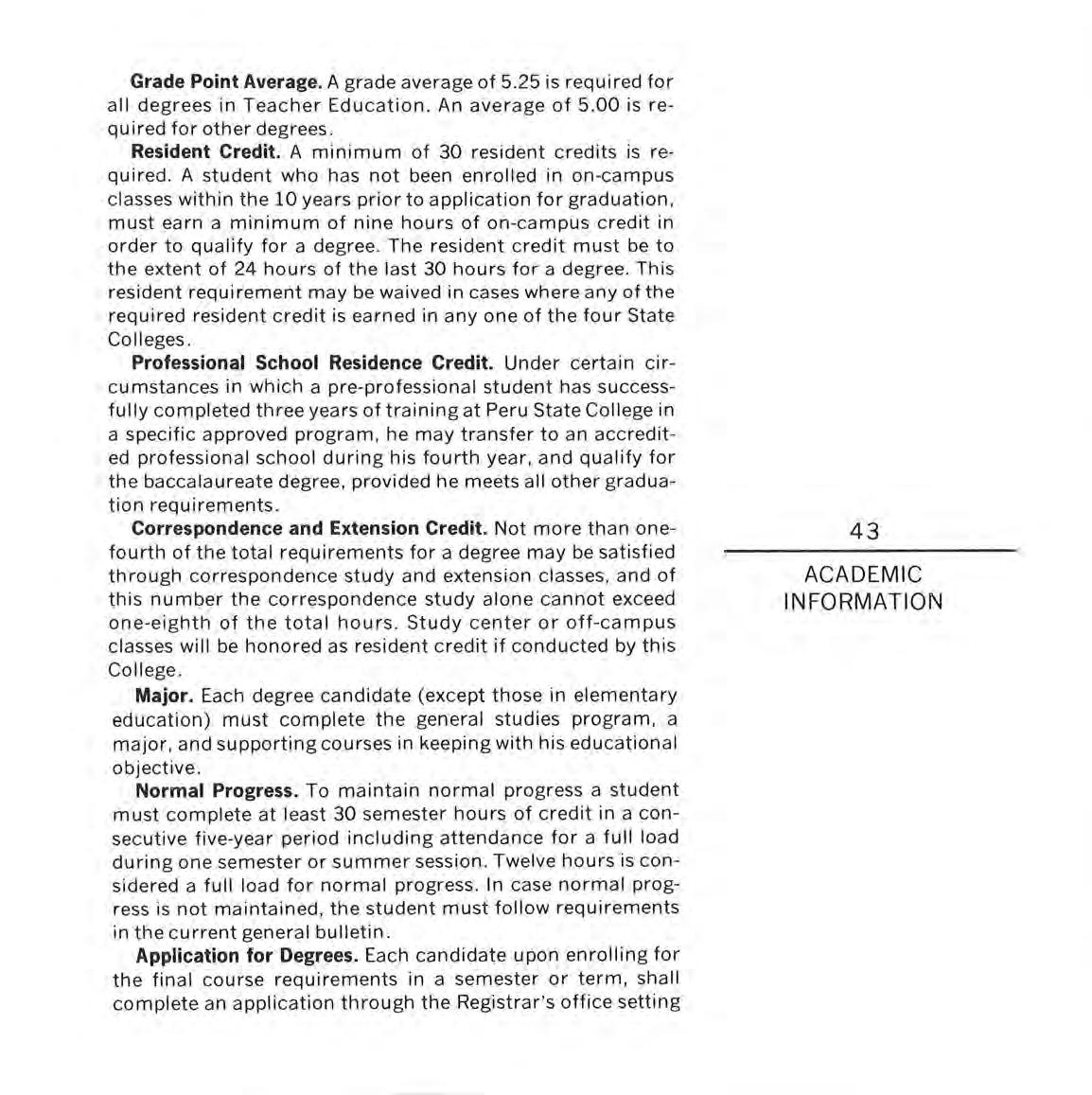
Correspondence and Extension Credit. Not more than onefourth of the total requirements for a degree may be satisfied through correspondence study and extension classes , and of this number the correspondence study alone cannot exceed one - eighth of the total hours . Study center or off - campus classes will be honored as resident credit if conducted by this College .
Major. Each degree candidate (except those in elementary education) must complete the general studies program, a major, and supporting courses in keeping with his educational objective.
Normal Progress. To maintain normal progress a student must complete at least 30 semester hours of credit in a consecutive five-year period including attendance for a full load during one semester or summer session. Twelve hours is considered a full load for normal progress. In case normal progress is not maintained , the student must follow requirements in the current general bulletin.
Application for Degrees. Each candidate upon enrolling for the final course requirements in a semester or term, shall complete an application through the Registrar's office setting
forth the degree(s), major(s) and payment of fee for graduation. This application must be completed within the first five weeks of the semester or within the first two weeks of the first summer session.
Students who elect to change their major at a point beyond the sophomore year should be aware of the probability of their graduation date being extended. Also, it may be necessary tor the student to follow the requirements in the current bulletin, rather than the one in effect at the time of matriculation.
Academic Progress forms are maintained to guide and record the student's progress toward his graduation. Two copies are maintained , one by the Registrar's office and the second by the student. This is necessary tor effective advisement, registration, plus the mutual protection of the student and the College. The accuracy of each registration and the checking of all requirements are the final responsibility of the student .
In general, students will follow the graduation requirements as outlined in the bulletin current at the time of matriculation Students whose progress t oward a degree has been irregular or interrupted to a point of five years or more since the date of matriculation will meet the requirements of graduation in the most recent bulletin. Students for whom a progress sheet has been made, and who are making normal progress toward a degree, will continue in their original bulletin.
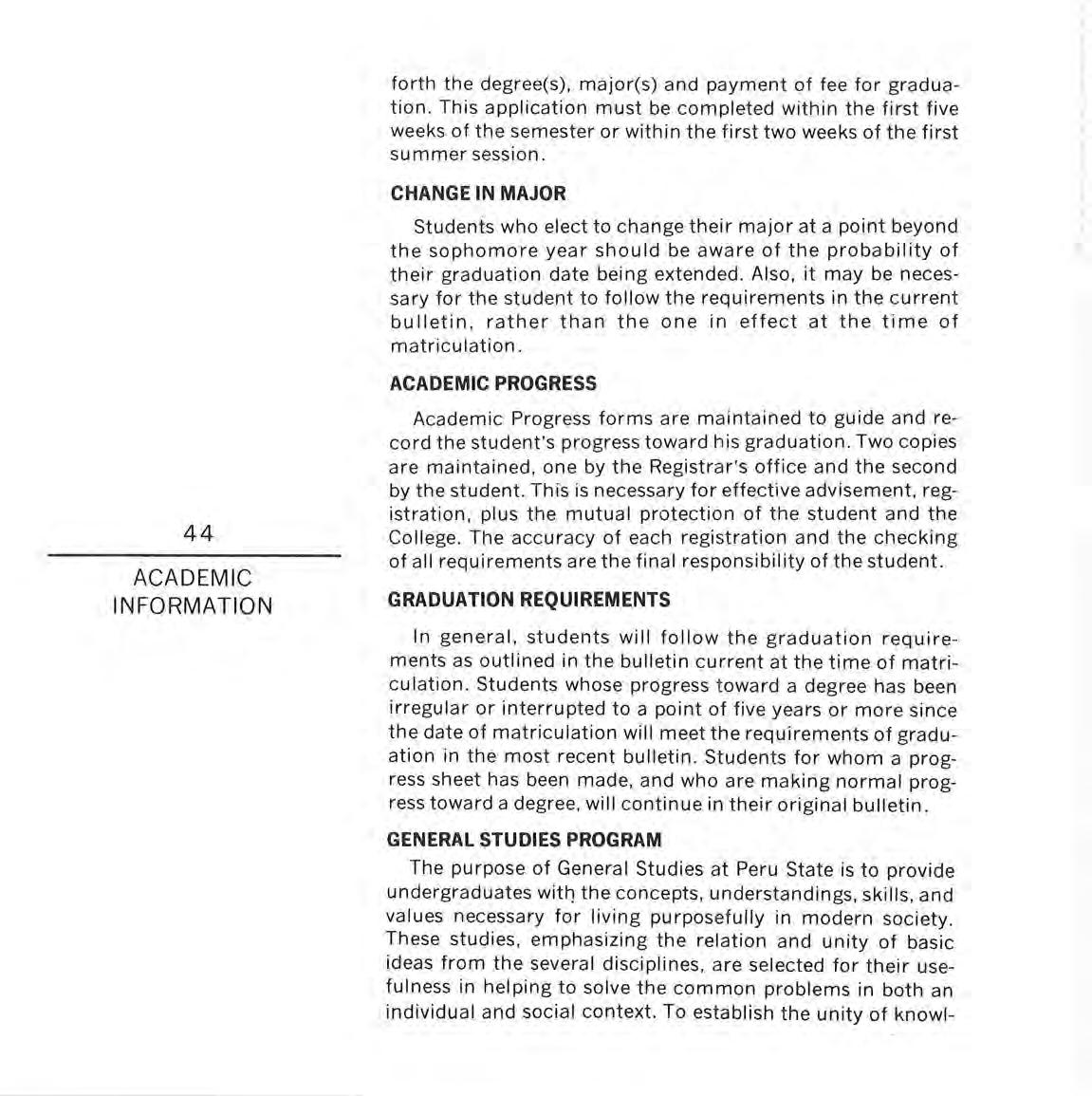
The purpose of General Studies at Peru State is to provide undergraduates with the concepts, understandings, skills, and values necessary for living purposefully in modern society. These studies, emphasizing the relation and unity of basic ideas from the several disciplines, are selected for their usefulness in helping to solve the common problems in both an individual and social context. To establish the unity of knowl -
edge and experience, the distinct courses in general studies share common goals in the sense that they all should promote a spirit of inquiry, relate knowledge from various fields, and encourage continued liberal education on the part of the student. Specific courses are held to a minimum, with the intent that students should be encouraged to select those courses most appropriate to their educational needs .
English Composition
(Students who rank at the 85th percentile or higher on the English portion of the ACT test may waive the Eng 101 requirement.)
Eng. 101 (3)
Eng. 302 (3)
Literature
Eng. 202 (3) Appreciation of Literature
Eng . 318 (3)
Nee-Classical Writers
Eng. 323 (3) Victorian Period
Eng . 324 (3)
Eng. 325 (3)
American Literature I
American Literature II
Communications
Bus. 445G (3) Conference Leading
Speh 152(3)
Fundamentals of Speech
Speh. 254(3) Public Speaking '
Speh. 260 (3) Introduction to Radio and Television
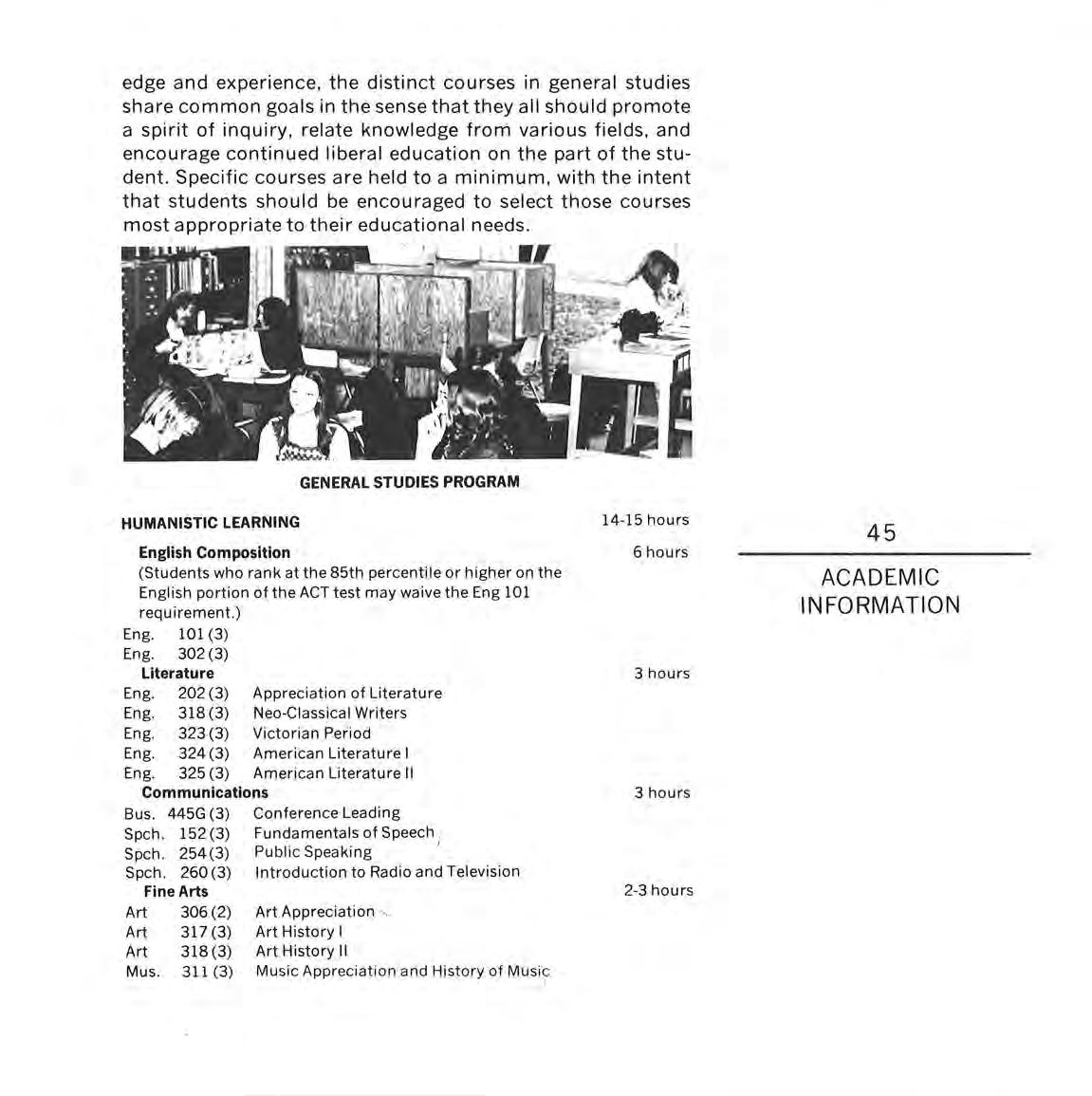
Fine Arts
Art 306 (2)
Art 317(3)
Art 318 (3)
Art Appreciation ,
Art History I
Art History II
Mus 311 (3) Music Appreciation and History of Musi ~
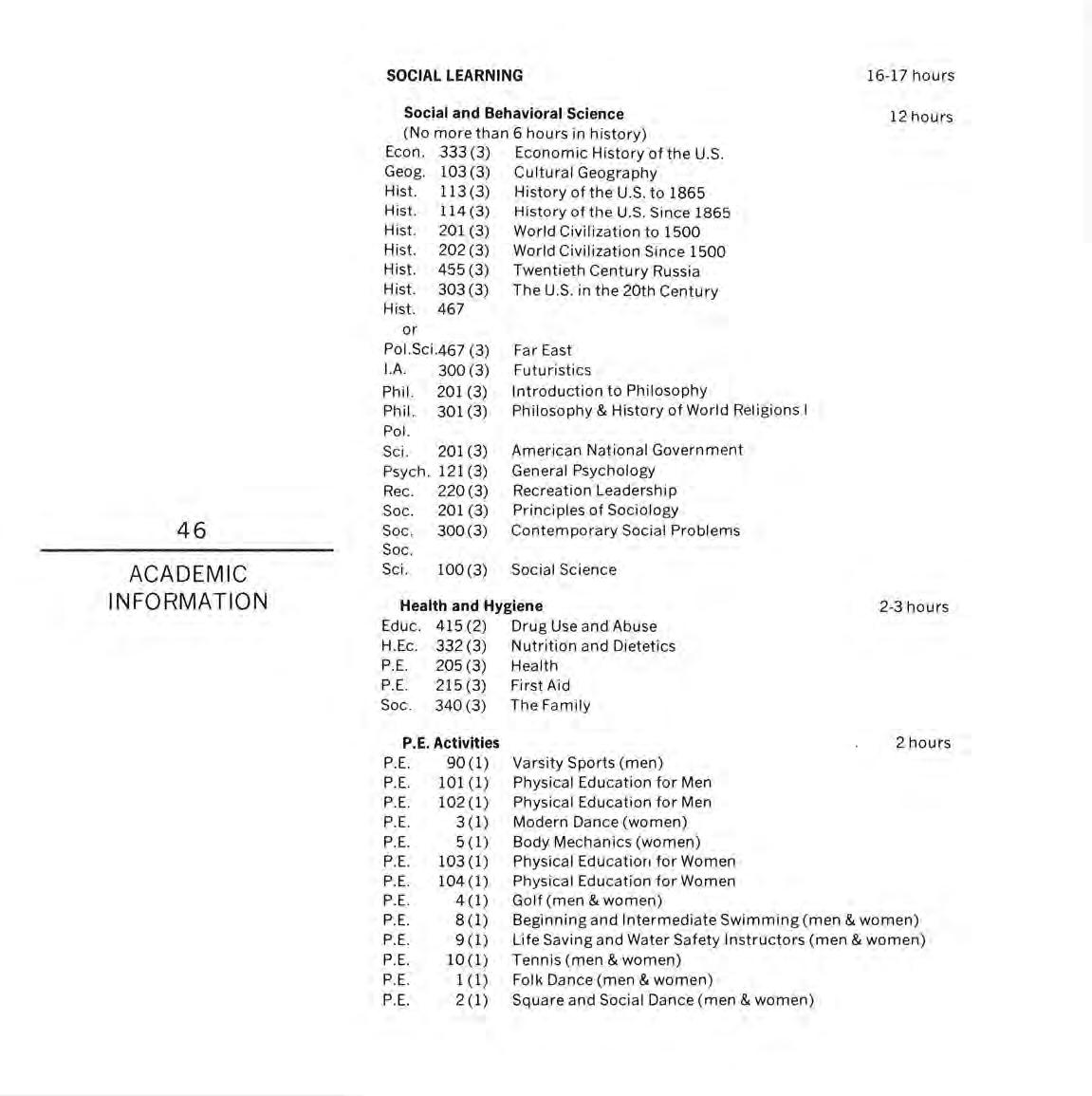
Re
Life
Folk
Square
8-9 hours
Mathematics 2-3 hours
(Students who rank at the 85th percentile or higher on the mathematics section of the ACT test may waive the mathematics requirement.)
Ma th 100 or Bus 100 (3) Business Mathematics
Math 10 (1) Elementary Des c riptive Statisti c s
Math . 20 (1) Probability
Math. 30 (1) Logic and Sets
Math. 40 (1) Geometry
Math. 50 (1) Practical Trigonometry
Math. 60 (1) Surveying
Math. 70 (1) Slide Rule and Logarithms
Math. 80 (1) Math Appreciation
Math 101 (3) College Algebra
Math. 102 or Bus 102 (3) Introduction to Data Processing
Math. 105 (5) Fundamentals of Mathematics
Math. 200 (3) Basi c Concepts of Ma thematics
Math. 300 (3) Algebra and Geometric Concepts
Math. 340 or
Bus. 340 (3) Statistics
Science
Biol. 101 (3) Plant Biology
Biol. 102 (3)
Chem. 101 (4)
Chem. 102 (4)
Geol. 201 (4)
Animal Biology
General Chemistry I
General Chemistry II
General Geology
Geol. 202(1-3) Rocks and Minerals
Geol. 203 (1-3) Introduction to Fossils
Geol. 304(3) Meteorology and Climatology
G.Sci . 201 (3)
Biological Science (Elementary Educ. only)
G.Sci. 202(3) Physical Science (Elementary Educ. only)
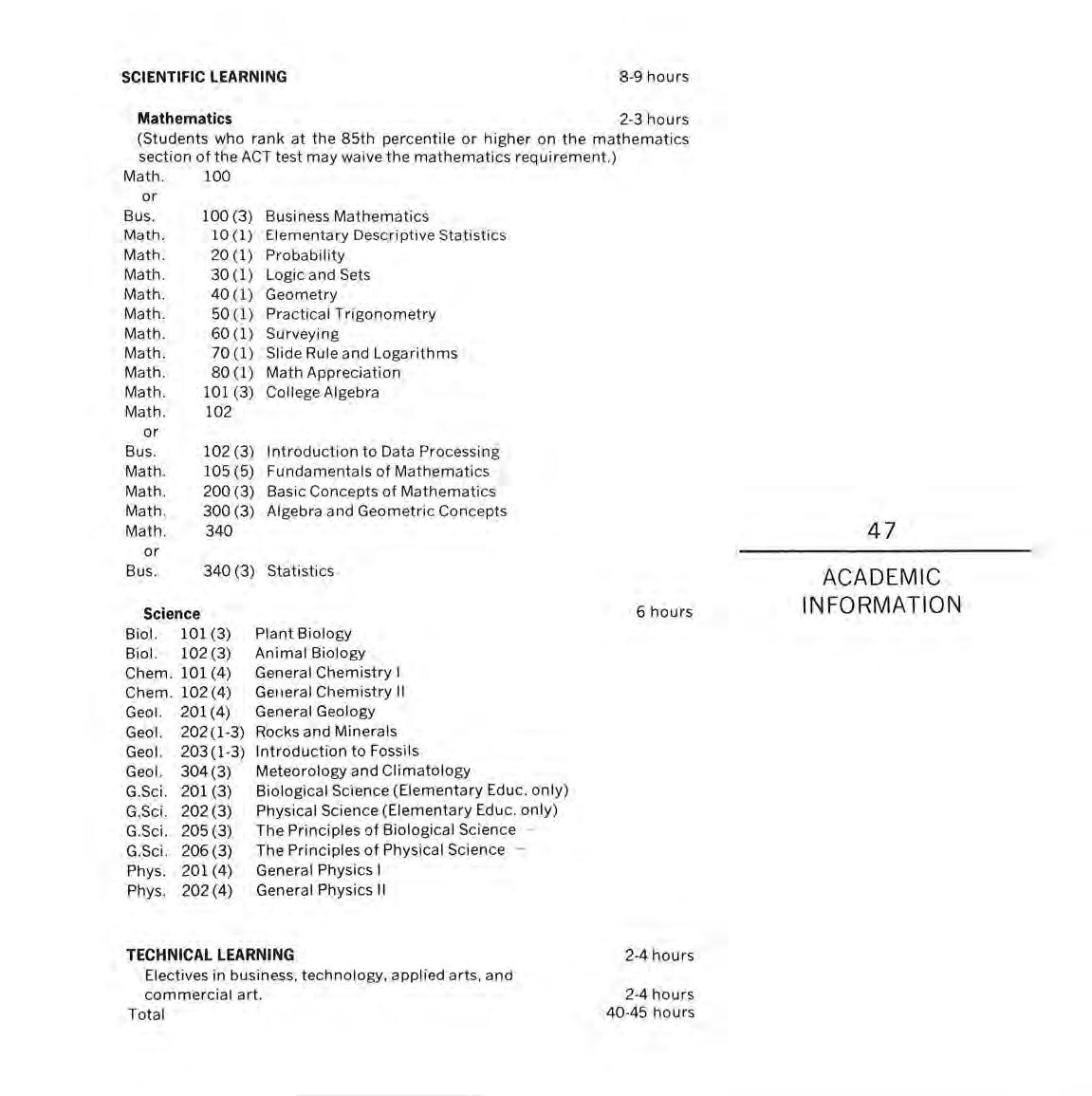
G.Sci. 205 (3) The Principles of Biological Science -
G.Sci. 206(3) The Principles of Physical Science
Phys. 201 (4)
Phys. 202 (4)
General Physics I
General Physics II
Electives in business, technology , applied arts. and commercial art.
6 hours
hours
Evening College Courses. The College makes available an on-campus evening program of course offerings beneficial in meeting the educational needs of students On -campus evening classes are offered each semester.
Off-Campus Courses. Off-campus courses are made available at learning center sites in certain southeast Nebraska communities . The courses which are available depend upon priority of requests and the available instructional personnel. Requests for information should be directed to the Vice President of Academic Affairs .
Graduate Courses. Graduate courses are offered periodically for purpose of certification and / or transfer . If a student wishes to transfer credit, prior approval should be secured from the graduate school to which the credit is to be transferred. Information may be obtained by writing to the Vice President of Academic Affairs .
Summer Session. A 10 - week summer session is divided into two five-week terms which makes it possible for a student to earn a maximum of 12 semester hours of credit, six hours in each term. Courses are available which make it possible for a recent high school graduate to begin his post secondary education during the summer. Request for information concerning the summer session and summer school bulletin should be directed to the Director of Summer Sessions.
This implies attainment beyond the minimum for admission to the College. The status may be acquired by (1) present-
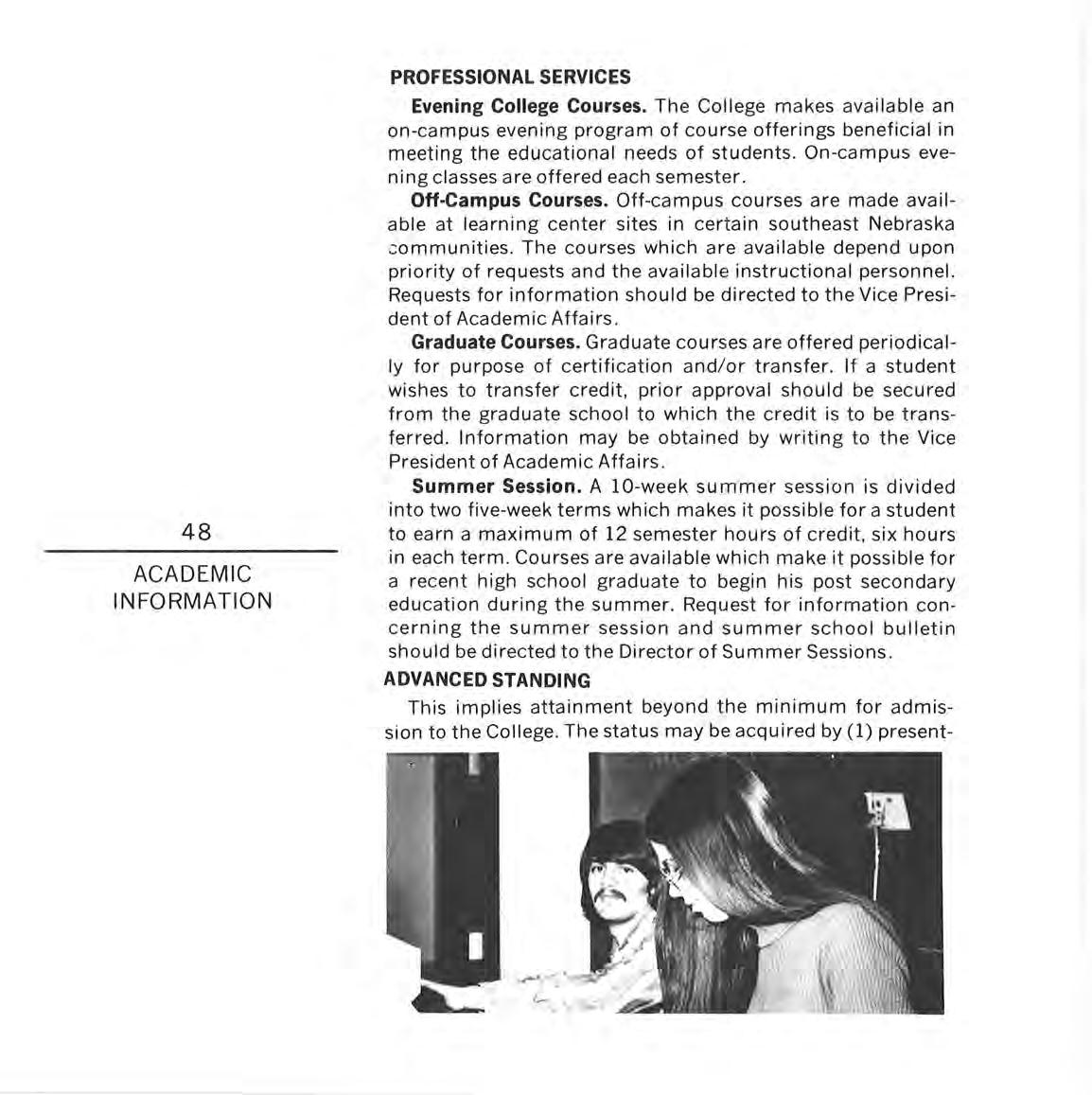
ing work completed in another college; (2) demonstrating proficiency in a certain field, thus removing the requirement of certain prerequisites. The latter may be with or without credit.
Applicants for admission from other colleges must, in addition to submitting the formal app lication, request each college to send an official transcript and evidence of dismissal in good standing . Failure to list on the application all colleges previously attended will be cause for dismissal.

A maximum of 66 semester hours applicable toward a degree, based on 125 hours, will be accepted from applicants transferring from a junior college.
Peru State College will accept in transfer credit earned at another college or university. This condition applies also to credit earned on an interim basis at another college while essentially a student at Peru State College.
A transfer student who has earned an Associate of Arts or Associate of Science degree will be regarded as having met the general studies program of Peru State provided the program of the college from which the individual is transferring has been approved by the Academic Affairs Commission of this College.
Applicants transferring to Peru State College from a nonaccredited college must meet all requirements of a first time student. Each application must be accompanied with an official transcript of all previous credit sent to the office of admission. Credits earned at non-accredited institutions will be accepted on a provisional basis. This credit is to be validated upon satisfactory completion of 30 semester hours of degree credit at Peru State College.
A veteran of the armed forces who has received an honorable discharge from active duty will generally be granted credit for his military experiences in accordance with the recommendations of the American Council on Education.
Institutional Exams. Students, who by reason of experience and/or personal improvement, may qualify for credit in lower division courses through the procedure of an interview and a written examination. The student must, through an interview, satisfy a faculty committee that he has had a formal or informal experience in which the course content may have been acquired. If the committee deems the above conditions have been met. the student will be given a written comprehensive examination.
The amount of credit to be allowed, the course for which substitution, if any , is made, and the particular graduation requirements which may be satisfied, will be determined by the dean of the school and his committee and will be subject to all general graduation requirements. The student must register for the course and pay the tuition charges before writing the examinations
College Level Examination Program. A student may earn credit by examination through the College-Level Examination Program (CLEP) prepared by the College Entrance Examination Board. Details of this procedure may be obtained from the dean of the school representing the student's field. The following subject areas represent possible credit by examination through the above procedure :
American Government
American History
General Psychology
Human Growth and
American Literature II Development
Analysis and Interpretation
Introduction to Business of Literature Management
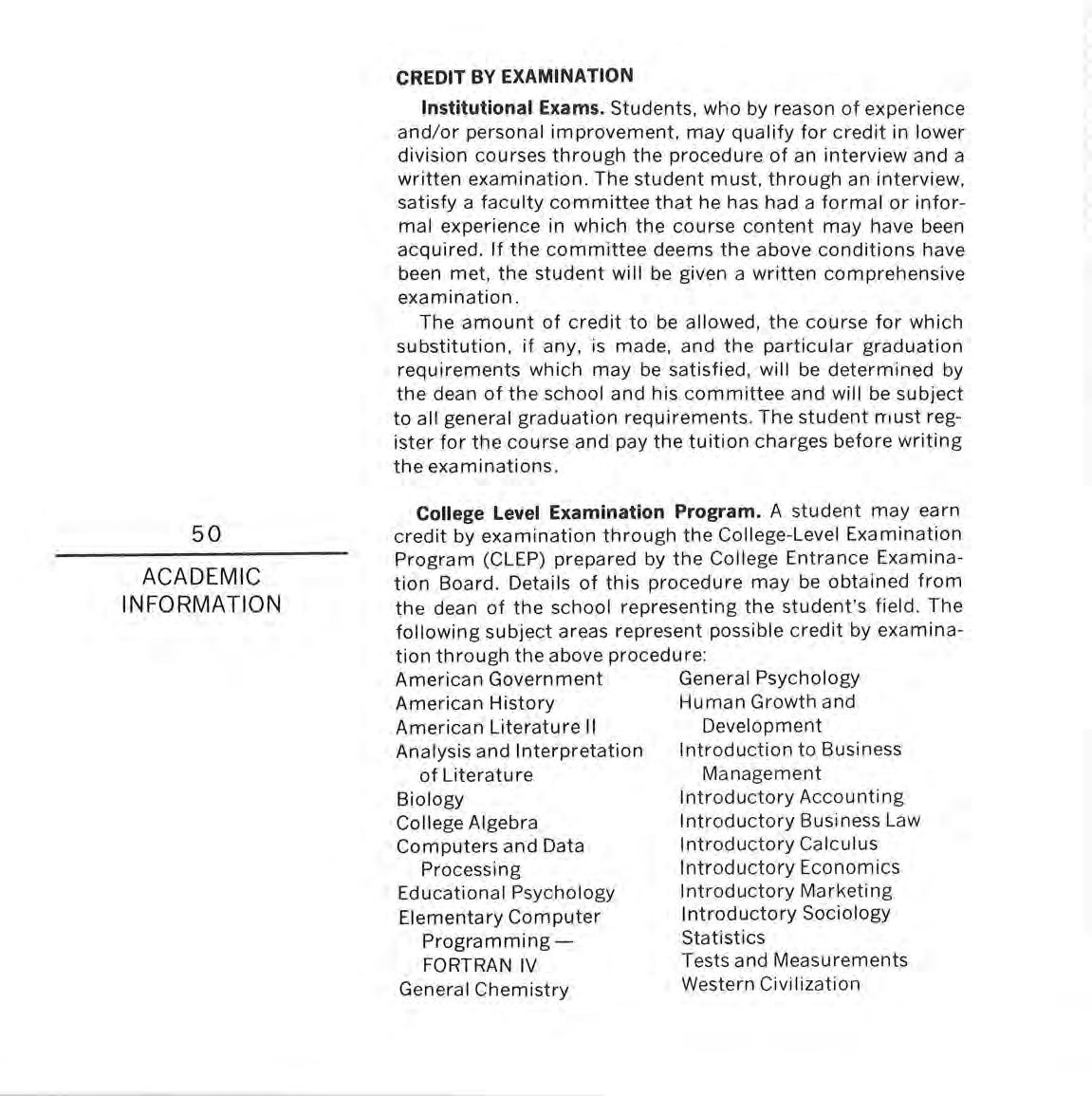
Biology
College Algebra
Computers and Data
Processing
Educational Psychology
Element ary Computer
Introductory Accounting
Introductory Business Law
Introductory Calculus
Introduc tory Economics
Introductory Marketing
Introductory Sociology
Programming - Statistics
FORTRAN IV
General Chemistry
Tests and Measurements
Western Civilization
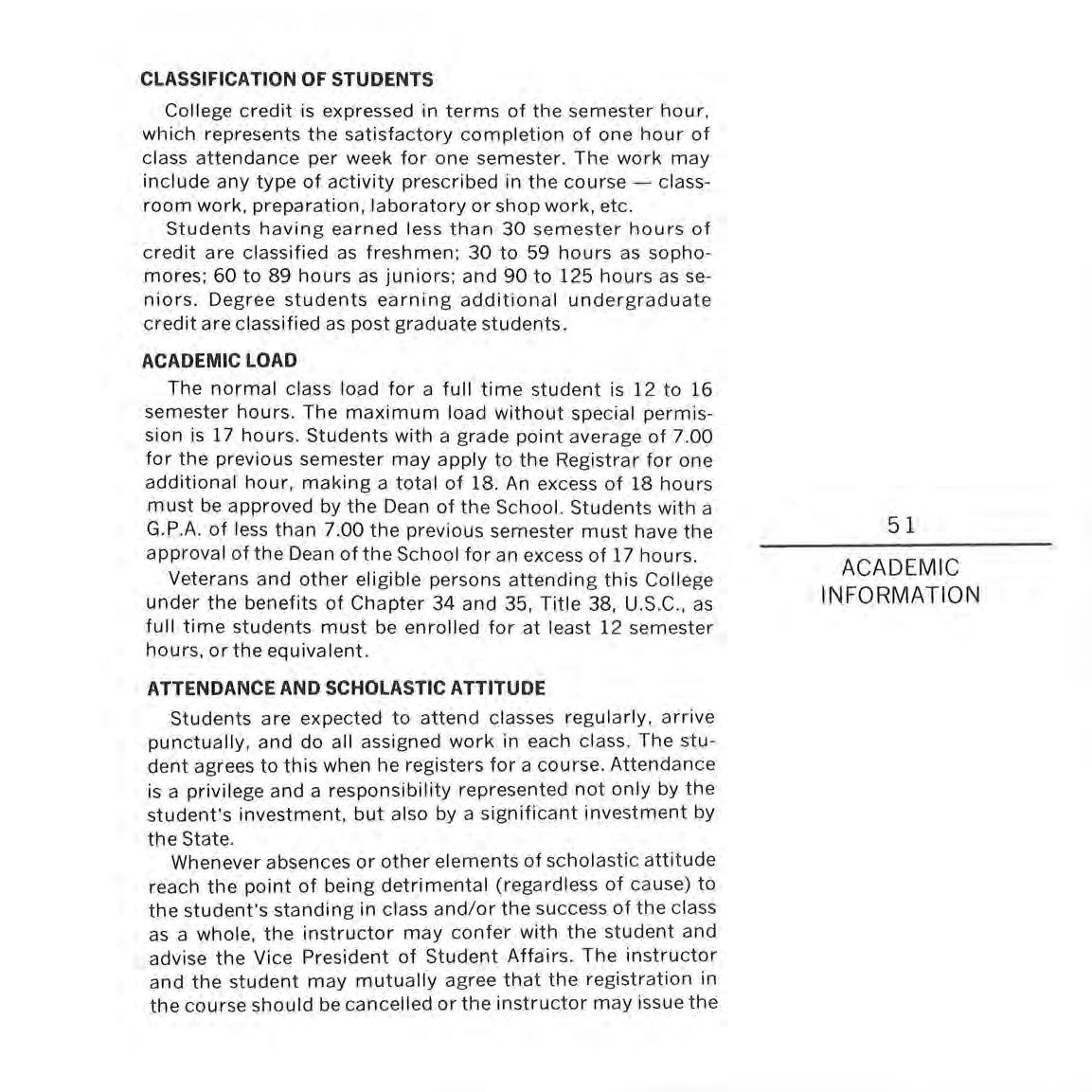
College credit is expressed in terms of the semester hour, which represents the satisfactory completion of one hour of class attendance per week for one semester . The work may include any type of activity prescribed in the course - classroom work, preparation, laboratory or shop work, etc.
Students having earned less than 30 semester hours of credit are classified as freshmen; 30 to 59 hours as sophomores; 60 to 89 hours as juniors; and 90 to 125 hours as seniors. Degree students earning additional undergraduate credit are classified as post graduate students .
The normal class load for a full time student is 12 to 16 semester hours. The maximum load without special permission is 17 hours. Students with a grade point average of 7.00 for the previous semester may apply to the Registrar for one additional hour, making a total of 18 . An excess of 18 hours must be approved by the Dean of the School. Students with a G.P.A. of less than 7.00 the previous semester must have the approval of the Dean of the School for an excess of 17 hours .
Veterans and other eligible persons attending this College under the benefits of Chapter 34 and 35, Title 38, U.S.C., as full time students must be enrolled for at least 12 semester hours, or the equivalent .
Students are expected to attend classes regularly, arrive punctually, and do all assigned work in each class. The student agrees to this when he registers for a course . Attendance is a privilege and a responsibility represented not only by the student's investment , but also by a significant investment by the State.
Whenever absences or other elements of scholastic attitude reach the point of being detrimental (regardless of cause) to the student's standing in class and/or the success of the class as a whole, the instructor may confer with the student and advise the Vice President of Student Affairs The instructor and the student may mutually agree that the registration in the course should be cancelled or the instructor may issue the
student a "scholastic a l ert." Future conferences for the same or related reasons, most like ly will result in the student be i ng dropped from the c l ass If the student requests, the Vice President of Student Affairs may be asked to participate in the decision. The above is the on ly sanction as far as excessive absences and/or other elements of scho l astic attitude are concerned.
A nine-point grading system is employed to evaluate the qua li ty of the student's ach i evement.
Percentage Mark i ng to designate fai l ure and Grade Meaning Equivalents other irregu l arities:
9 Exceptional 95-100 X Incomplete
8 Superior 90- 94 WP Authorized withdrawal~
7 Very Good 85- 89 passing work at time
6 High Average 80 - 84 WF Authorized withdrawal ~
5 Average 75- 79 failing work at time
4 Low Average 70 - 74 w Not graded
3 Be l ow Average 65- 69 w Withdr a wal - Not gra d ed
2 Poor 60- 64 F 60-Below
The grades in numbers indicate the value of each semester hour of credit and also become the means for calculating the student's grade point average (GPA) to compare with schol a rship stand a rds. Students are urg ed to ca lc ul ate their own GPA from time to time and re a lize their own status. The following two examples will be valuable in understanding the ca lculations :
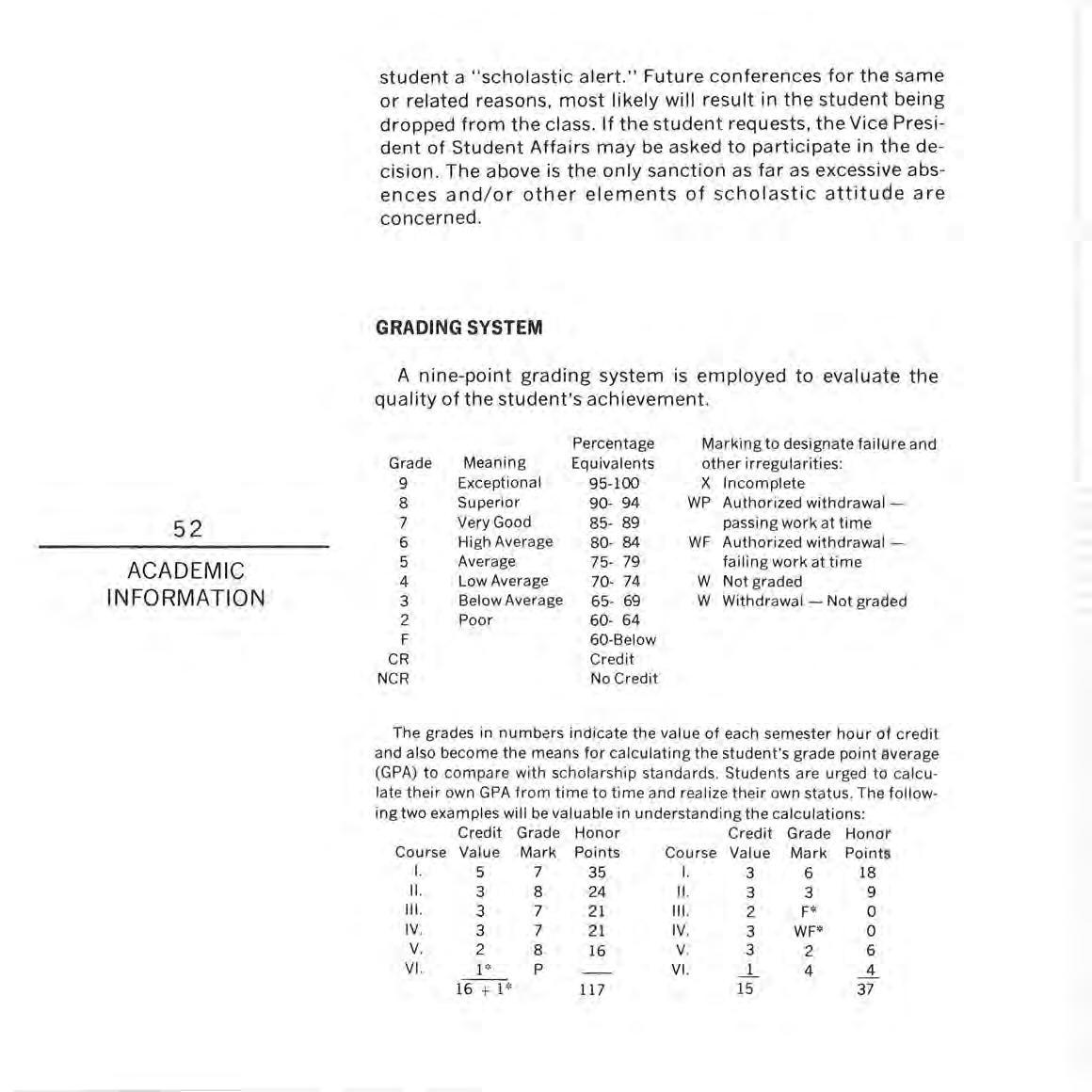
Credit Grade Honor
Credit Grade Hono r
GPA = 117 + 16 = 7.31
*When credit is ungraded, it is not included in divisor for GPA.
GPA = 37 + 15 = 2.47
(This GPA subjects the student to Probation.)
*This effects a lower GPA since credit value is part of divisor. If WP, the credit value is not used.
Incomplete (X) work may be completed and cleared through the instructor to earn a passing mark, and this must be done within the next semester or the record will show F (Failing).
A candidate for a baccalaureate degree must earn at least 125 semester hours with a minimum grade point average of 5.00. A minimum GPA of 5.25 must be earned for degrees in Education. A candidate for the Associate of Arts degree must earn at least 60 semester hours with a minimum grade point average of 5.00.
A student to be in good standing academically must maintain the above required GPA for the respective degree being pursued. A notice of unsatisfactory scholarship is forwarded to the student at the end of the semester if the appropriate GPA is not being maintained. The notice is not a penalty, but a warning to notify the student that improvement is needed. The notification will provide guidelines and recommendations to the student whereby positive action on the part of the student can result in the attainment of the required minimum scholastic standard or other appropriate actions.
To provide additional information to students in regard to their academic work, grades are reviewed at the end of each nine weeks. A mid-term report for low or failing work is provided the student. A student receiving this notification will be advised to confer with the instructor and his faculty advisor.
The grades of all students not meeting the required minimum GPA are reviewed by the Admissions and Standards Committee following the close of each semester. If deemed appropriate by Committee action, a student can be placed on "academic probation," subject to academic suspension, if appropriate improvement is not maintained during the following semester. Academic suspension is usually for one semes-
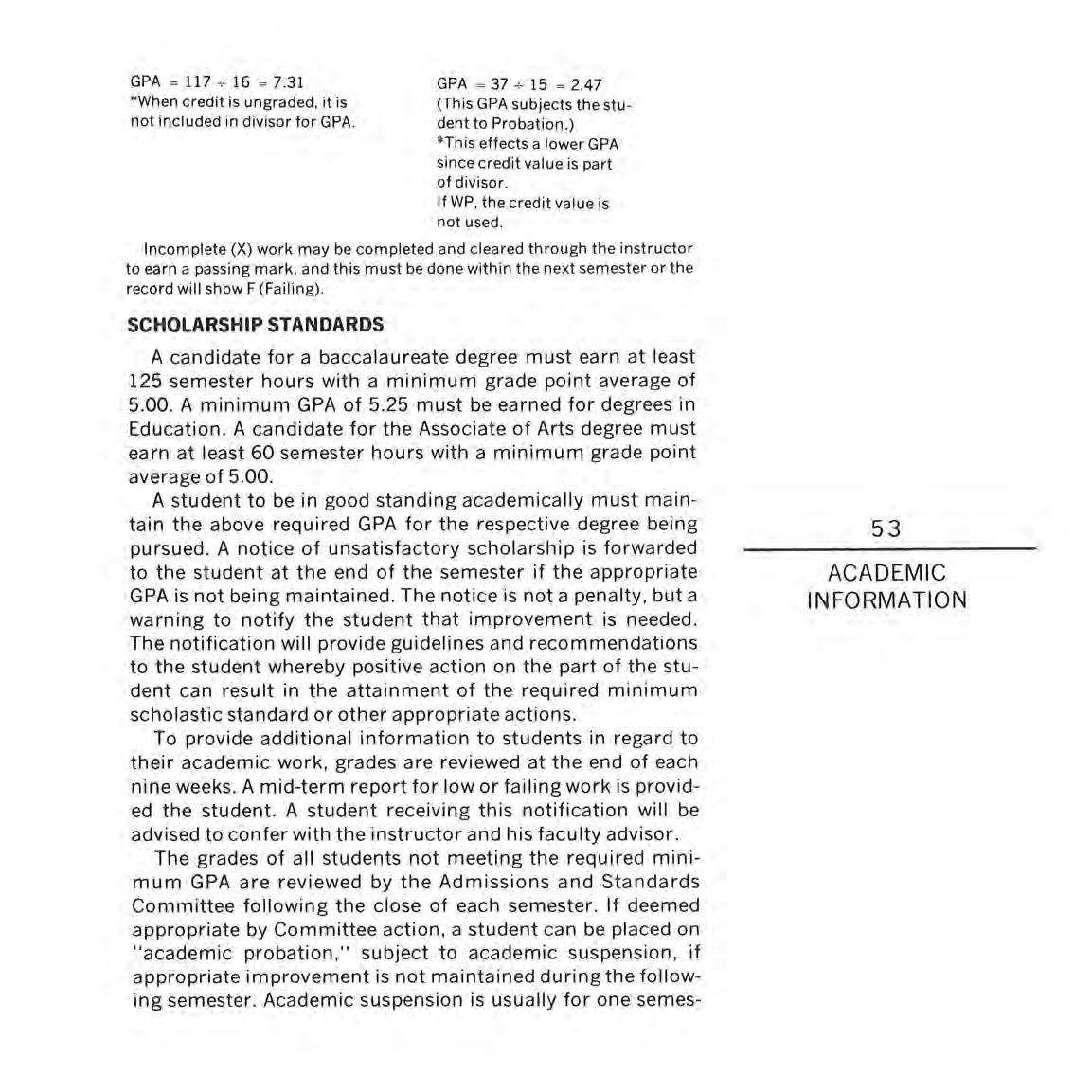
ter, excluding summer sessions, after which time the student may apply for readmission to the college . If a student believes there are exceptions to be noted in his case, he may appeal the suspension to the Admissions and Standards Committee The College also retains the right to suspend a student without first having placed the student on academic probation. In addition, suspension may be on a permanent basis .
Honors courses are available for t hose students who meet the scholastic requirements. Further details may be obtained from the dean of the school in which the student is majoring
At the end of each semester the Vice President of Academic Affairs publishes the Honor Roll, which includes the names of students who have earned a grade point average of 7.25 and higher for that term .
Graduation honors are conferr e d on bachelor's degree candidates who have earned at least 60 hours in this College. The work of eight semesters, or the equivalent, will be considered in the grade point average The scholastic requirements are as follows :
With highest distinction
With high distinction
With distinction
To register for a course on an audit basis implies no credit. The student pays the regular tuition fee, and is not required to write tests, examinations, and/or papers .
Private instruction is available in music Music students will receive priv a te instruction without charge, in relation to their major . Other students will pay the r a te per lesson as listed in the Financial Information section of c atalog
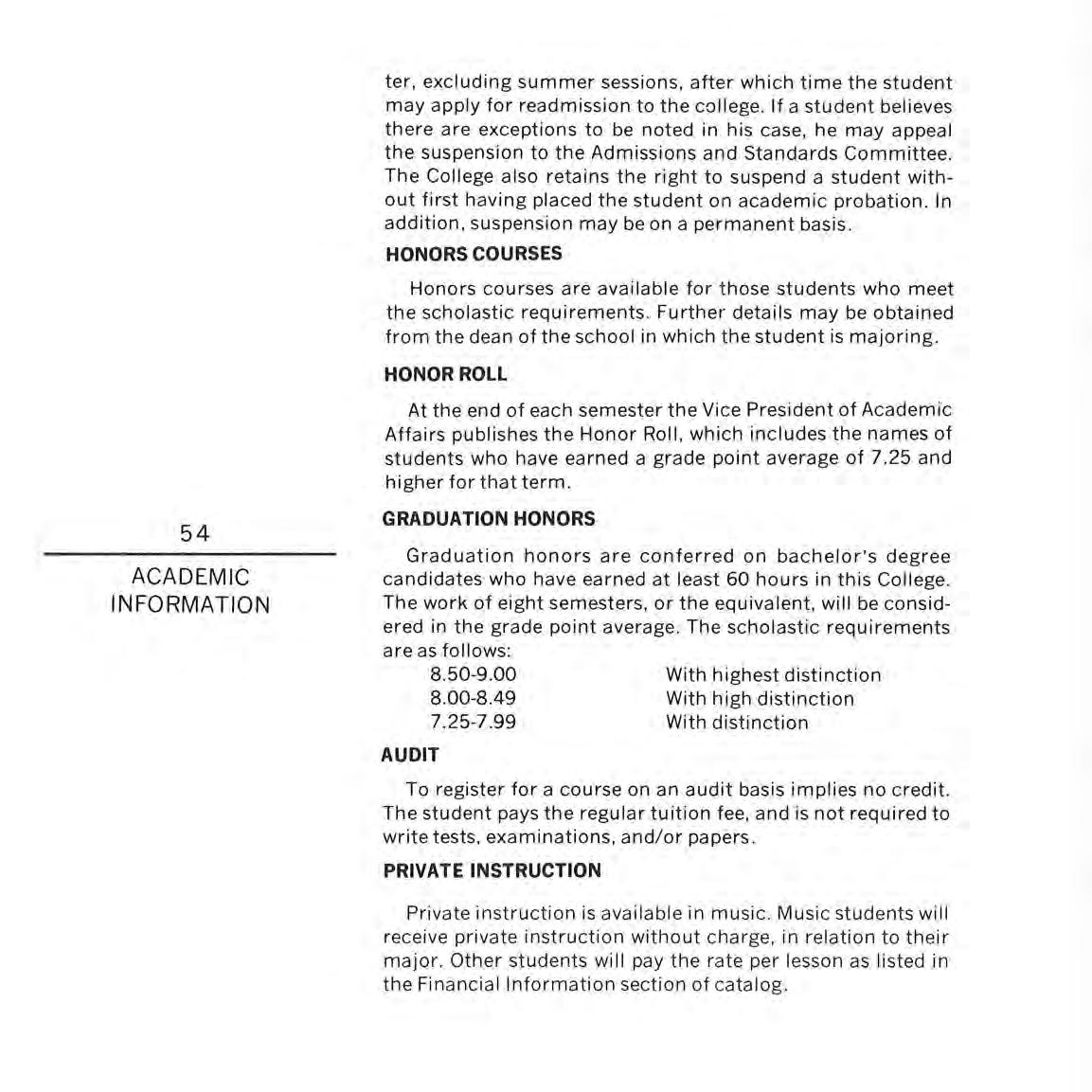
A student may and is urged to repeat any course in which he has failed. There may be occasions when a student chooses to repeat a course purely for review, to be taken on an audit basis, without a change of grade.
The accuracy of each registration as related to class periods, sections, days and other possible conflicts is the responsibility of the student. Also, the ultimate responsibility for the meeting of all requirements rests with the student . In the event a change in program is unavoidable following a registration , the student must secure the approval of the advisor and the instructor . No courses may be added after two weeks . When applicable, a refund will be made. A fee of $5.00 is collected for any change after the fifth day of classes.
A student finding it necessary to withdraw from a class at any time must secure the permission of the advisor and instructor. Students withdrawing without official approval will be graded "F "
An official withdrawal in the first six weeks of a semester or the first week of a summer session will be recorded as "W" on the permanent record. A withdrawal between the sixth and twelfth week will be graded " WP" (Withdrawn Passing) or "WF" (Withdrawn Failing). A withdrawal after 12 weeks will be graded "F," except in extenuating circumstances or under conditions beyond the student's control. An instructor may recommend that a student withdraw from a class because of absences and / or other reasons.
If it is necessary for a student to withdraw from College , he secures the appropriate form from the Director of Counseling . This form must be presented to various members of the faculty for their signatures. The withdrawal form is filed in the Registrar's office. The reimbursement of fees is made from the Business office according to the refund schedule.
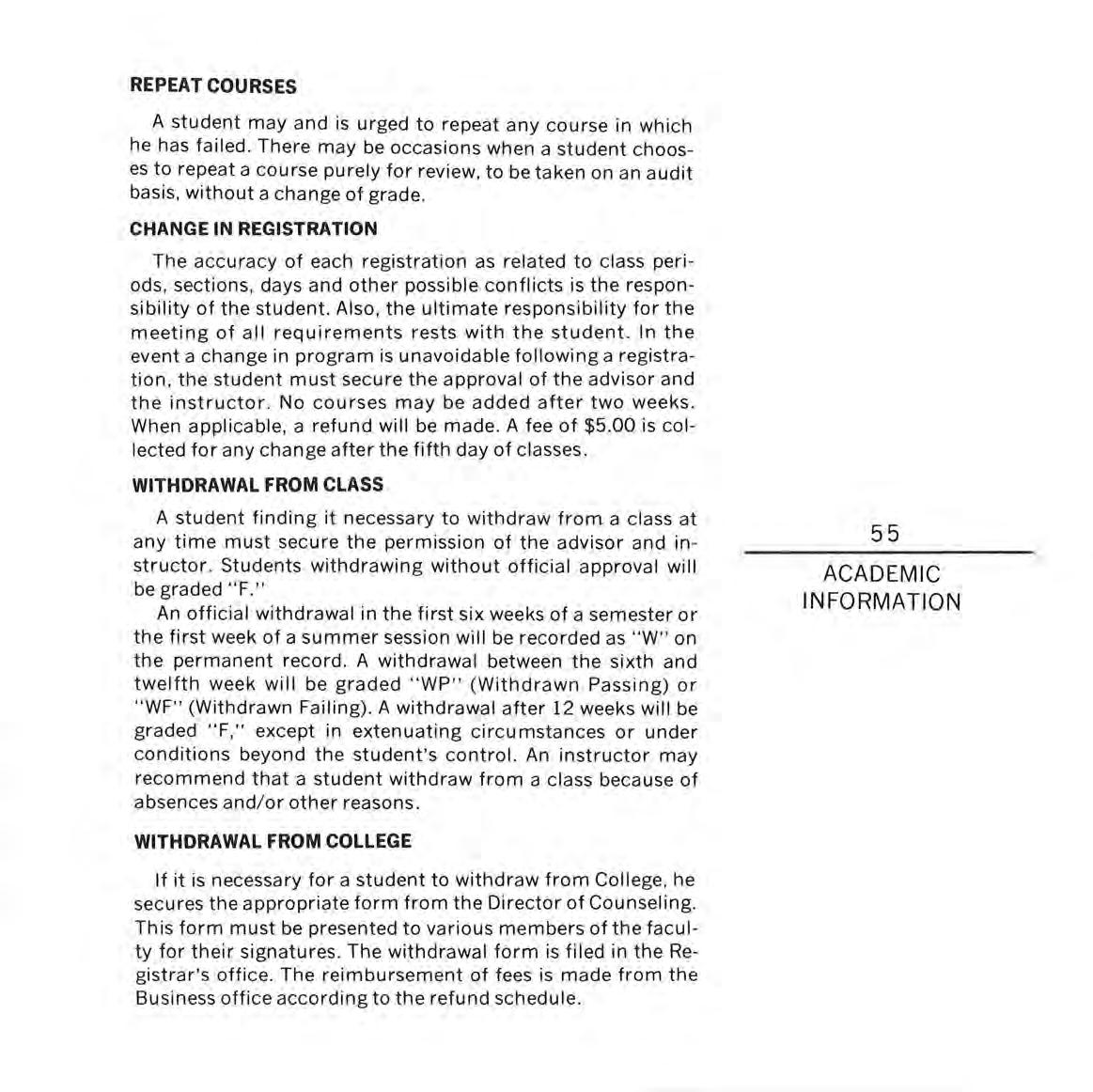
Each student may request and receive at any time one free transcript of his academic record . There is a fee of $1.50 for each additional transcript No transcript will be issued if the student has not met all financial obligations to the College .
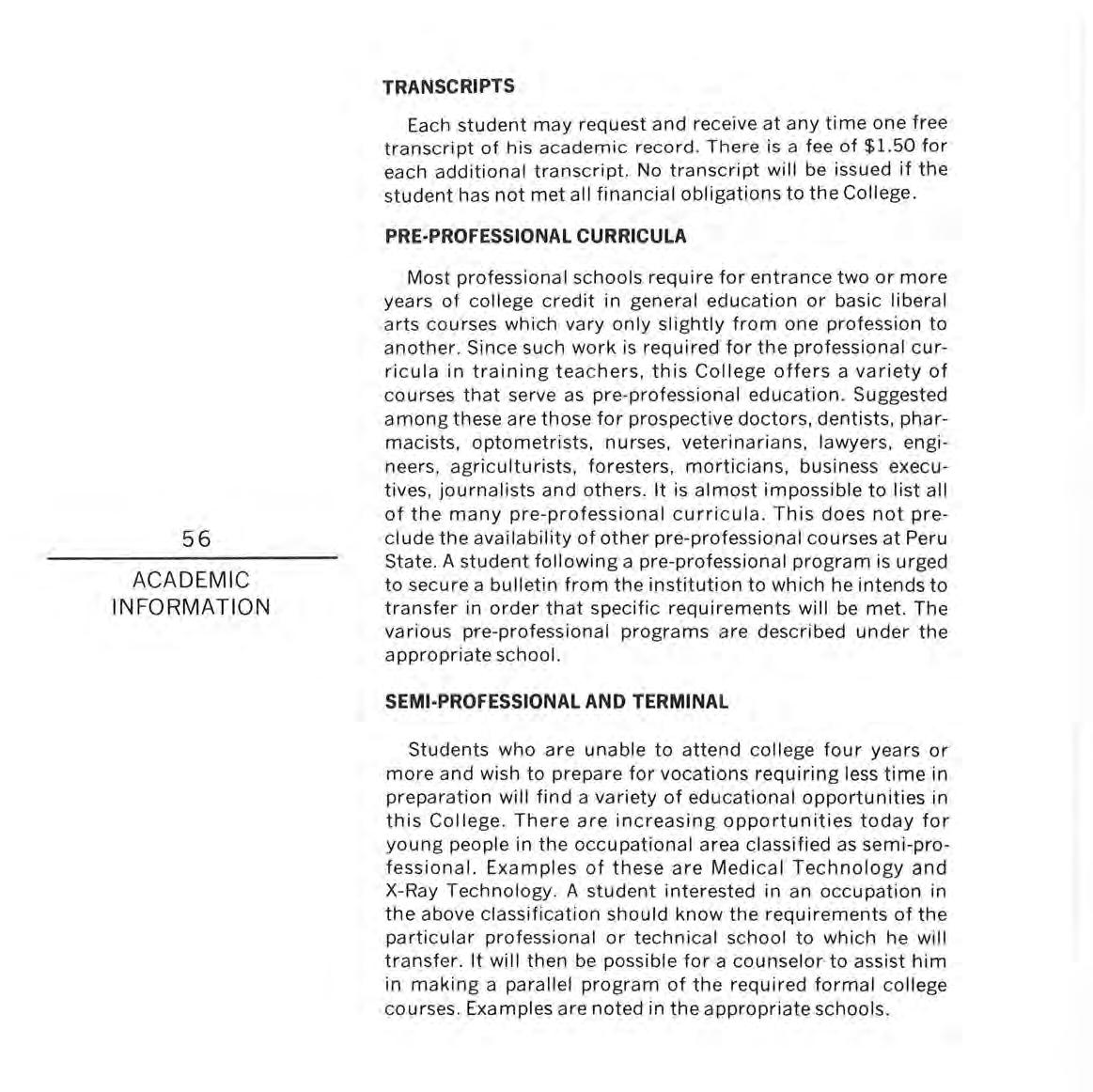
Most professional schools require for entrance two or more years of college credit in general education or basic liberal arts courses which vary only slightly from one profession to another . Since such work is required for the professional curricula in training teachers, this College offers a variety of courses that serve as pre-professional education. Suggested among these are those for prospective doctors, dentists, pharmacists , optometrists, nurses, veterinarians, lawyers , engineers , agriculturists , foresters , morticians, business executives, journalists and others. It is almost impossible to list all of the many pre-professional curricula . This does not preclude the availability of other pre-professional courses at Peru State A student following a pre-professional program is urged to secure a bulletin from the institution to which he intends to transfer in order that specific requirements will be met. The various pre-professional programs are described under the appropriate school.
Students who are unable to attend college four years or more and wish to prepare for vocations requiring less time in preparation will find a variety of educational opportunities in this College. There are increasing opportunities today for young people in the occupational area classified as semi-professional Examples of these are Medical Technology and X-Ray Technology . A student interested in an occupation in the above classification should know the requirements of the particular professional or technical school to which he will transfer It will then be possible for a counselor to assist him in making a parallel program of the required formal college courses Examples are noted in the approp r iate schools
Applied Arts andTechnglogy
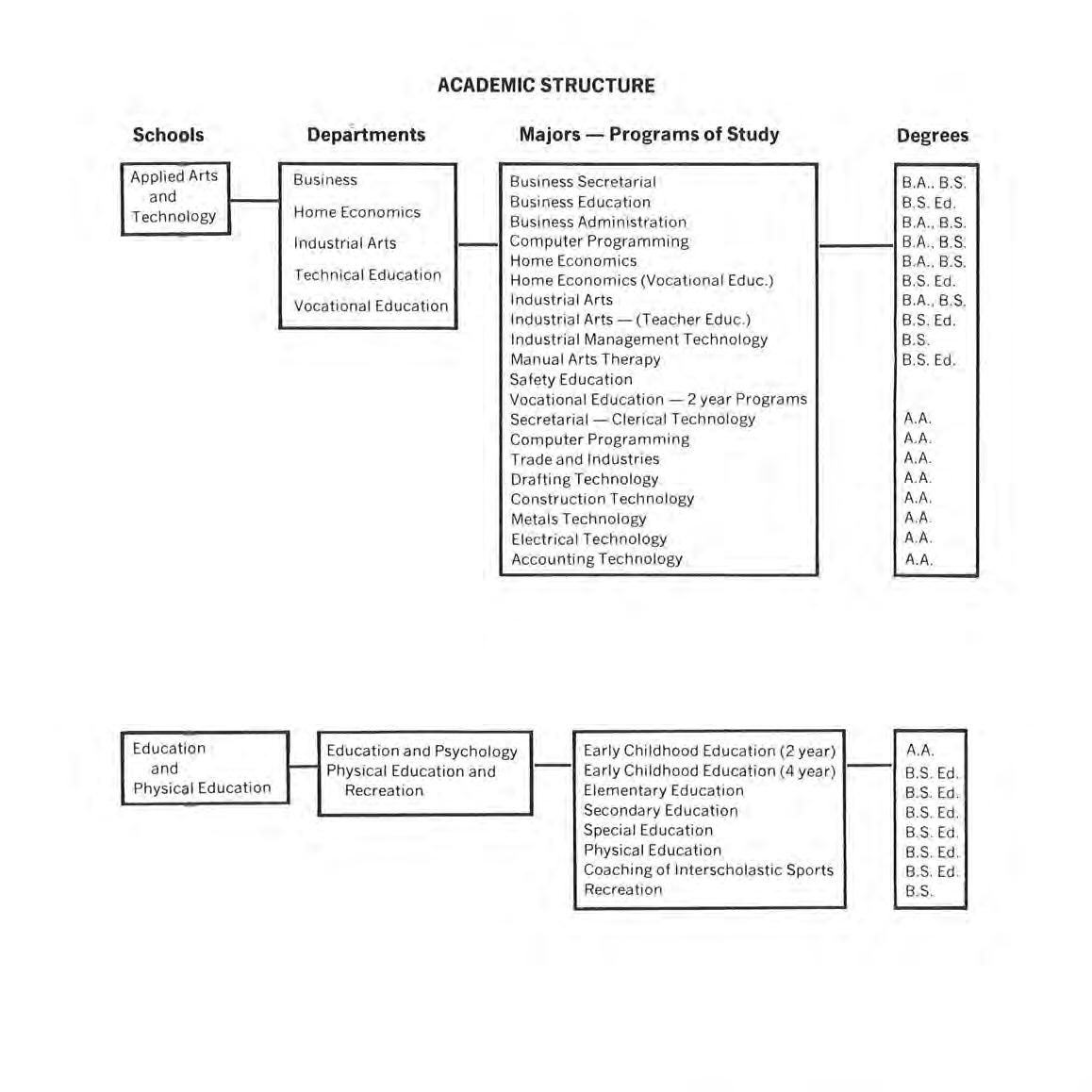
Educati o n a nd
Physical Education
Departments
Bu siness
Home Economi cs
I ndustr ia l Arts
Majors - Programs of Study
Business Secretaria l
Business Education
Business Administration
Computer Programming
Hom e Econom i cs
Technica l Edu ca ti on Home Eco nomics (Vocational Educ. )
Vocationa l Edu ca tion
Industrial Arts
I ndustrial Arts - (Teacher Educ .)
I ndustri a l Management Technology
Manua l Arts Therapy
Safety Education
Vocat i onal Education -2 year Programs
Secretarial - Clerical Te ch no l ogy
Computer Pro g ramming
Trade a nd Industries
Drafting Techno l ogy
Construction Techno l ogy
Met a ls Technolo gy
El ec trica l Technolo gy
Ac co unting Technology
Education and Psychology
- Physica l Education and Recreation
Early Chi l dhood Education (2 year)
Early Childhood Education (4 year)
El ementary Education
Secondary Education
Specia l Education
Physical Education
Coaching of I nterscholastic Sports
Recreation
Hum a n i ti es
Natur a l Sc i e nce
Fin e Arts
Hi st o r y a n d
Socia l Scie nce
La n g uage A rt s
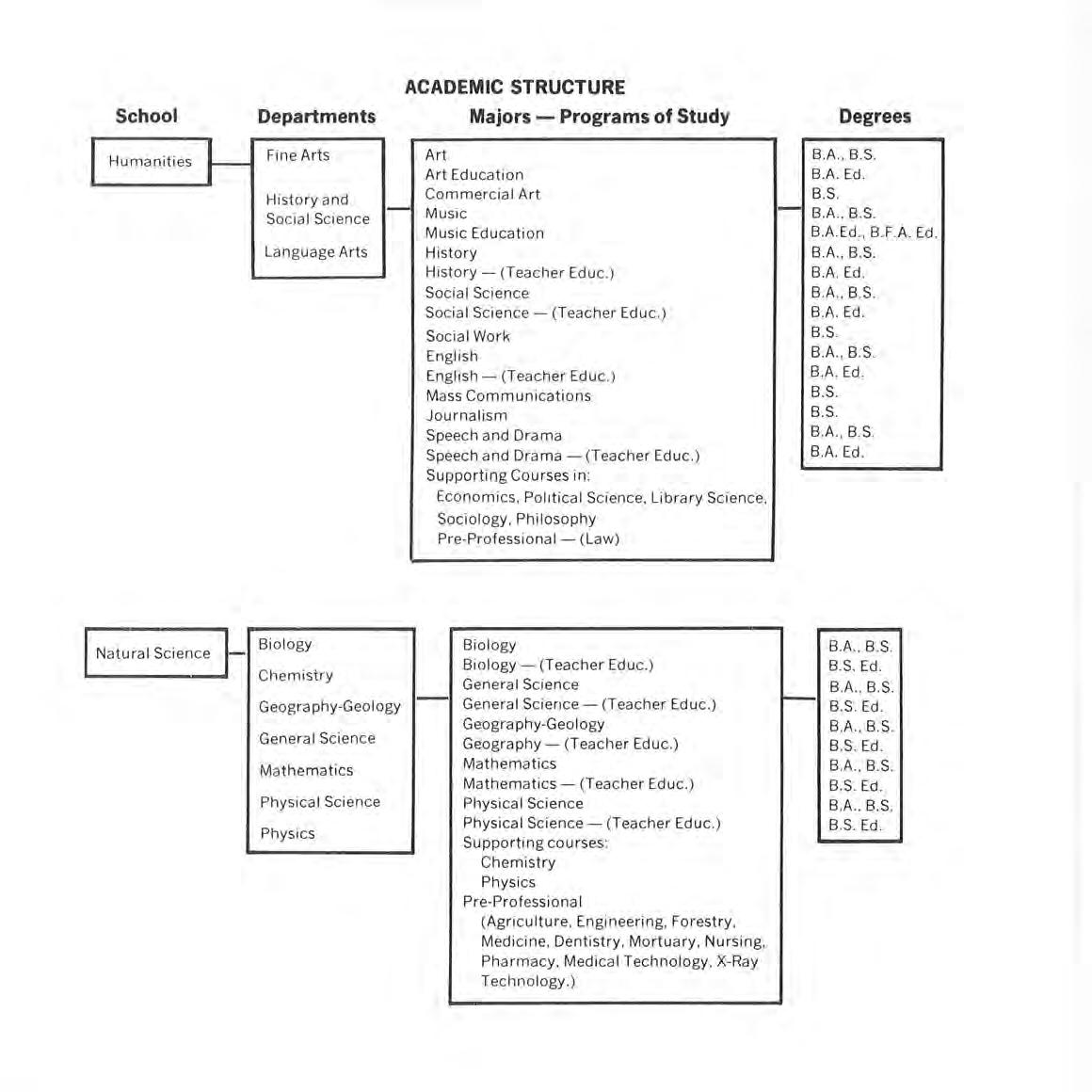
Bi o l og y
C h emistry
Geog r a ph y- Geo l og y
Gen er a l Sc i e nce
Ma th e m ati cs
Phy s ic a l Sc i e n ce
Ph ys i cs
Art
Art Educ a ti o n
Com m e r c ia l A rt
Mu sic
Mu s i c Edu ca ti o n
Hi st o ry
Hi st o r y -( T eac h er Ed uc .)
Socia l Scie nce
Soc i a l Sc i e n ce - (T eac h er Edu c.)
Soc i a l Work
En g l is h
En g l is h - ( T eac h e r Edu c.)
Mass Communi ca ti o n s
J o urn a li s m
Speec h a nd Dr a m a
Speec h a nd Dra ma -( Te ac her Edu c.)
S upportin g Co urses in :
Eco n o mi cs, Po liti ca l Sc i en ce . Libr a ry Sc i e nce .
Socio l ogy, Phil o s o ph y
Pr e- Prof essio na l -( Law)
:-
8 .A., S.S.
B .A. Ed
S S
B .A.. S S
B.A. Ed , 8 .F A Ed
B.A. , S.S.
8.A. Ed .
B .A. , B.S.
B.A. Ed.
S.S.
B .A. , B S
B .A. Ed
B .S.
S.S
B.A. , B S
B.A. Ed .
Bio l og y
Bi o l ogy -( Tea c h e r Edu c.)
Gen e r a l Sci en ce
Gen e r a l Scie n ce - (T eac h er Edu c .)
Geo g r a phy-Geo l o g y
Ge og r a phy- ( T eac h er Edu c.)
Math e m a t ic s
Mathem a ti c s - ( T eac her Edu c.)
Physi ca l Scien c e
Physi ca l Sc ien c e -( Te ac h e r Ed uc )
Supp o rtin g c our ses:
Ch e mi str y
Physi cs
Pr e- Pr o f es sion a I ( Agr i c ultur e, En g in ee rin g , Fores tr y , M edi c in e , De nti str y , M o rtu a r y, Nur s in g, Ph a rm ac y , Medi ca l Technol og y, X-Ray T ec hn o l ogy. )
1--
BA . BS
B .S. Ed .
B .A. . B S
B. S. Ed
B.A. , BS
B S Ed
B .A., S.S.
S.S. Ed .
B.A., S.S.
B S Ed.
C u R R I C u L A 0 u T L I N E s

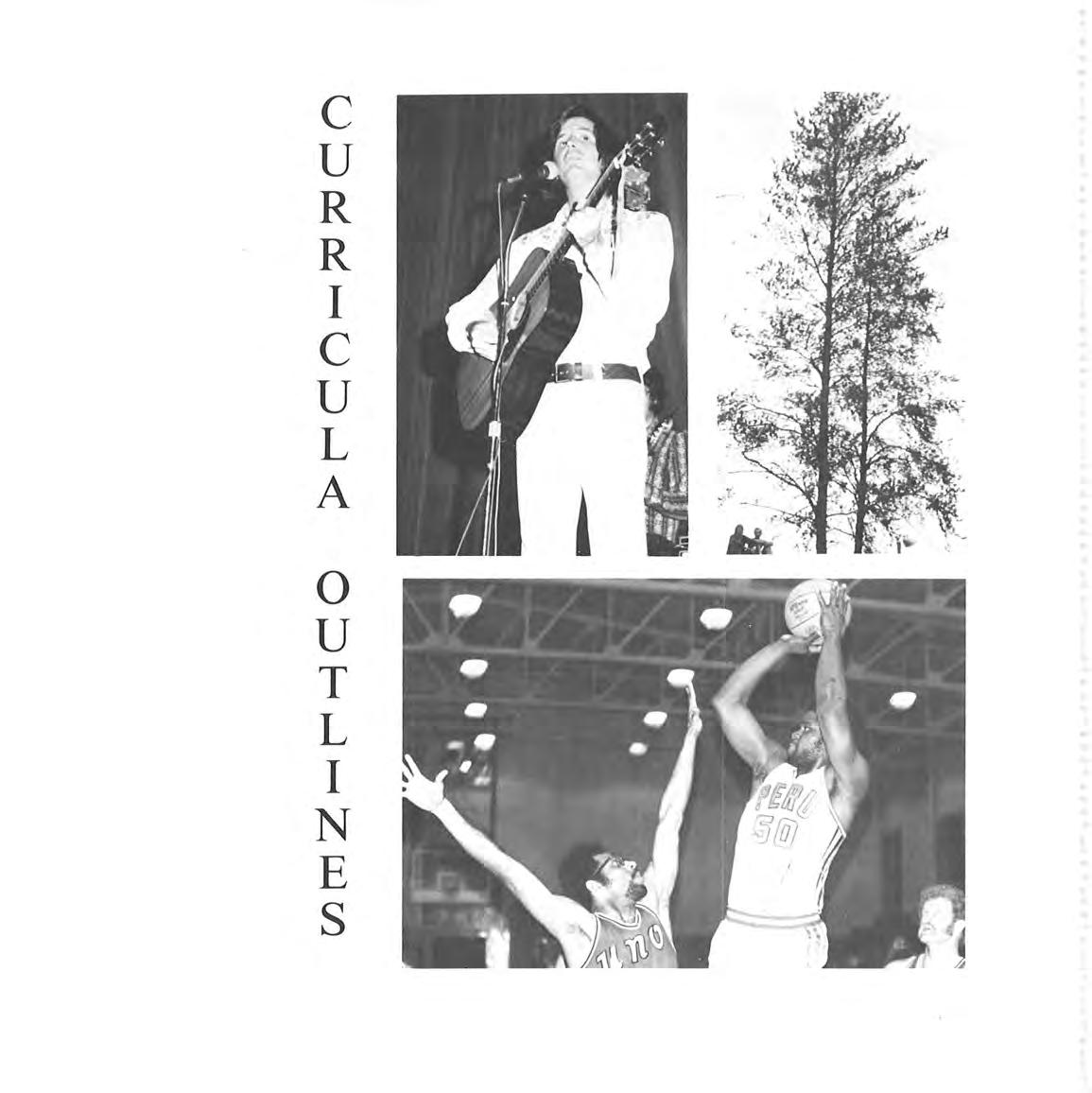
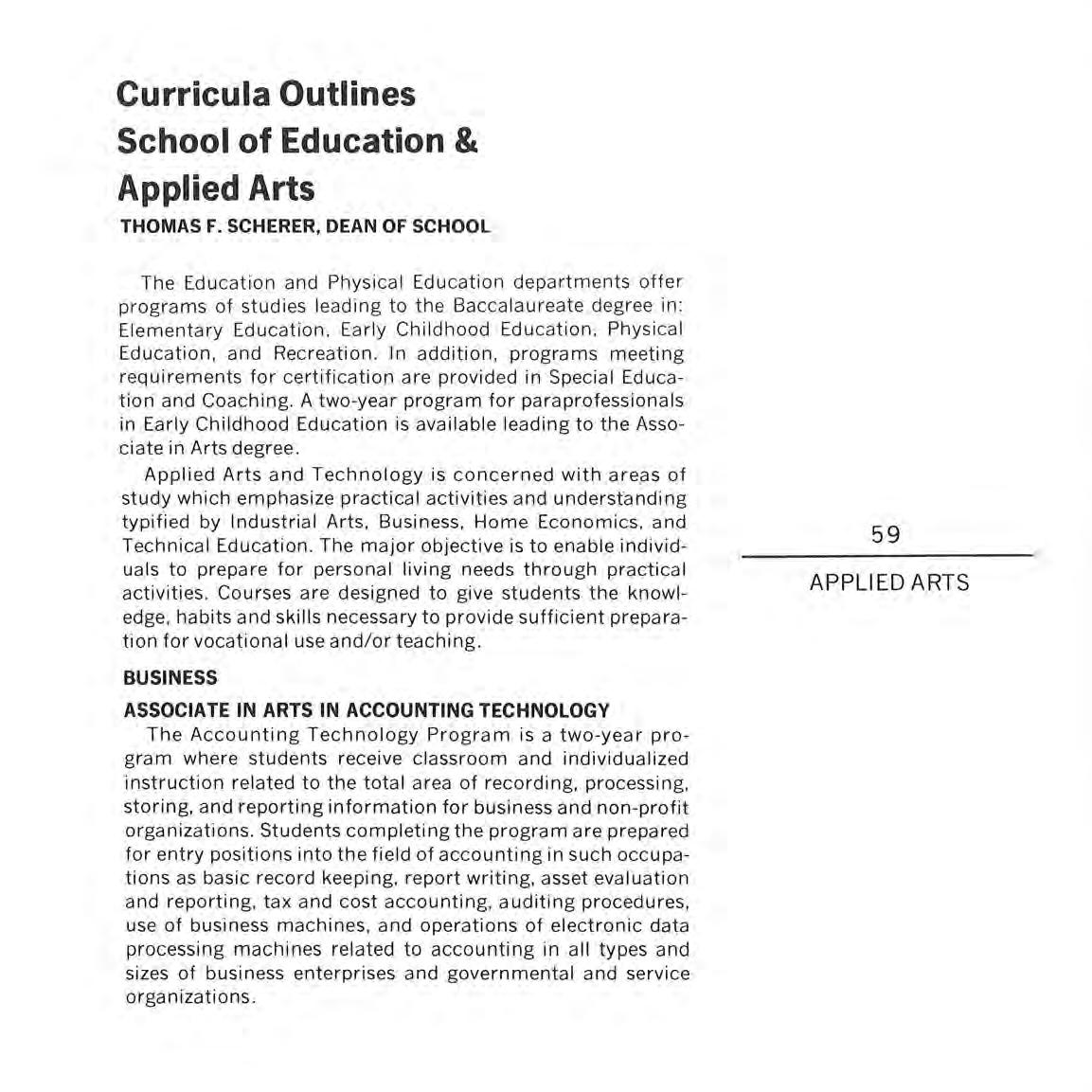 THOMAS F. SCHERER, DEAN OF SCHOOL
THOMAS F. SCHERER, DEAN OF SCHOOL
The Education and Physical Education departments offer programs of studies leadin g to the Baccalaureate degree in: Elementary Education , Early Childhood Education , Physical Education, and Recreation. In addition, programs meeting requirements for certification are provided in Special Education and Coaching . A two-year program for paraprofessionals in Early Childhood Education is available leading to the Associate in Arts degree.
Applied Arts and Technology is concerned with areas of study which emphasize practical activities and understanding typified by Industrial Arts, Business , Home Economics, and Technical Education. The major objective is to enable individuals to prepare for personal living needs through practical activities. Courses are designed to give students the knowledge, habits and skills necessary to provide sufficient preparation for vocational use and/or teaching.
The Accounting Technology Program is a two-year program where students receive classroom and individualized instruction related to the total area of recording, processing, storing, and reporting information for business and non-profit organizations . Students completing the program are prepared for entry positions into the field of accounting in such occupations as basic record keeping, report writing, asset evaluation and reporting , tax and cost accounting, auditing procedures, use of business machines, and operations of electronic data processing machines related to accounting in all types and sizes of business enterprises and governmental and service organizations
It student had algebra at the high school level and feels well-grounded in math. he may waive Business Math.
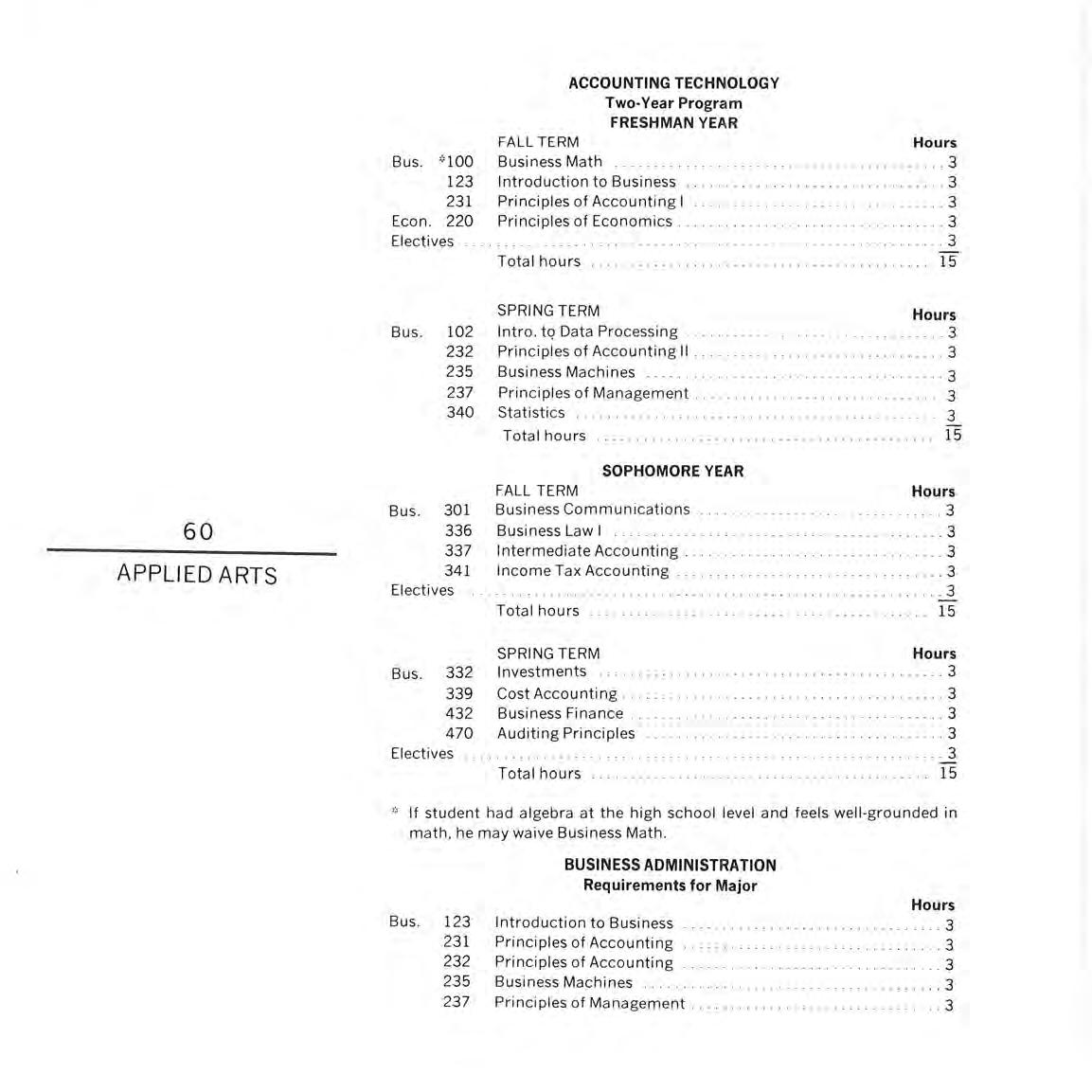
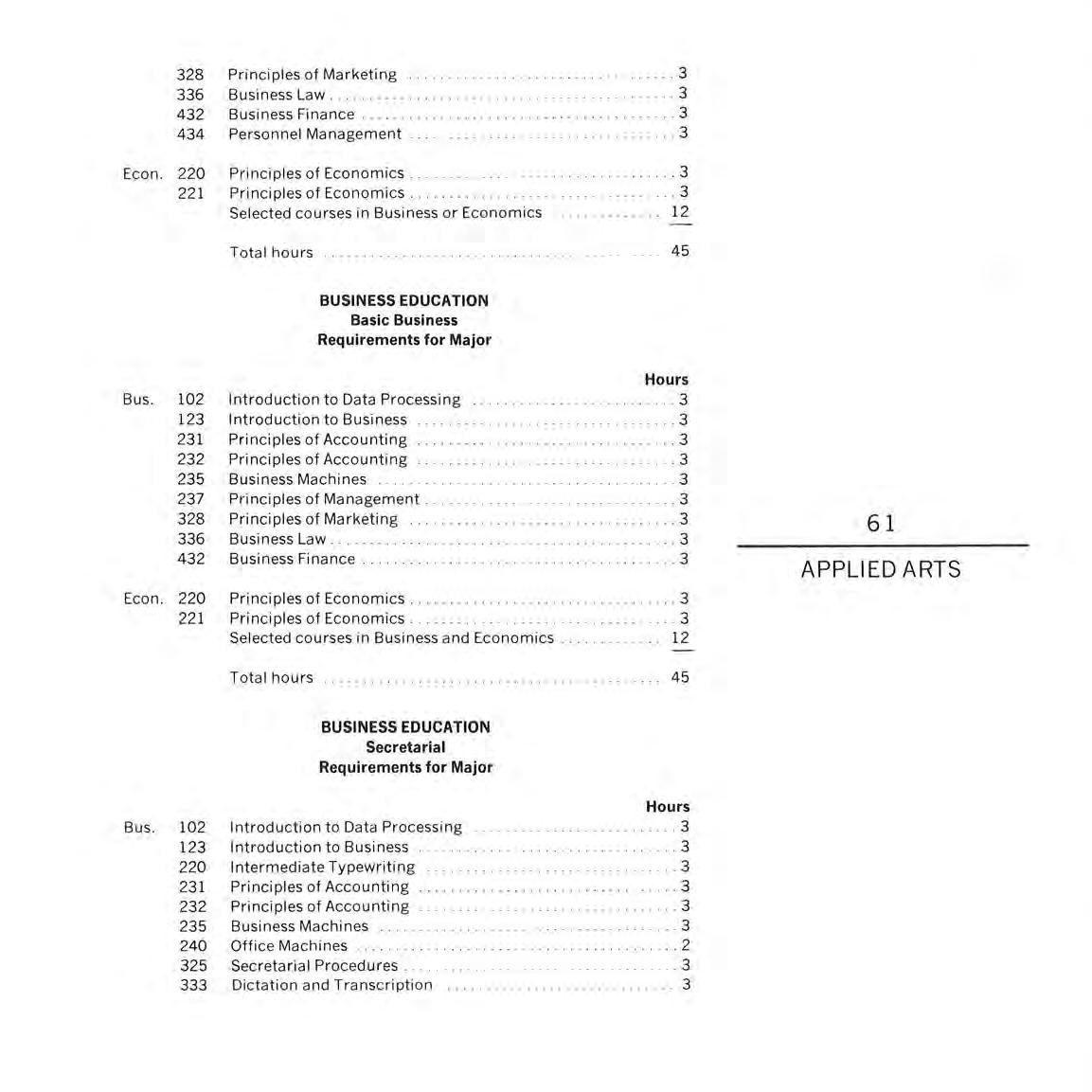
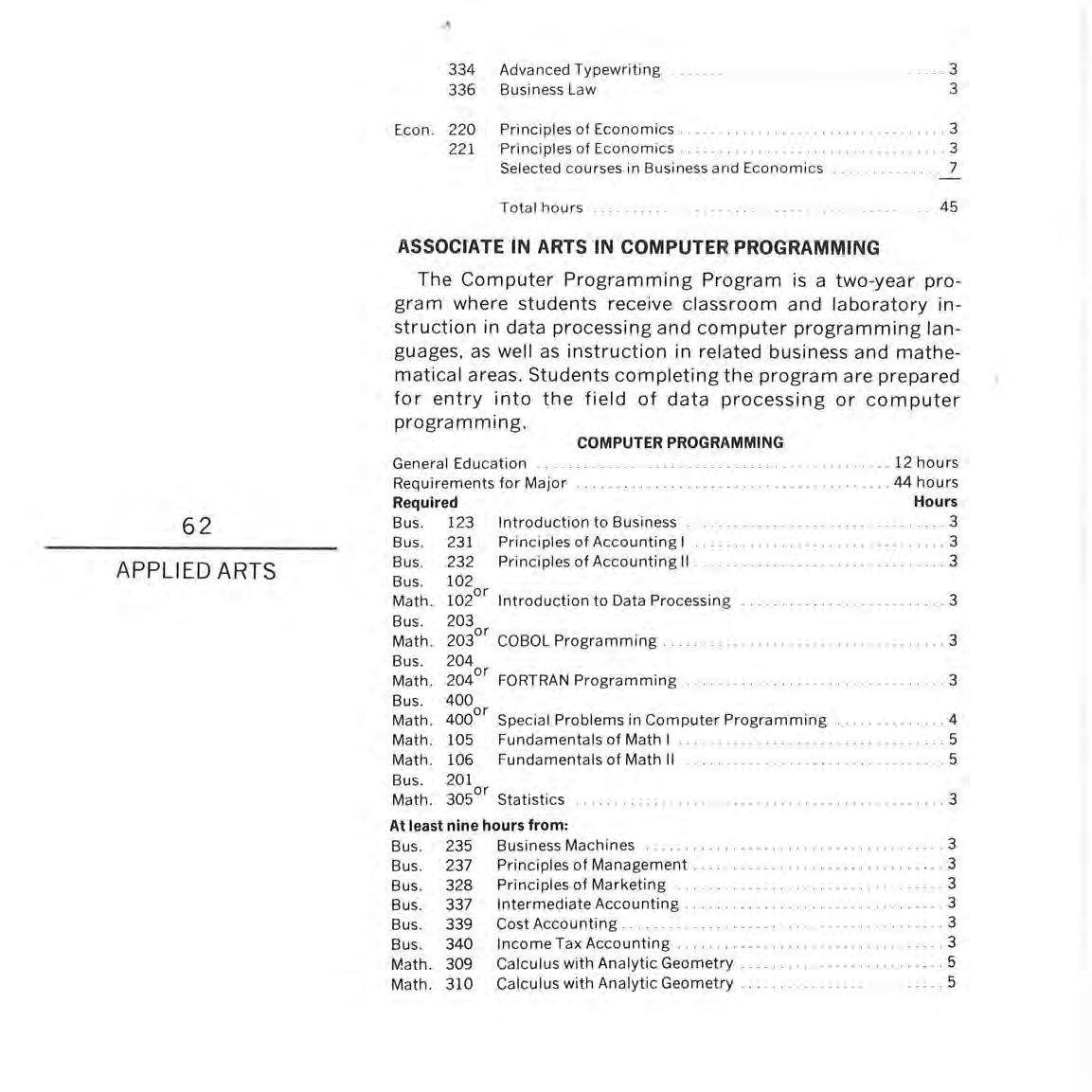
The Computer Programming Program is a two-year program where students receive classroom and laboratory instruction in data processing and computer programming languages, as well as instruction in related business and mathematical areas. Students completing the program are prepared for entry into the field of data processing or computer
.
The Secretar ia l-C ler ica l Program is a two-year program estab li shed to prepare students to be proficient in the secretarial-clerical sk ill s a nd know l edges wh ich will enab le them to enter this field at the comp l et i on of the program. The st udents receive c l assroom and individu a li zed in struction emphasizing the sk ill s ubj ects of shorthand, typewriting, secretarial account in g, off i ce machines, e lectron ic data processin g, basic correspondence and report preparation, and communication sk ill s . Personnel trained in this program would work tor sma ll or l arge businesses in retailing, who l esa lin g, manufacturing, transportat ion , commun icat ion s, doctors, l awyers, accountants , as well as government at al l l eve l s and other non-profit organizations such as c hur c h, sc h oo l s, and h osp it als .
The main difference between the Secretar i a l Sc ience Program and the Genera l C l er i ca l Program is the omission of the requirement of s h ort h and in the Genera l Clerical a nd subst ituted is five semester hours of machine transcriptions.
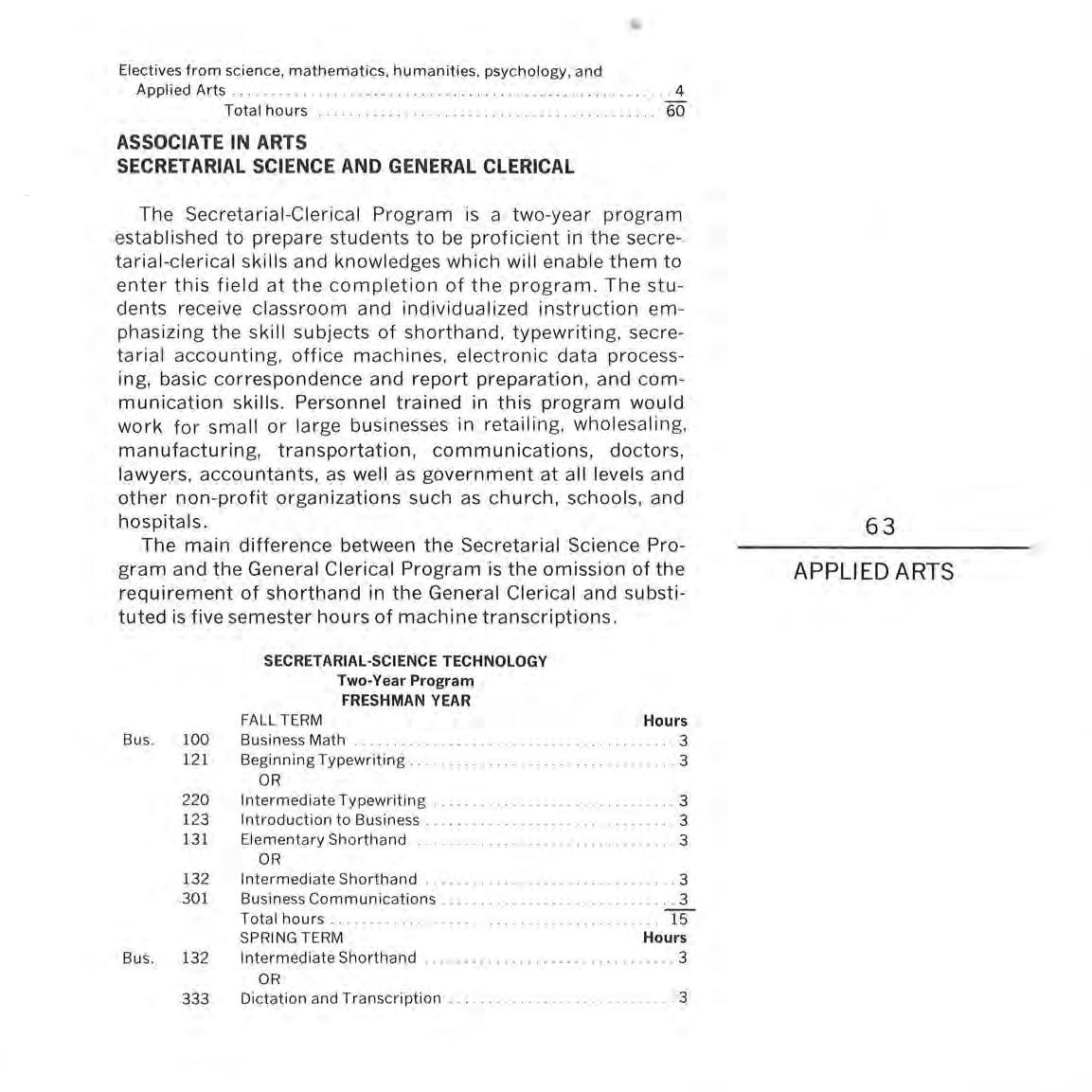
60 HOUR S TOTAL PROGRAM WITH AT LEAST 50 HOUR S REQUIRED IN BUSINESS AND ECONOMICS.
If the student has h ad previous in str u ct i on in typ in g h e or she is not t o be enro ll ed in the be g innin g co ur se w ith out the appro val of the instructors .
I f the student h as had a l gebra or some other a dv a n ced work in math , he or she is not to enro ll in Business Math.
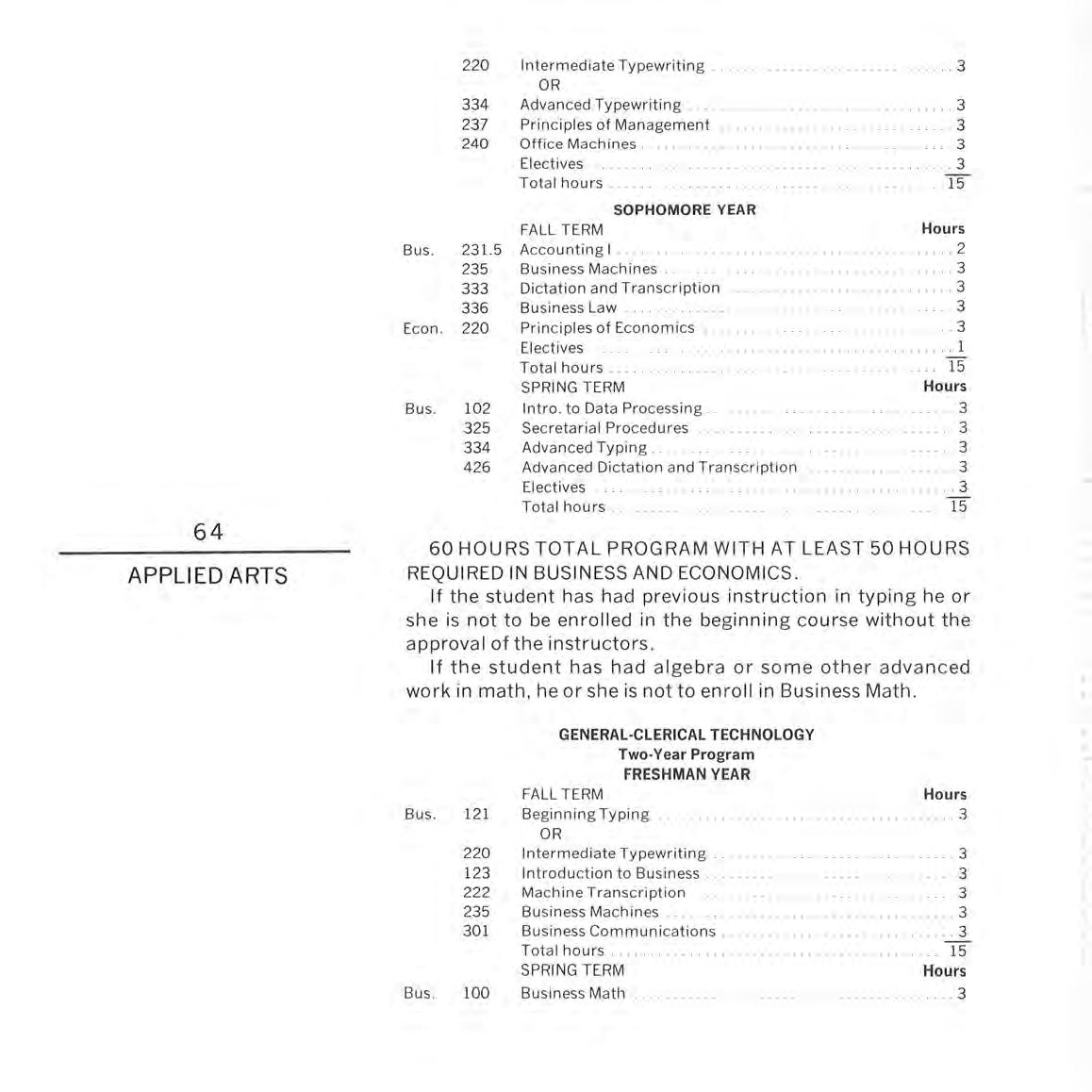
60 HOURS TOTAL PROGRAM WITH AT LEAST 50 HOURS REQUIRED IN BUSINESS AND ECONOMICS.
If the student ha s had previous instruction in typing, h e or she is not to be enrolled in the beginning course without the approval of the instructor s.
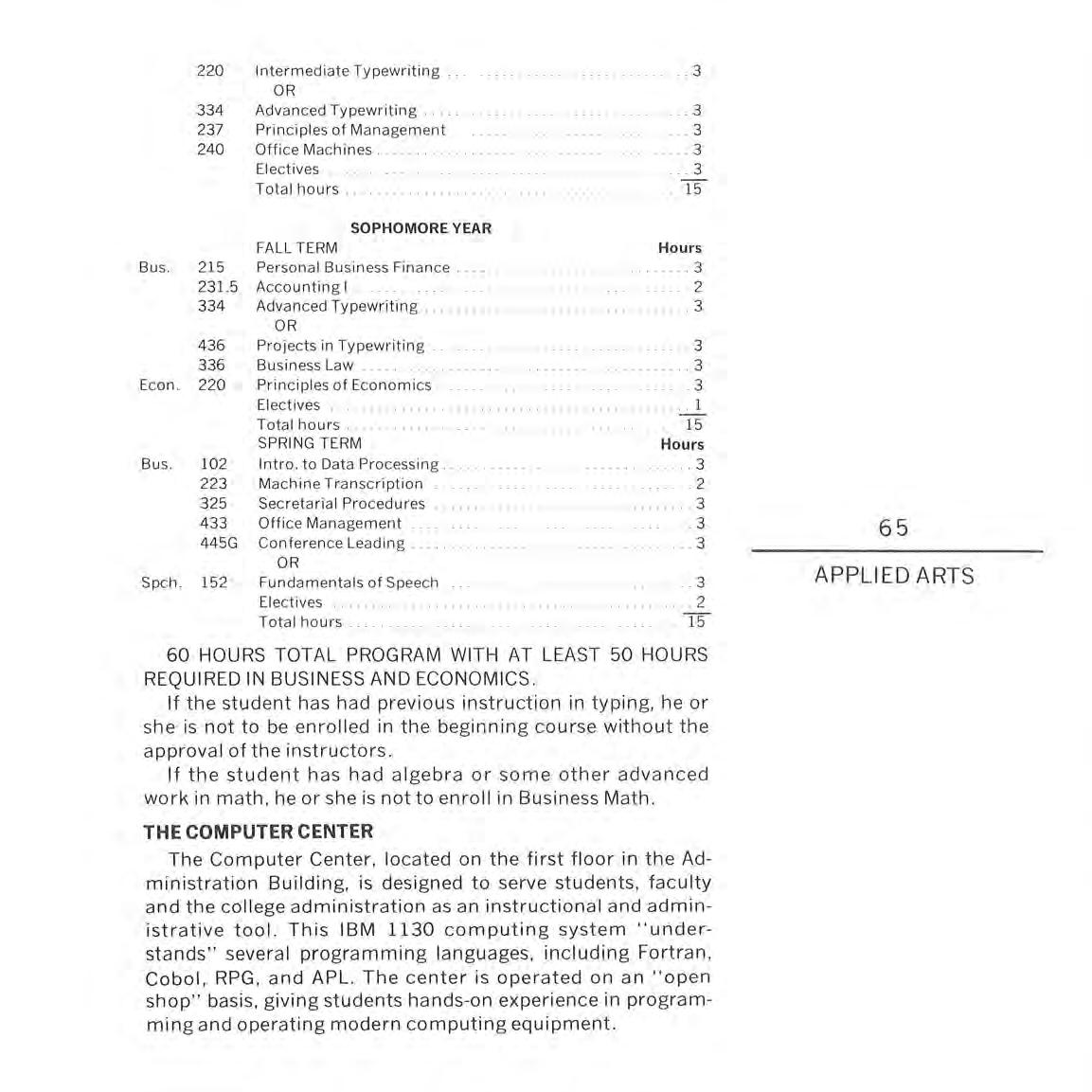
If the student has had algebra or some other advanced work in math, he or she is not to enroll in Business Math.
The Computer Center, loc ated on the first floor in the Administration Building, is designed to serve students, faculty and the college administration as an instructional and administr at ive tool. This IBM 1130 computing system "understands" several programming langu ages, including Fortran, Cobol, RPG, and APL. The center is operated on an "open shop" basis, g ivin g st udents hand s-on experience in programming and operating modern computing equipment .
65
Home Economics may be el ected as a teaching or non-teaching field qualifying for the Bachelor of Sc i ence or the Bachelor of Science in Education degree s

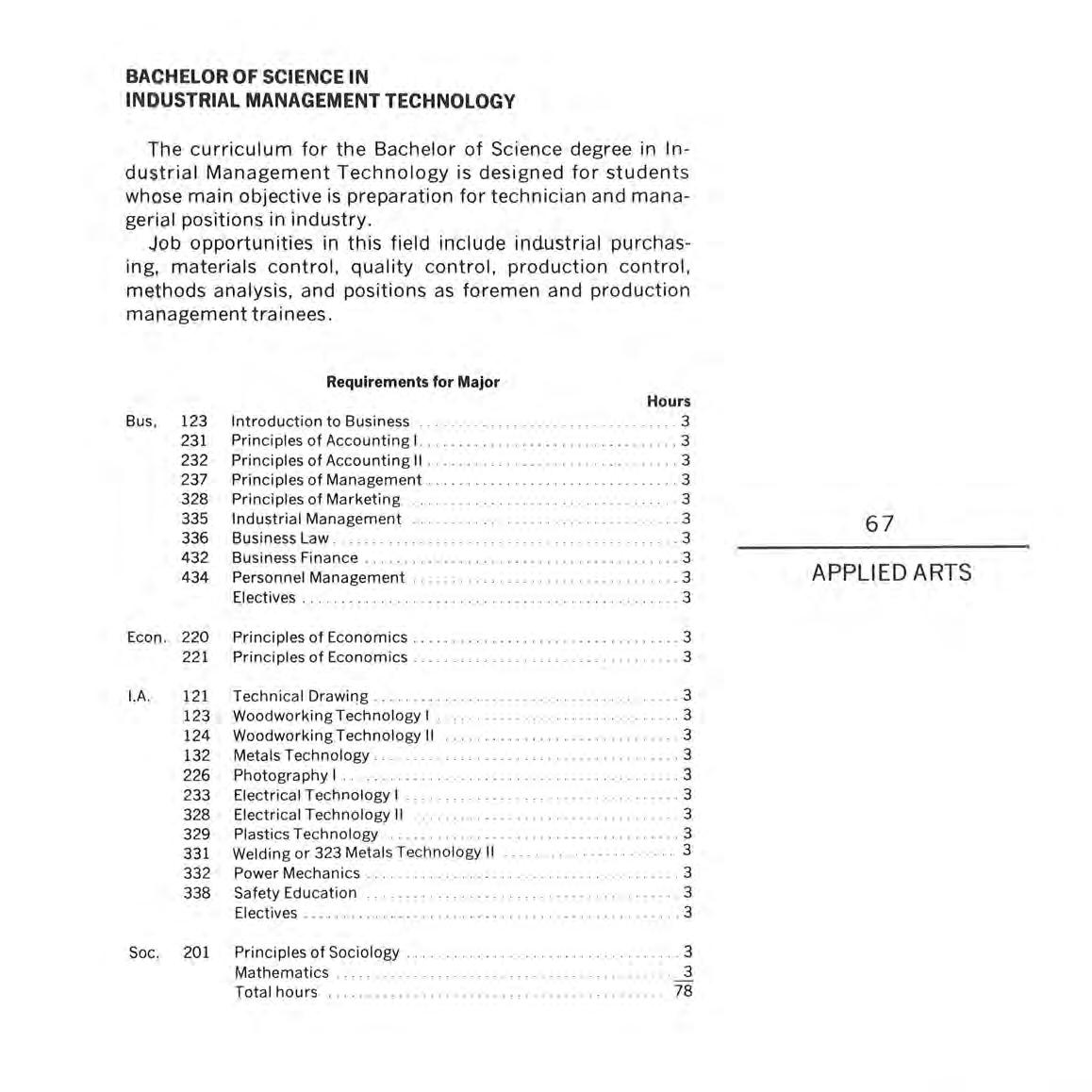
The curriculum for the Bachelor of Science degree in Industrial Management Technology is designed for students whose main objective is preparation for technician and managerii;il positions in industry.
Job opportunities in this field include industrial purchasing, materials control, quality control, production contro l, methods analysis, and positions as foremen and production management trainees.
This program is in cooperation with the Veterans Administration Center Hospital at Wadsworth, Kansas. Following graduation with a Bachelor of Science in Education degree with a major in Industrial Arts, the student spends 10 weeks at the hospital for their affiliation with free board and room. Upon successful completion of the internship, the student would be eligib!e for G.S 6 Civil Service rating. Details of the program may be obtained from the Dean of the School of Applied Arts and Technology.
Must have a minimum driving record of two years and 20.000 miles (state and local) free from chargeable accidents and moving traffic violations. A teaching certificate with a teaching major or endorsement, in addition to driver education is required.

This two-year curriculum is designed for those students who do not contemplate completing a four-year program, but who wish to become proficient in the basic technological skills and desire to take as many basic courses as possible.
Students who complete the two-year degree may continue to study for the degrees of Bachelor of Science in Education or a Bachelor of Arts, with a major in Industrial Education.
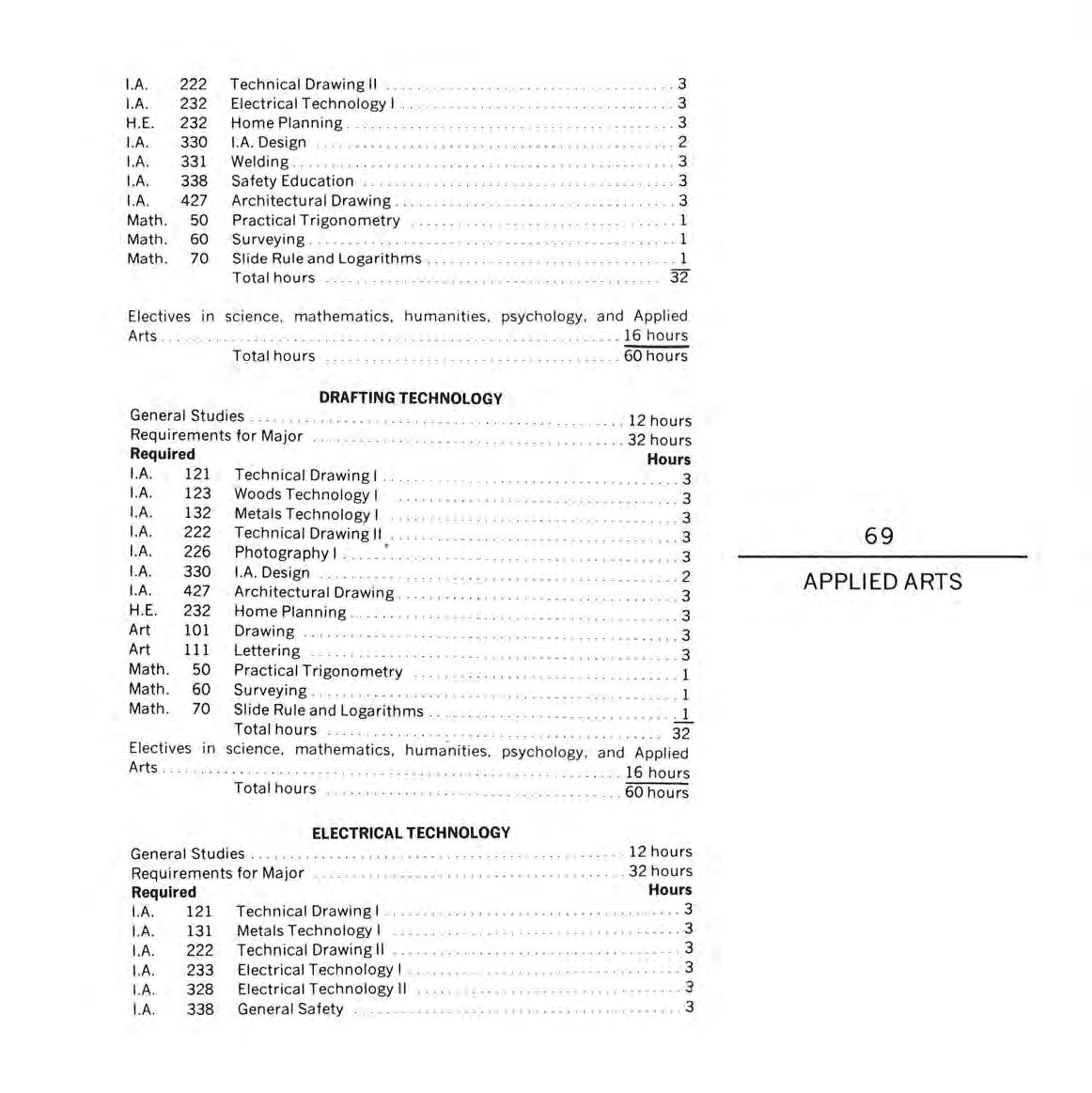
The col l ege offers a major in vocat i ona l education teacher training in the fields of Home Economics, Office Occupations, and Trade Industrial Educat i on. Requ i rements are:
1. A comprehensive major of 45 semester hours.
2 . Technica l competency or a m i nimum of 12 semester hours i n a sub j ect to be taught.
3. Two years recent emp l oyment in the fie l d he is to teach or equi v a l ent.
4. Specia l ized vocational courses required:
(a) Vocational Education 441G

(b) Vocationa l Education 442G
(c) Vocational Education 443G
5. Must meet the general studies and professiona l education requirements for the co l lege.
The College recognizes its responsibility first, in the selection of good prospective teachers and second, in offering the best possible program in the preparation for teaching. Careful consideration is given to each applicant for admission to the teacher education curriculum on the basis of the traits and qualities generally considered necessary for successful teaching.
Procedure for admission to teacher education is as follows:
1. All candidates must apply for admission to teacher education curriculum during the second semester of the sophomore year.
2 . Transfer students of junior or senior standing must make application for admission during the first month after matri c ulation
3 . Applications should be filed in the office of the Chairman, Teacher Education Committee .
4. Each applicant for admission into teacher education curriculum will be evaluated as a prospective teacher. The evaluation of the candidate will be made in terms of health , emotional stability, character traits, and academic achievement.
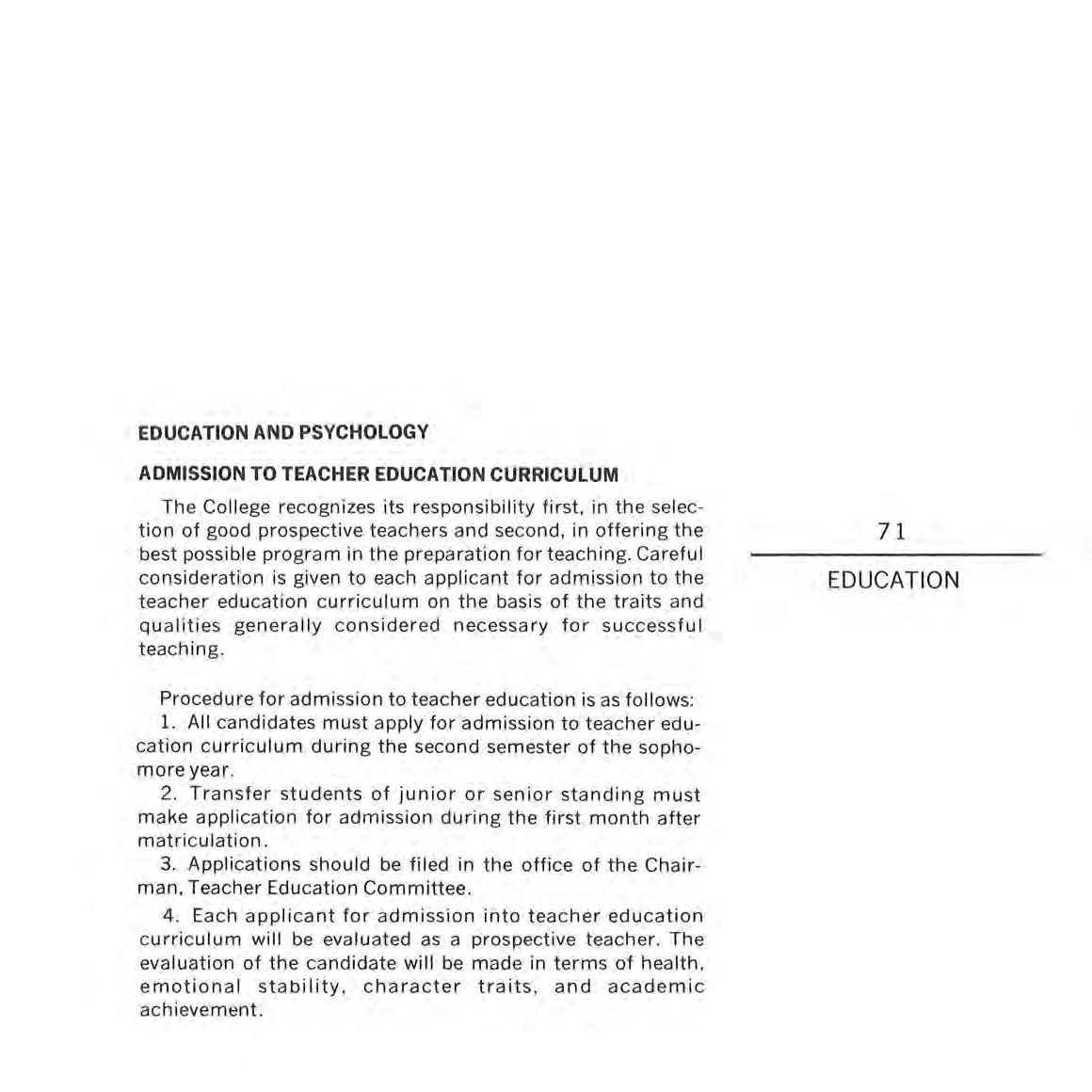
5. An applicant may be requested to appear before the Teacher Education Committee in support of his application tor Teacher Education. The committee will accept the candidate , accept him conditionally , or recommend that he follow some other curriculum more su i table to his talents and abilities.

6 On ly students who have been accepted into the teacher education curricu l um wi l l be e l igib l e for the profess i onal semester, or recommended for a teaching certif i cate.
1. Free from socia l probation.
2 . Overall Grade Point Average of at least 5.25 .
3 Recommended by persons who by virtue of past association are in a pos i tion to know the student as a prospective teacher.
4. Evidence of proficiency in mathematics and Eng li sh. Scores at or above the fift i eth percent il e on the ACT test i n t h e areas of language and mathematics, or tenth grade level on the California Mathematics and Language Achievement tests are required.
Informat i on regarding teach i ng certif i cates may be obta i ned in the Registrar ' s Office or from the Di rector of Teacher Certif ication, State Capitol, L i nco l n, Nebraska, 68509.
A l l app li cants are hereby advised that meet i ng academ ic or graduation requirements does not automatica ll y comp l ete requirements tor inst itutiona l endorsement.
Accord i ng to Nebraska Teacher Cert i fication, the Col l ege has the responsib il ity of endors i ng qua l ified persons tor certificates This respons i bility has been delegated to the Teacher Education Committee . An endorsement ind icates the grade leve l , subject fie l d or area of specia l ization for wh i ch the teacher was especial ly prepared, and i mp l ies that the appl icant has met appropr iate standards of scho l ars hi p, sound menta l and physica l hea l th , good c i tizenship , and mora l ch a racter
In order to facilitate the action of the Teacher Education Committee it is necessary that all appl icat ion s be submitted not less than three (3) weeks prior to the end of the term and the applicant must have written the TEEP.
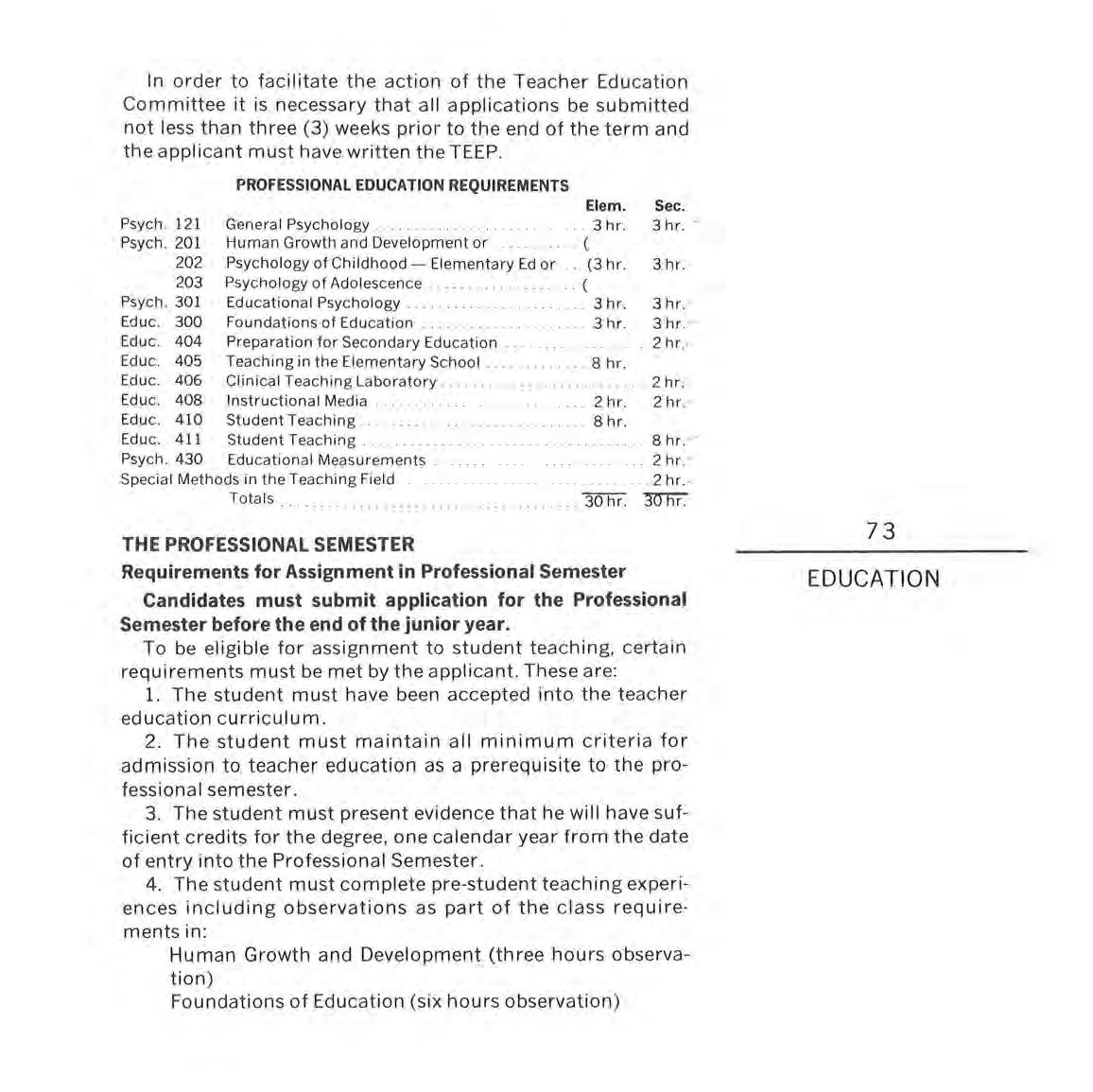
Candidates must submit application for the Professional Semester before the end of the junior year.
To be eligible for assignment to student teaching, certa in requirements must be met by the app li cant. These are:
1. The student must have been accepted into the teacher education curriculum.
2. The student must maintain a ll minimum criteria for adm i ss ion to teacher education as a prerequisite to the professional semester.
3. The student must present ev idence that he will have sufficient credits for the degree, one ca l endar year from the date of entry into the Professional Semester.
4. The student must comp l ete pre-student teaching exper iences including observations as part of the c l ass requirements in :
Human Growth and Development (three hours observation)
Foundations of Education (six hours observation)
Special Methods (six hours observation)
5. Each application for the professional semester must be approved by the:
(1) Dean, School of Education and Physical Education,
(2) Dean of School for each major, and
(3) Director of student teaching.
6 . Register for and write the Teacher Education Examination Program.
The Teacher Education Examination Program is a comprehensive two-part test required of all students seeking teacher certification. The first part of the test covers five areas in which competence is considered basic to effective teaching: Social-Philosophical-Historical Bases of Education, Learning and Instruction , written English Expression, Cultural Background, and Science and Mathematics . The second part of the test is designed to gauge the candidate's knowledge and ability for teaching in a specific field. The test is given three times each year and takes approximately four hours.
In addition to a ll general and professional education requirements, students must complete the following academic requirements in order to provide a broad general education necessary for elementary teachers. The candidate must earn 24 hours in one academic area, and 15 hours in each of two additional areas commonly taught in the elementary schools, along with 15 hours (electives). These "areas" represent the various instructional divisions of the College.
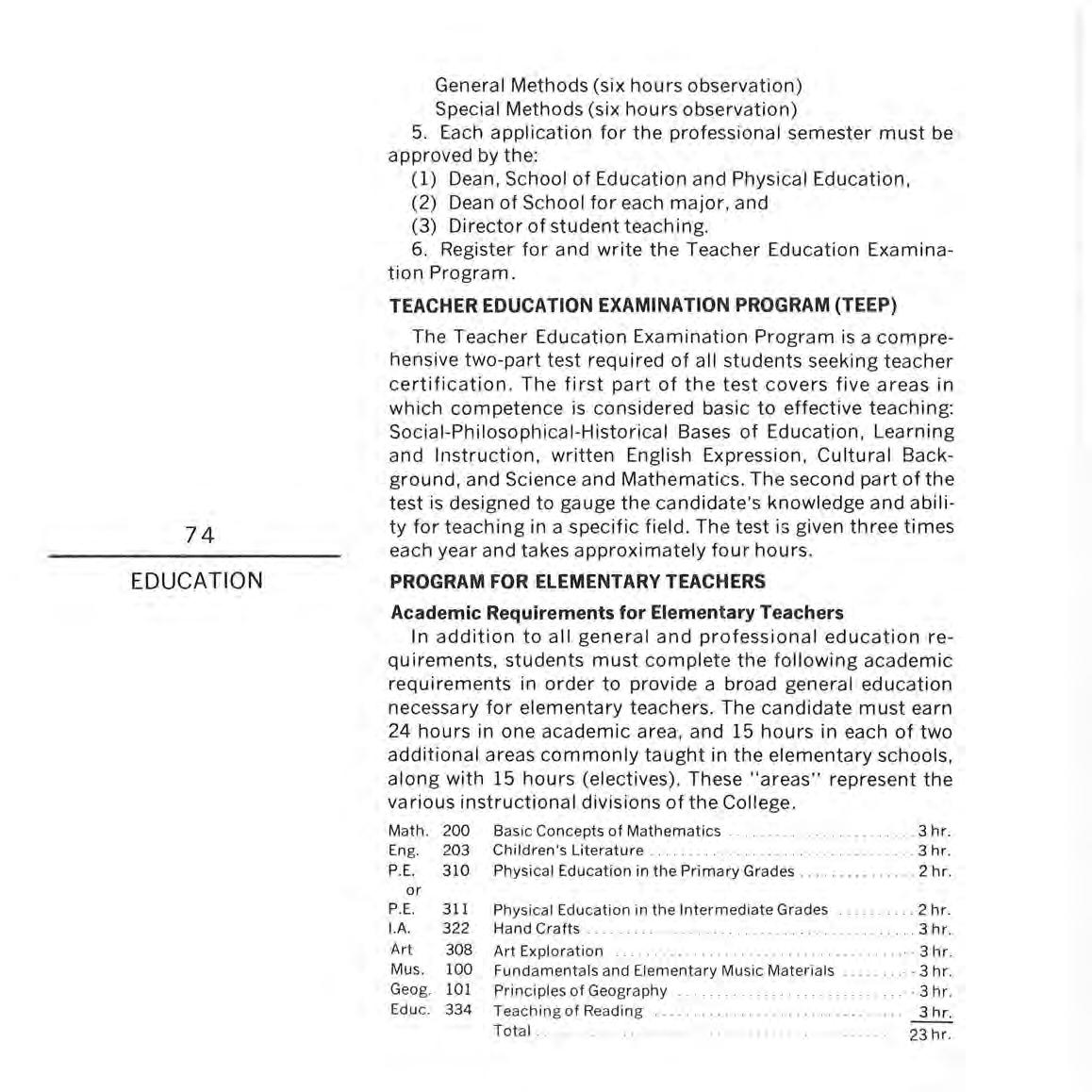
Upon co mpletion of the re c ommended curricu l um , the student wil l earn a Bac helor of Science degree, a nd, upon recommendation of the Col l ege, will qua l ify for the Nebraska Elementary Cert i ficate.
FRESHMAN YEAR
En g. 101 En glish Composition
S.S. 101 Social Science
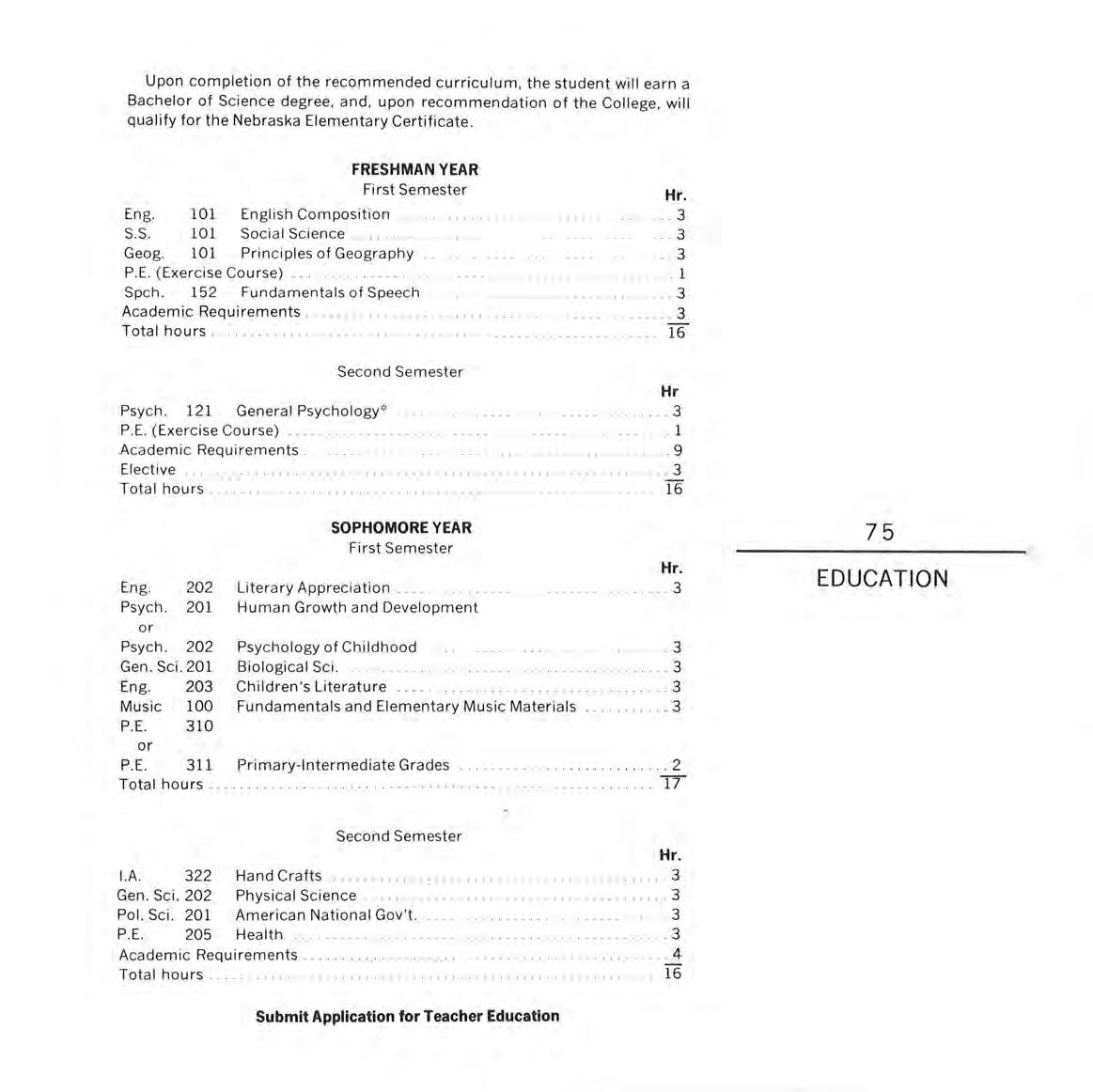
Geog 101 Prin c iple s o f Geography
P.E . (Exercise Co ur se)
Speh. 152 Fund a ment a ls of Speech
Aca demic Requirements
Psyc h 121 General Psyc hology '''
P E (Exercise Course)
Educ. 3 00 Fo und a tion s o f Education
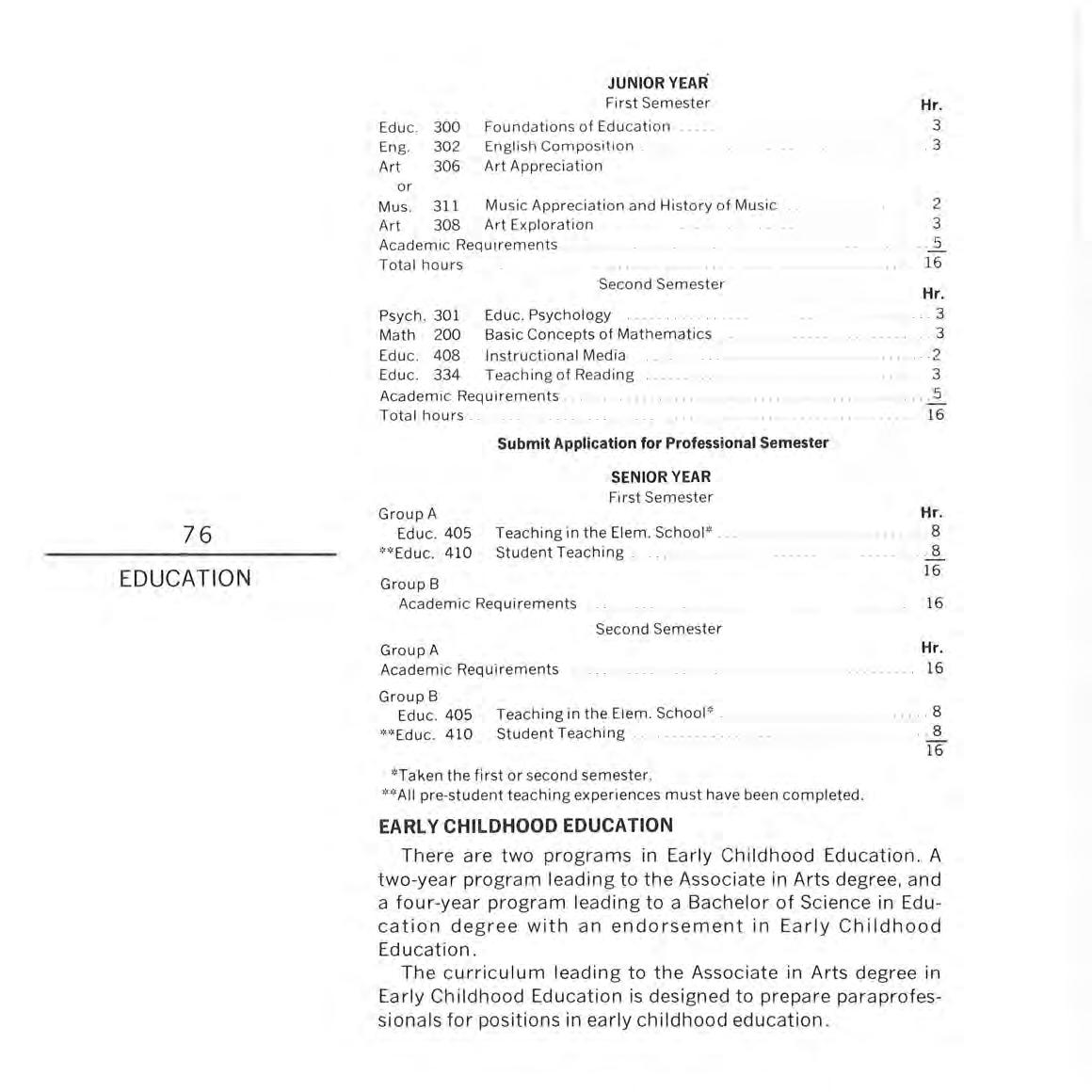
s ic Appreciation a nd Hi st o r y of Mu s ic
*'' All pre -s tudent tea c hing ex periences must hav e been comp l e ted.
There are two programs in Early Childhood Education A two-year program leading to the Associate in Arts degree, and a four-year program le ad ing to a Bache l or of Science in Education degree with an endorsement in Early Childhood Education.
The curriculum leadin g to the Associ ate in Arts degree in Early Chi l dhood Educat ion is designed to prepare paraprofessionals for positions in ear ly childhood education .
A ll courses carry f u ll c red it toward the Bachelor of Science degree and may be app l i ed to a r eg u l a r four-ye a r progr a m . Students are encouraged to u l tim ate l y pursue the baccal aureate degree
EARLY CHILDHOOD EDUCATION (A.A. DEGREE)
FIRST YEAR
Fi r st Semester
En g. 101
Biol. 2 01
Psyc h. 12 1
H . Ee. 133
Art 200
PE
Tota l h o ur s .
Engl i s h Co mp os it io n
Bi o l ogy Sc ien ce
Gen e r a l Psyc h o l ogy
Foo d s a nd Nutri t i on
A rt for Early Child h ood
(Exercise Co ur se)
Seco nd Semester
Spe h . 15 2
Math. 100
Psych. 20 1
P.E. 205
P.E.
El ec t ive
Tota l h ours .
Fund a mentals o f S p eech
Ba s ic Ma th
H uman Growth & Deve l opment
H ea lth
(Exer c i se Co ur se) .
SECOND YEAR
Fi rs t Sem este r
S.S 100
Mu s ic 100
Eng. 203

Educ. 305
P E.
Educ. 334
Tota l h ou r s
Socia l Sc ien ce
Fu n dame nt a l s and El ementary Music Materia l s
Chi l d r en's Liter a ture
Pr i n c ip l es of Ear ly Childh ood Edu cation
(Exercise Co ur se)
T eac hin g of Re ad in g
Ed u c . 307
S S 34 0
Educ. 30 1
P E 20 0
Educ. 408
Elective
Tota l h ou r s
Second Semes t e r Pr act i c um
The Family
The Disadva nt aged Chi l d
Pl ay a nd Games for Ear l y Ch i l dre n
In stru c ti o n a l Med i a
The curriculum leading directly to a Bachelor of Science in Education degree with an endorsement in early childhood education is designed for those who wish to prepare for teaching in day care, preschool or kindergarten programs. The Curriculum follows the program for elementary teachers (which meets the academic requirements for elementary teaching certification) and requires the following sequence of courses which may be used in lieu of the 24 hour block ordinarily required in elementary education.
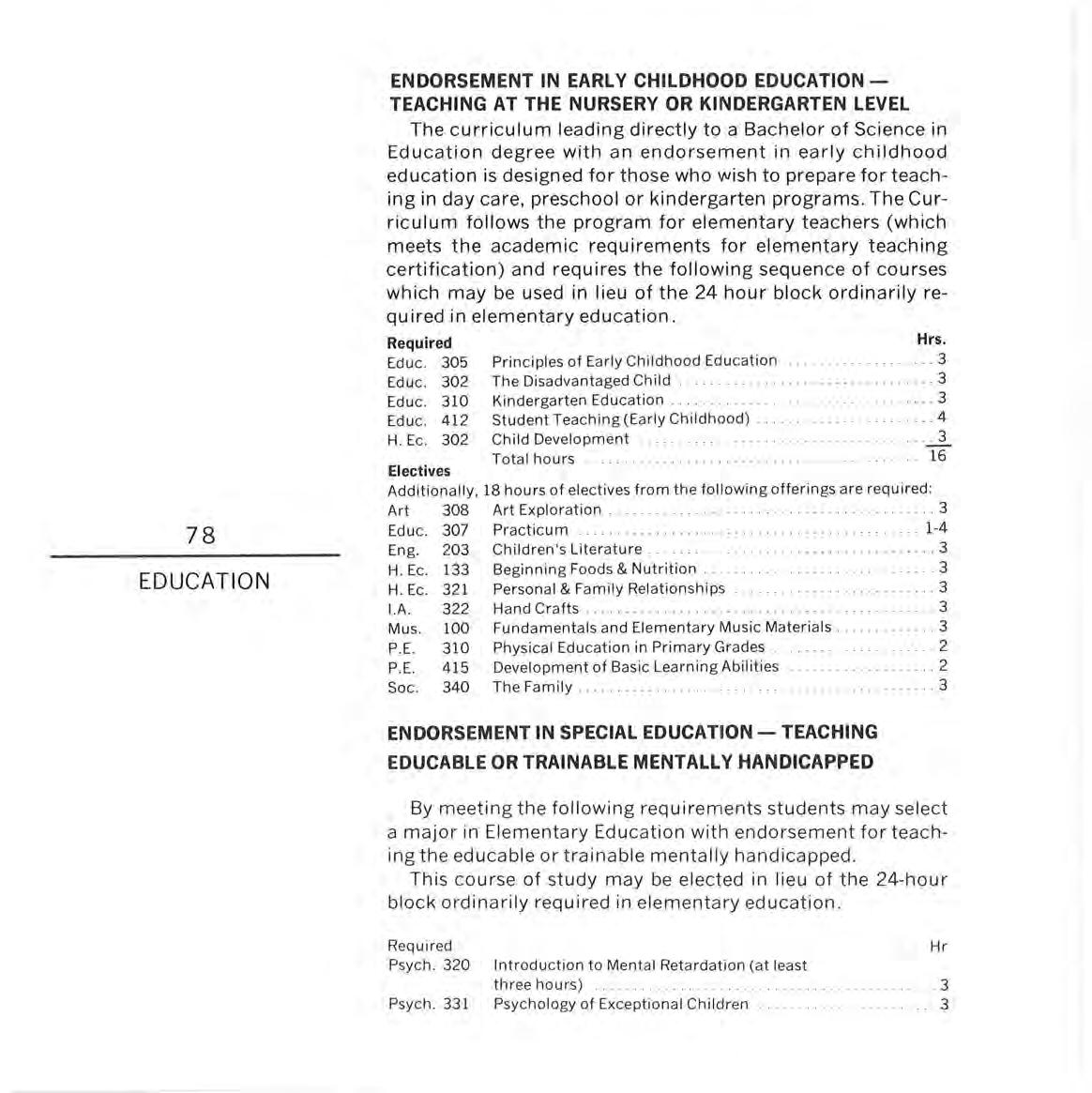
By meeting the following requirements students may select a major in Elementary Education with endorsement for teachin g the educable or trainable mentally handic a pped .
This co urse of study may be elected in li e u of the 24-hour block o rdin ar ily required in elementary educat ion .
Psyc h 430
Educ. 435
Methods a nd Ma t e ri a ls in th e Edu ca ti o
Except ion a l Children
Edu ca ti o n a l Mea s ur e ment s
Stud e nt Teaching (Exceptional Children
Tot a l hours
ELECTIVES (18 hrs.)
Edu c . 302 The Dis a dv a nt age d Child
Edu c. 305 Prin c ipl es of Early Chi ldh ood Edu ca tion
Edu c 334 Te ac hing Re a ding
Edu c . 336 Dia g no stic a nd Rem edial Rea din g . .
Educ. 450 Direct ed Study in Edu ca tional Psy c holo gy
Psyc h . 421
Psyc h. 432
Speh. 353
Speh 362
P.E. 417
P.E. 426
H. Ee . 133
H. Ee. 134
H Ee. 232
H Ee 302
Introdu ct ion to Mental Hygi e ne
Principles & Practices of Guid a nce
Speech Correction & Dev e l opment
Psychology of Speech
Corrective & Ad a pted Physi ca l Edu cat ion
P.E. for Exce ption a l Chi ldr en
Beginnin g Food s and Nutrition
Me a l Plannin g a nd Food Pr e p a ration
Home Pl a nning Child Development
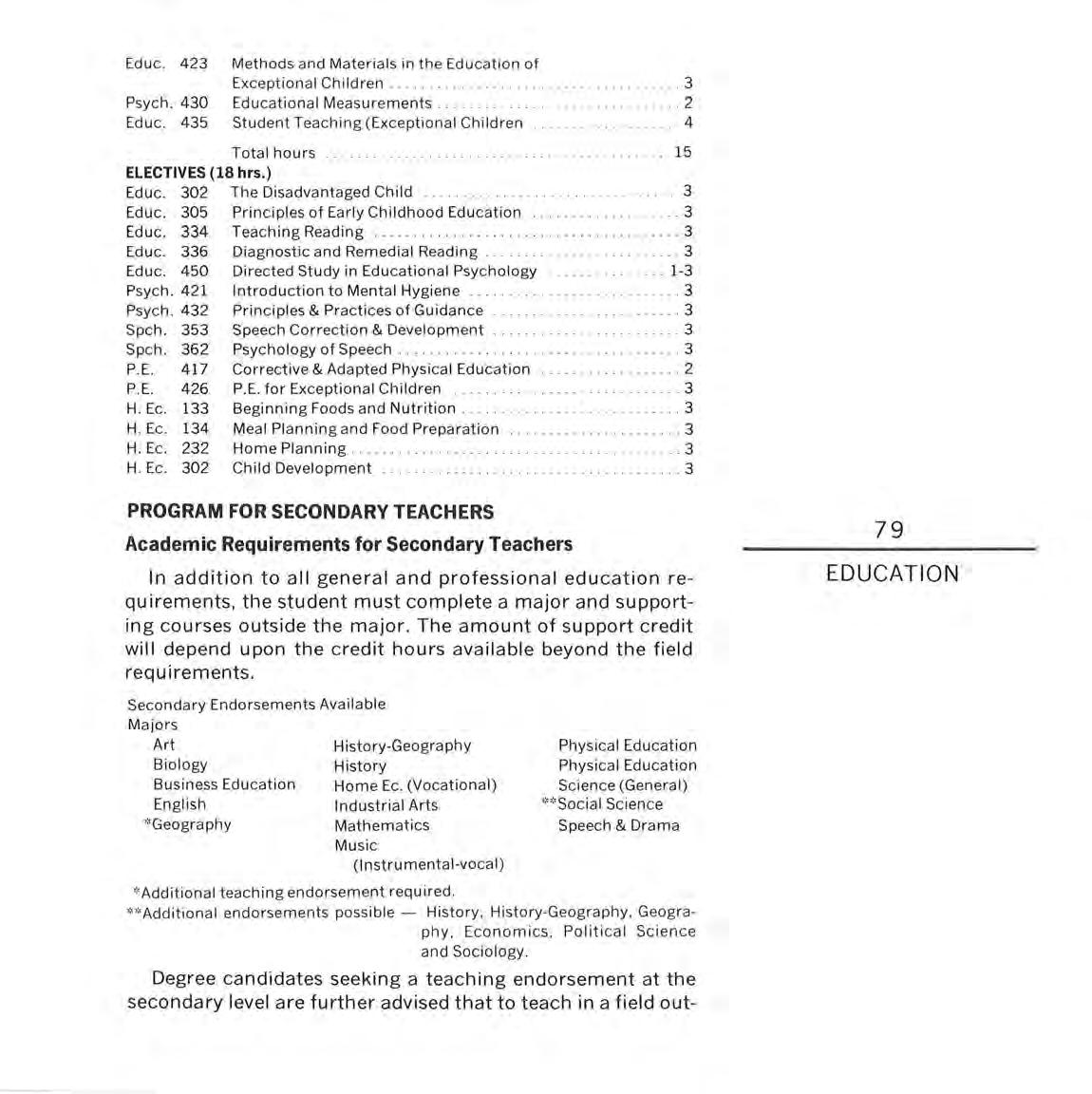
In addition to all general and professional education requirements, the student must complete a major and supporting courses outside the major. The amount of support credit will depend upon the credit hours available beyond the field requirements .
Seco nd a ry Endor se m e nt s Availabl e Ma j o rs
Art
Biol ogy
Bu s ine ss Edu ca ti on Engli sh
* Geograph y
Hist o ry-Geo gra phy
History
Home Ee. (Vocationa l )
Industri a l Art s
Mathem at i cs
Mu s ic
( ln stru ment a l-vo ca l)
* A dd ition a l teaching endors e m ent required.
Phy sica l Edu cat ion
Physi ca l Edu ca tion
Sc i en ce (General) '"'Soc i a l Science
Speech & Dr ama
'' *A dditi o n a l end orse ment s possible - Hi st o r y, Hi sto ry -Geog r aphy , Geography, Economics, P o lit ical Science a n d Sociology.
Degree candidates seeking a teaching endorsement at the secondary level are further advised that to teach in a field out -
side of the major in a school accred ited by the North Centra l Associ at ion , 24 hours are genera ll y required in most fields. This latter cond ition does not necessarily imply that the cand i date w ill qua lif y for a second endorsement.
The fo ll owing support areas are offered for add i t i ona l teaching endorsements but must h av e a major from the above list.
Coach in g Driver 's Education
Politi ca l Sc ien ce
The prog ram for seconda ry teachers include s a ll r equ ir e ment s in ge neral studie s, major , and profession a l education. The fo ll ow i ng co ur sP.s a re r equir ed o f al l st ud ents prep a ring to be co m e teachers o n th e seco nd a ry l eve l
SOPHOMORE
(PROF ESSIONAL SEMESTER) Educ. 404 Pr e para ti o n for Seconda r y Edu ca ti o n
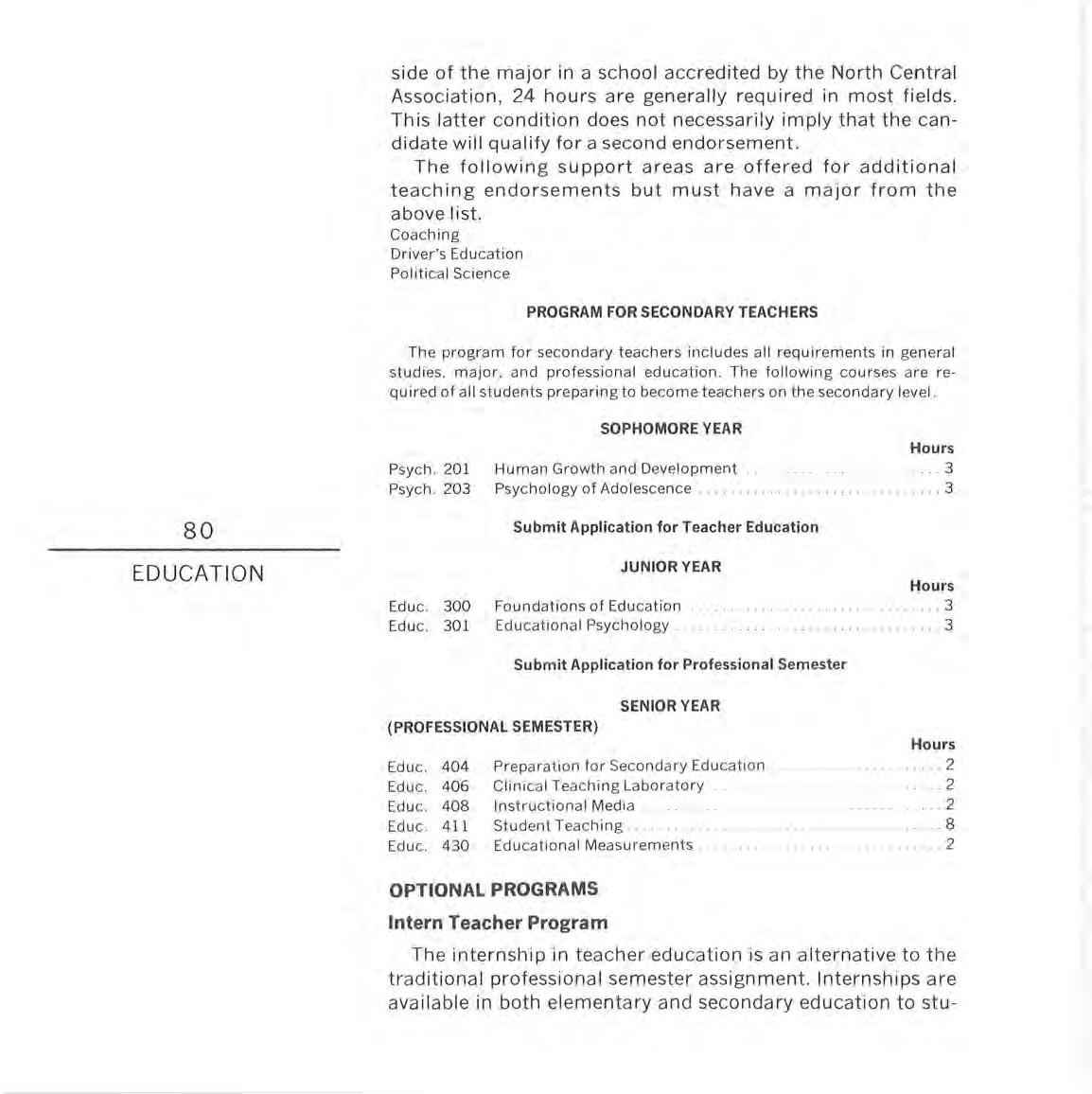
C lini ca l T eac hin g La b o r atory
stru c t io n a l Medi a
The i nternship in teacher education i s a n a lt ernati v e to the trad it iona l professiona l se m ester ass i g nm e nt. In ternships are ava il ab l e in both elementary a nd secondary ed u cat i on to stu-
dents considered to be potentially exce ll ent teachers. The program in c lu des spec i a l preparation during the summer prior to the sen i or year. The int ern, upon comp l et ion of summer training, is co nt racted and paid by a schoo l d istr ict and ass i gned to a teaching team under the superv i s ion of a master teacher. During this time the int ern exper i e n ces a wide range of teaching responsib ili ties in innov at iv e and exper im enta l programs . The program i s designed and conducted cooperatively by the co ll ege, schoo l district and intern teachers.

The following program is provided for those students int erested in the choaching of interscholastic sports. It is designed to fit the needs of the high schoo l coach and l eads to institutional recommendation for certification. Students completing this program are required to have a major in another area.
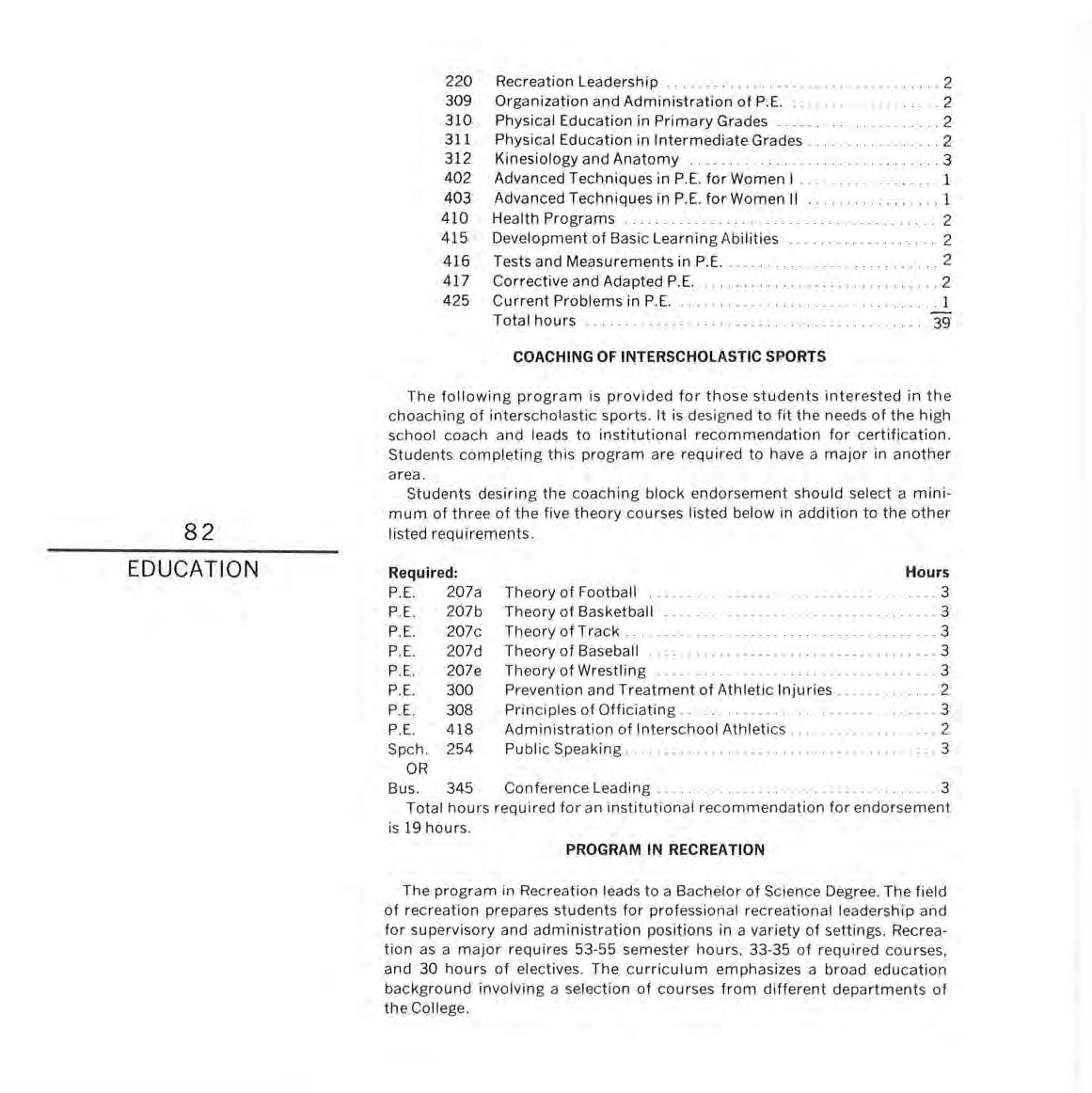
Students desiring the coaching block endorsement sho uld select a minimum of three of the five theory courses listed be lo w in addit ion to the other I isted requirements.
The program in Recreation l eads to a Bachelor of Science Degree. The field of recreation prepares students for professional recreational leadership and for supervisory and administrat ion positions in a variety of sett in gs. Recreation as a major requires 53-55 semester hours , 33-35 of required courses, and 30 hours of el ect iv es. The curricu lum emphas izes a broad education background inv o lv in g a se l ection of courses from different departments of the College .
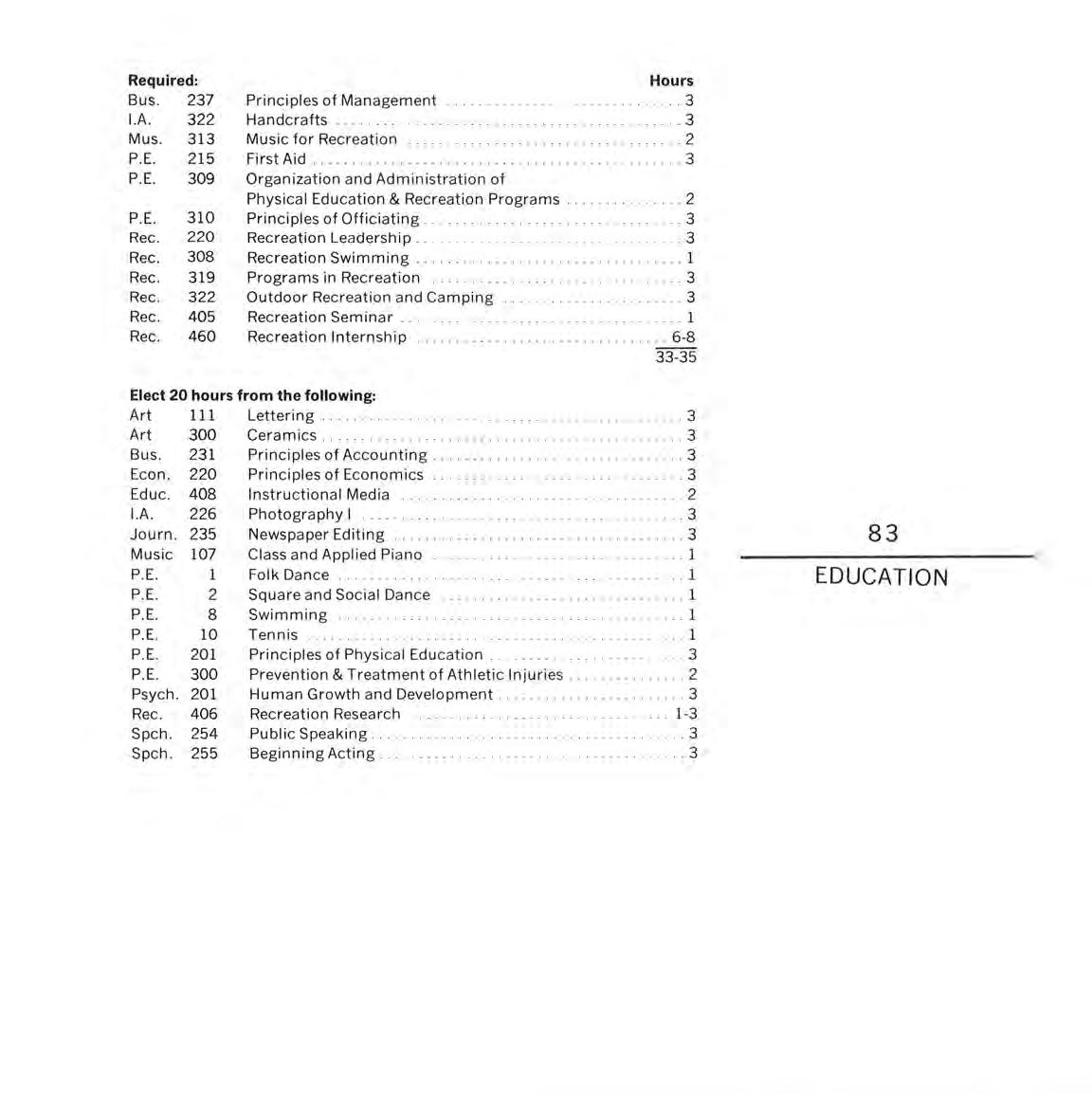
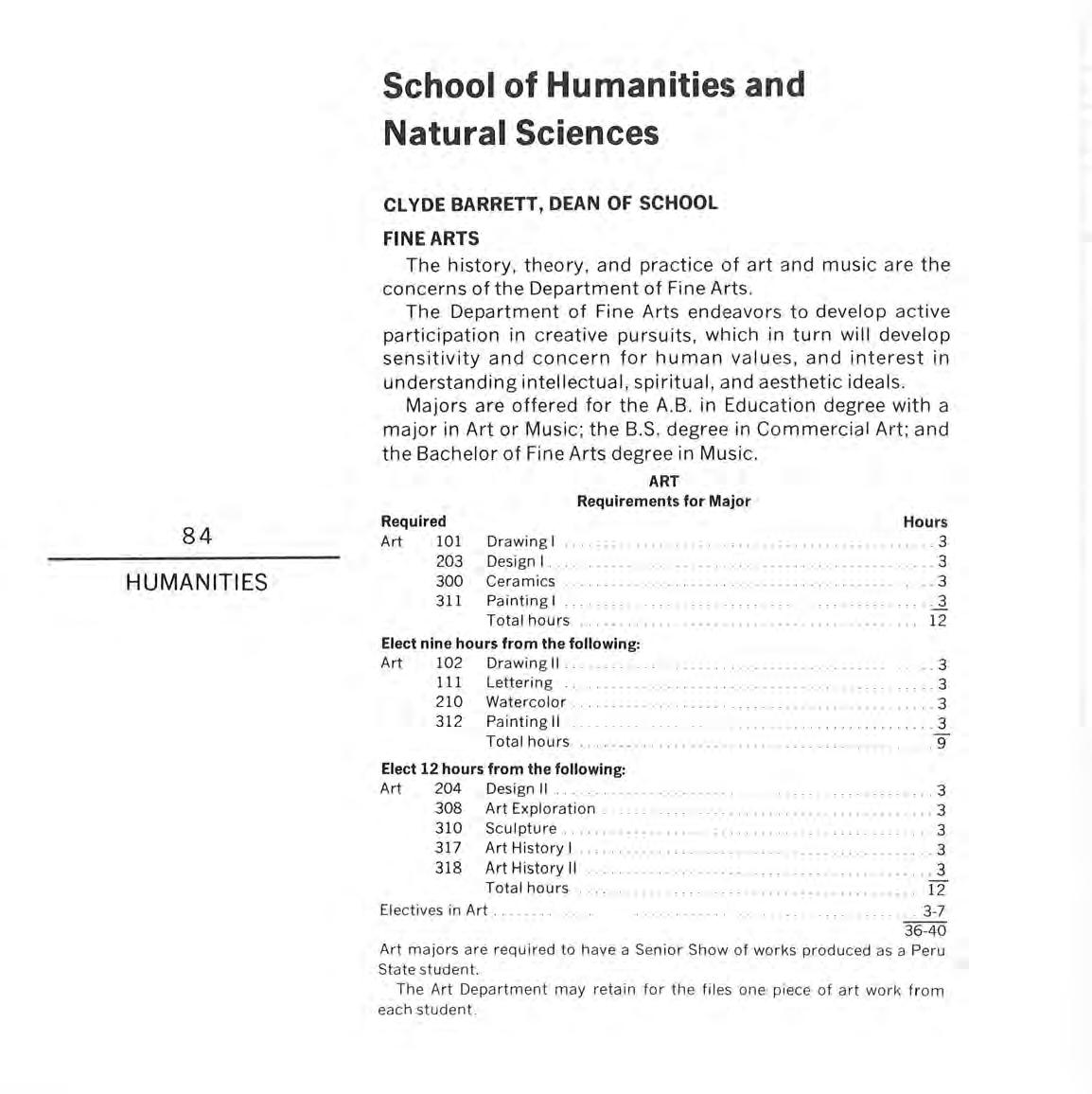
The history , theory, and practice of art a nd music a r e the concerns of the Department of Fine Arts .
The Department of Fine Arts endeavors to develop active participation in creat iv e pursuits , which i n turn will develop sensitivity and concern for human valu es, a nd inter es t in understanding int el l ectua l, spiritual, and aesthetic id ea l s.
Majors are offered for the A.B. in Educ at ion degree with a major in Art or Music; the B .S. degree in Commercia l Art; and the Bachelor of Fine Arts degree in Music .
Art majors are required to have a Sen i or Show of works prod uced as a Pe ru State st udent.
The Art Department may retain for the fil es one piece o f art wo rk from each stude nt.
COMMERCIAL ART ( B.S. Degree)
Requirements for Major
Required
Art. 101 Drawing I
Art 102 Dr aw ing II
Art 111 Lettering I
Com.Art 211 Layout
Art 203 Design I
Art 221
Com. Art 302
Com. Art 303
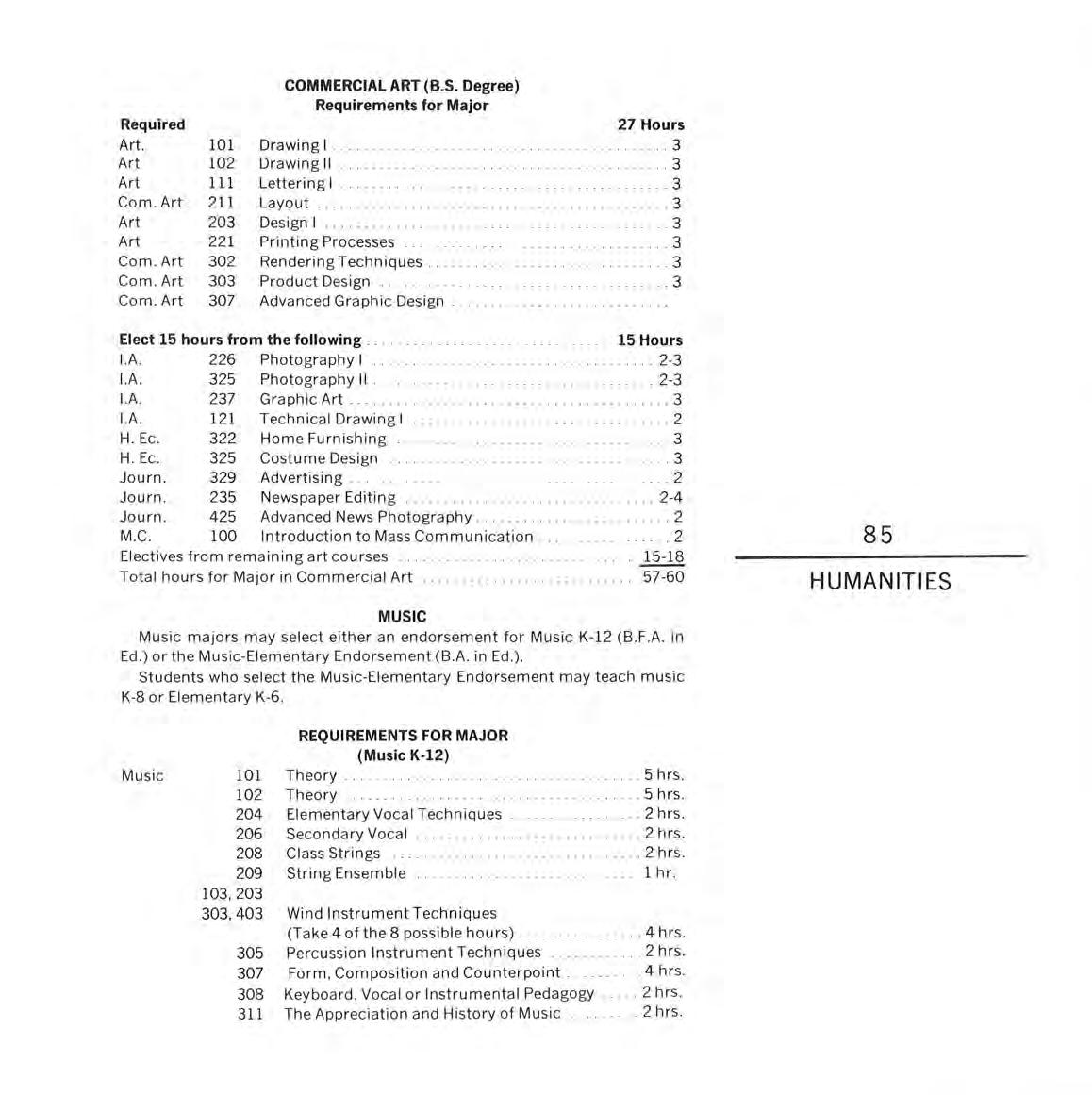
Printing Processes
Rendering Techniques
Product Design
Com . Art 307 Advanced Graphic Design
Elect 15 hours from the fo ll owing
I.A. 226 Photography I
I. A. 325 Photography II
I.A. 237 Graphic Art
I.A. 121 Te c hnical Drawin g I
H. Ee 322 Home Furnishing
H Ee. 325 Costume Des i gn
Journ. 329 Advertising
Journ. 235 Newspaper Editin g
Journ 425 Advanced New s Photogr ap hy
M.C. 100 Introdu ct ion to Mass Communication
Electives from rem a ining art courses
Tot a l hours for Major in Commercia l Art
Music majors m ay se l ect e ither an endorsement for Music K- 12 (B.F.A in Ed. ) o r the Mu sic-E lementary Endorsement (B.A. in Ed.).
Students who se l ect the Mu s ic-E l ementary Endor se ment m ay teach music K-8 or Elem enta ry K-6.
REQUIREMENTS
* Vocal majors will be required to demonstrate piano acc ompaniment proficiency.
Note: All students who elect music as their major are required to be enrol l ed in one or more of the ensemble groups each semester. Two hours of applied strings may be substituted for c l ass strings Musi c students are required to attend recita l s and co ncerts as a partial fulfillment of the graduation requirement. Mu s ic majors working toward the Bachelor of Fine Arts degree in Education are required to give a full recital. Applied Music. Private instruction is provided in voice, piano , organ, strings, woodwinds , brass and percussion. There is no charge for private lessons to students within the department. Those outside the department m ay register for l essons at the rate as indicated in the Financial Section. Music students are required to show a proficiency in piano to meet the demands of the ir c l assroom activities. At least one semester of private voice instruction is required of majors.
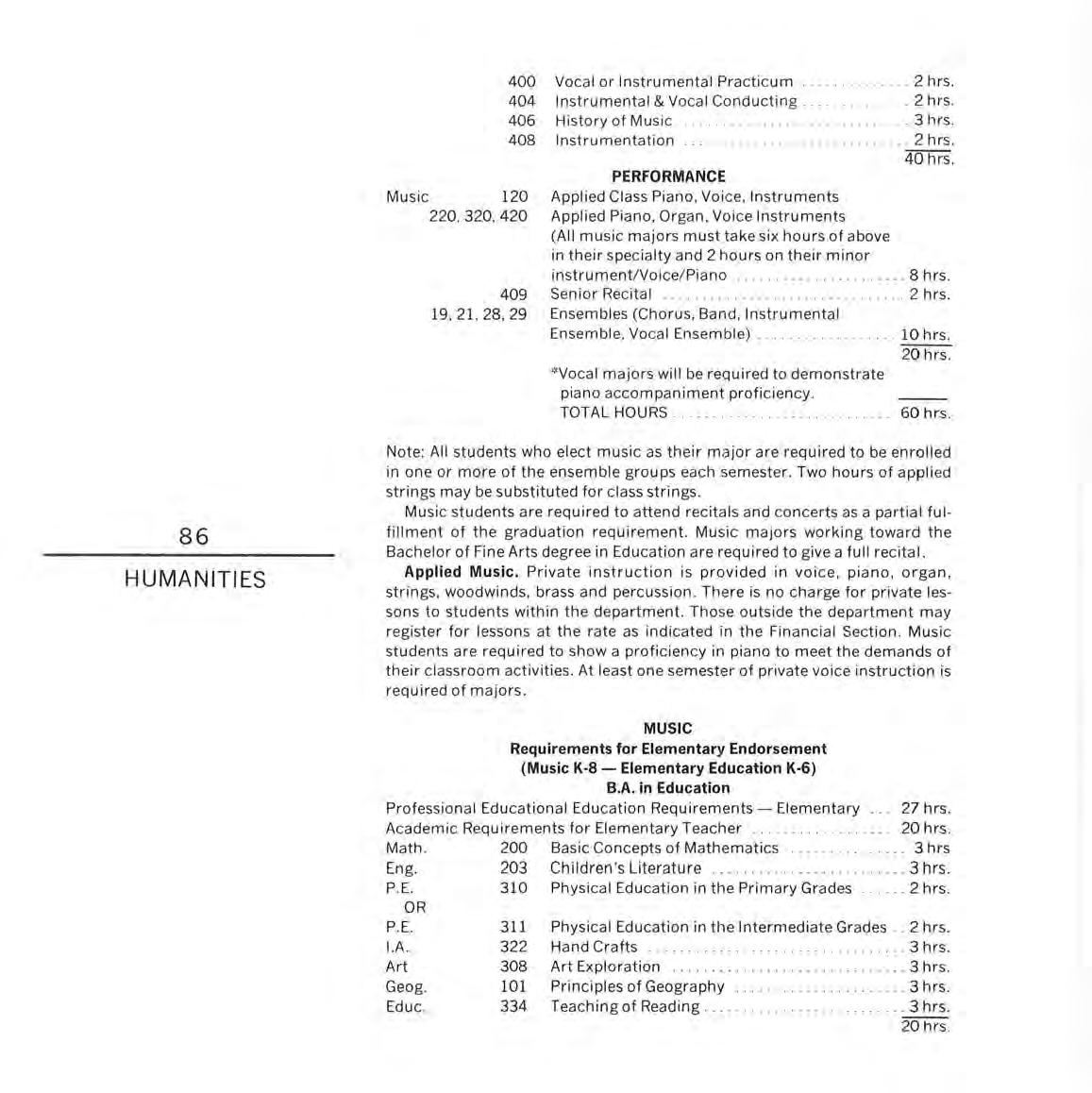
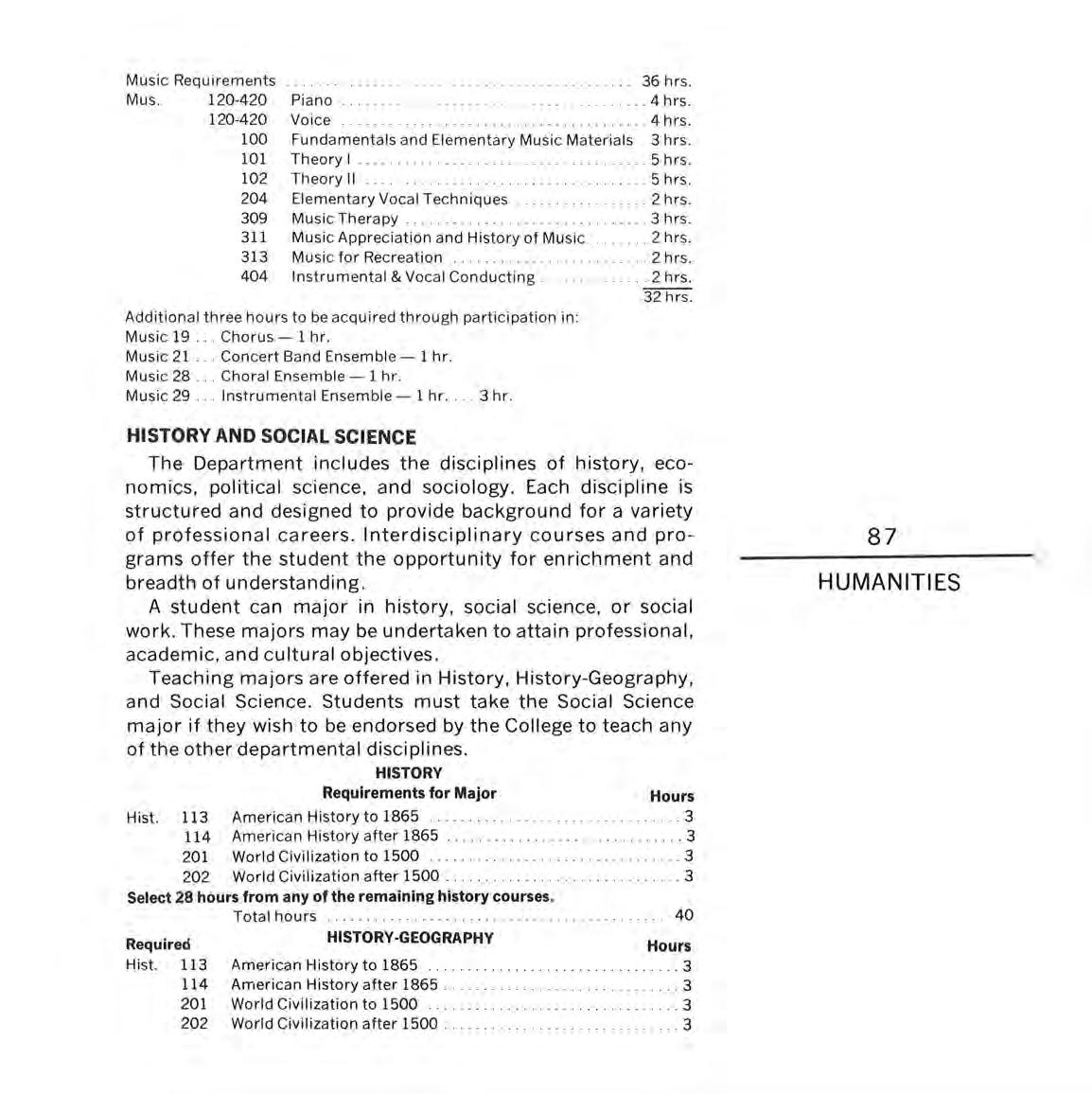
The Department includes the disciplines of history, economics, political science, and sociology. Each discipline is structured and designed to provide background for a variety of professional careers. Interdisciplinary courses and programs offer the student the opportunity for enrichment and breadth of understanding.
A student can major in history, social science, or social work . These majors may be undertaken to attain professional, academic, and cultural objectives
Teaching majors are offered in History, History -Ge ography, and Social Science. Students must take the Social Science major if they wish to be endorsed by the College to teach any of the other departmental disciplines .
Seler.t an additional 19 hrs. from remaining history courses.
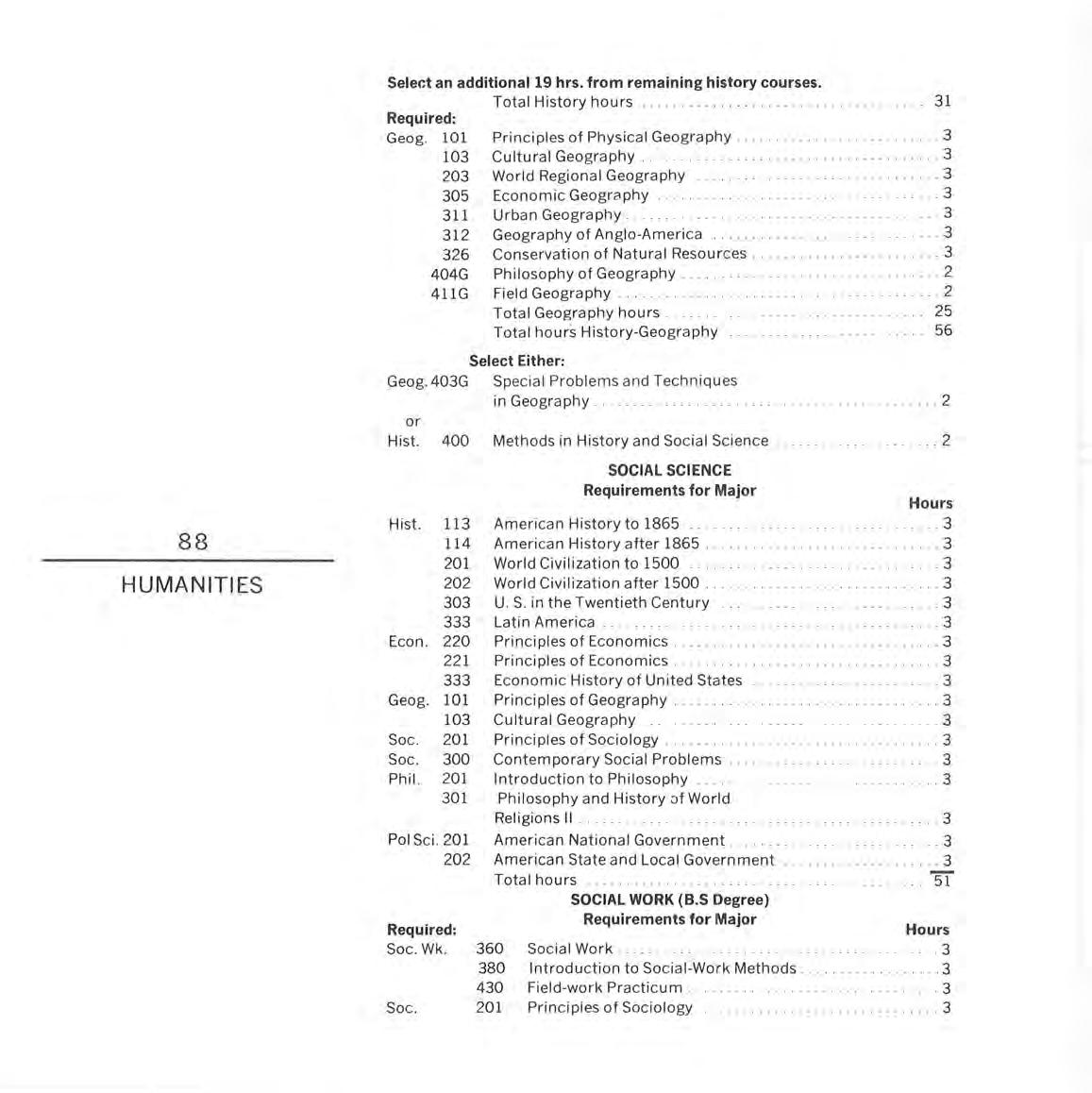
The Department of Language Arts offers majors for the A V. in Education degree, the A.B . degree in English Language and Lit erature, and the A.B. degree in Speech and Drama. Concentration for the S.S. degree is offered in Mass Communications and Journalism.
The Department endeavors to foster the development of individual literary skills and talents.
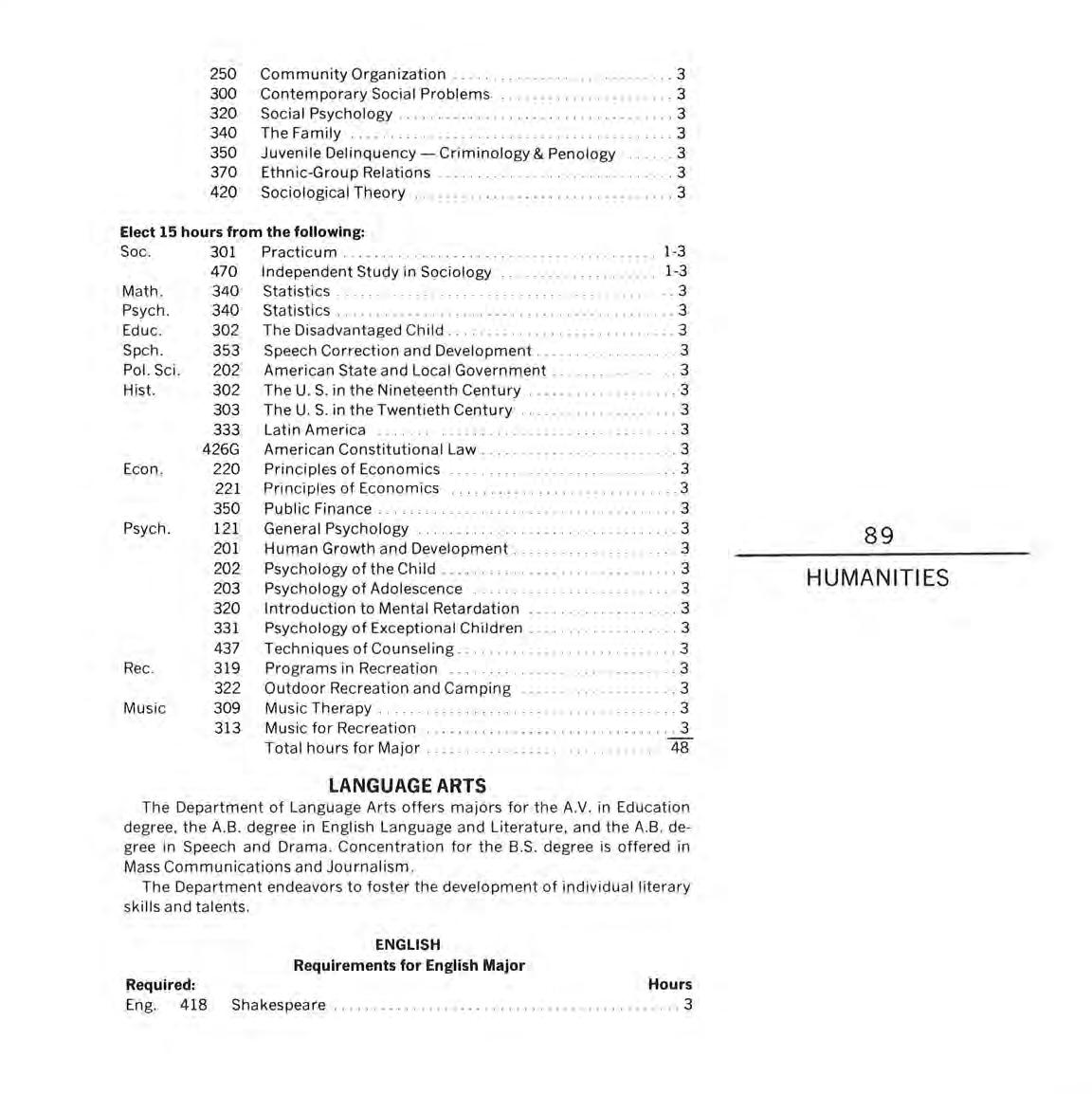
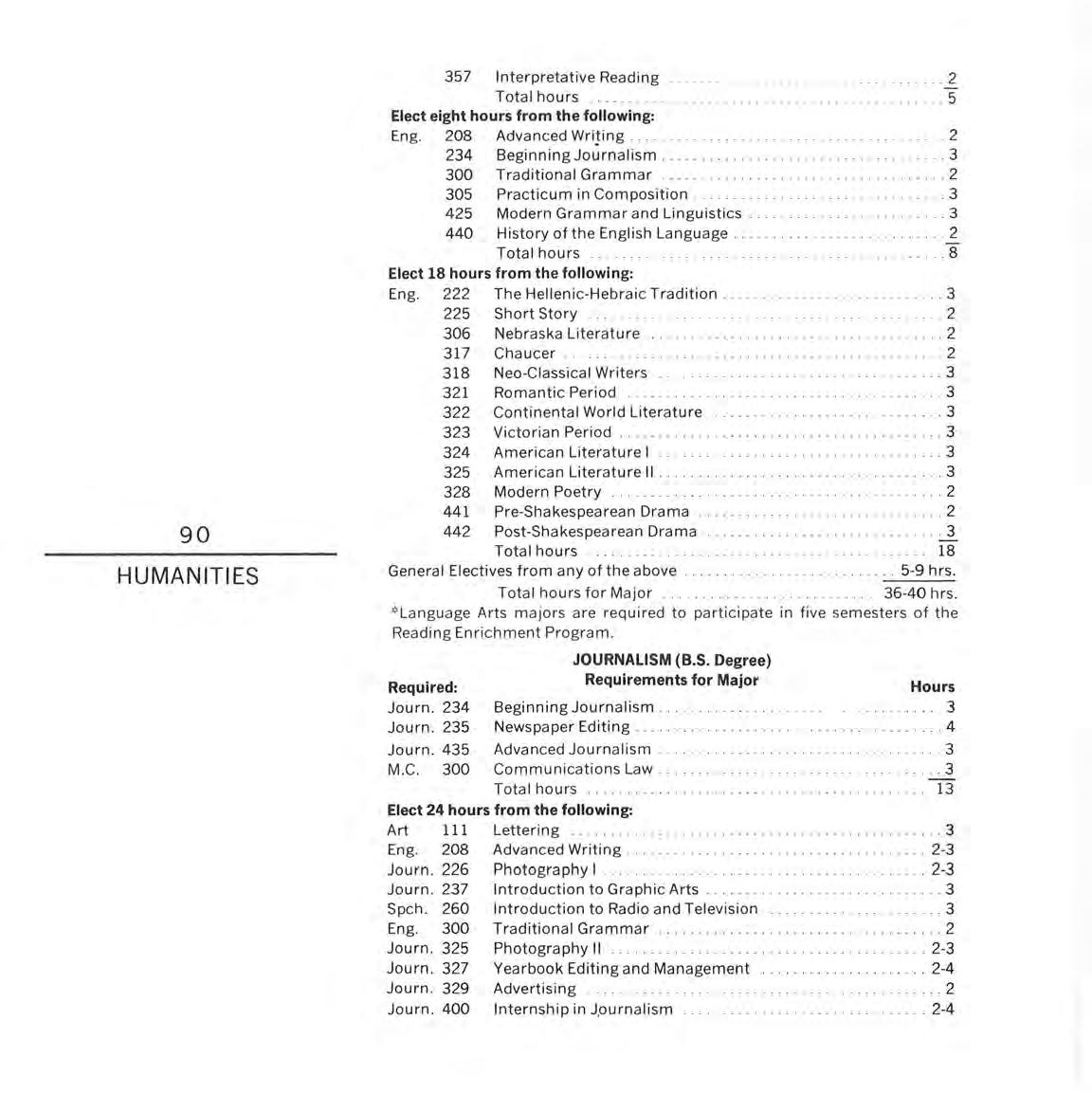
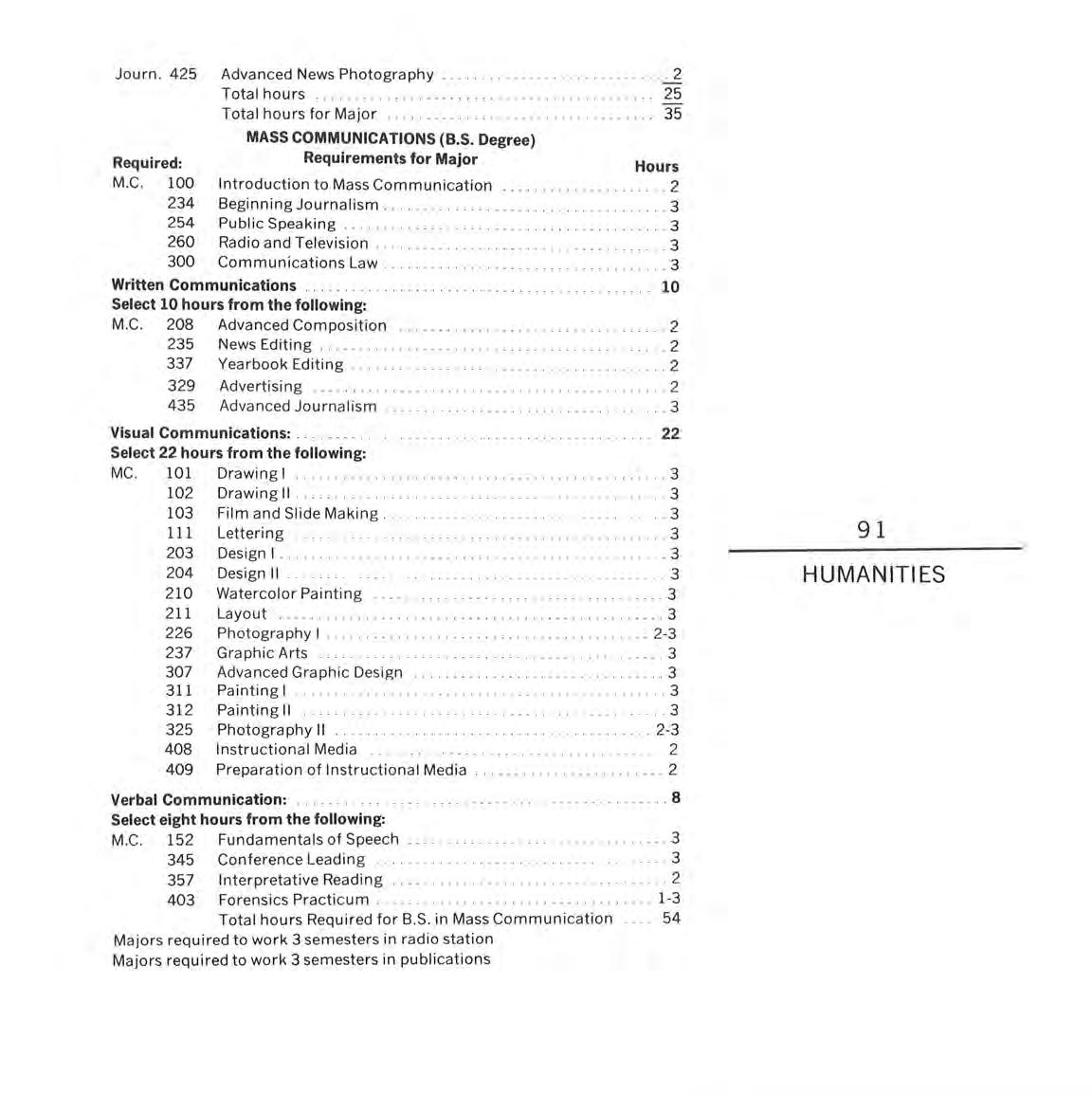
Prospective law students are urged to take a Bachelor's degree prior to beginning their legal studies. Application to the law school of the student's choice should be made early in the fourth year of the pre-legal study.
Most schools of law student may choose much of his course work from those fields in which he has the most interest Some work in English composition is important since the ability to use the English language effectively is highly recommended for law students. Pre-law students are assigned an advisor who works closely with them in prngramming the four years of study .
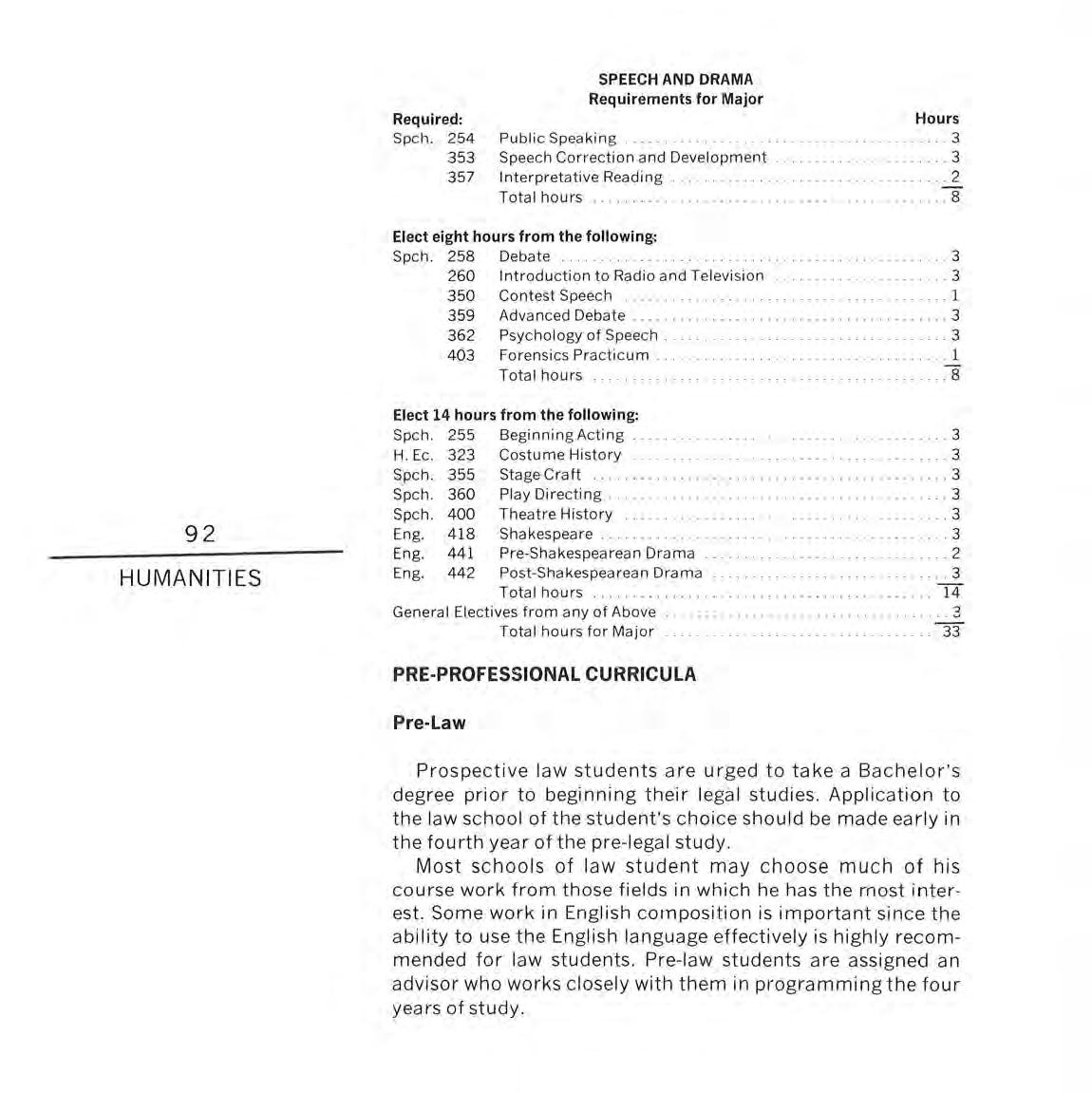
Cou r ses in B i ology are designed to p r epare t eac h ers , provide pre - pro f essi o n a l tr a inin g, provide a background for g r a du ate stud y, a nd e nri ch the background o f th ose in other p rof ess ional fields.
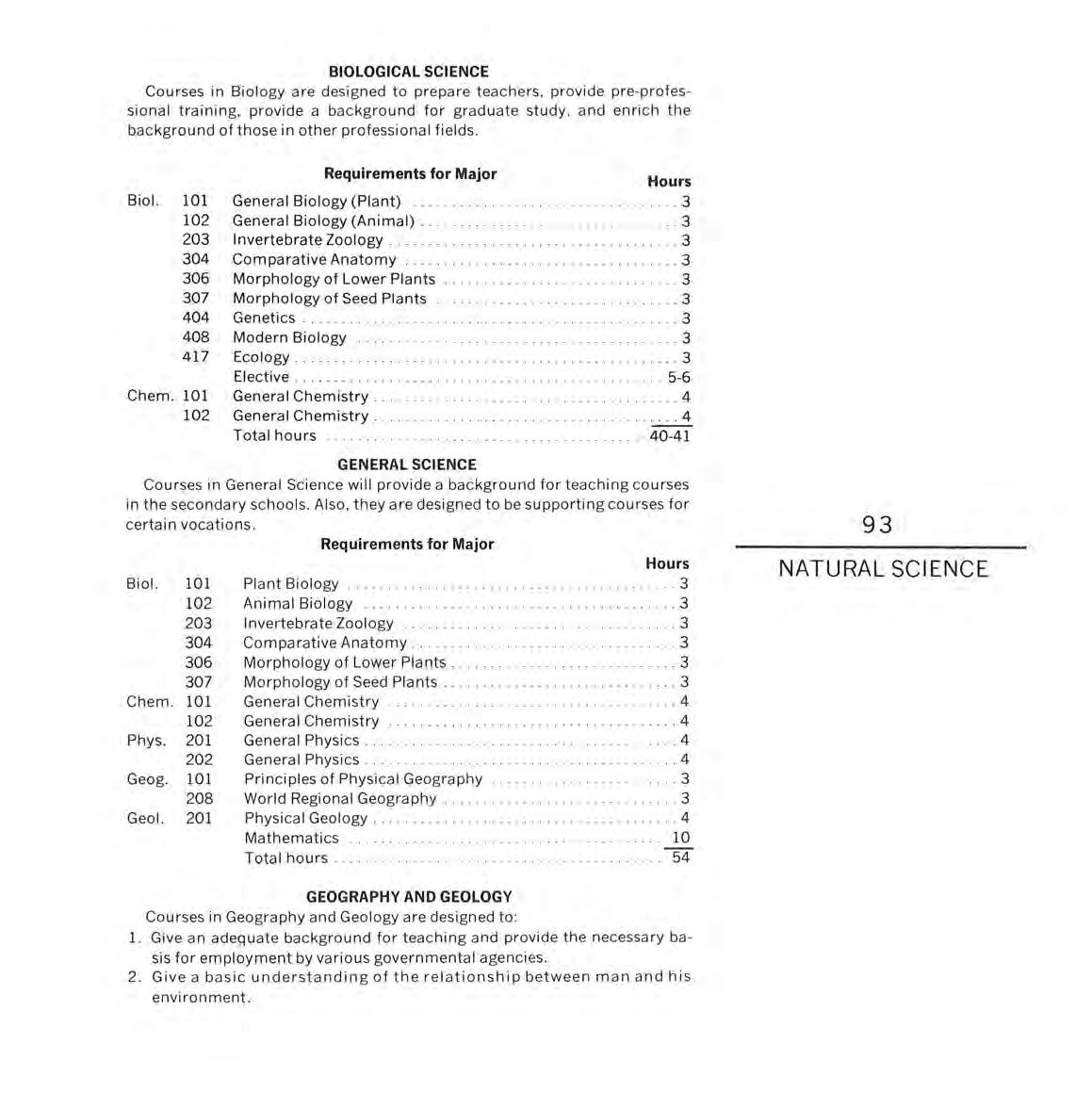
Courses in Genera l Sc i e n ce wil l provide a bac kground for t eac hin g co ur ses in the seco n dary schoo l s. A l so , the y a r e designed to be s u ppo rtin g cou r ses f or certai n vocations.
Requirements for Major
Pl an t Bi o l ogy
Anim a l B i o l ogy
In ve rt eb rat e Zoo l ogy
Compa rati ve A nat o m y
Morpho l ogy o f Low e r Plant s .
Morphology o f Seed Pl a nt s
General Chemistry
Ge n e r a l Chemistry
Ge n e ra l Phy s i cs
General Ph ys i cs
Prin c iple s of Phy s i ca l Geography
World Re g i ona l Geography
Physica l Geology .
Mathem ati cs
T ota l hour s .
GEOGRAPHYANDGEOLOGY
Co ur ses in Geography a nd Geology a re designed to:
l. Gi ve a n ade qu a te background for teaching a nd p r ov id e the n ece ss ary bas i s for e mplo yme nt by va riou s gove rnm en t a l agencies.
2. Give a bas i c understanding o f the r e l at i o n sh ip be tw een m a n a nd hi s env i ro nm en t .
'''Requ ir ed of Secondary Teachers who are p l anning to teach Geography. NOTE - Non-teachers should take Field Geography in p lace of the methods course as a requirement for a ma j or in Geography.
If Geography is planned in teacher education , another endorsement i s required. See Advisors for particulars.
Courses in Mathematics are designed to :
1. Provide the necessary background for vocations in mathematics other than teaching
2. Provide an adequate basis for graduate study.
3. Provide the necessary foundation for teach in g
Requirements for Major
1 Provide a better background for certa in vocations other than teaching.
2 Prepare st ud e nt s to teach both c h emistry and physics in th e secondary schoo l s.
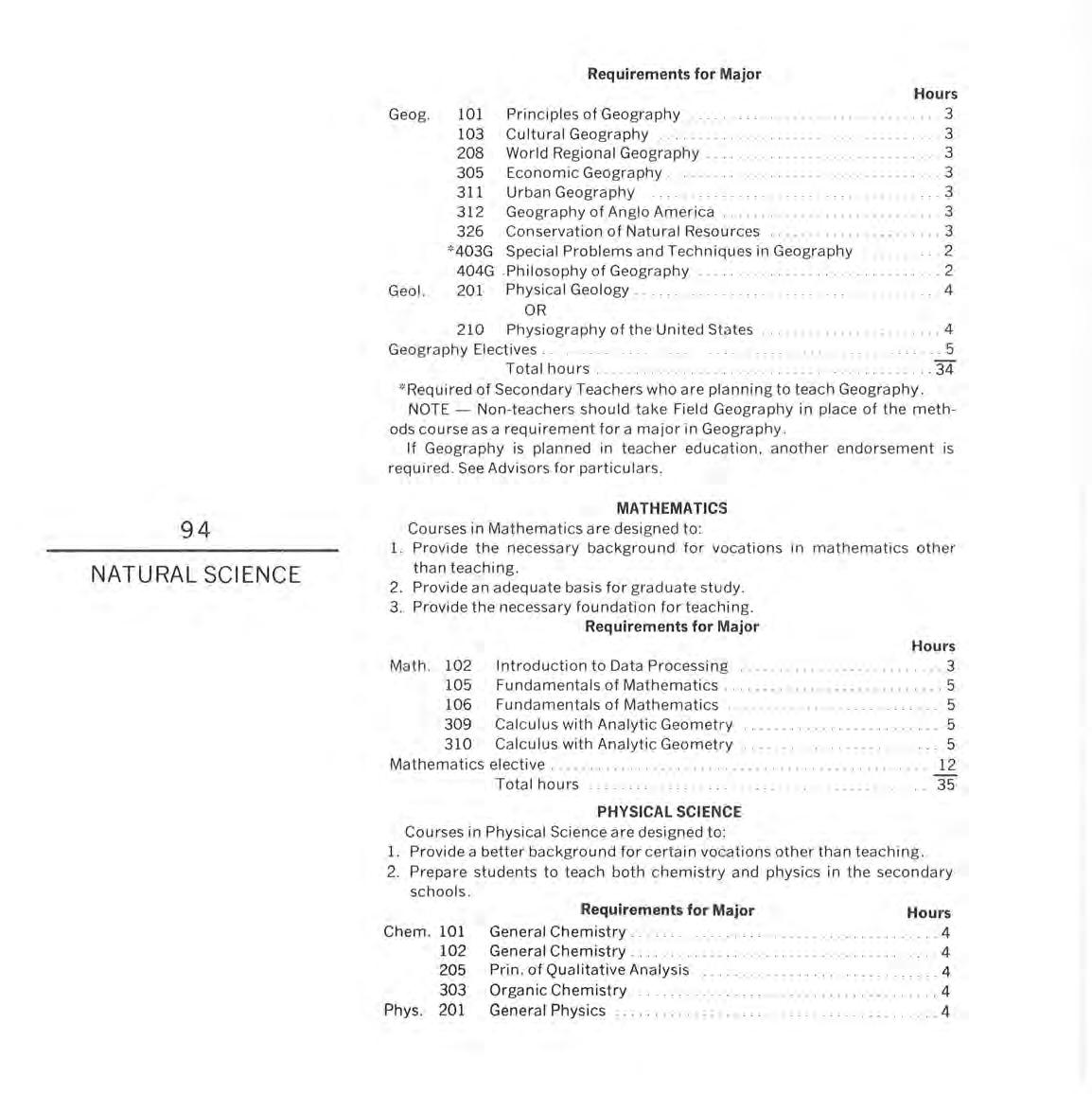
It i s recommended that addit i onal work be taken in e ith er Chemistry or Physics to assure admission to graduate study.
The following program is suggested for pre-agriculture students:
Below is a suggested out l ine for both programs. The student is adv ised to secure a cata lo g from the professional school he expects to attend, as indi vidual schools vary in requirements for pre-dental and pre-medical programs.
The requirements for different forestry schoo ls vary. Early in the pre -forestry program the st udent should consult the cata lo g of the college he p lans to attend later. Grades of below average will probably not transfer. The plan below is a suggested out lin e:
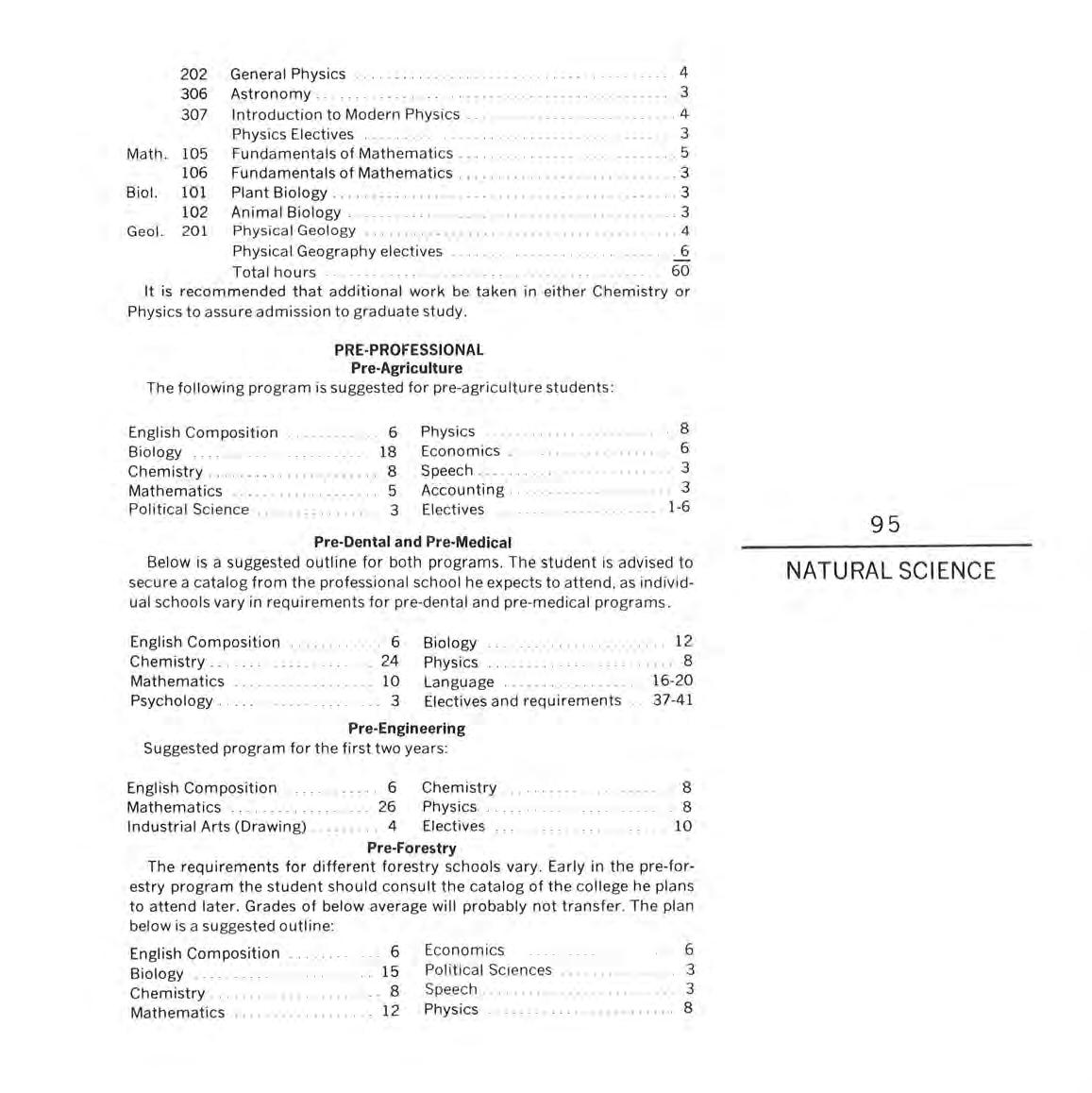
The following program is suggested as prer equis ite for entering a co lleg e of mortuary science:
Some co ll eges of nursing require two years (60 semester hours) of prenursing , others require less. Students fol l owing a pre-nursing c urriculum should know the requirements of the particular school of nursing to which they will transfer. The program below, based on two semesters and one summer, will meet the requirements to enter the University of Nebraska
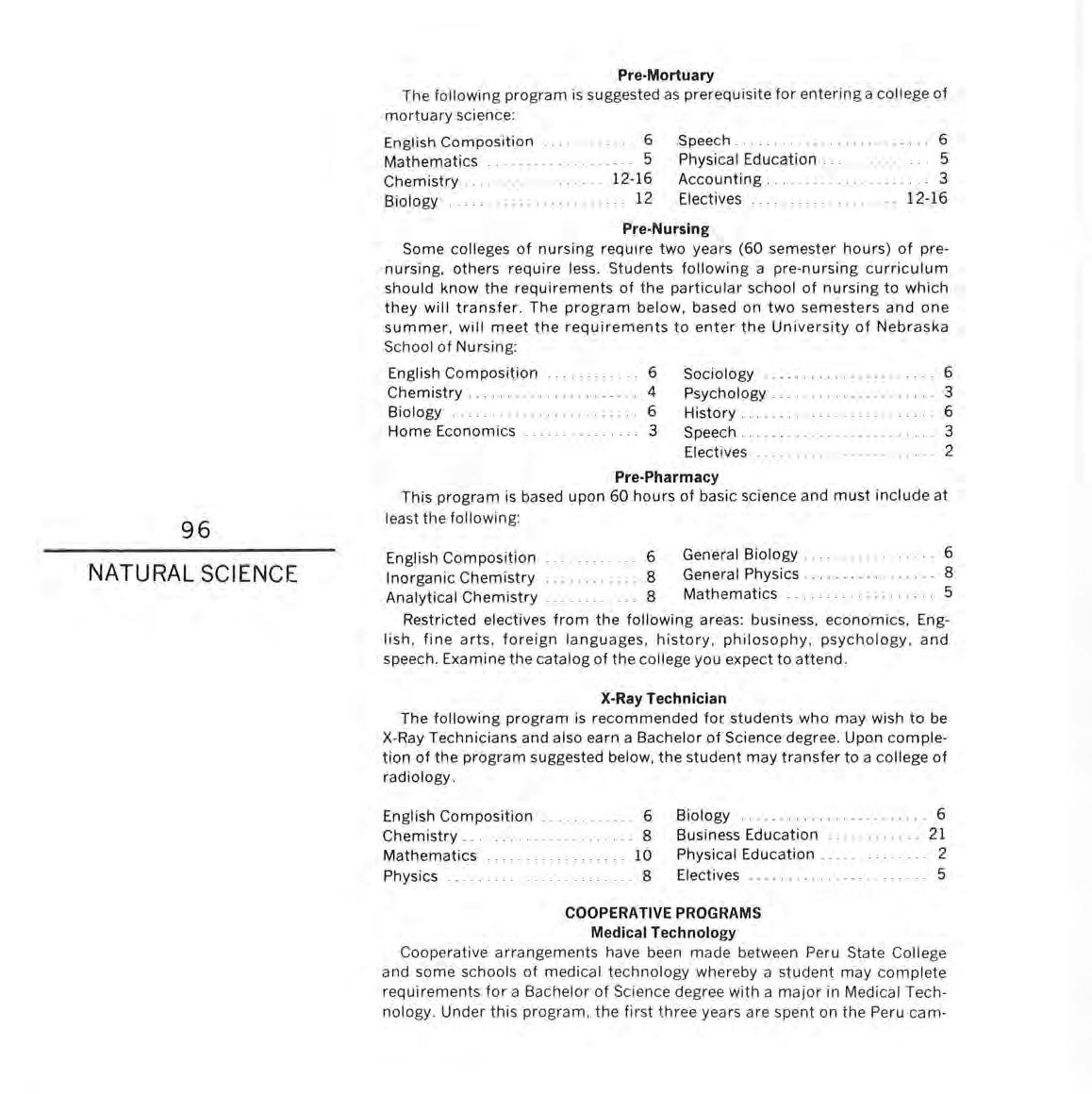
This program is based upon 60 hours of basic science and must include at l eas t the fol l owing:
Restricted electives from the following a reas : business, economics, English , fine arts, foreign langu ages , history, philosophy, psychology , a nd speech. Examine the catalog of the college you expect to attend.
The following program is recommended for students who may wish to be X-Ray Technicians and also earn a Bachelor of Science degree. Upon comp l etion of the program suggested below, the student may transfer to a co llege of radio l ogy.
Cooperat i ve arrangements have been made between Peru State College and some sc hool s of medical technology whereby a student may comp let e requirements for a Bachelor o f Science degree wit h a major in Medical Te c hnology. Und er this program, the first three years are spent on the Peru cam-
pus. Durin g these thre e years, the stud en t mu st satisfy the General Stud i es requirem e nt for g radu a tion , co mpl ete a ninimum of 90 se m este r hour s app licab le tow a rd a bac ca l a ur ea te degree , com p l ete 16 semes ter hours of c hemistry, 16 hours of bio l ogy, and at le ast one co urse eac h in m a them at i cs a nd physics
The f o urth year , which co n s ist s of a full tw e lve-month prog r a m, i s spen t in residen ce at an a pprov ed sc hool o f Medica l T ec hn o l ogy. Up o n sat i sfactory completion of this year of train i n g, the st udent m ay r eceive the baccalaure a t e deg r ee from Peru State College. App l i ca ti o n to the sc h oo l of Med i ca l Tec hno l ogy s h o u l d be mad e ear l y in the third year of trainin g at Pe ru.
FIRST YEAR
Fi rst Semester
Eng l ish 101
Math 105 .
Animal Bio l ogy 102
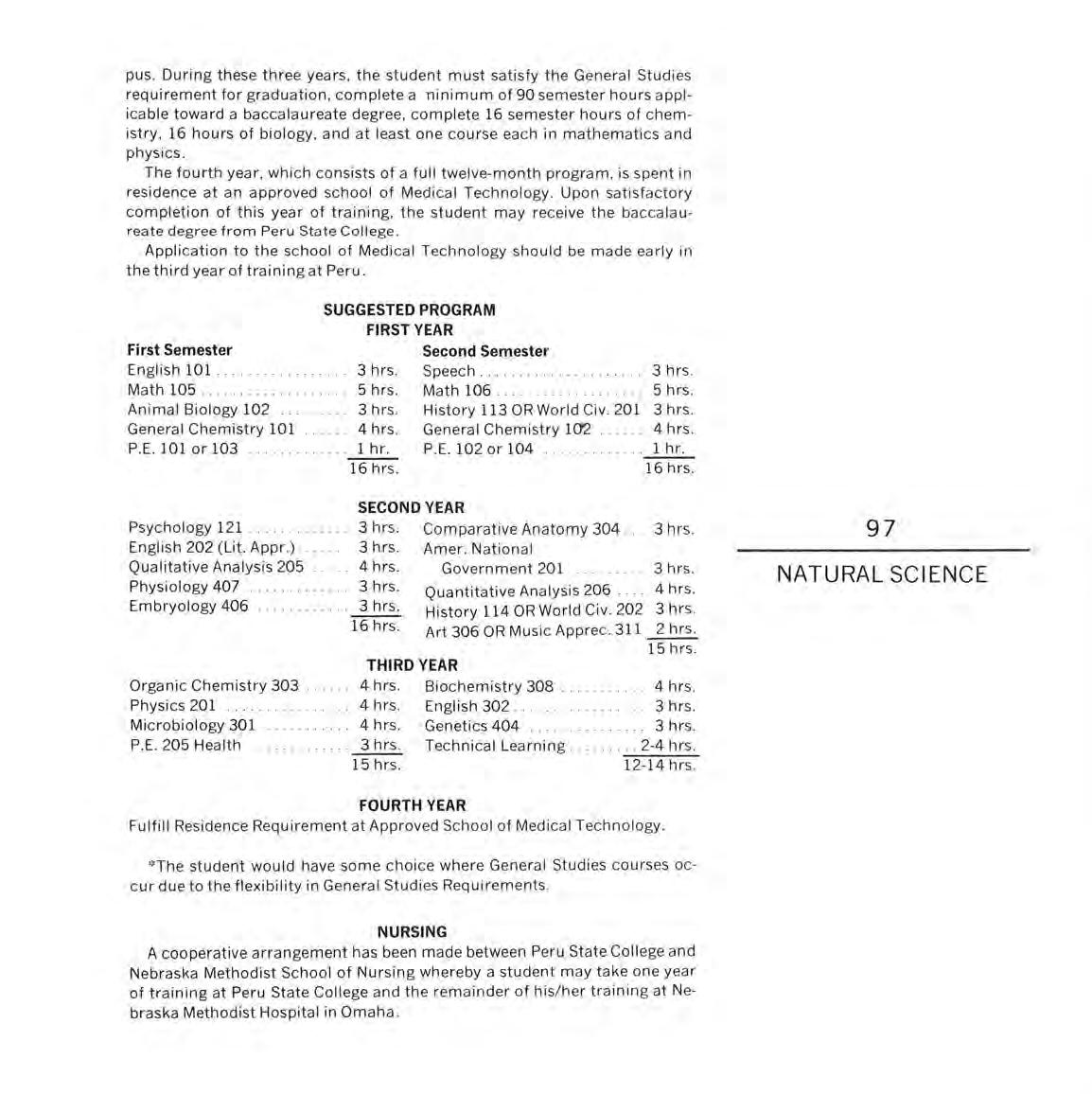
General Chemistry 101
P.E. 101 o r 103
Second Semester
3 hr s. Speec h
5 hr s. Math 106 .
3 hr s. Hi stor y 113 OR World Civ. 4 hr s. General Chemistry 10"2 1 hr . P E 102 or 104
hr s.
SECOND YEAR
201
Psyc h o l ogy 121
En glis h 202 ( Li t. Appr.)
Qualitative Analysis 205
Physi o l ogy 407
Embryo l o gy 406
3 hr s. Co m pa rati ve Anatomy 304
3 hr s. Ame r. Nati ona l
4 hr s. Government 201
3 hr s.
Organic Chemistr y 303
Phy s i cs 201
M ic robio l ogy 301
P.E. 205 He a l th
Quantitative Analysis 206 .
3 hr s. History 1 14 OR World Ci v. 202
16 hr s . Art 306 OR Mu s i c Ap pr ec . 311
THIRD YEAR
4 hr s. Biochemistry 308 ..
4 hr s. En g l i sh 302 4 hr s. Genetics 404
3 hr s Tec hni ca l Lea rnin g
FOURTH YEAR
Fulfi l l Residence Requirement at Approved Schoo l o f Medical T ec hn o logy.
'' Th e stud e nt would have some c hoi ce where Ge n e r a l Studi es co ur ses occ ur due to th e flexibi l ity in Ge neral Studies Requirements .
NURS ING
A cooperat ive arrangement has been m ade betw ee n Peru State Col l ege a nd Nebrask a Methodist Schoo l of N ur s in g whereby a st ud ent m ay tak e one year of tr a inin g at Peru State Co l lege and th e remainder o f hi s/ h e r tra i nin g at Nebraska M et h od ist Hosp it a l in Omaha.
Under this arrangement th e students are respon s ibl e for securing admi ssion to the nursin g program. Durin g the year of sc h oo lin g at Peru , st udent s would take those cou rse s re co mmend ed by Nebr aska Meth od i st as being desirab l e co urse s preceding e ntr a n ce int o p r o fe ss ion a l t ra inin g. Students enro ll ed in this program do not receive a degr ee throu g h Peru State Col l ege.

First Semester Second Semeser
Required Courses: Requ i red Courses: Engli s h Compos it i on 101 3 hr s. Lit. Appr ec. 2 02 OR Animal Biology 102 3 & 1 hr s. En g. Co mp . 202 3 hr s. (An a dditional hour of Physiolo gy 407 3 hr s. independent study must Human Growth & be taken along with Development 201 3 hr s. this co urse). The Famil y 340 OR Principles of Soc. 201 3 hrs. Soc . Prob. 300 . 3 hr s.
Gener a l Psycholo gy 121 3 hr s .
Recommended Hours to Fill Schedule
Gener a l Chemistry 102 4 hrs. Microbiolo gy 301 3 hrs.
INTERIM:
Hum a n Anatomy 3 05 .. 1 h r.
Second and Third Years: Nebr aska Meth od ist Ho s pit a l
Students enrolling in the college generally register for courses corresponding to their classification (freshman, sophomore, etc.) unless advised to do otherwise Courses numbered 1-99 are unclassified a nd open to a ll st ud ents. Courses numbered 100-199 are for freshmen; 200-299 for sophomores ; 300-399 for juniors; 400-499 for seniors; 400G499G for graduates and seniors; 500-599 for graduates .
100 Business Mathematics. A review of the four fundamental operations of ar ithm et ic app li ed to whole numbers , fractions , and dec im a ls; a pplic ations of percentage ; comp utin g int erest and discount in g notes ; consumer credit; cas h a nd trade discount; computing m a rkup, ret a il and comm i ss ion; marking goods; the ar ithm et ic of pa yrolls. 3 hr. Fir st semester.
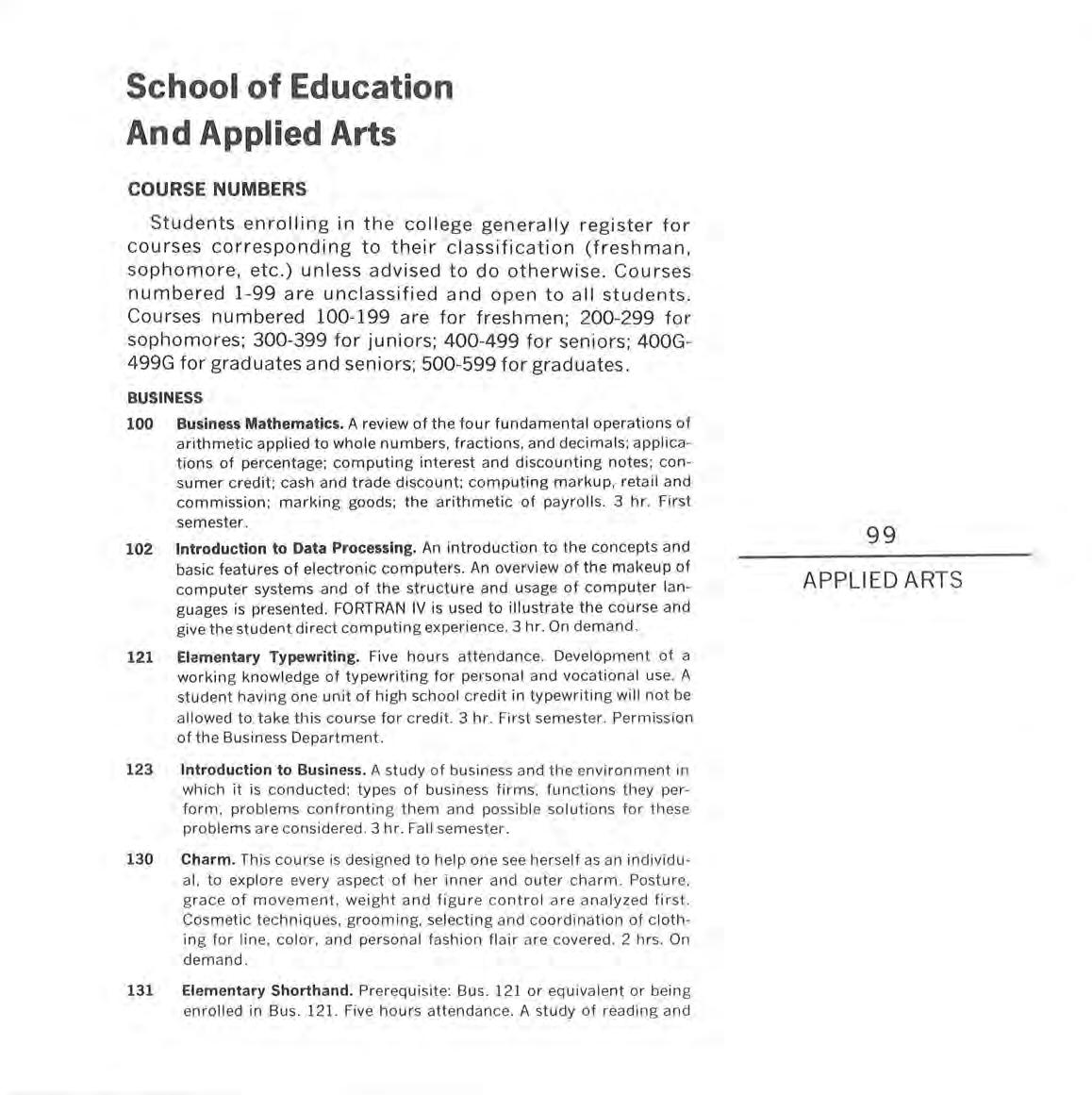
102 Introduction to Data Processing. An introdu ct ion to the concept s a nd basic features of e l ectron i c computers. An overv i ew of the m a k eup of computer systems a nd of the structure and u sage of computer l a nguages i s presented. FORTRAN IV i s used to illustrate the course and g ive the student dir ec t co mputin g experience . 3 hr. On demand.
121 Elementary Typewriting. Five hour s a tt end a n ce Deve lopm e nt of a work in g know l edge of typewriting for pe r so nal a nd vocationa l u se. A student havin g one unit of hi g h sc h oo l cre dit in typewriting wi ll not be allowed to take thi s co urs e for c r ed it. 3 hr. First se m es t e r. Pe rmi ss ion of th e Busin ess Dep a rtment.
123 Introduction to Business. A st udy o f bu s in ess a nd th e e n v i ronment in which it i s co ndu c t ed ; typ es of bu s in ess firm s, fun c tion s th ey pe rform , problems co nf ro ntin g them a nd poss i b l e so lution s for th ese prob l e ms a r e co n s id er ed 3 hr. Fall se m es t e r
130 Charm. Thi s co u rse is d es i g n ed to h e l p one see her se lf as a n individua l , to ex plor e eve r y as pect of h e r inner a nd o uter c h arm. Posture , grace of m ove m ent, weight a nd fi g ur e co ntr o l are a n a ly ze d fir st. Cosmet ic t ec hniqu es, g roomin g, se l ect in g a nd coordination o f c lothin g for l ine , co l o r , a n d pe r so na l f as hion fl ai r a re covered. 2 hrs. On d e m a nd.
131 Elementary Shorthand. Pr e r eq ui s it e: Bus. 12 1 o r eq uiv a l ent or bein g enro ll ed in Bus. 121. Five hours att end a n ce. A stud y of re ad in g a n d
writing shorthand, and an introduction to dictation and t r anscrip ti on. A student having one unit of high schoo l c re d it in sho rth an d w ill not be al low ed t o take this cou rs e for credit. 3 hr s. First semester.
132 Intermediate Shorthand. Prerequisite: B u s. 13 1 or one unit of high school c redit in shorthand. Five h o urs a tt end a nce. A continuation of Bus. 131. emphasiz in g the development of s kill in d i ctation and transcr ipti on. 3 hr Ea c h se m es ter
203 COBOL Programming. Prerequisite: Bus. 10 2 or Math 10 2. A genera l introdu ct ion to the ANS COBOL Pr ogramm in g Language and its a pplication to business comput in g. The st ud ent's wo rk w ill in c lud e ana ly zing problems and developing, debugging, runnin g , a nd documenting COBOL programs to so l ve these problems. 3 hrs. On demand.
204 FORTRAN Programming. Prerequisite: Bus 10 2 or consent of instructor. The FORTRAN IV l anguage and it s app li cation to problem so l ving is discussed in detail. The student's work includes ana l yzing a problem and developing a program relative to his field of interest. 3 hr. On demand.
215 Personal Business Finance. Fundamentals of persona l finance. Budgeting; b a nking ; life insurance; accident, health , and casua lty insurance; investments ; trusts; taxes ; income taxes and socia l security. 3 hr. First semester.
220 Intermediate Typewriting. Prerequisite: Bus 121 or one unit of high school credit in typewriting. Stresses speed and accuracy in typewriting letters , m a nus c ript s, tabulations and other forms . 3 hr . Ea c h semester.
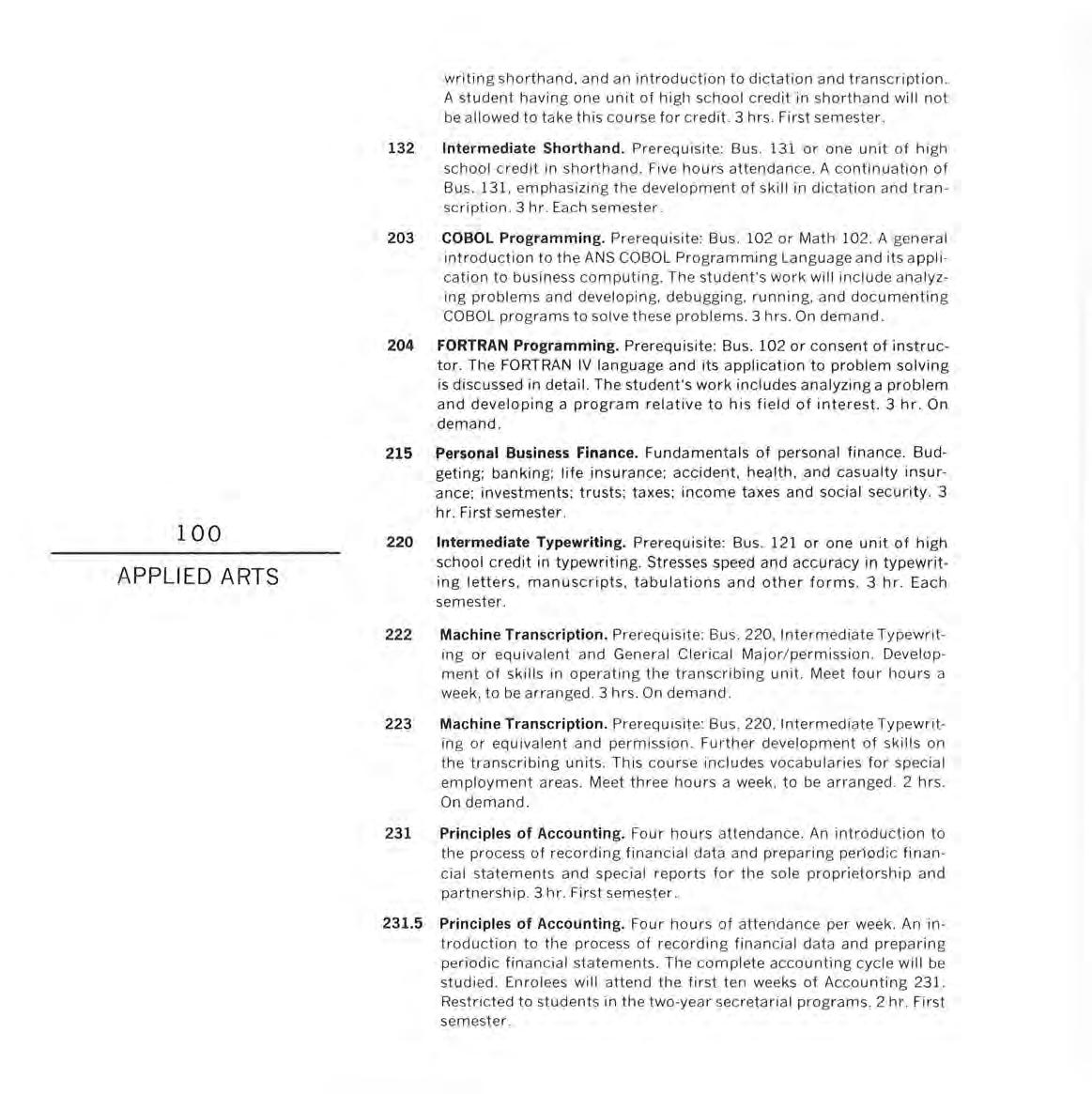
222 Machine Transcription. Prerequisite: Bus. 220, Intermediate T ypewr iting or eq ui va l ent and Genera l Clerical Major /pe rmission. Deve l opment of skil l s in operating the transcrib in g unit. Meet four ho ur s a week, t o be arra n ged. 3 hr s. On demand.
223 Machine Transcription. Prerequisite: Bus. 220, Intermediate Typ ew riting o r eq ui va lent and permission. Further development o f sk ill s on the tran sc ribin g units. This co urs e includes vocabu l ar i es for spec i a l employment areas. Meet thr ee hours a week , to be a rr anged. 2 hr s. On demand.
231 Principles of Accounting. Fou r hours attendance An int roductio n to the pro cess of recordin g fin a n c ial data a nd pr e parin g periodic financia l stat e m en ts and special reports f o r the so le proprietorship and partnership. 3 hr. First semeste r.
231.5 Principles of Accounting. Four hour s of attend a n ce per week. An intr od u ct i on t o the process o f r ecord i ng finan cia l data and pr epar in g periodic finan c ial sta t eme nt s. Th e co mplete accou ntin g cyc l e w ill be studied. Enrolees w ill atte nd the first ten weeks of Acco untin g 231. Restricted to stud ents in the two-year secretar i a l pr og ram s. 2 hr. First semester.
232 Principles of Accounting. Pr e requisite: Bus. 23 1. Fou r h o ur s attenda n ce. A continuation of Bus. 231, co n s iderin g the accounting process in the co rpor ati o n ; th e stu de nt is int r oduced to accoun t i n g theory, financial statement analysis a nd cost accounting. 3 hr. Seco nd se m es t e r

235 Business Machines. Thr ee hours attendan c e with indi v idual labo r atory wor k arranged. Basic ca lc ulatin g machin e operations , ca r e of the ma c hines a nd bu s in ess app li ca tion problems are st r essed. 3 hr. Eac h se mester.
237 Principles of Management. Prerequisite: Bus 123 A st udy of the fun cti o ns of mana gement with an intr od u c tion to s uc h areas as organ i zati o n theory , decision m a kin g , le ade r s hip, and motivation as th ey apply t o a ll organized g r o up s, but geare d prim a ril y t owa rd the ex i st in g business organization. 3 hr ..; eco nd se mester.
240 Office Machines. Prerequisite: Bus. 121 or equivalent. Machines used in the present day business off i ce o th e r than ca l cu l atin g m achi n es a r e st udied. The se in c lud e a study on th e vario u s duplicating mac hine s, ma g neti c ca rd typ ew rit e r, co mpos e r a nd o th e r machines avai lab le for demon str ation 3 hr Second semester.
301 325
Business Communications. Prerequisite: Ab ility t o type. A study of Bus in ess Engli s h a nd co mmuni ca tion as well as le a rnin g how to co mpose and produ ce th e various kinds of letter s u se d in the business world 3 hr. First semester.
Secretarial Procedures . Pr e r eq ui sites: Bus. 123, a nd 22 0 Sec r et a ri a l r es po n s ibilities in the modern o ffi ce , import a nt pe r so n al qu a liti es of th e sec ret a r y a nd r ecords m a na ge ment are stu died. 3 hr Seco nd semes t e r.
328 Principles of Marketing. A stud y of the buyin g, se llin g, transport in g a nd storing fun c tion s inv o lved in marketin g; th e stud e nt i s introduced to retailin g, who l esa lin g and mark eting mana ge ment. 3 hr. First semester.
329 Advertising. Prer equi s it e: Bus . 328. A study of adve rti se m ent s a nd medi a from thre e v iewpo int s: m a na ge ment - m a rketin g , co mmuni cations- c reativity , a nd co n su m e r -c itizen . 2 hr. Fir st semester.
330 Sales Management. Prerequisite: Bus. 328. A sales management course incorporating salesmansh i p training as a substantial part of the management offering. 3 hr. First semester.
331 Insurance. Prerequisite : Bus . 123. A study of the major types of persona l and business insur ance, including life , property, health and accident, public li abi lit y a nd soc ia l in s urance. 2 hr. Second semester.
332 Investment. Prerequisite: Bus. 232 . A study of the major uses of investment funds, including saving accounts in banks and other fin a ncial
institutions, government bonds, corporate stocks and bonds, annuit i es and real estate. 3 hr. Second semester.
333 Dictation and Transcription. Prerequisites: Bus. 132 a nd 220 or two units High Schoo l Short h and. Four hours attendance. Emphasis is placed on increasing sk ill s in taking d i ctation and transcribing it into mailable form. 3 hr. Each semester.
334 Advanced Typewriting. Prerequisite: Bus. 220. Three hours attendance. Stresses the development of a high degree of proficiency in compos iti on, machine dictat i on and production typewriting. 3 hr. Second semester.
335 Industrial Management. Prerequis it e: Bus. 237. A study of the management of an industrial plant ; l ocat i on, construction, layout, equ ipm e nt. suppl i es and personnel are cons i dered. The purchase, storage and processing of materials and sa l e of the finished product are stressed. 3 hr. First se mester.
336 Business Law. Prerequisite: Bus. 123. A study of the l ega l rights and ob li gations of parties to contracts co n cerned w ith such matters as exchange, property, agency, in surance and bankruptcy; specia l l ega l problems of partnerships and corporat i ons are cons id ered. 3 hr First semester.
337 Intermediate Accounting. Prerequisite: Bus. 232. A st udy of the prob l ems involved in establ i sh in g so und va lu at i ons for asset. li abil it y and net worth it ems; proper reporting of fin a n c ia l position and net in come i s stressed. 3 hr. First semeste r.
339 Cost Accounting. Prerequisite: Bus. 232. A study of manufacturing cost under process and job -order cost systems; determination a nd app li cat i on of standard cost , a naly s i s of cos t behavior a nd cost budgeti n g to a id management in making decisions are stressed. 3 hr. Second semester.
340 Statistics. A study of the methods o f su mm a ri z in g and interpretin g data , elementary probab ilit y a nd it s re l at i on to distributions. The meanings , im porta n ce, and app li cat ion s of the normal a nd binomical d i strib uti ons. The methods o f random samp lin g, testing of hypotheses, ana l ysis of paried data, and int erp r etat i o n of sta nd ardized test scores. 3 hr. Second semes t er.
341 Income Tax Accounting. Prerequisite: Bus. 232. Th e Federal In come Tax l aws and regulations concerning taxable income, in c lu s i ons and exc lu s i ons, a ll owab l e deduct ions, and basis of determining ga in or l oss of reporting purposes for indi v idu a l s and businesses. 3 hr. First semester.
346 Money, Credit and Banking . A study of the o ri g in s and present ro l es of our monetary system, c redit , co mm erc i a l banking and the Federa l Reserve System. It wi ll be organized for st udent s w hose principal in -
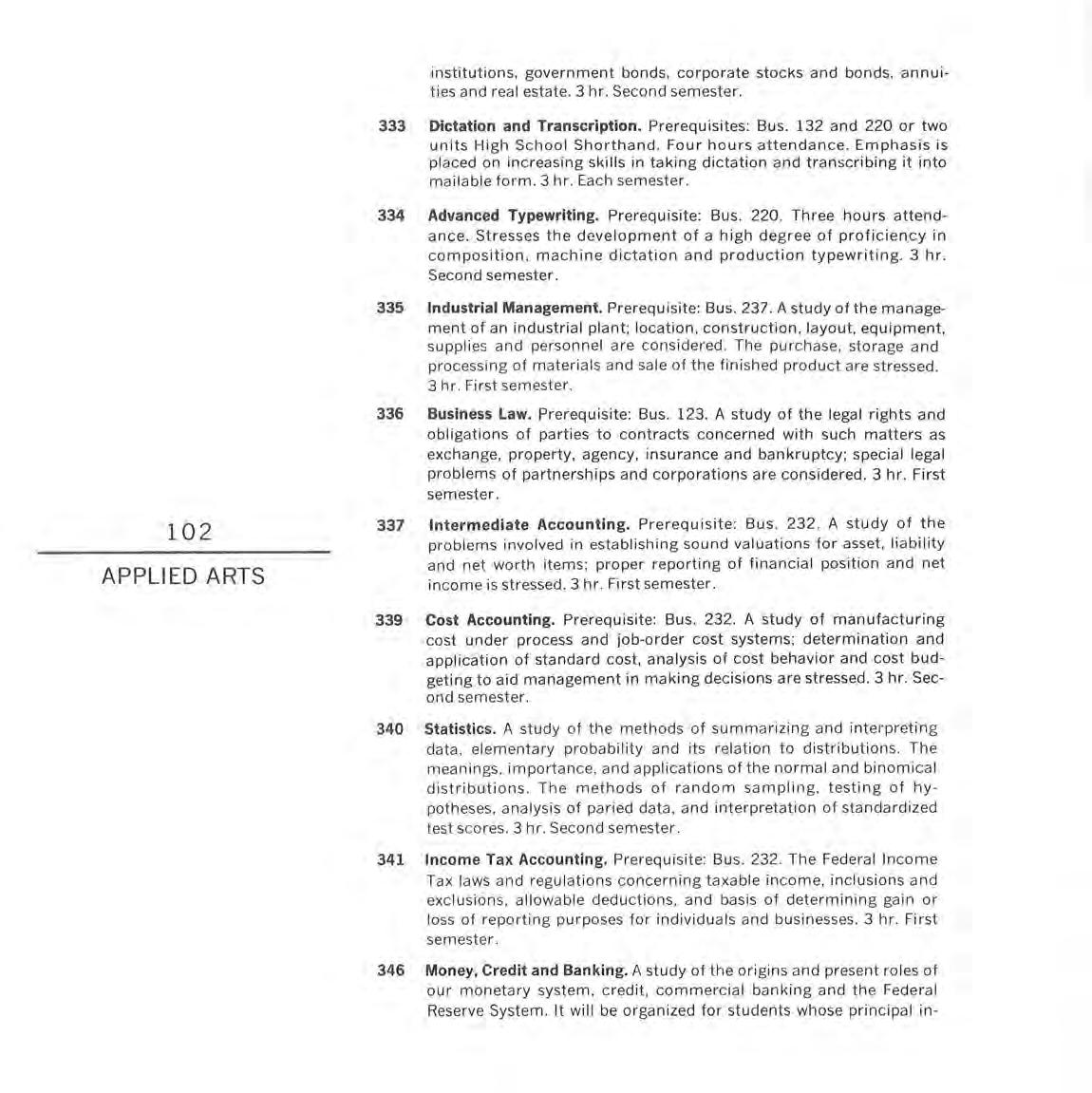
terest lies outside of going into bank mana geme nt . 3 hr . Fir st semes ter.
400 Special Problems in Computer Programming. Pr ereq ui site : Business 203 or Math 203 o r Business 204 or Math 204. Supervised projects in advance d compute r programming. 1-4 hrs. On demand.
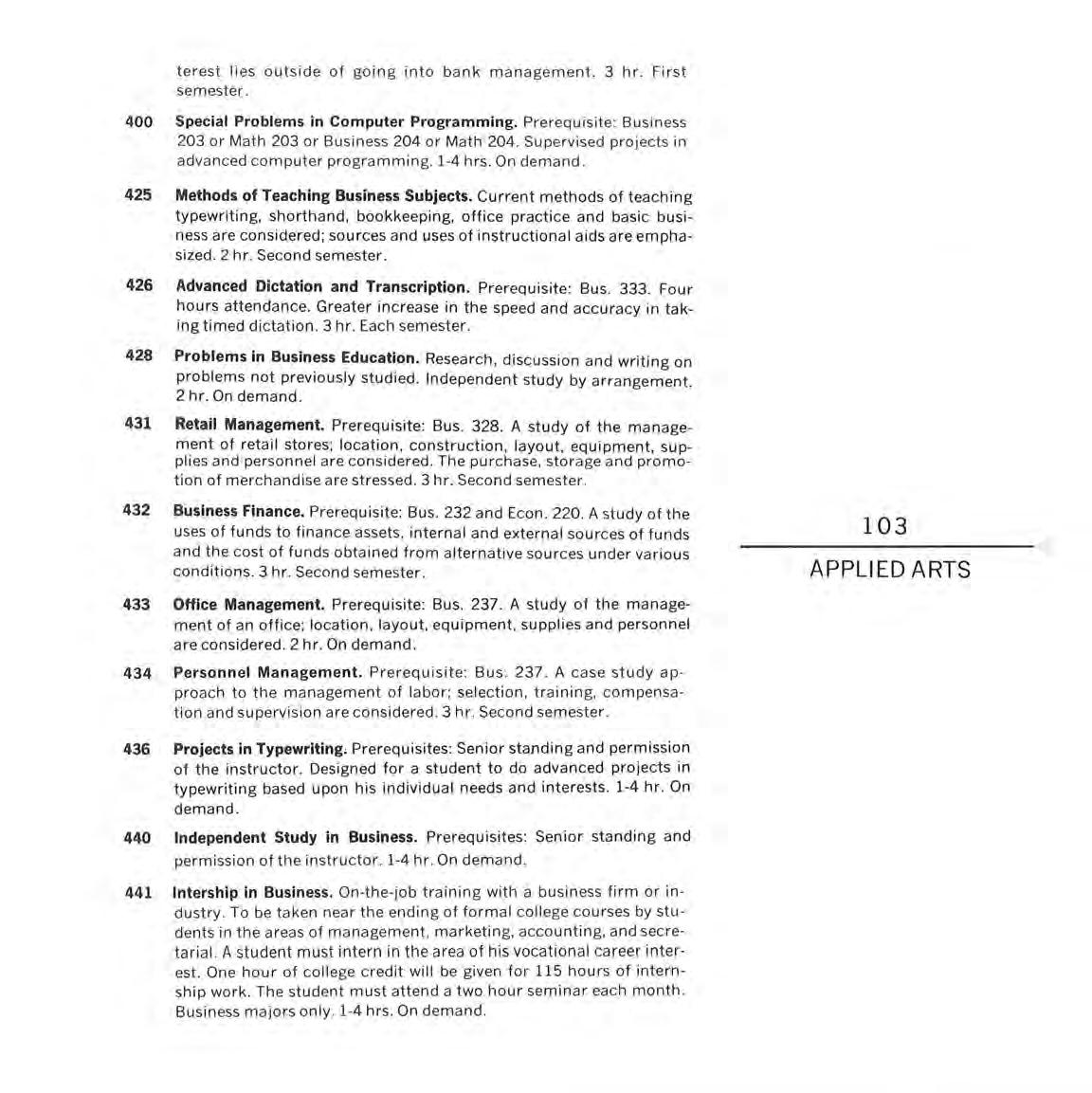
425 Methods of Teaching Business Subjects. Current methods of teaching typewriting , shorthand, bookkeeping, office practice and basic business are considered; sources and uses of instructional a ids are emphasized . 2 hr. Second semester.
426 Advanced Dictation and Transcription. Prerequisite: Bus 333. Four hours attendance. Greater increase in the speed and accuracy in taking timed dictation 3 hr. Eac h se me ster
428 Problems in Business Education. Research , discussion and writing on problems not previously studied. Ind ependent study by a r ra n ge ment. 2 hr. On demand.
431 Retail Management. Prerequisite: Bus 328. A study of the management of retail stores; lo ca tion, construction, l ayout, equipment, supplies and personnel a r e co nsid ere d. The purchase, storage a nd promotion of merchandi se are stressed. 3 hr. Second semester.
432 Business Finance. Prerequisite: Bus . 232 and Econ . 220 . A study of the uses of funds to fin a nce asse t s, internal and externa l sources of funds a nd the cost of fund s obtained from a lt ernative sources under various co nditions. 3 hr. Second se me ster.
433 Office Management. Prerequisite : Bus. 237 A study of the management of an office; l ocation, layout, equipment, supplies and personnel are considered. 2 hr. On demand
434 Personnel Management. Pr e requisite : Bus. 237. A case study approach to the m a n age m e nt of l a bor; se l ection, training, co mp en sation and s upervi sion a r e co n s ider ed. 3 hr. Second se me ste r.
436 Projects in Typewriting, Prerequisites: Senior standing and permission of the in structor. Designed for a student to do advanced projects in typewriting based upon his individual needs and interests . 1-4 hr . On demand .
440 Independent Study in Business. Prerequisites: Senior standing and permission of th e in st ru cto r . 1-4 hr . On demand.
441 lntership in Business. On-the-job training with a business fi r m or industry To be taken near the e ndin g o f formal co ll ege courses by stud e nt s in th e areas o f m a n age m ent, marketin g, acco untin g, a nd secretari a l. A student must intern in th e area of his vocational ca re e r interest. One hour of co ll ege c redit will be given for 115 hours of int e rnship work - The student must attend a two hour seminar eac h month. Business major s on l y. 1-4 hr s. On demand.
445G Conference Leading . A course enabling one to lead a conference in business and industry. Students will le a rn to make a conference plan, analyze conference problems, draw information from the group, and bring the conference to a conclusion by formulating recommendations for a plan of action. 3 hr. On demand.
470 Auditing Principles. Prerequisites : Bus. 337 and 339 or by permission. Generally accepted auditing standards and procedures with philosophy supporting them; auditing techniques available to the independent public accountant. 3 hr. Second semester.
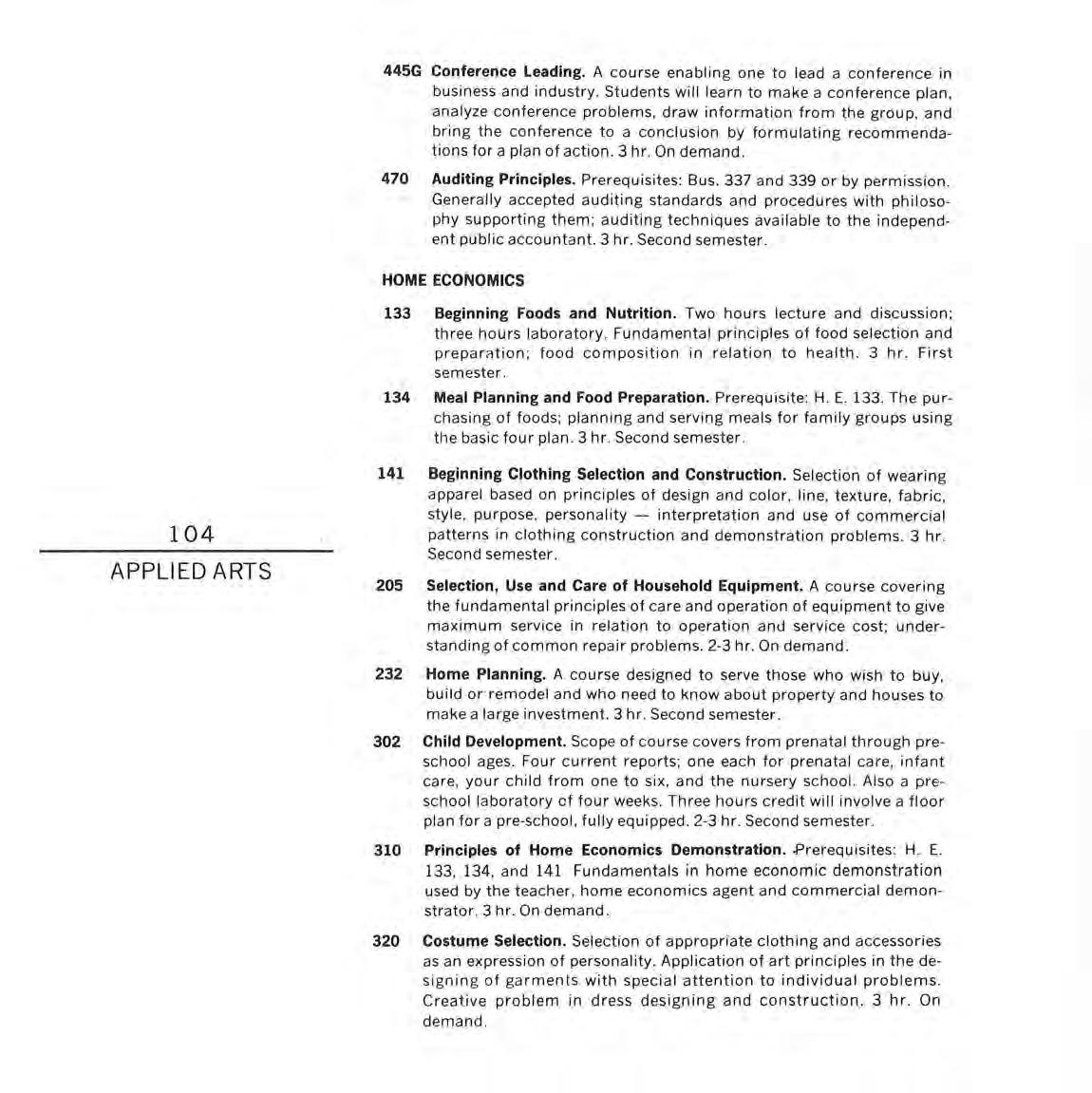
133 Beginning Foods and Nutrition. Two hours lecture and discussion; three hours laboratory. Fundamental principles of food selection and prepar21tion; food composition in relation to health. 3 hr . First semester.
134 Meal Planning and Food Preparation. Prerequisite: H. E. 133. The purchasing of foods ; planning and serving meals for family groups using the basic four plan 3 hr. Second semester.
141 Beginning Clothing Selection and Construction. Selection of wearing apparel based on principles of design a nd color, line , texture, fabric, style, purpose, personality - interpretation and use of commercial patterns in clothing construction and demonstration problems. 3 hr. Second semester.
205 Selection, Use and Care of Household Equipment. A course covering the fundamental principles of care and operation of equipment to give maximum service in relation to operation and service cost; understanding of common repair problems. 2-3 hr. On demand.
232 Home Planning. A course designed to serve those who wish to buy, build or remodel and who need to know about property and houses to make a large investment. 3 hr. Second semester.
302 Child Development. Scope of course covers from prenatal through preschool ages. Four current reports; one each for prenatal care, infant care, your child from one to six, and the nursery school. Also a pr eschool laboratory of four weeks. Three hours credit will involve a floor plan for a pre-school, fully equipped. 2-3 hr. Second semester.
310 Principles of Home Economics Demonstration . .Prerequisites : H . E. 133 , 134, and 141. Fundamentals in home economic demonstration used by the teacher, home economics agent and commercial demonstrator. 3 hr. On demand.
320 Costume Selection. Selection of appropriate clothing and accessories as an expression of personality. Applica t ion of art principles in the design in g of garments with special attention to individual problems. Creative problem in dress designing and construction. 3 hr. On demand.
321 Personal and Family Relationships. A study of the relationships between the individual and the family, the art of living harmoniously with others and the responsibility of each member of the family in the development of satisfactory relationships in marriage and family living. 3 hr. First semester.
322 Home Furnishing. A study of today's housing problems and factors to be considered in building buying or renting a house; the selection and arrangement of furnishing from the standpoint of comfort beauty and economy. 3 hr. First semester .
323 Costume History. Aspects of culture of various countries and periods of history as reflected in costume. 3 hr. On demand.
325 Costume Design - Flat Pattern. Prerequisite: H. E. 334. Some basic problems are presented in flat pattern making. A personal master pattern is developed for each student. Creative problems are planned to develop skill in the application of art principles to costume. 3 hr. On demand.
332 Nutrition and Dietetics. Fundamental principles of human nutrition and its development through research as related to the dietary needs of individuals according to their age sex and/or occupation. 3 hr. Second semester.
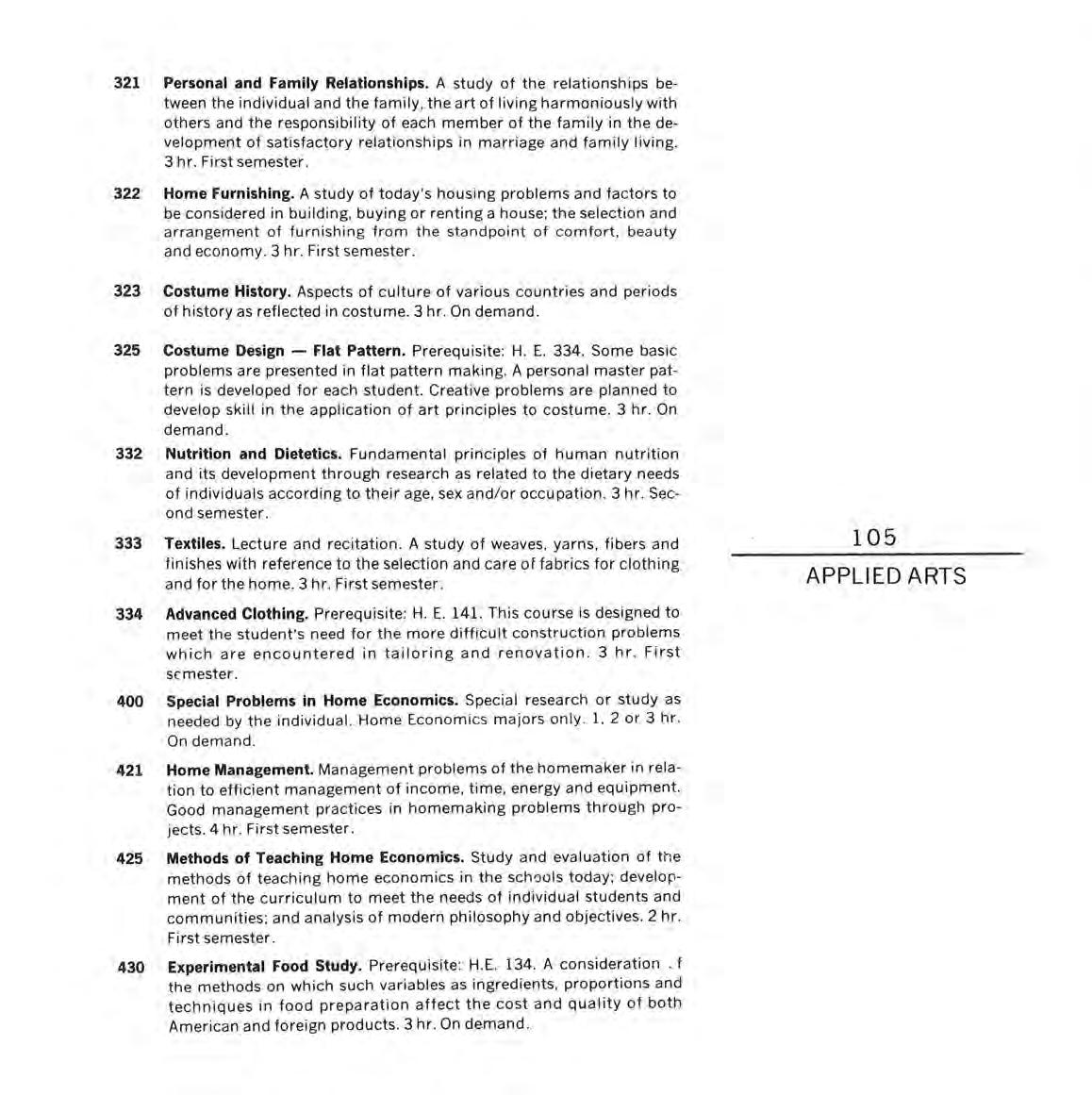
333 Textiles. Lecture and recitation. A study of weaves. yarns. fibers and finishes with reference to the selection and care of fabrics for clothing and for the home 3 hr. First semester.
334 Advanced Clothing. Prerequisite: H . E. 141. This course is designed to meet the student ' s need for the more difficult construction problems which are encountered in tailoring and renovation. 3 hr. First semester.
400 Special Problems in Home Economics. Special research or study as needed by the individual. Home Economics majors only . 1. 2 or 3 hr. On demand.
421 Home Management. Management problems of the homemaker in relation to efficient management of income, time. energy and equipment. Good management practices in homemaking problems through projects. 4 hr. First semester.
425 Methods of Teaching Home Economics. Study and evaluation of tr:e methods of teaching home economics in the sch0ols today; development of the curriculum to meet the needs of individual students and communities; and analysis of modern philosophy and objectives. 2 hr. First semester .
430 Experimental Food Study. Prerequisite: H.E. 134 A consideration - f the methods on which such variables as ingredients, proportions and techniques in food preparation affect the cost and quality of both American and foreign products. 3 hr. On demand.
121 Technical Drawing I. A course concerned with the fundamentals of grap hic language . The course includes proper use and care of instruments, geometric co nstruction, lettering , sketch ing and shape description, multi-view proje ction, sectional views an d a u x ili ary views. 3 hr. First semester.
123 Woodworking Technology I. The development of basic skills in the use of both hand tools a nd woodworking machines. 3 hr. First semester.
124 Woodworking Technology II. Pr ereq ui s it e: I.A. 123. Technique s and procedures in wood finishing using both traditional a nd new types of materials. Also the st udy of woodworking technology and wood identification. 3 hr . Second semester.
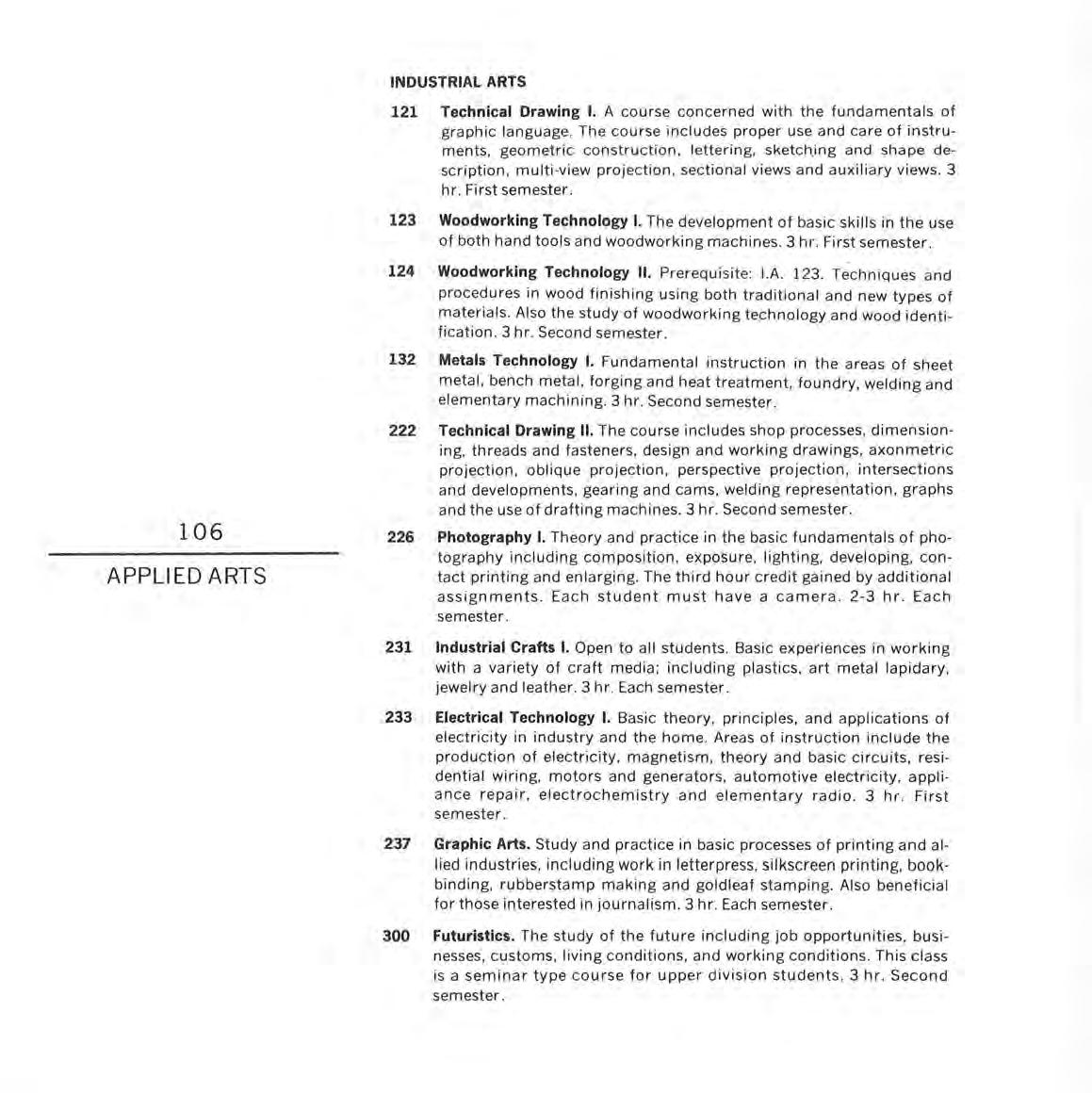
132 Metals Technology I. Fundamental instruction in the areas of sheet metal, bench met a l, forgin g and h ea t treatment, foundry, welding and elementary machining. 3 hr . Second semester.
222 Technical Drawing II. The course includes shop processes, dimensioning, threads and fasteners, design a nd working drawings, axon metric projection, oblique projection, persp ec tive projection, intersections and developments , gearing and cams, welding representation, graphs a nd the use of drafting machines. 3 hr. Second semester.
226 Photography I. Theory and practice in the basic fundamentals of photography including composition, exposure, lighting , developing, contact printin g and enlarging. The third hour credit gained by additional assignments. Ea c h student mu s t have a camera. 2-3 hr. Each semester.
231 Industrial Crafts I. Open to all students. Basic experiences in working with a variety of craft media; including plastics, art metal lapidary, jewelry and leather. 3 hr. Each semester.
233 Electrical Technology I. Basic theory, principles , and applications of electricity in industry and the home Areas of instruction include the production of electricity , magnetism, theory and basic circuits, residential wiring, motors and generators, automotive electricity, appliance repair , electrochemistry and elementary radio. 3 hr. First semester.
237 Graphic Arts. Study and practice in ba s ic processes of printing and allied industries , including work in letterpress, silkscreen printing , bookbinding, rubberstamp m ak in g and goldleaf stamping. Also beneficial for those interested in journalism. 3 hr . Each semester .
300 Futuristics. The study of the future including job opportunities, businesses, customs, living conditions, and working conditions. This class is a seminar type co urse for upper division students. 3 hr Second semester.
303 Craft Work with Inexpensive Materials. The course is designed to develop skills and knowledge in elementary craft work using inexpensive materials and minimum hand tools. Recommended for elementary school teachers, recreation majors and people desiring an inexpensive hobby. 1-3 hr. On demand.
321 Shop Maintenance. Instruction in the use and care of equipment commonly found in the industrial arts laboratory, and shop planning as it relates to the proper functioning of industrial arts facilities. Practice will be given in the conditioning and repair of hand and power tools and equipment. 2 hr. First semester.
322 Hand Crafts-. A course designed to develop skil ls and knowledges in working with ceramics, metals, plastics, wood, and other craft materials. Instruction will include specifying and purchasing craft supplies, and methods of incorporating these activities into school and community programs. 3 hr. Second semester.
323 Metals Technology II. A second course in metalwork with emphasis on foundry and machine technology, and a study of metallurgy as it relates to the foundry, machine shop, and heat treating processes. 3 hr . First semester.
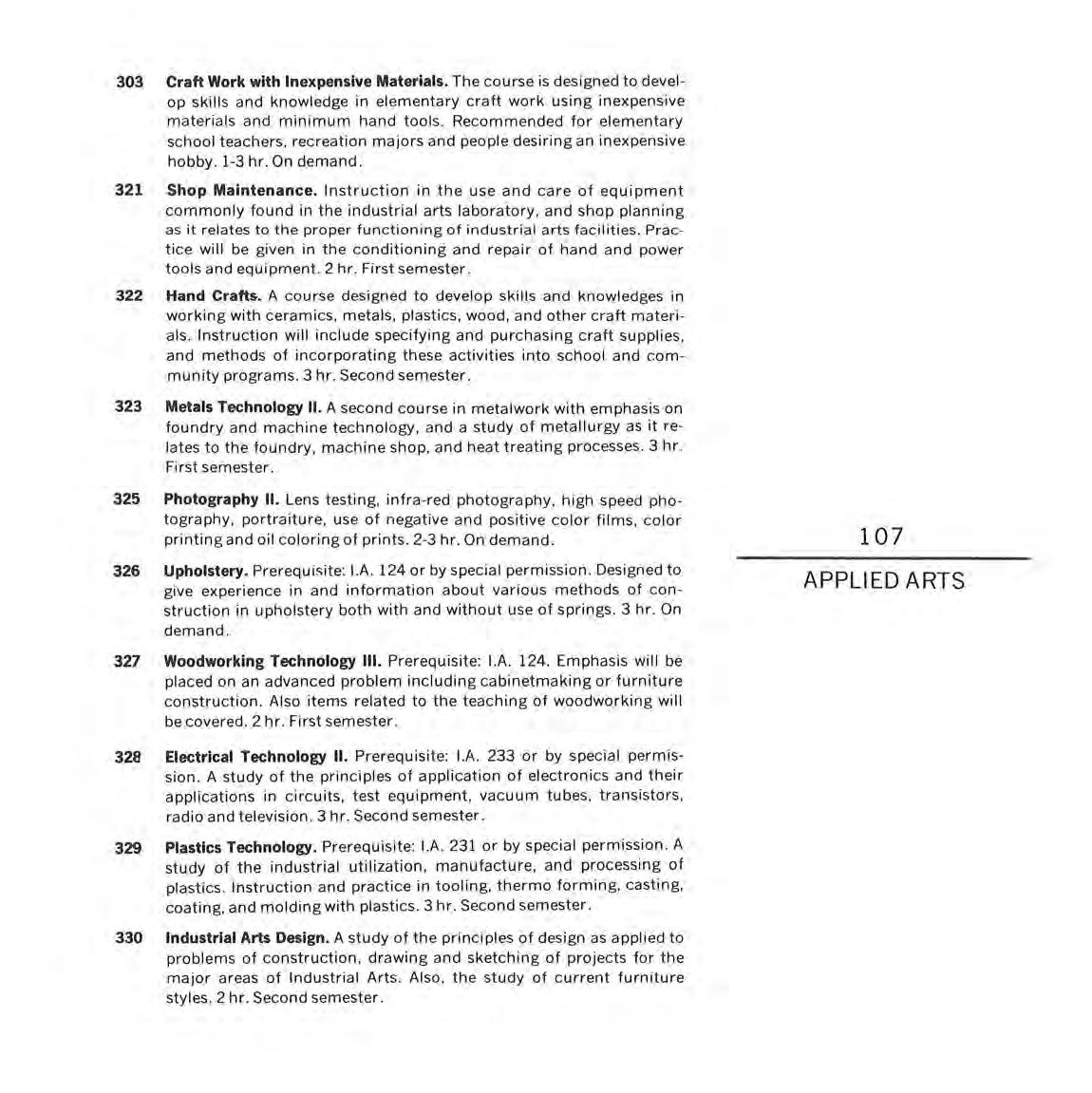
325 Photography II. Lens testing, infra-red photography, high speed photography , portraiture, use of negative and positive color films, color printing and oil coloring of prints. 2-3 hr. On demand.
326 Upholstery. Prerequisite : I.A. 124 or by special permission . Designed to give experience in and information about various methods of construction in upholstery both with and without use of springs. 3 hr. On demand .
327 Woodworking Technology Ill. Prerequisite: I.A. 124. Emphasis will be placed on an advanced problem including cabinetmaking or furniture construction. Also items related to the teaching of woodworking will be covered. 2 hr . First semester.
328 Electrical Technology II. Prerequisite: I.A. 233 or by special permission. A study of the principles of application of electronics and their applications in circuits, test equipment, vacuum tubes, transistors, radio and television. 3 hr. Second semester.
329 Plastics Technology. Prerequisite: I.A. 231 or by special permission. A study of the industrial utilization, manufacture, and processing of plastics. Instruction and practice in tooling , thermo forming, casting, coating, and molding with plastics. 3 hr. Second semester.
330 Industrial Arts Design. A study of the principles of design as applied to problems of construction, drawing and sketching of projects for the major areas of Industrial Arts. Also, the study of current furniture styles. 2 hr. Second semester.
331 Welding. Prerequisite: I.A. 132 or by specia l permission. Instruction and practice in the use of el ectric welding machines and the oxy-acetylene torch in we ldin g and cutt in g 3 hr. First semester.
332 Power Mechanics I. The study of the sources of power and of the machines used in its development with emphasis upon the internal combustion engine. 3 hr. Second semester.
335 Survival Preparedness. A study of facts related to surviva l in time of l ocal. state or national disaster. 1 hr.
337 Driver Education and Traffic Safety I. Prerequisite: Twenty thousand miles or two years driving experience free of repeated chargeable accidents and moving violations. This course wi ll include presentation of materials and methods of traffic safety and driver training with emphasis upon attitude, development. organization and administration, driving regulations and safe motor car operation. 3 hr. First semester.
338 General Safety. This course is designed to familiarize the student with problems of accident prevention and conservation of human lif e and limb. Emphasis wi ll be placed in the following areas: occupational. transportation, farm and the home and school. In structional materials will be deve l oped and stud ied. 3 hr. Second semester.
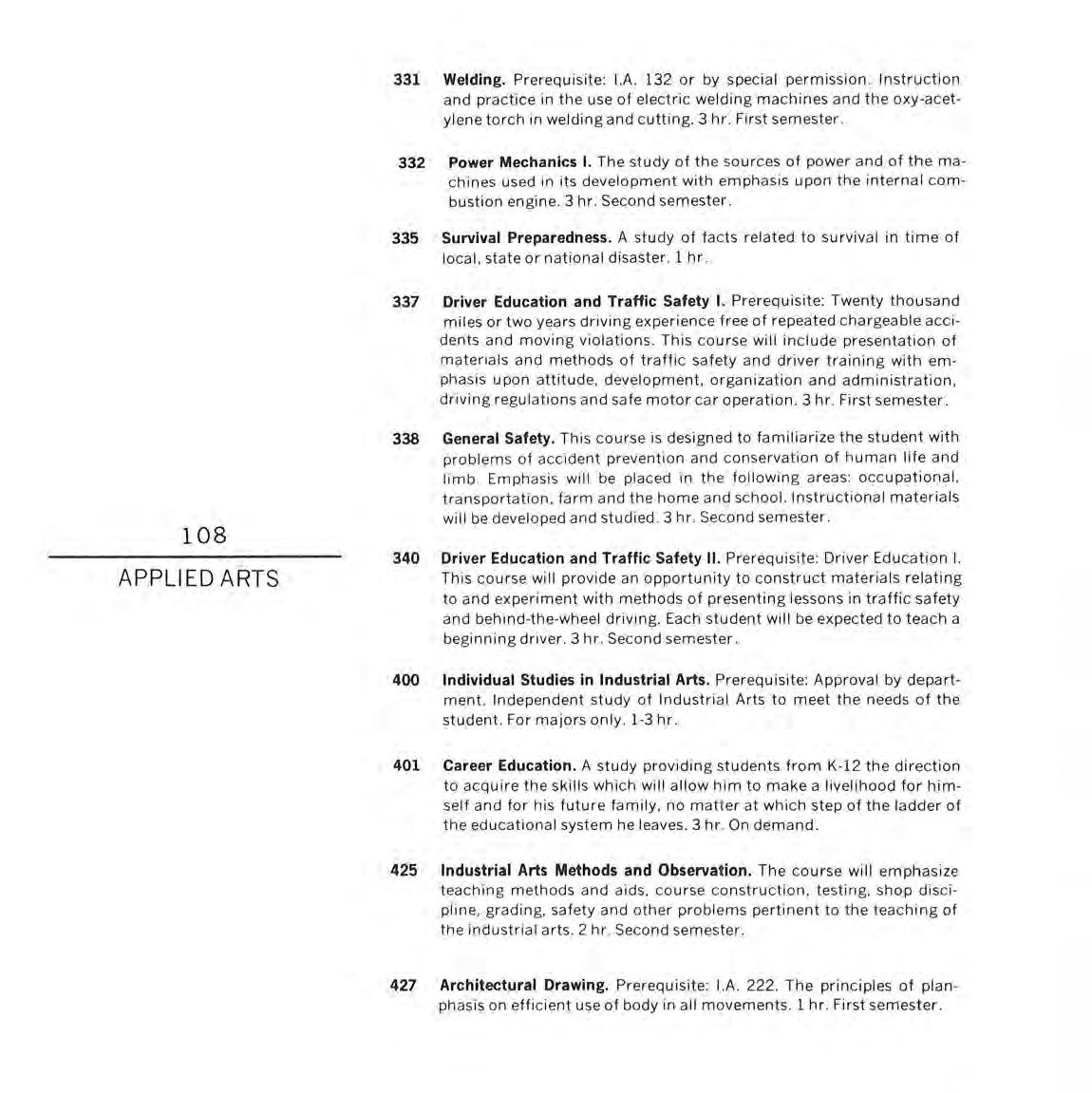
340 Driver Education and Traffic Safety II. Prerequisite: Driver Education I. This course will provide an opportunity to construct materials relating to and experiment with methods of presenting iessons in traffic safety and behind-the-wheel driving. Each student wi ll be expected to teach a beginning driver. 3 hr. Second semester.
400 Individual Studies in Industrial Arts. Prerequisite: Approval by department. Ind ependent study of Indu stria l Arts to meet the needs of the student. For majors only. 1-3 hr.
401 Career Education. A study providing students from K-12 the direction to acquire the ski ll s which wi ll al lo w him to make a li velihood for himself and for his future family, no matter at which step of the ladder of the educational system he l eaves. 3 hr. On demand.
425 Industrial Arts Methods and Observa t ion. The course will emphasize teaching methods and a id s, course construction, te sting. shop discipline , grading, safety and other problems pertinent to the teaching of the industrial arts. 2 hr. Second semester.
427 Architectural Drawing. Prerequisite: I.A. 222 The principles of planphasis on efficient use of body in al l movements. 1 hr. First semester.
ning a dwelling to fit modern needs. Drawings will include a plot plan , floor plan , four elevations, sections and details. Specifications will be determined by the student for the dwelling. 3 hr. First semester.
428G The World of Construction A study of the Industrial Arts Curriculum, Project World of Construction. The course is designed to develop an understanding of the goals and techniques of IACP instruction. Methods of conducting learning activities through role playing , group activities , and simulation games will be emphasized as they relate to the problems involved in construction on a site. 3 hr. On demand.
429G The World of Manufacture. A study of the Industrial Arts Curriculum, Project World of Manufacturing. The course is designed to develop an understanding of the goals and techniques of IACP instruction. Methods of conducting learning activities through role playing, group activities , and simulation games will be emphasized as they relate to the problems involved in manufacturing products in a plant. 3 hr. On demand.
441G History and Philosophy of Vocational Education. Origins and philosophy of vocational education and the relationship to the school curriculum. Required for vocational certification and recommended as an elective for school administrators. 3 hr.
442G Organization and Administration of Vocational Education . A study of the principles and policies governing the administration of vocational educational programs in high schools , technical schools, junior colleges and adult education programs. 3 hr .
443G Coordination Techniques in Vocational Education Programs. Analysis of Vocational Cooperative Programs and their relationship to the high school, junior college , and adult vocational programs. Emphasis on the organization and supervision of cooperative programs, duties and responsibilities of the coordinator, selection and placement of students, and evaluation of students, training stations and the cooperative program. 3 hr.
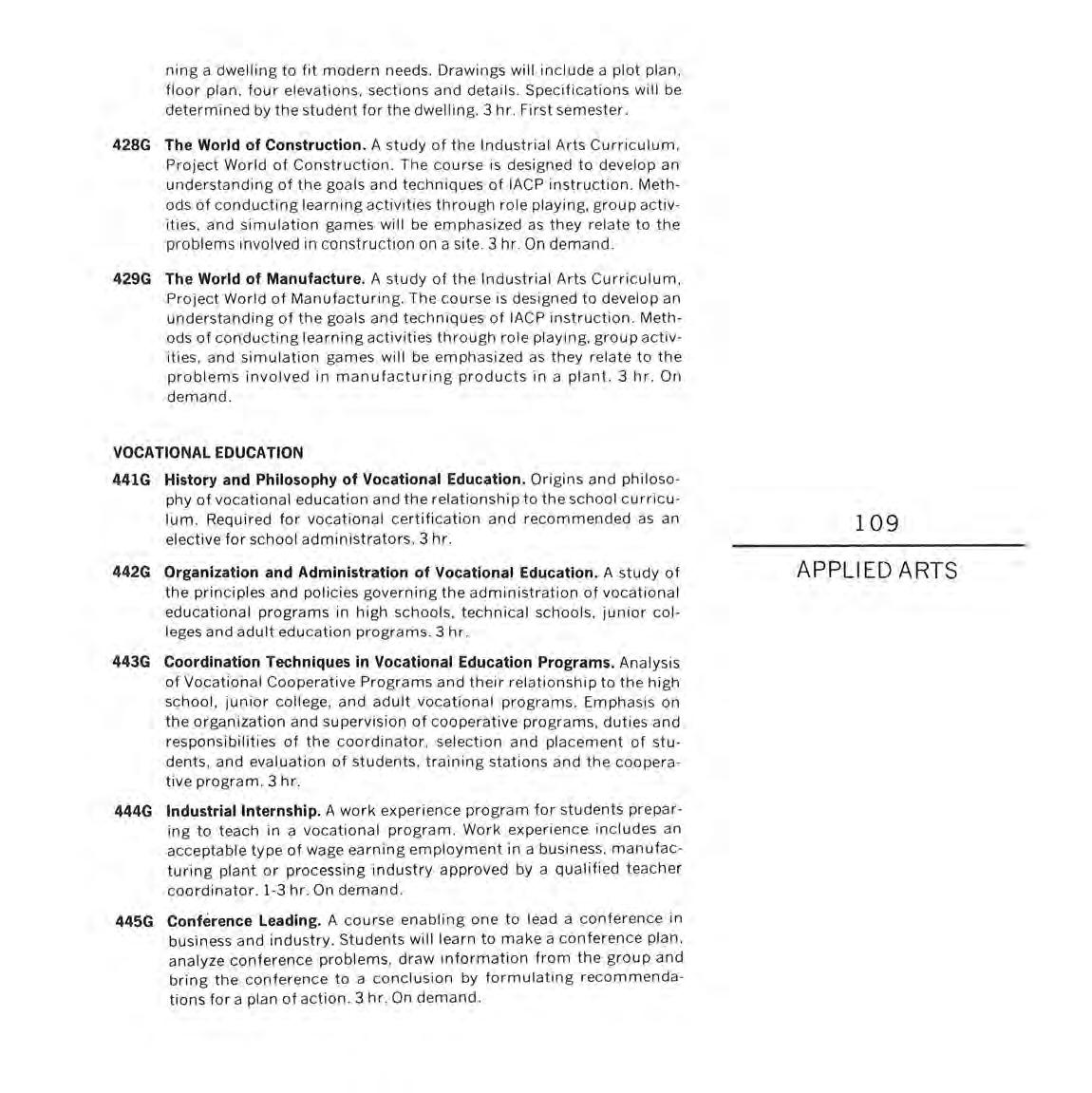
444G Industrial Internship. A work experience program for students preparing to teach in a vocational program. Work experience includes an acceptable type of wage earning employment in a business. manufacturing plant or processing industry approved by a qualified teacher coordinator. 1-3 hr. On demand.
445G Conference Leading. A course enabling one to lead a conference in business and industry. Students will learn to make a conference plan. analyze conference problems. draw information from the group and bring the conference to a conclusion by formulating recommendations for a plan of action. 3 hr. On demand.
300 Foundation of Education. Prerequisites: Psych. 12 1 and 20 1. Th e historical a nd philosophical background and development of educational thought and practice in Amer ican public education. 3 hr. Each semester a nd summer.
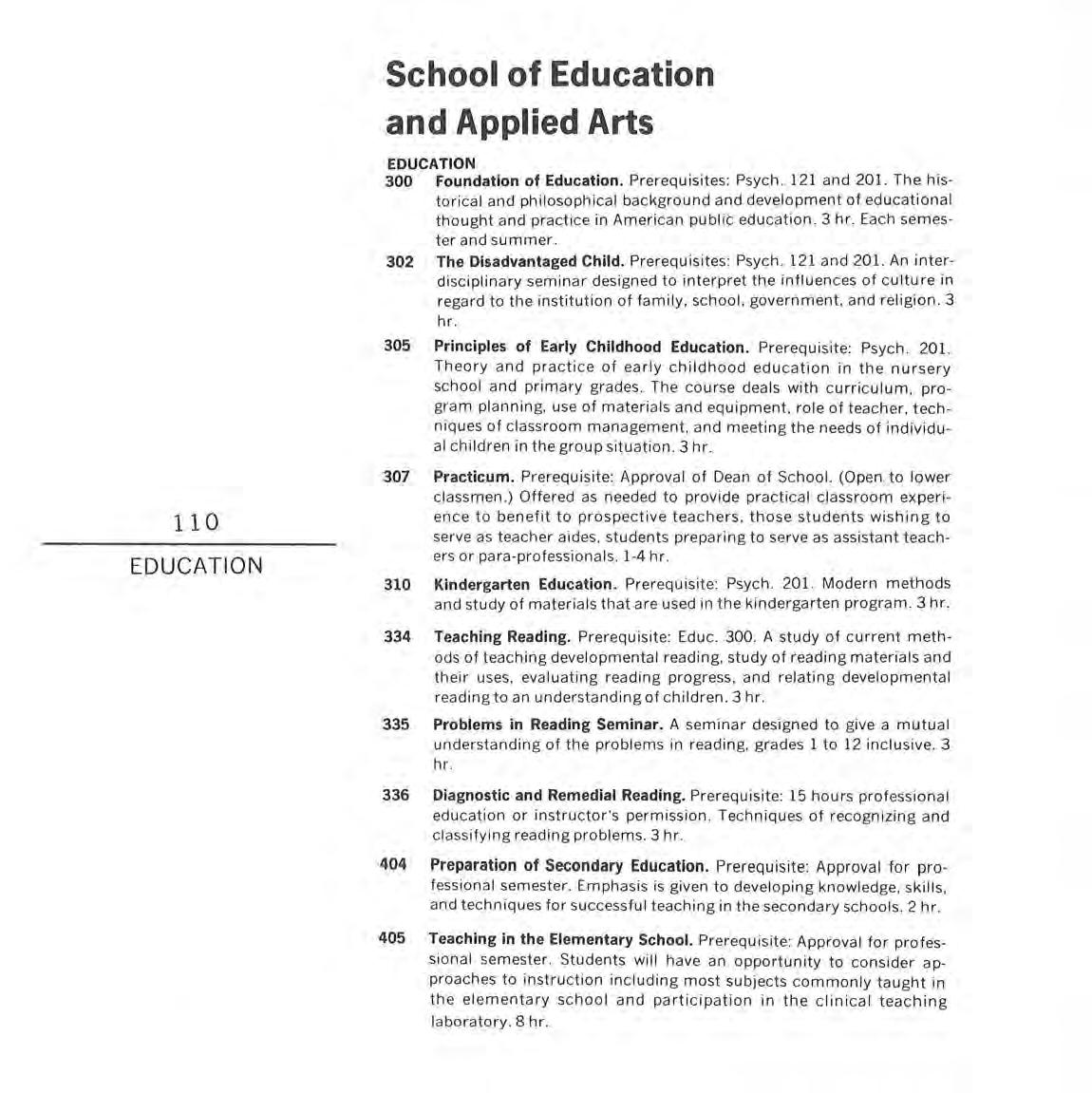
302 The Disadvantaged Child. Prerequisites: Psych. 121 and 201. An interdisciplinary sem in ar designed to int erpret the influ ences of cu lture in regard to the in stitution of family, schoo l, government, and religion. 3 hr.
305 Principles of Early Childhood Education. Prerequisite: Psych. 201. Theory and practice of early chi ldh ood education in the nursery school and primary grades. The course deals w ith curr icu lum , program planning, use of materials and equ ipm ent. role of teacher, techniques of c l assroom management. and meeting the needs of indi v idua l children in the group s itu at i on. 3 hr.
307 Practicum. Prerequisite: Approva l of Dean of Schoo l. (Open to l ower classmen.) Offered as needed to provide practical c l assroom experience to benefit to prospective teachers, those students wishing to serve as teacher aides, students preparing to serve as assistant teachers or para-professiona l s. 1-4 hr.
310 Kindergarten Education. Prerequisite: Psych. 201. Modern methods and study of materials that are used in t h e kindergarten program. 3 hr.
334 Teaching Reading. Prerequisite: Educ. 300. A study of current methods of teaching developmental reading, study of reading materials and their uses , eva lu at in g reading progress, and relating developmental reading to an understanding of ch ildr en. 3 hr.
335 Problems in Reading Seminar. A sem in a r designed to g i ve a mutual understanding of the problems in reading, grades 1 to 12 in c lu sive. 3 hr.
336 Diagnostic and Remedial Reading. Prerequ i site: 15 hours professional education or in structor's permission. Techniques of recognizing and c l ass if y in g reading problems. 3 hr.
404 Preparation of Secondary Education. Prerequisite: Approva l for professional semester. Emphasis is given to developing knowledge, sk ill s, and techniques for successfu l teaching in the secondary schoo l s. 2 hr
405 Teaching in the Elementary School. Prerequisite: Approval for profess i onal semester. Students w ill have an opport unit y to consider approaches to instruction including most s ubj ects common l y taught in the e l ementary school and participation in the c lini cal teaching l aboratory. 8 hr.
406 Clinical Teaching Laboratory. Prerequisite: Approval for professional semester. Testing of educational theory and techniques under caref ully controlled conditions. Students have an oppo rtunit y to develop and refine teach in g sk ill s, through the use of sim ul at ion , mi c roteaching and video-taping, teacher se lf -appra i sa l models , technic a l ski ll s of teaching l aboratory, and preparation of in str uctiona l materials. 2 hr.
408 Instructional Media. Dem onstration and l aboratory practice with lnstuct iona l Media used in t h e c l ass r oom and school system, including motion pi c tur e, film str ip , s lid e and opaque projectors; a l so tape recorders , record players, c l osed circ uit television and video tape recorder. 2 hr Each semester and summer.
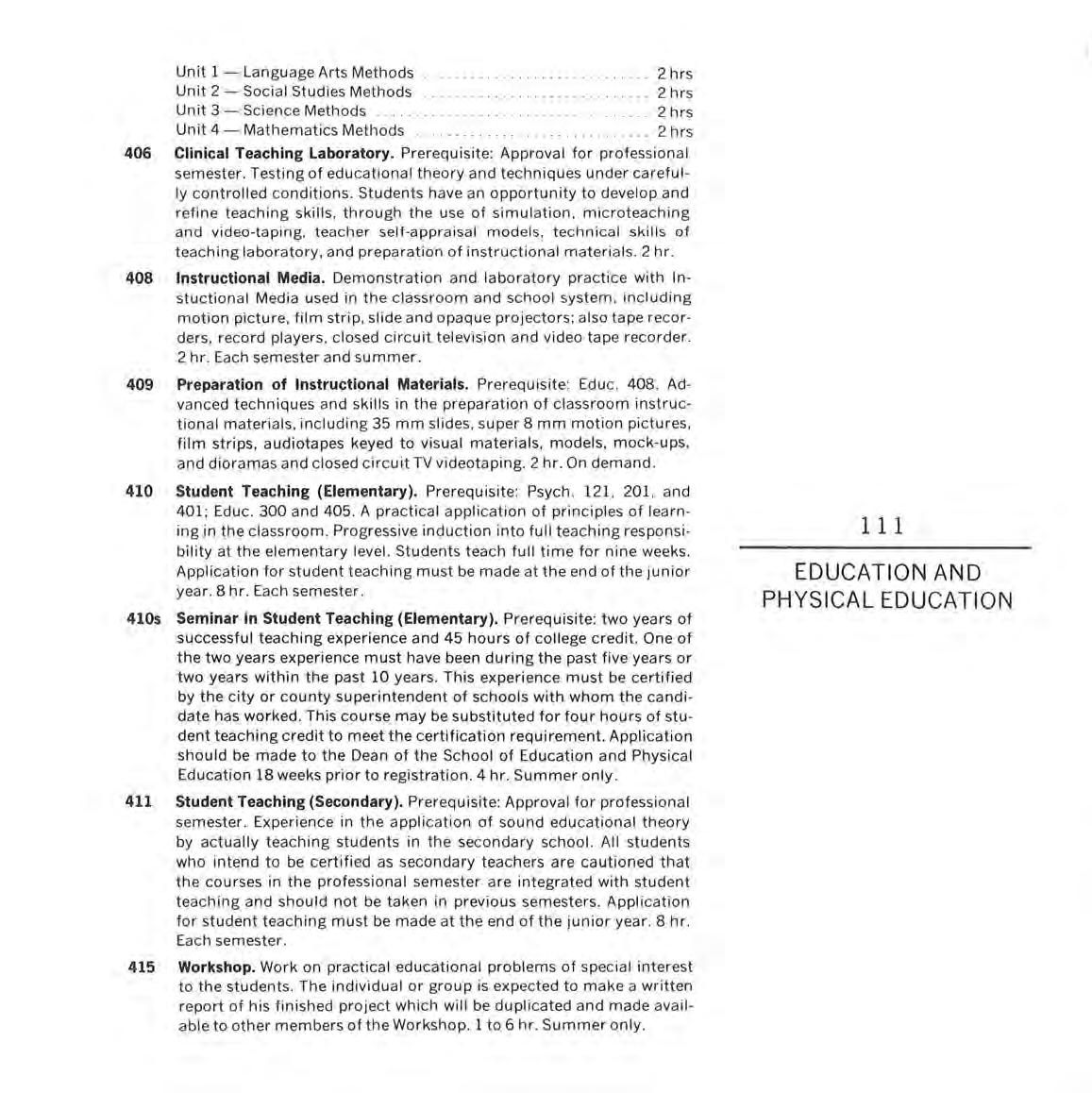
409 Preparation of Instructional Materials. Prerequisite: Edu c. 408. Advanced te ch niqu es a nd sk ills in the preparation of c lass ro om in st ru ctional materials, in cluding 35 mm slid es, s up er 8 mm motion pictures , film strips, audiotapes keyed to visual materials, models, mock-ups, and dioramas and closed circuit TV v i deotap in g. 2 hr . On demand .
410 Student Teaching (El ementary ). Prerequisite: Psych. 121, 201. and 401; Educ. 300 and 405. A practical app li cat i on of principles of l earnin g in the classroom. Progressive induction into full te aching responsibility at the e l emen t ary level. Students teach full time for nine weeks. Application for stude nt teaching must be made at the end of the juni or year. 8 hr . Each semester .
410s Seminar in Student Teaching (Elementary). Pr erequisite: two years of successful te ac hing experience and 45 hours of co llege credit. One of the two years experience must h a ve been during the past fiv e years or two years within the past 10 years. This experience must be certified by the c ity or co unty superintendent of schools with whom the candid ate has worked This course may be substituted for four hours of student teachin g c redit to meet the ce rtifi cat ion requirement. Application should be made to the Dean of the School of Education and Physical Education 18 weeks prior to registration. 4 hr. Summer only.
411 Student Teaching (S econdary ). Prerequisite : Approval for professiona l semester. Experience in the app li cation of sound ed u cat ion a l theory by actua lly teaching st u dents in the seconda r y sc h oo l. All stud ents who intend to be certified as secondary teachers are ca uti oned that the cou r ses in the professional se m este r are integrated w ith student teaching and sho uld no t be taken in previous semesters. Application for st ud ent te ac hing must be made at the end of the junior year. 8 hr. Eac h semester.
415 Workshop. Work on pr act ica l ed u cationa l problems of spec ia l int erest to the students Th e individual or group i s expected to make a written report of hi s finished project w hi ch wil l be d upl icated and made avai lable to other members of the Workshop. 1 to 6 hr. Summer o nl y.
423 Methods and Materials in the Education of Exceptional Children. Prerequisite: Psych 320 and Psych 331. A study of the eva lu at i on techniques, c h aracteristics, objectives, curricu la, specia I materials , faci Iities and techniques of instruction , along with the development of integrated experience units at the primary, intermediate, and pre-vocational le ve l s. 3 hr.
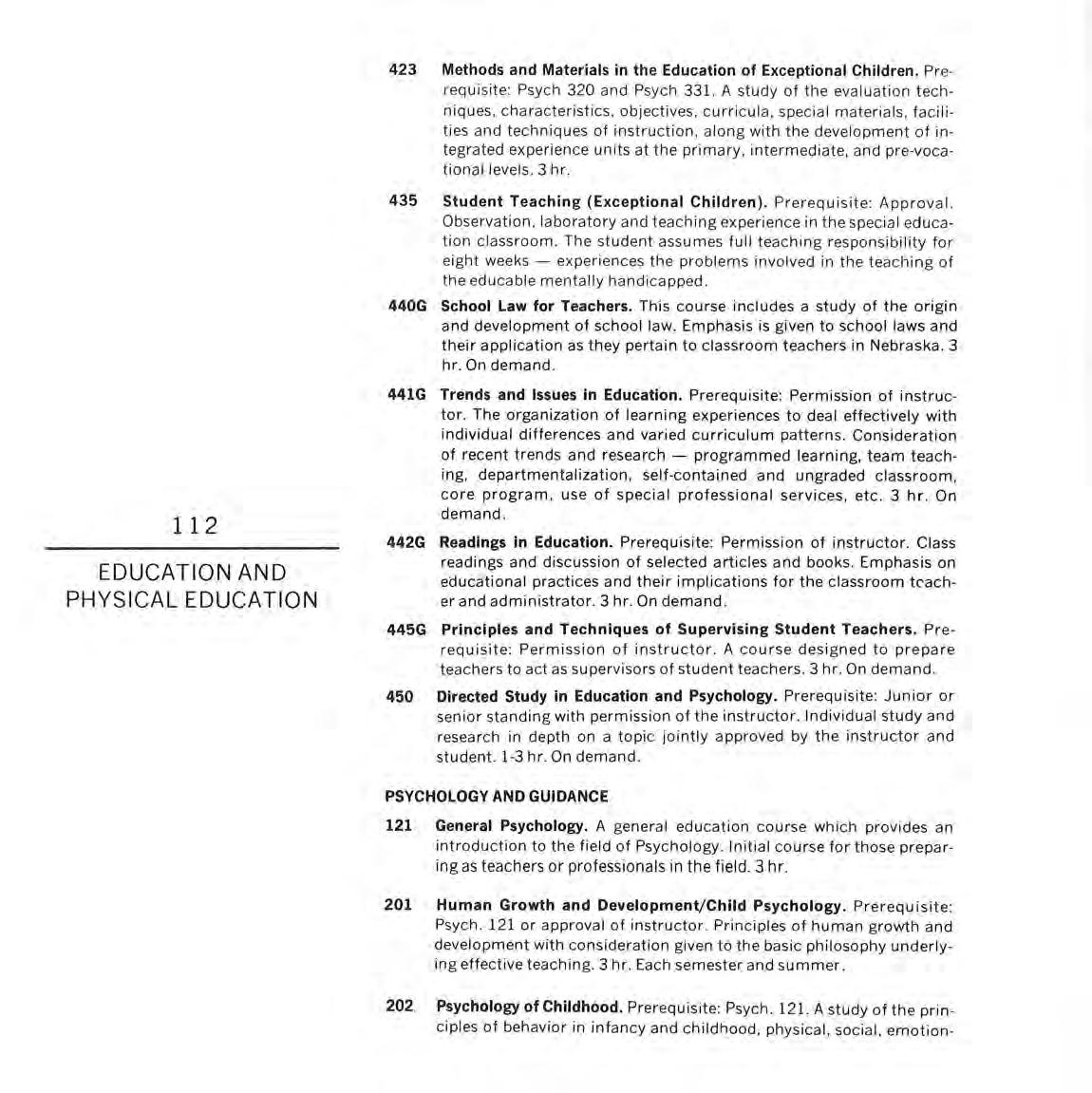
435 Student Teaching (Exceptional Children). Prerequisite: Approval. Observation, l aborato r y and teaching experience in the special education c l assroom. The student assumes fu 11 teaching responsi bi Iity for eight weeks - exper ience s the problems involved in the teaching of the educab l e mentally handicapped.
440G School Law for Teachers. This course includes a study of the origin and development of school law. Emphasis is given to school laws and their application as they pertain to classroom teachers in Nebraska. 3 hr. On demand.
441G Trends and Issues in Education. Prerequisite: Permission of instructor. The organization of learning experiences to deal effectively with individual differences and varied curriculum patterns. Consideration of recent trends and research - programmed learning, team teaching, departmentalization, self-contained and ungraded classroom, core program, use of special professional services, etc. 3 hr. On demand.
442G Readings in Education. Prerequisite: Permission of instructor. Class readings and discussion of selected articles and books. Emphasis on educational practices and their implications for the classroom teacher and administrator. 3 hr. On demand.
445G Principles and Techniques of Supervising Student Teachers. Prerequisite: Permission of instructor. A course designed to prepare teachers to act as supervisors of student teachers. 3 hr. On demand.
450 Directed Study in Education and Psychology. Pr erequis ite : Junior or senior stand in g with permission of the instru ctor. Individual study and research in depth on a topic jointly approved by the instru ctor and st udent. 1-3 hr. On demand.
121 General Psychology. A genera l education course which provides an introdu ction to the field of Psychology . Initi a l course for those preparing as teachers or professionals in the field. 3 hr
201 Human Growth and Development/Child Psychology. Prerequisite: Psych. 121 or approva l of instructor. Principles of human growth and development with considerat ion given to the basic philosophy underlying effective teaching. 3 hr. Each semester and summer.
202 . Psychology of Childhood. Prerequisite: Psych. 121. A study of the princip les of behavior in infancy and childhood, physical, social, emotion-
al, intellectual and personality development from childhood to preadolescence. 3 hr.
203 Psychology of Adolescence. Prerequisite: Psych. 121. The study of physical, social ; emotional, intellectual and personality development of adolescents and discussion of problems peculiar to adolescence. 3 hr.
301 Education Psychology. Prerequisites: Psych. 121 and 201. The principles of psychology applied to educational practice with emphasis on the construction and use of advance organizers. 3 hr. Each semester and summer.
305 Social Psychology. A study of psychological principles applied in social situations, including human interactions. social needs. values, cultural relativism and the effects of group conditions on judgements and attitudes. Analysis of process involved in the interaction between person and group, including dynamics of group influence on personal behavior and the impact of personal variables on the functioning of primary and secondary groups in the contemporary society. 3 hr.
320 Introduction to Mental Retardation. Prerequisite: Psych. 201. A study of the social, emotional, physical and mental characteristics of the mentally retarded child. 3 hr.
325 Applied Psychology. Prerequisite: Psych. 121. Facts and principles from the study of human behavior applied to business. industry. society, professional life and group processes. 3 hr.
331 Psychology of Exceptional Children. Prerequisites: Psych. 121 and 201. A survey course covering the types , characteristics. problems and needs of children who are in some way exceptional. 3 hr.
421 Introduction to Mental Hygiene. Prerequisites: Psych. 121 and 201. Home, school and community factors in the adjustment of individuals. 3 hr.
430 Educational Measurements. Prerequisites: Psych. 121 and 201. The writing of objectives in behavioral terms, the construction of tests based on Bloom's taxonomy and the interpretation of test scores are discussed in this course. 2 hr. Each semester.
432 Principles and Practices of Guidance. Prerequisites: Psych. 121 and 201. A general overview of the total guidance program Principles and techniques are employed in establishing and maintaining an effective guidance program are emphasized. 3 hr.
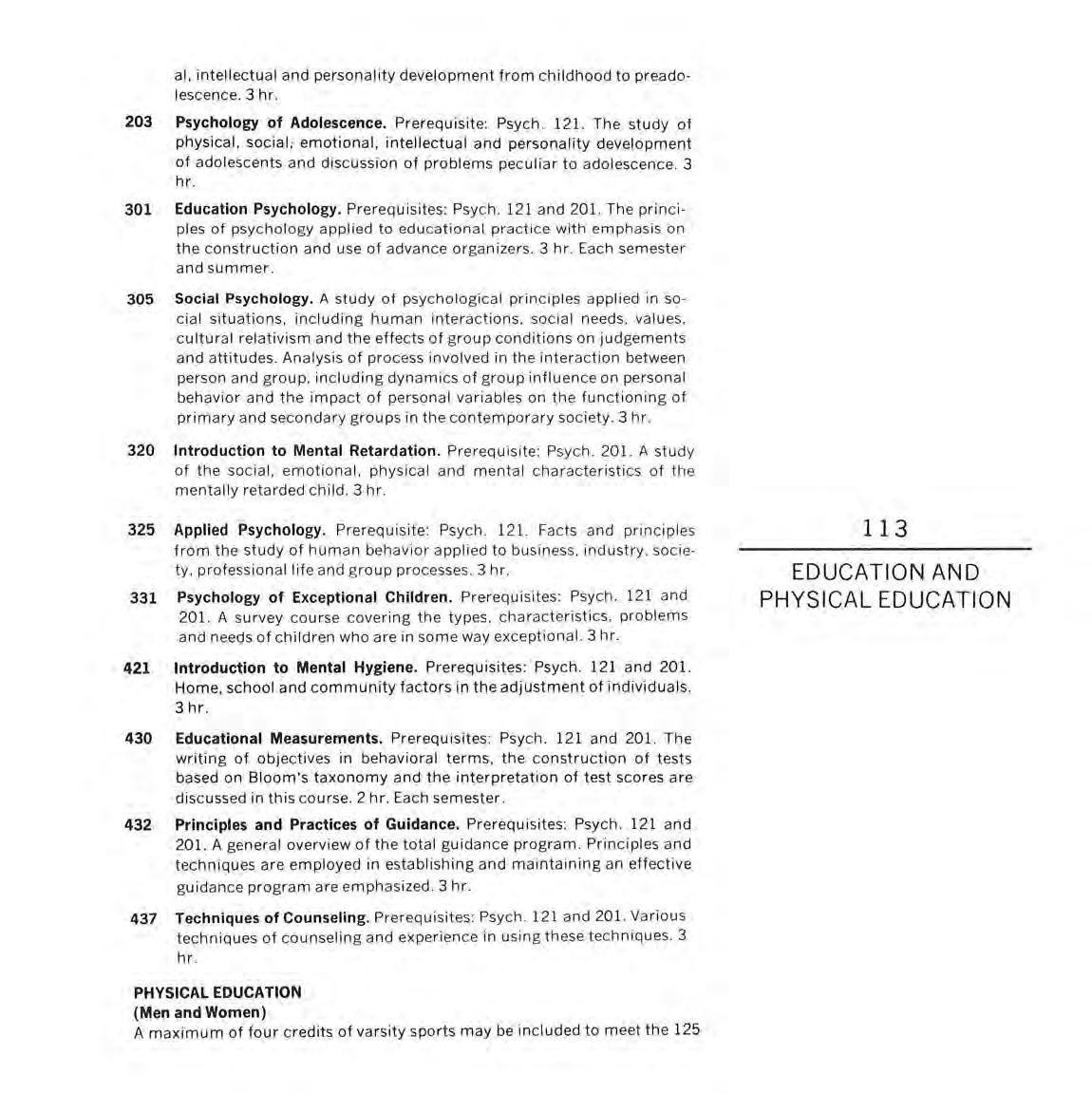
437 Techniques of Counseling. Prerequisites: Psych. 121 and 201. Various techniques of counseling and experience in using these techniques. 3 hr.
A maximum of four credits of varsity sports may be included to meet the 125
semester hours of course cred it required for degree purposes.
1 Folk Dance. Two hours atte nd ance. 1 hr. First semester.
2 Square and Social Dance. Two hour s attendance 1 hr. Second semester.
4 Golf. Five hours attendance. Fundamentals of grip, stance and swing. Facto r s in putting. Each st ud en t to furnish own eq uipm ent. Membership in Aub urn Country C l ub required. 1 hr Summer.
8 Beginning and Intermedi ate Swimming. Tw o h o ur s attendance. Open to a ll classifications of sw i mmers or non-swimmers. Red Cross cert ificates i ssued to those who pass Red Cross standards. 1 hr. Each semes t er .
g Life Saving and Water Safety Instructor. The c ourse wil l cover th e American Red Cross Senior Life Sav i ng and Water Safety In structor I and I I certificate requirements. 1 hr. Lecture and demonstr a tion. 2 hrs. Lab.
10 Tennis. Fundam e ntals of stroke, rules and strategy. Student must furni s h tennis racket and three new balls. 1 hr Each semester and summer.
11 Beginning Bowling. Two hours attenda n ce. Fund a m ental sk ill s and techniques are emphas i zed. 1 hr. Men and Women.
200 Play and Games for Early Childhood. Indoor and outdoor play and rh ythmica l act ivit i es designed tor the pre -sc h ool chi ld in the nursery schoo l environment . Th e physical, mental, socia l , and emotional deve l opment o f ch ildr en wi ll be analyzed in terms of s u ggested play situations to meet the varied needs and abi l ities of th i s group. 3 hr.
201 Principles of Physical Educat ion. Scope of the fi el o of physical education and its relation to modern educational theory; history , principle s o f phy s ica l ed u cat i o n furnished by the ba s ic sc i ences and the philosophies of physica l education. 3 hr. First semester.
203 Gymnastics. (Tumb lin g , r ebo und tumbling and apparatus.) Three hours attendance. Instruction in tumbling, trampoline , mini-trampolin e , s id e horse, va ultin g box. high bar. para ll el bar. and balanc i ng. Uniform required. 2 hr. Fir st semester.
205 Health. A st ud y of the function a nd care of the human body in hea l th and disease, and the harmful effects of stimu l ants and narcoti c s. 3 hr . Each semeste r and summe r .
215 First Aid. Amer ican Red Cross First Aid course and Medical Self Help co ur se. 3 hr Each semeste r and s umm er.
309 Organization and Administration of Programs in Physical Education and Recreation. Co nsid erat i on of general principles of administrative techniques and r esponsibil iti es are related to fields of Physical Edu ca ti on and Recreation. 2 hr. First semester.
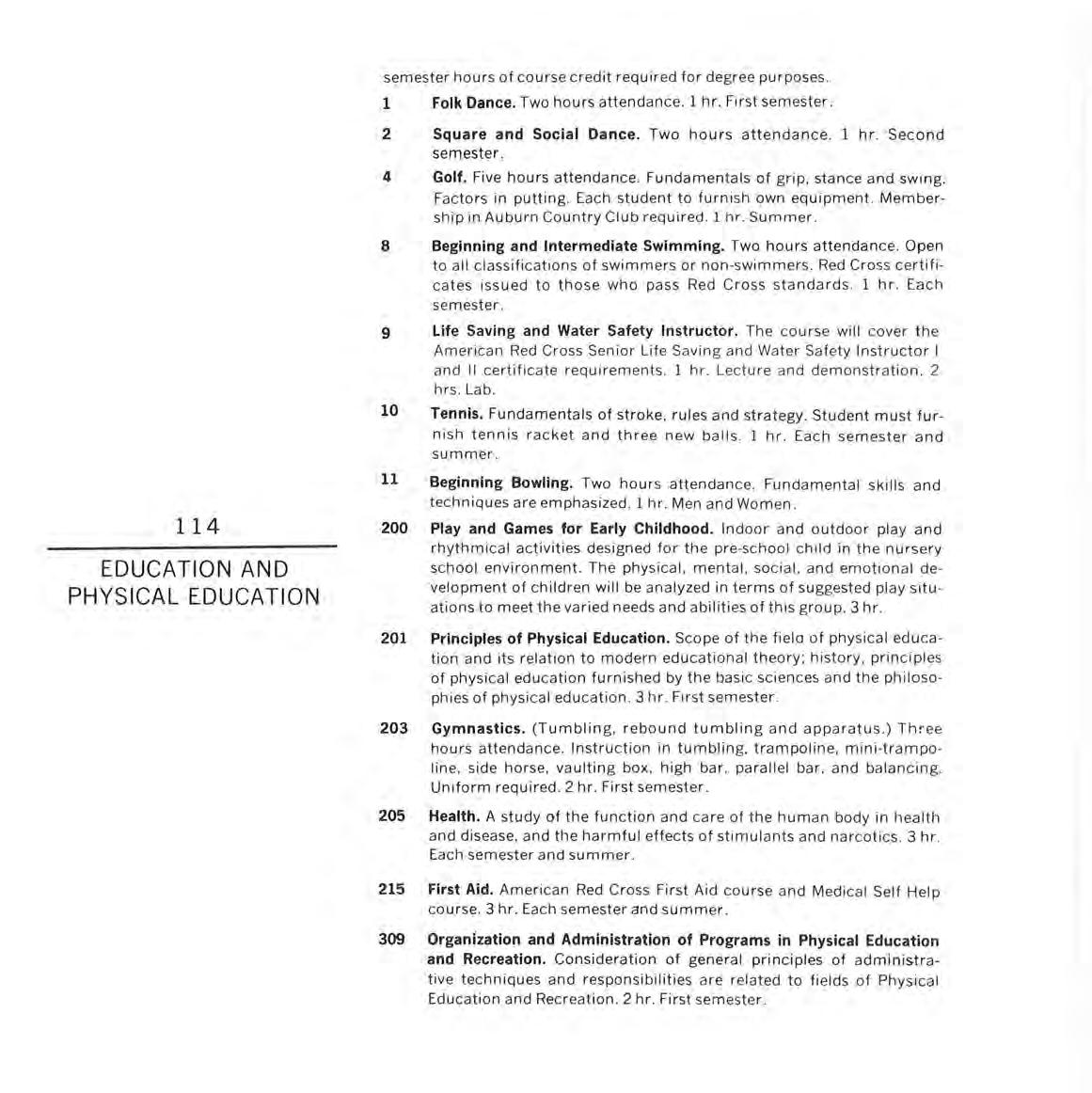
310 Physical Education in the Primary Grades. The selection and organization of materials and techniques of instruction for the primary grades. 2 hr. First semester.
311 Physical Education in the Intermediate Grades. The selection and organization of materials and techniques of instruction in the intermediate grades. 2 hr Second semester.
312 Kinesiology and Anatomy. Study of bones, body movements, muscle action and joint mechanics in relation to P.E. activities; common postural defects and joint injuries 3 hr. First semester.
320 Special Methods in Physical Education. Prerequisite: Junior standing. An analysis of the technique s used today in the t eac hing of health and physical education. 2 hr. Second semester.
350 Independent Study in Physical Education. An in-depth study of an issue selected by the student. Must be approved by department chairman. 1 to 3 hr. Arranged.
410 Health Programs. Required for area of concentration in Physical Education. Prerequisite: P.E. 205. A study of the structure and functions of the various health agencies at the national , state, and local levels. 2 hr. Second semester.
415 The Development of Basic Learning Abilities. Introduction to screening and remedial techniques and activities involving ba s ic l ea rnin g abilities in the a reas of (1) Gross-motor Development, (2) Sensorimotor Integration, (3) Perceptual-motor Skills a nd (4) Social Skills. 2 hrs.
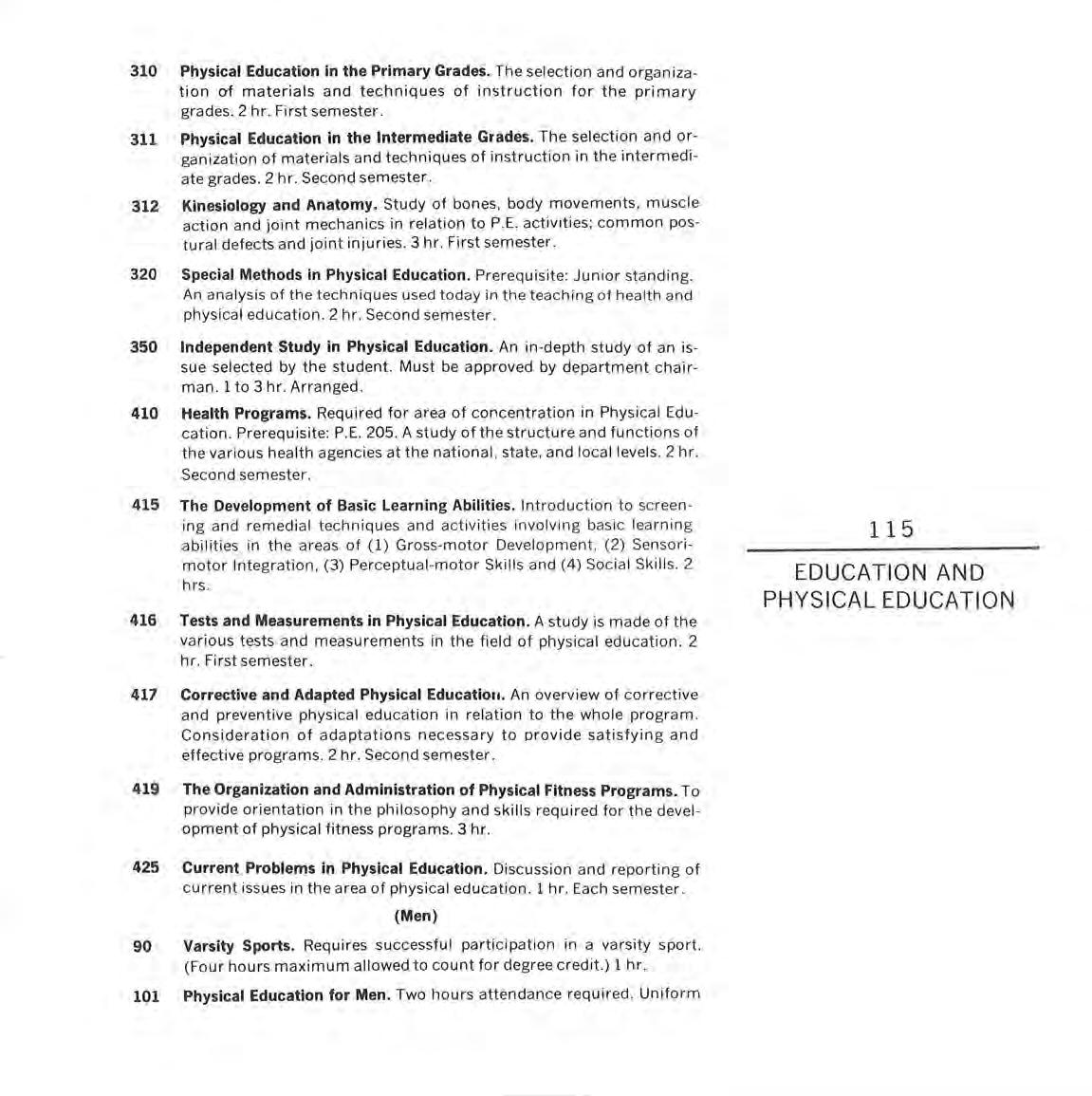
416 Tests and Measurements in Physical Education. A study is made of the various tests and measurements in the field of physical education. 2 hr. First semester.
417 Corrective and Adapted Physical Educatioto. An overview of corrective and preventive physical education in relation to the whole program. Consideration of adaptations necessary to provide satisfying and effective programs. 2 hr. Second semester.
419 The Organization and Administration of Physical Fitness Programs. To provide orientation in the philosophy and skills required for the development of physical fitness programs. 3 hr.
425 Current Problems in Physical Education. Discussion and reporting of current issues in the area of physical education. 1 hr. Each semester.
90 Varsity Sports. Requires successful participation in a varsity sport. (Four hours maximum allowed to count for degree credit.) 1 hr.
101 Physical Education for Men. Two hours attendance required. Uniform
115
required. Activities: archery, badminton , and wrestling. 1 hr. First semester.
102 Physical Education for Men. Two hours attendance required. Uniform required. Activities: tumbling, weight training and golf. 1 hr. Second semester.
207a Theory of Football. Two hours class attendance. 3 hr. First semester.
207b Theory of Basketball. Two hours class attendance. 3 hr. First semester.
207c Theory of Track. Two hours class attendance. 3 hr. Second semester.
207d Theory of Baseball. Two hours class attendance. 3 hr. Second semester.
207e Theory of Wrestling. Two hours class attendance. 3 hrs. First semester.
216 Minor Sports I. Three hours attendance required. A study of the history, strategy, and techniques involved in archery , badminton, and wrestling. 2 hr. First semester.
217 Minor Sports II. Three hours attendance required. A study of the history, strategy, and techniques involved in tumbling, weight training , and golf. 2 hr. Second semester.
300 Prevention and Treatment of Athletic Injuries. Nature and causes of injuries incident to the physical activities of children and athletes. 2 hr. Second semester.
308 Principles of Officiating. Two hours class attendance , two hours of lab. Officiating techniques in football and basketball. Study of rules. 3 hr. First semester.
400 Advanced Techniques in Physical Education for Men I. Prerequisite: P.E. 216. Required of all men with areas of concentration in Physical Education. A practicum involving laboratory experiences in P.E. 101. 1 hr. First semester.
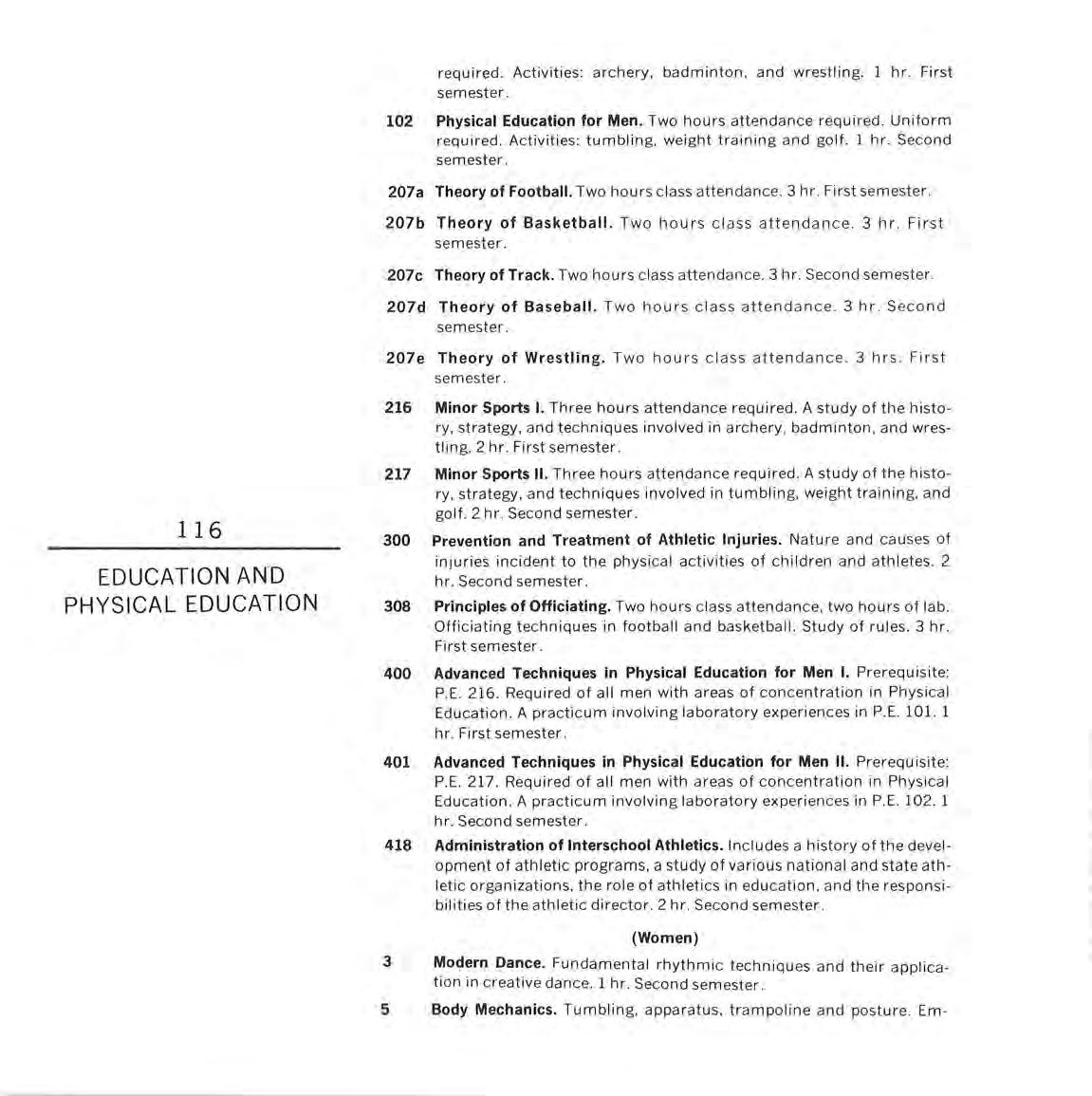
401 Advanced Techniques in Physical Education for Men II. Prerequisite: P.E. 217. Required of all men with areas of concentration in Physical Education. A practicum involving laboratory experiences in P.E. 102. 1 hr. Second semester.
418 Administration of lnterschool Athletics. Includes a history of the development of athletic programs, a study of various national and state athletic organizations, the role of athletics in education, and the responsibilities of the athletic director. 2 hr. Second semester.
3 Modern Dance. Fundamental rhythmic techniques and their application in creative dance. 1 hr. Second semester.
5 Body Mechanics. Tumbling, apparatus. trampoline and posture. Em-
103 Physical Education for Women I. T wo hour s a tt end a n ce r equir ed . Acti v ities: ba dmint o n , a r c h er y , a nd gy mn as ti cs . 1 hr . Fir st se m es t er .
104 Physical Education for Women II. T wo hour s a tt e nd a n ce r equir ed. Acti vi ties : bask etball, v olle y ba ll , a nd g olf. 1 hr. Se co nd se me st e r
218 Basic Skills for Women I . Thre e hour s of atten da n ce requir ed. A study of the history , str at egy a nd t ec hniques involved in badminton , a rchery, and gymnasti c s . 2 hr . First semester .
219 Basic Skills for Women II. Thr ee hour s of attend a n c e r equir ed. A study of th e histor y, str ateg y a nd t ec hniqu es in v olved in bas k etb a ll, v o ll eyba ll , a nd g olf . 2 hr . Seco nd se m es t er .
402 Advanced Techniques in Physical Education for Women I. Pr e r equ is it e: P E 218 Requir ed o f a ll wo m en with major s in Ph ys ica l Edu ca tion A pra c ti c um in v olvin g lab o r a t ory ex pe rien ce s in P. E. 103. 1 hr . Fir st se mest er
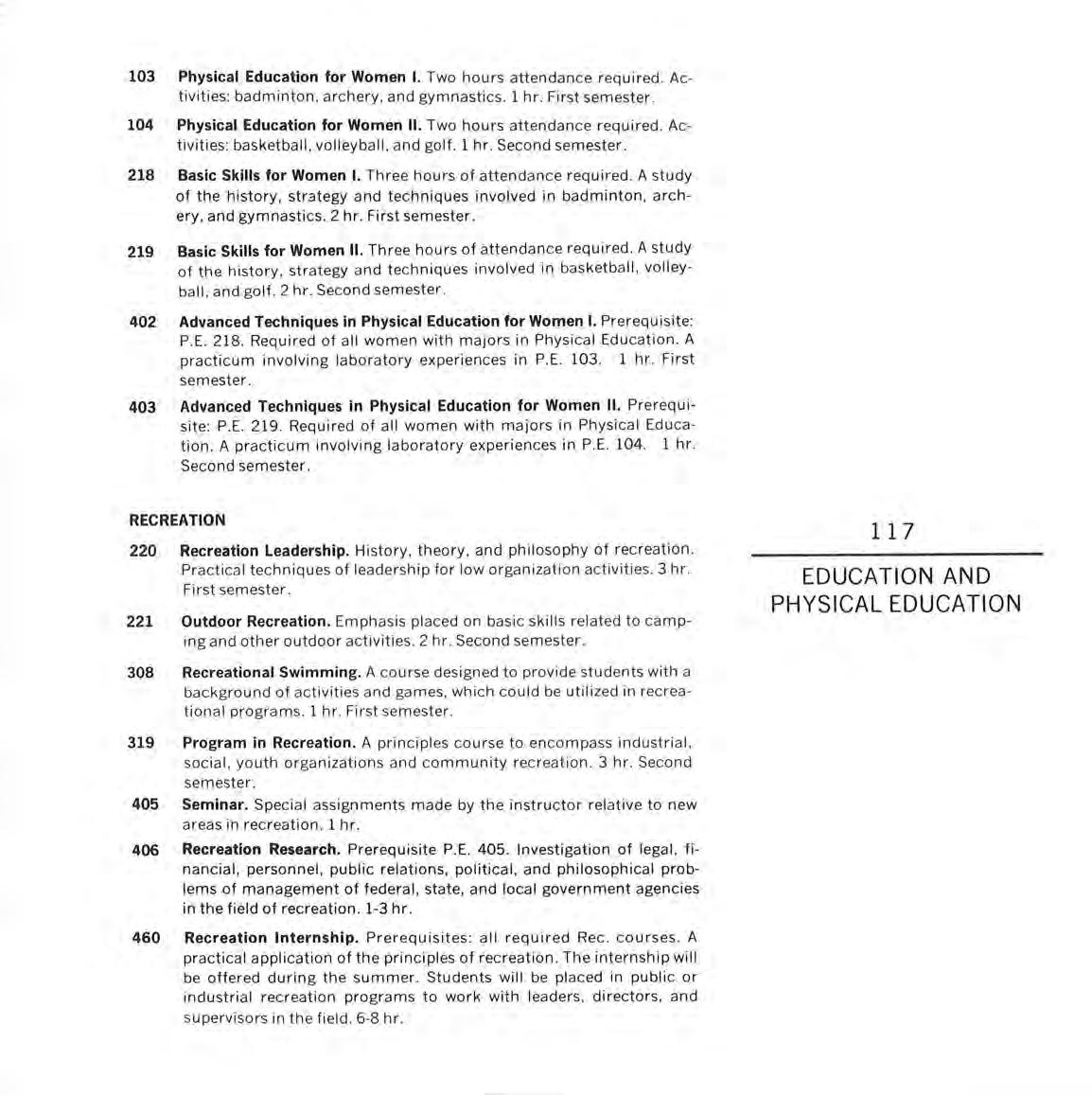
403 Advanced Techniques in Physical Education for Women II . P re r equis ite : P.E. 219 Requir ed of a ll wo m e n with maj o r s in Phy s i ca l Edu cation. A pra c ti c um in v ol v in g l a bo r at o ry ex perien ces in P.E. 104. 1 hr. Second sem ester.
220 Recreation Leadership . Hi stor y , the o ry , and phil oso ph y o f r ec r ea ti o n. Pr ac ti ca l t ec hniqu es o f l ea d ers hip f o r l ow o r ga ni zat i o n act i v it i es. 3 hr Fi r st se m es t er .
221 Outdoor Recreation. Emph as i s p lace d o n bas ic s k i ll s r e l ate d t o ca mpi n g a n d o th e r o u t d oor ac ti v iti es. 2 hr . Seco nd se m es t e r .
308 Recreational Swimming . A co ur se d es i g n ed t o pr ov ide stu de nt s w ith a bac k g round o f ac ti v iti es a n d ga m es , w hi c h co uld be u t ili zed in r ec r eati o n a l pro g r a m s. 1 hr Fir st se m es t er
319 Program in Recreation. A p rin c ipl es co urs e t o e nco mp ass indu stri a l , soc ia l , y outh o r ga ni za ti o n s a nd co mmunit y r ec r eat i o n . 3 hr. Seco nd se m es ter.
405 Seminar. Sp ec i a l ass i g nm e nt s m a d e by the in stru c t o r r el ati ve t o new a r eas in re c r ea ti o n 1 hr.
406 Recreation Research. Prerequisite P.E. 405. Inv estig ation of leg a l, financial, personnel , public relations, political, and philosophic a l problems of man a gement of fed e r a l , state , and loc a l g overnment agencies in the field of recreation 1-3 hr.
460 Recreation Internship. Pr e r e quisit es: all requir e d Rec. c our ses. A pr actical appli ca tion of th e prin c ipl es of r ecreation The int e rn s hip will be offered durin g the s umm er . Students will be pl ace d in publi c or indu strial re c r ea ti o n prog r a m s to work with l ea d e r s, dir ec t o r s , a nd s up e r v i so r s in t h e fi eld 6-8 h r
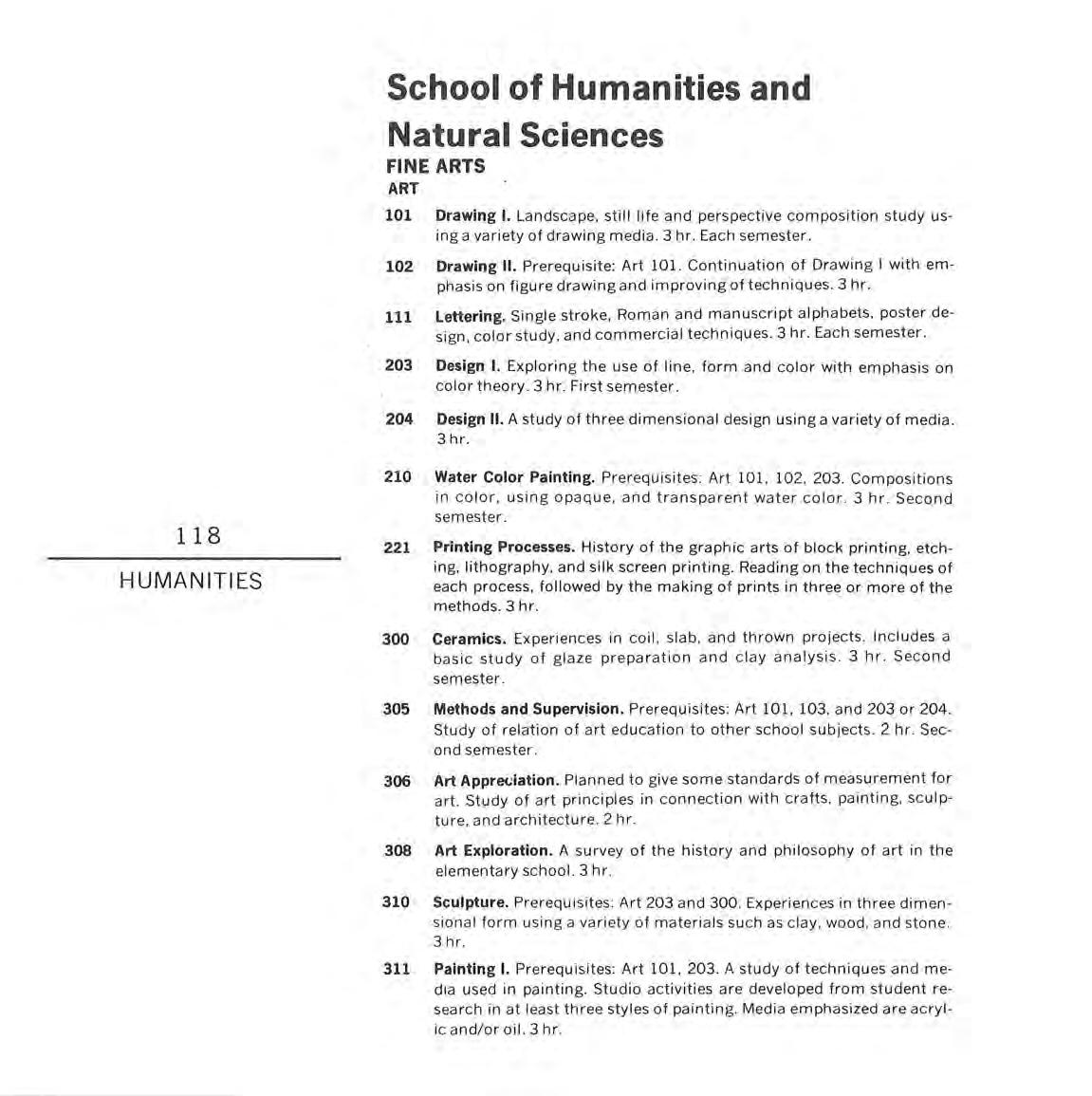
Drawing I. Landscape, sti ll lif e and perspective compos iti on study using a variety of drawing media. 3 hr. Each semester.
Drawing II. Prerequisite: Art 101. Cont inu ation of Drawing I with emphasis on figure drawing and improving of techniques. 3 hr.
Lettering. Sing l e stroke, Roman and manuscript alphabets, poster design, co l or study, and commercia l techniques. 3 hr. Each semester.
Design I. Exploring the use of line, form and color with emphasis on co l or theory. 3 hr. First semester.
Design II. A study of three dimens i onal design using a variety of media . 3 hr.
Water Color Painting. Prerequi s ites: Art 101 , 102, 203. Compositions in co lor , using opaque, and transpar e nt water color. 3 hr. Second semester.
Printing Processes. History of the graphic arts of block printing, etching , lithography , and si lk screen printing. Reading on the techniques of each process , followed by the making o f prints in three or more of the methods. 3 hr
Ceramics. Experiences in coil, slab , and thrown projects. In c lu des a basic study of glaze preparation and clay analysis. 3 hr. Second semester.
Methods and Supervision . Prerequisites: Art 101 , 103 , and 203 or 204. Study of relation of art education to other school subjects. 2 hr. Second semester
Art Appre<;iation. Planned to give some standards of measurement for art. Study of art principles in connection with crafts, painting, sc ulpture, and architecture. 2 hr.
Art Exploration. A survey of the history and philosophy of art in the elementary school. 3 hr.
Sculpture. Prerequisites: Art 203 and 300 Experiences in three dimens ional form using a variety of material s such as c l ay, wood, and stone. 3 hr.
Painting I. Prerequisites: Art 101, 203. A study of techniques and med ia used in pa in ting . Studio activities are developed from student research in at least three styles of painting. Medi a emphasized are acrylic a nd / or oil. 3 hr .
312 Painting II. Prerequisites: Art 101,203, and 311. Painting st ill lit e, figur e, and l andscape compos iti ons, using severa l different o il techniques. 3 hr .
317 Art History I. A study of painting , scu lptur e, and arch it ecture from ancient times to the Renaissance. 3 hr.
318 Art History II. A study of art in the West s in ce the Renaissance. 3 hr.
400 Studio Activities. Prerequisite: Consent of in structor Suggested for advanced art students wanting to ga in additiona l competence in a partic ul ar area. The student may choose to do add itional work in his area of int erest. 1-6 hr. All art majors are required to arrange at le ast onehalf of a st u dent show.
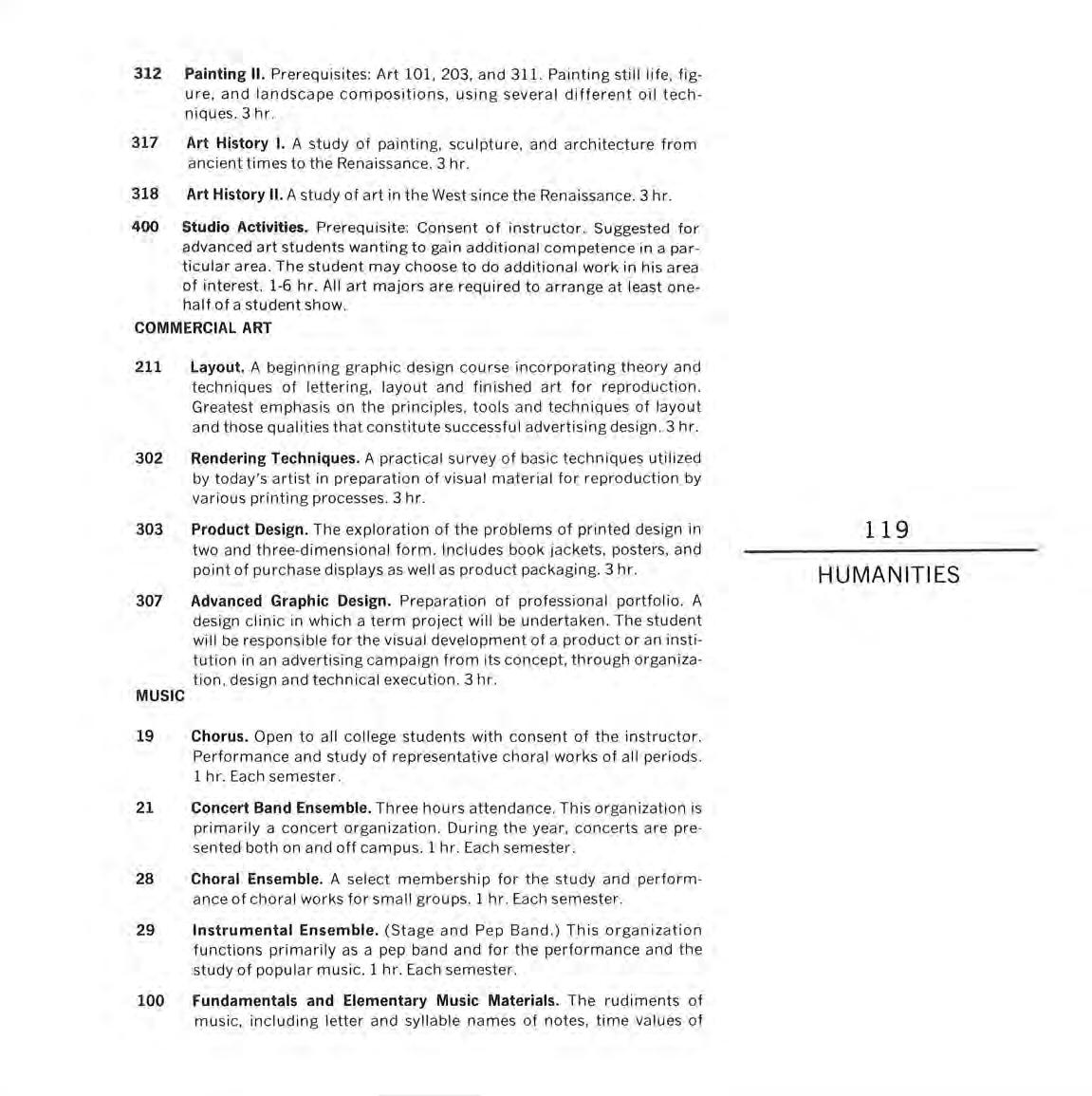
211 Layout. A beginning graphic des ign course in corporat in g theory and techniques of l ettering, l ayout and finished art for reproduction. Greatest emphasis on the principles, tools and techniques of layout and those qualities that constitute successfu l advertising design. 3 hr.
302 Rendering Techniques. A practical s ur vey of basic techniques utilized by today's artist in preparation of visua l material for reproduction by various printing processes. 3 hr.
303 Product Design. The exploration of the prob l ems ot printed design in two and three-dimensional form. In c lu des book jackets , posters, and point of purchase displays as we ll as product packaging. 3 hr.
307 Advanced Graphic Design. Preparation of professional portfolio. A design cl ini c in which a term project wi ll be undertaken. The student w ill be responsible for the visua l development of a product or an institution in an advert i sing campa i gn from its concept, through organ i zation, design and technical execut ion. 3 hr.
19 Chorus. Open to a ll co ll ege students with consent of the instructor. Performance and study of representative chora l works of a ll periods. 1 hr. Each semester.
21 Concert Band Ensemble . Three h ours attendance. This organ i zat i on is primarily a concert organ i zat i on . During the year, concerts are presented both on and off campus. 1 hr. Each semester.
28 Choral Ensemble. A se l ect membership for the study and performance of chora l works for small groups. 1 hr. Each semester.
29 Instrumental Ensemble. (Stage and Pep Band.) This organization functions primarily as a pep band and for the performance and the study of popular music. 1 hr. Each semester.
100 Fundamentals and Elementary Music Materials. The rudiments ot music, including letter and sy ll ab l e names of notes, time va lu es of
notes and rests , time , and key signatures, chromat i cs, intervals, chords, keyboard experience, and th e writing of origina l melodies. Study of chi ldr en's musical lit erature and of their tonal and rhythmic problems. 3 hr.
101 Theory. An integrated course which includes sca l es, intervals , harmonic progressions , modality, modul a tion, seventh chords, figured bass , ear training, and sight sing in g. 5 hr.
102 Theory. Prerequisite: Theory 101. Irregular resolutions, diminished sevenths, secondary dominants , ninth, e l eventh and thirteenth chords, altered chords, chromatic harmony, and creative work. 5 hr.
Wind Instrument Techniques. A study of woodwind and brass instruments with actua l playing experience. 2 hr. (May be repeated).
Class Guitar. Open to all students . Basic chords, melodies, note reading , and sty les. Advanced material for experienced performers. 2 hr. First semester.
Class and Applied Piano, Voice, Woodwind, Brass, String, Percussion, and Organ . In strument study on the freshman level. 1 hr. (May be repeated).
Wind Instrument Techniques. A study of woodwind and brass instruments with actua l playing experience. 2 hr. (May be repeated).
Elementary Vocal Techniques. Study of modern teaching techniques for children's music lit erature. 2 hr.
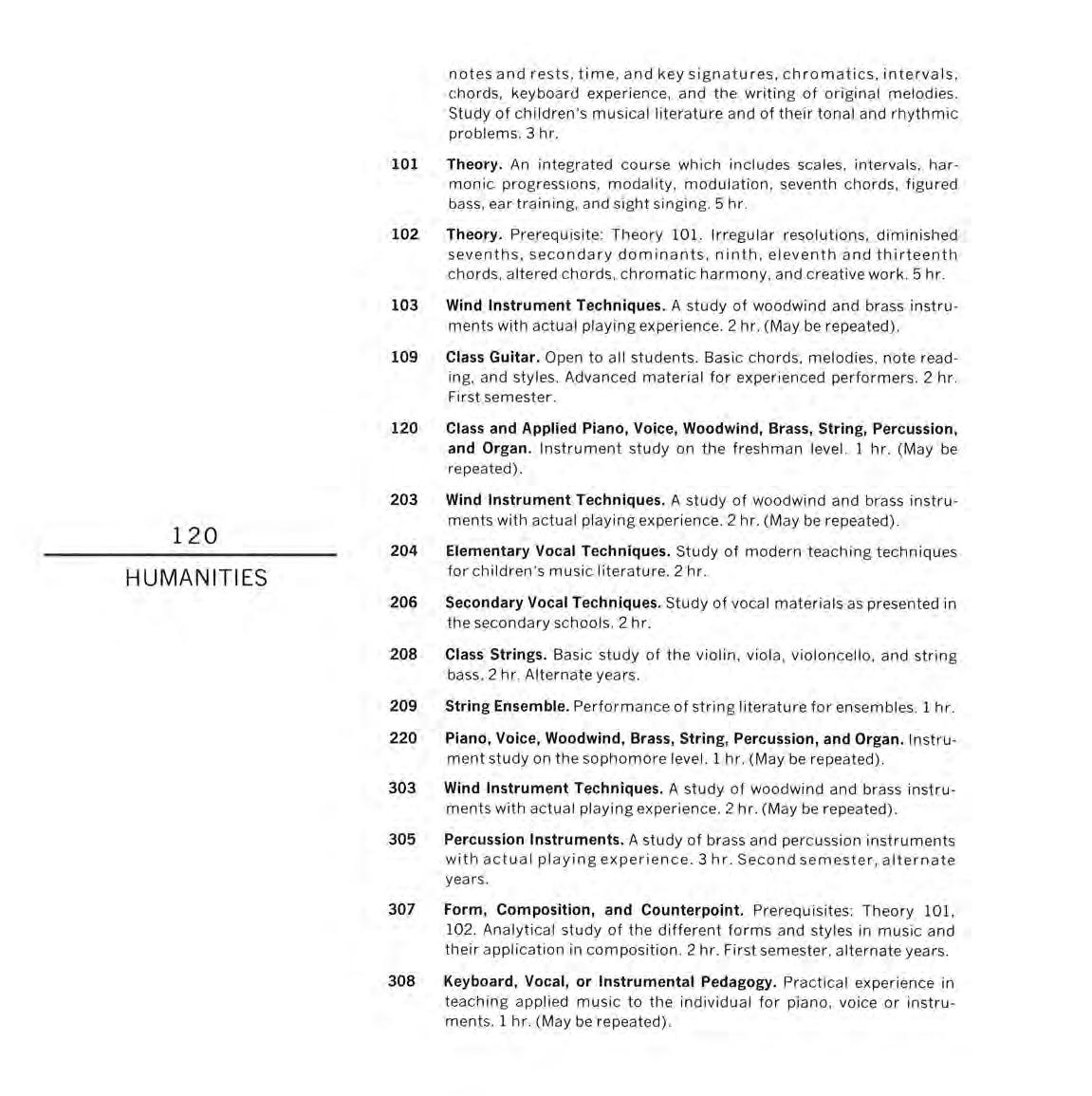
Secondary Vocal Techniques. Study of voca l materials as presented in the secondary schoo l s. 2 hr.
Class Strings . Basic study of the vio lin, vio l a, violoncello, and str in g bass. 2 hr. A lt ernate years.
String Ensemble. Performance of string literature for ensembles. 1 hr.
Piano, Voice, Woodwind, Brass, String, Percussion, and Organ. Instrument study on the sophomore l evel. 1 hr. (May be repeated).
Wind Instrument Techniques. A study of woodwind and brass in struments with actua l playing experience. 2 hr. (May be repeated).
Percussion Instruments. A study of brass and percussion instruments with actual playing experience 3 hr. Second semester, alternate years.
Form, Composition, and Counterpoint. Prerequisites: Theory 101, 102. Analytica l study of the different forms and styles in music and their app li cation in composit i on. 2 hr. First semester, a lt ernate years.
Keyboard, Vocal, or Instrumental Pedagogy. Practical experience in teaching app li ed music to the indi v idu a l for piano, vo ice or instruments. 1 hr. (May be repeated).
309 Introduction to Music Therapy. An orientation c our se pres entin g a s urve y of effe c ti ve th e r a p e uti c u ses o f the elem ent s o f mu s ic. 3 hr.
311 Music Appreciation and History of Music. Va r io u s f o rm s a nd st y l es o f mu s ic, rangin g from folk so n g t o o pera, oratorio a nd sy mph o n y, a n alyzed and dis c u sse d thr o u g h th e u se o f r eco rd s. 2 hr Eac h seme st e r
313 - Music for Recreation.
Pra c ti c al g uid e f o r th e pl a nnin g a n d exec uti o n o f mu s i c pr og r a m s fo r c ommunit y r ec r ea ti o n ca m p in g, co rr ec ti o n a l a nd c lini ca l in stitution s . senior c iti ze n s . indu st r y , a nd the a rmed se rvi ces. 2 hr . Fir st se mest e r.
320 Piano, Voice, Woodwind, Brass, String, Percussion, and Organ. In strum ent stud y o n th e juni o r l eve l. 1 hr . ( Ma y b e r e p eate d ).
400 Vocal or Instrumental Practicum. Pr ac t ica l ex p e ri en ce in t eachi n g th e s m a ll a n d l a r ge vocal a n d in strume n ta l e n se mb le. 1 h r . ( M ay b e repe a ted ).
403 Wind Instrument Techniques. A stud y o f woo d w ind a nd brass in st rum ent s w ith ac tu a l pl ay in g ex p e ri e n ce. 2 hr . ( May be r epea t ed).
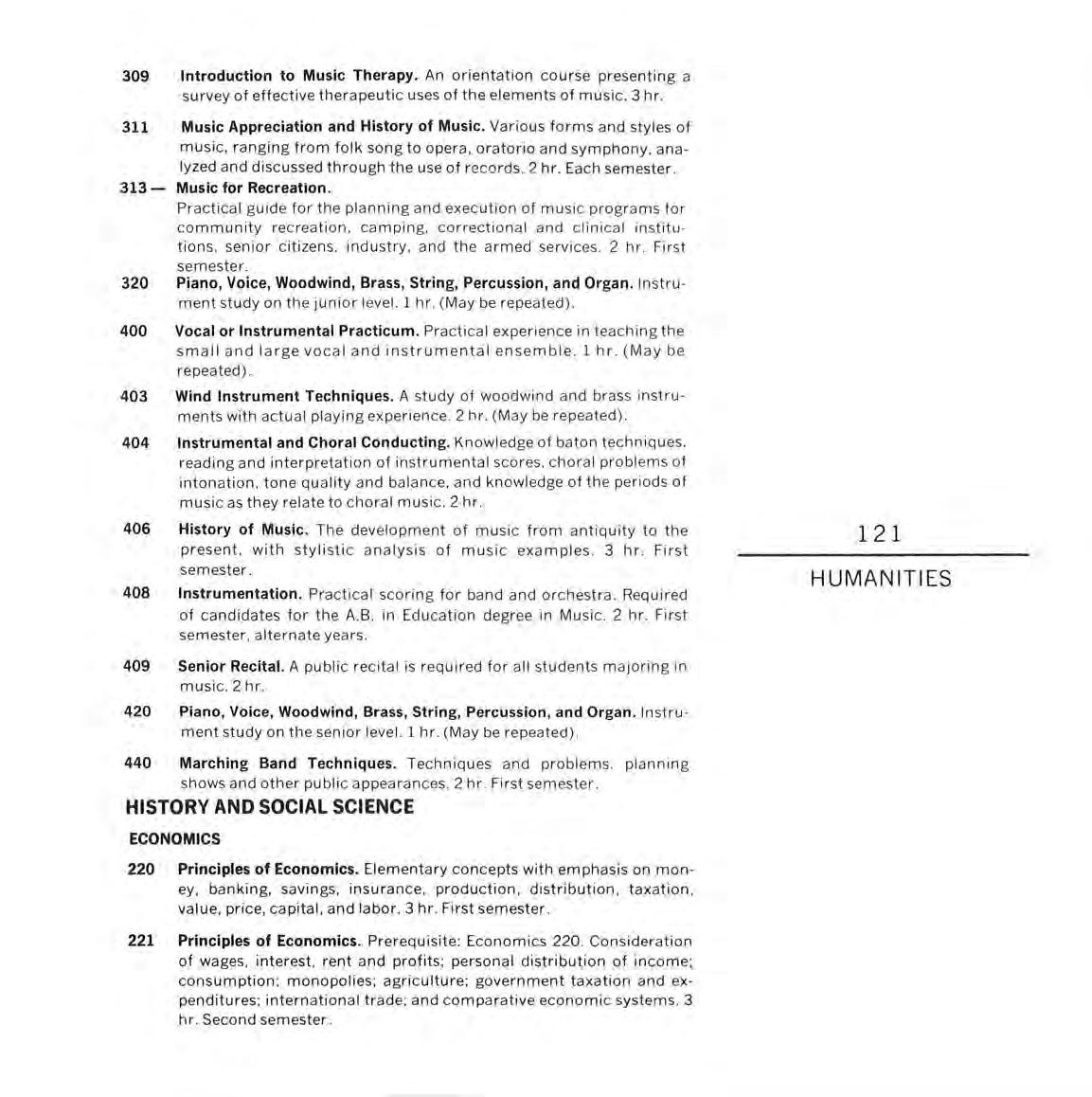
404 Instrumental and Choral Conducting. Knowl ed ge o f b a t o n tec hni q u es . re a din g and int e rpr et a ti o n o f in strum e ntal sco r es. c h o r a l p r o bl em s o f inton a tion ton e qu a lity a nd b a la n ce a nd knowl ed ge o f th e p e ri o d s o f mu s ic a s they r e l a t e t o c hor a l mu s ic. 2 hr.
406 408
History of Music. T he de v e l o pm e nt of mu s i c fr o m a n t i q uit y t o th e pr ese nt , with s t y li sti c a n a l ys i s o f mu s i c exa mpl es. 3 hr . Fir s t seme ster .
Instrumentation . Pr actica l scori n g f o r b a n d a nd o r ches tr a. Req u ire d o f c andidate s for th e A .B in Ed u ca ti o n de g r ee in Mu s ic. 2 hr Fir st se m es ter , a lt e rn a t e yea r s.
409 Senior Recital. A p ubli c r ec ita l i s r equir ed f o r a ll stu d e nt s m a j or in g in musi c . 2 hr .
420 Piano, Voice, Woodwind, Brass, String, Percussion, and Organ In strum e nt study on th e se ni o r l ev e l . 1 hr . (M a y be r e p ea t ed ) .
440 Marching Band Techniques. T ec hniques a nd p rob l ems. pl a nnin g s how s and o th er pu b li c a pp ea r a n ces . 2 hr . Fir st se m es t e r.
220 Principles of Economics. Elem entary concepts with emph as is on money , banking, savings, insur a n c e , production, d istribution. ta xa tion , v a lue , price , c apital , a nd labor. 3 hr. First semester.
221 Principles of Economics . Prerequisite: Economi cs 2 20 Co n s ider a tion of wages, interest, r e nt and profits; personal di stribution of in c ome ; consumption; monopolies ; ag ri c ulture; government t a x a tion a nd expenditures; intern a tion a l tr a de; and c omp a rativ e eco nomi c sy st em s . 3 hr Sec o nd seme ster
222 Contemporary Economic Problems. Prerequisites: Economics 220 and 221. Analysis of major economic problems relating to wage and inco me distribution, money and c redit , busine ss cycles, domestic and international trade and tariffs. 3 hr.
333 Economic History of United States. U. S. economic history from co l onial times to the present. 3 hr.
350 Public Finance. Prerequisites : Econ 220 and 221. A critical analysis of the capitalistic economic systems followed by a survey a nd critica l analysis of socialism and communism 3 hr.
375 Labor and Industrial Relations. Econ. 220 and 221. Labor, management and government as they are interrelated involving collective bargaining, labor laws, and wage theories 3 hr.
380 Environmental Economics. Prerequisit es: Econ. 220-221. An economic ana ly sis of the environmenta l crisis and possible solutions . The role of the market system and its failure to compensate for the suffering generated by a hi g hly advanced society. 3 hr.
470G Special Problems in Economics. Pre re quisites: Econ. 220 and 221. Designed to provide an opportunity for a student to do advanced independent study in economics based upon his individual needs and interests. 1-4 hr.

113 American History to 1865. Discovery and exploration, colonizat i on, the Revolution, and the U.S. and its problems until the end of the Civ il War. 3 hr. First semester.
114 American History after 1865. Reconstruction , the l as t frontiers , the rise of big business, imperialism, and the ro l e of the U.S. in two World Wars and their aftermaths 3 hr. Second semester.
201 World Civilization to 1500. A survey of the beginnings of civi l izations in the great river valleys and their diffusion to la ter civilizations in the Middle East and Europe. Particular attention wil l be given to the cultura l and political institutions of the West, which furnish our own cu ltur a l heritage. 3 hr. First semester.
202 World Civilization after 1500. The rise and decline of European predomin a nce will be analyzed, with emphasis upon the major socia l , political, and economic ideologies a nd institutions that evolved. 3 hr. Second semester .
301 Colonial America. Co l on i a l rivalry between the Spanish, French , Engli sh, and Dutch in North America ; the Revolution, and U.S. history to 1823. 3 hr
302 U.S. in the Nineteenth Century. The U.S. from 1823 through Manifest Destiny a nd the Civil War down to the War with Spain. 3 hr.
303 U.S. in the Twentieth Century . The U.S. in modern times, with emphasis upon the changing social and economic theories of the period, and the internal forces that influenced its development. 3 hr.
329 History of Nebraska. A survey of the political, economic, social, and constitutional development of Nebraska from prehistoric times to the present. 2-3 hr.
333 Latin America. The evolution of the states of modern Latin America following their independence, their political and economic development and their international relations. 3 hr.
343 English History from 1688. A survey of the social, political. and economic development of England since the Glorious Revolution. Covers the social and religious impact on the development of the English Parliamentary system, the effects of the Industrial Revolution upon the British Empire, and the prospects of the modern welfare state on contemporary England. 2 hr.
344 Social and Cultural Europe 1500-1815. A historical description and analysis of European society and culture from the Renaissance to the Congress of Vienna. Particular attention will be given to correlate the fine arts and literature to the rise of national states, absolutism, and religious developments. 3 hr .
345 Modern Europe. A comparative historical analysis of the ongoing process of modernization in Europe. Emphasis on movements and institutions such as Liberalism, Conservativism, Romanticism, Socialism, Imperialism, and Totalitarianism. 3 hr.
361 Non-Western Civilizations. A broad survey of the Soviet Union and of the principal areas of the Middle East, Asia, and Africa, with particular emphasis on contemporary social, political and economic developments. 3 hr.
400 Methods in History and Social Science. Instruction in the methods of teaching high school history and social sciences . 2 hr. Second semester.
411G American Frontier. The importance of the frontier in American history from colonial times to the 20th Century. 3 hr.
426G American Constitutional Law. Prerequisite: Pol. Sci. 201 or 202 or instructor's permission. A study of the historical and political context of the cases. Traces constitutional doctrine through major decisions. Emphasis on constitutional growth that relates closely to the fundamental structure of the American government and social order. 3 hr.
455 Twentieth Century Russia. An analysis of the social and cultural, political, and economic evolution of Russia under the Tsars through the Bolshevik Revolution , and the formation of the Soviet Union to the present. 3 hr
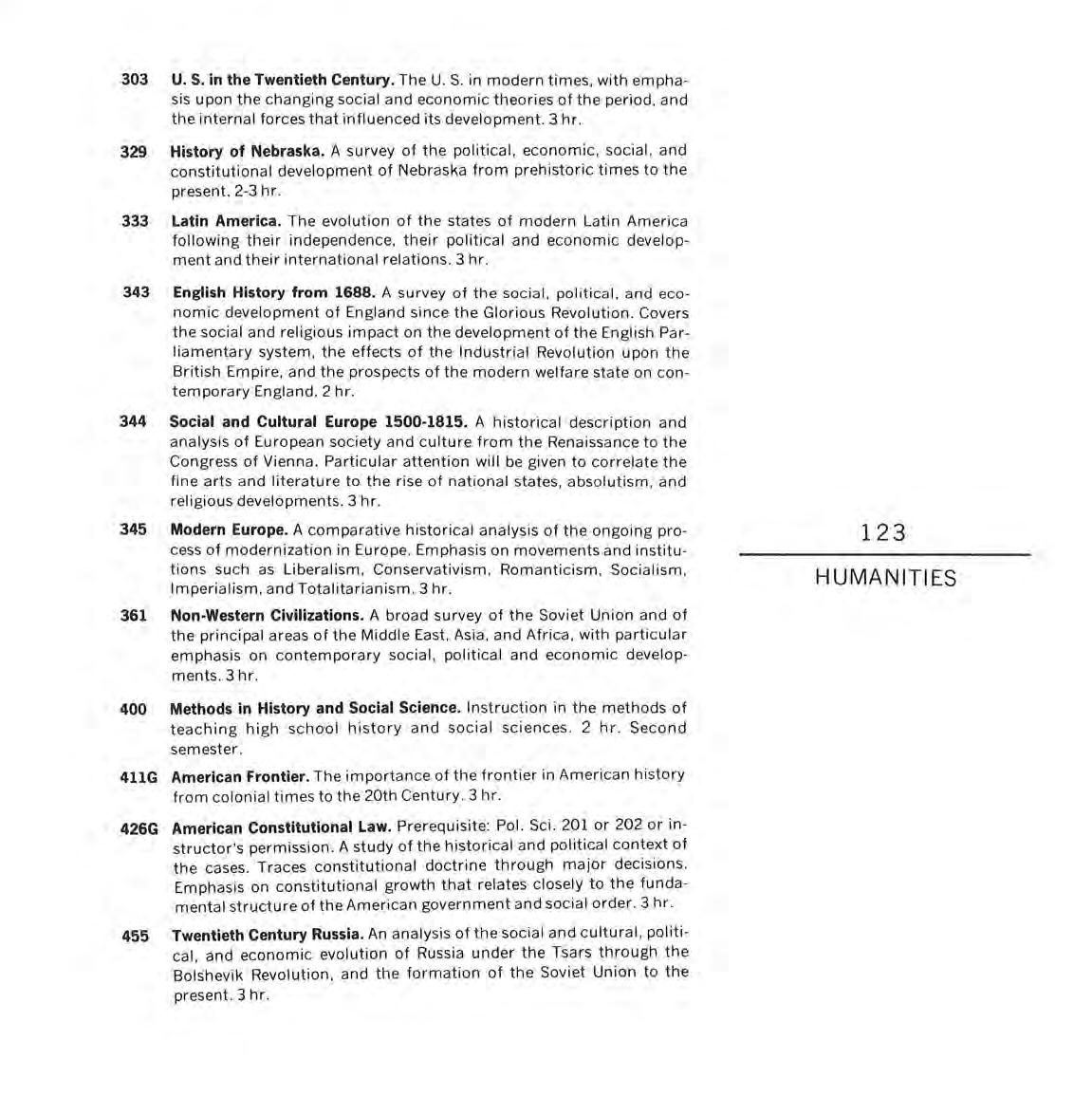
467 The Far East. Concerned with political traditions a nd historical evo lutions of the member states of this area, the impact of the West and its profound influences on political order. and the issues that come to the fore in today's revolutionary and fluid situation . 3 hr.
470 Independent Study in History. Prerequisite: juni o r or se ni or stand ing , with adequate preparation in the field a nd instructor's permission. Individu al in struc tion in the techniques of historical rese a rch. with either extensive readin gs a nd reports or a t e rm paper required. Recommended for students co nt e mplatin g g r aduate work in hi story. 1 to 3 hr.
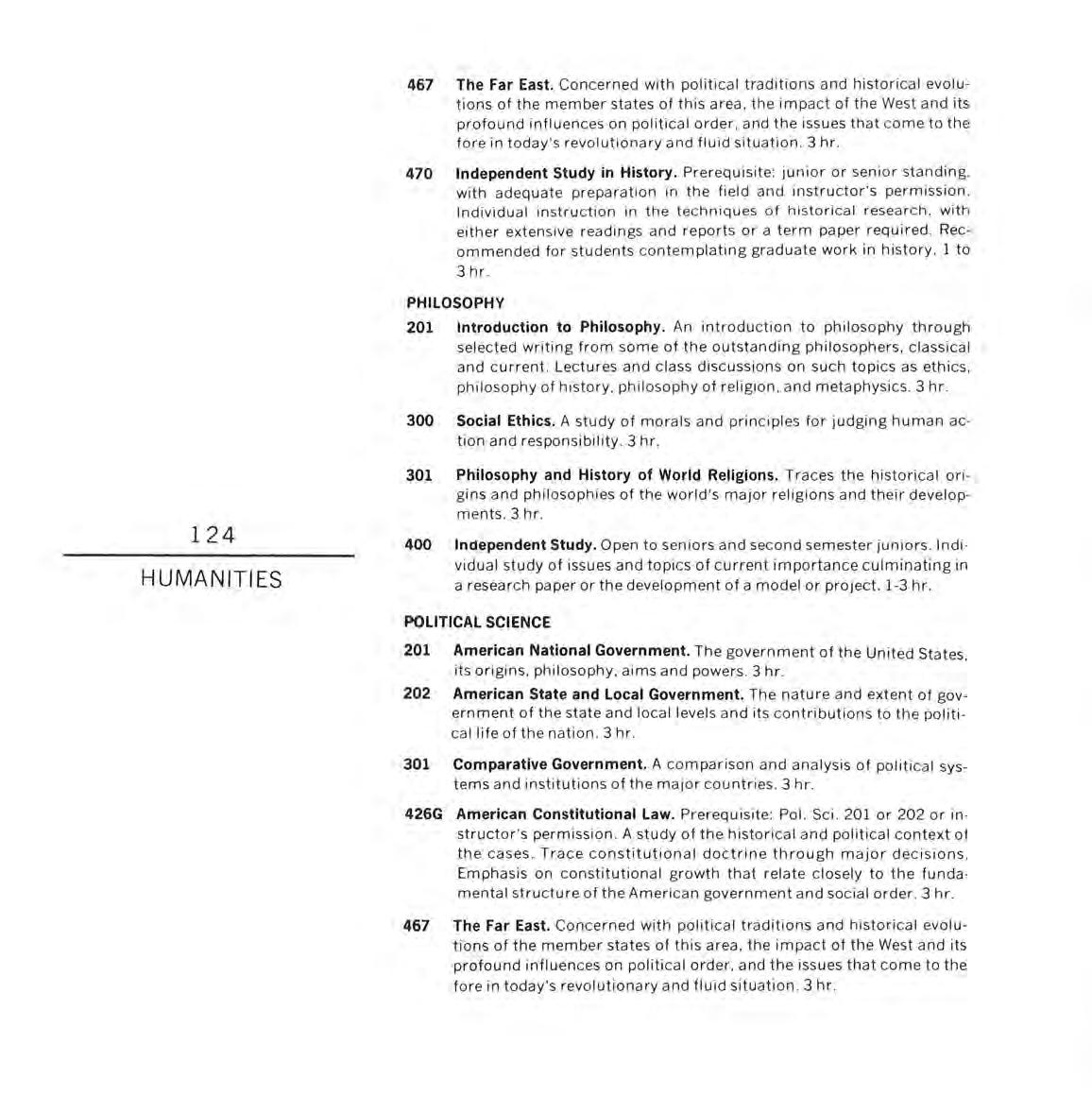
201 Introduction to Philosophy. An introdu c tion to phi l osophy through selected writing fr o m some of the outstanding philosophers. c la ss ical and current. Le c tures and class discussions on such topics as ethics, philosophy o f history, phil osop hy of religi on, a nd metaphy s ic s. 3 hr.
300 Social Ethics. A study of morals and princip l es f o r judging human action and re s pon s ibility. 3 hr.
301 Philosophy and History of World Religions. Traces the hi stor ical origins and philosophies of the world's major religions and their developments. 3 hr
400 Independent Study Open to senio r s and second se mester juni ors. Individual study o f issues and topics of current imp orta nce culminating in a research pa per or the development of a model or project. 1-3 hr.
201 American National Government. The government of the Unit ed States, its origins. ph il oso phy , aims and powers. 3 hr.
202 American State and Local Government. The n at ure and extent of government of the s t ate and l ocal levels and it s contr ibutions to the political life of th e nation. 3 hr.
301 Comparative Government. A compa rison and ana lysis of political systems and in stitutions of th e major count r ies. 3 hr.
426G American Constitutional Law . Pr e requisit e: Pol. Sci. 201 or 202 or instructor's permission. A st udy o f the histori ca l a nd political co nt ext of the cases. Trace constitutional doctrine through major decisions. Emphasi s on co nstitution a l g rowth that rel ate c losely to the fundamental str u c ture of the American government a nd social order. 3 hr
467 The Far East. Co ncerned with politica l traditions and historical evo lutions of the member states of this area, the impact of the West a nd its profound influences on political order. and the is s ues that co me to the fore in today 's revolutionary and fluid situation. 3 hr.
470 Research Topics in Political Science. Prerequisites: junior or senior standing, with adequate preparation in politi ca l science and history, and instructor ' s perm iss i on. Individual research into a chosen aspect of government or political theory, with either extensive readings and reports or a term paper required. 1 to 3 hr. On demand.
360 Social Work. Prerequisite : Soc. 201. A st ud y of the soc i al milieu from which the field of social work has emerged. The major agencies currently involved in social work and the types of socia l work practiced in the United States. 3 hr.
380 Introduction to Social Work Methods. Prerequisite: Soc. Work 360 and permission. Principles of practice in soc ial gro up work and commun ity organization. Emphasis on how people are helped through int eraction in a sma ll group and on the process of group and community problem-solving techniques. 3 hr.
430 Field Work Practicum. Prerequisite: Soc. Work 380 and permission. Supervised experience in socia l work. 3 hr.
100 Social Science. An int egrated, int erdisc iplin ary survey course in the socia l sciences designed to cover current topics from different social science perspectives. The course wi ll be te a m-taught by the history and soc i a l science instructors. 3 hr.
201 Principles of Sociology . C ulture and its relations to specif i c soc i a l problems. The soc ial instit utions of American li fe in relation to population changes, ethn ic groups and major problems of socia l policy. Th e soc i a l co n sequences of soc i a l control in the metropolitan world. 3 hr.
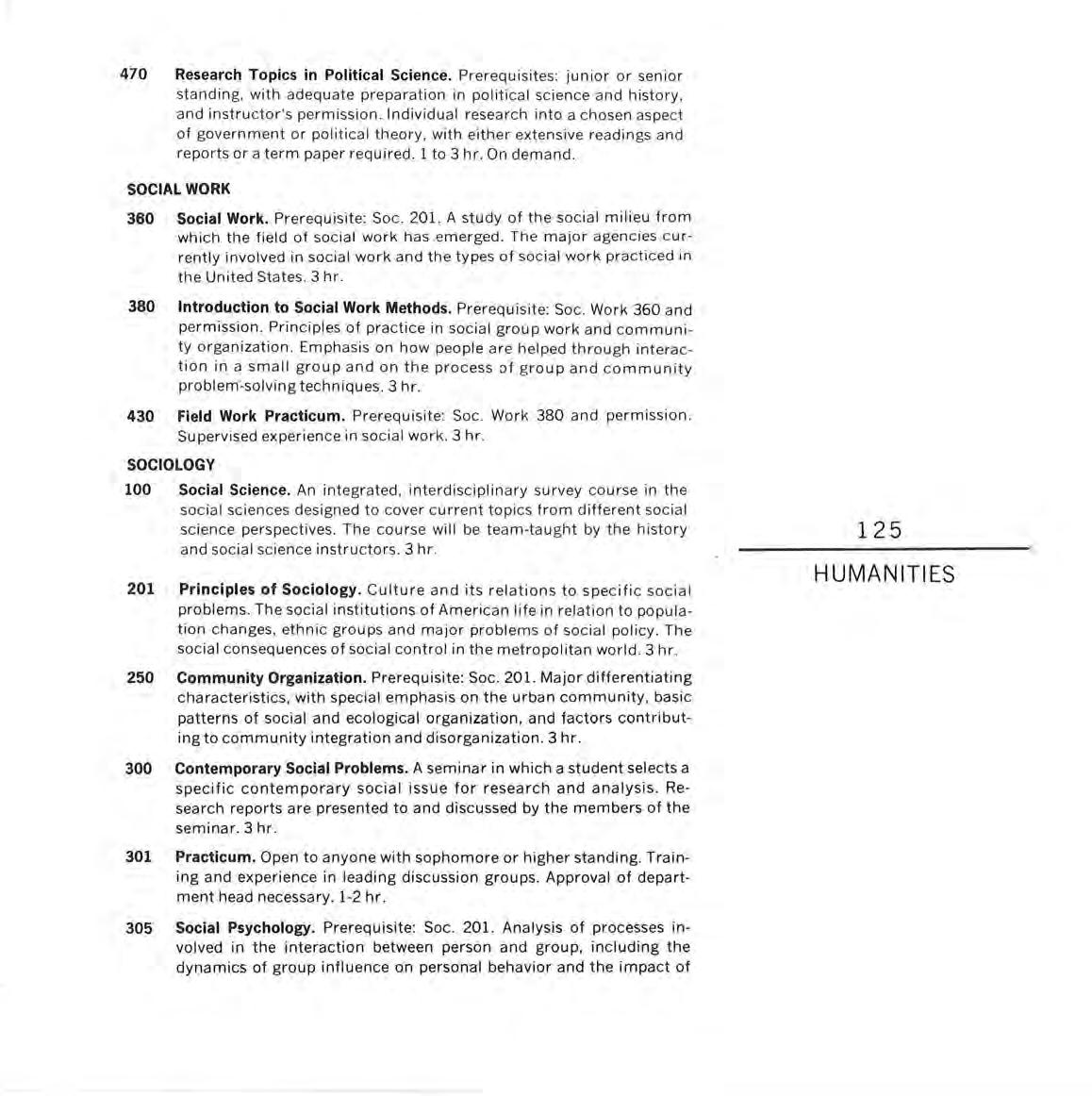
250 Community Organization. Prerequisite: Soc. 201. Major differentiating characteristics, with special emphasis on the urban community, basic patterns of social and ecological organization, and factors contributing to community integr ation and disorganization. 3 hr.
300 Contemporary Social Problems. A seminar in which a student selects a specific contemporary social issue for research and analysis. Research reports are presented to and discussed by the members of the seminar. 3 hr.
301 Practicum. Open to anyone with sophomore or higher standing. Training and experience in le ad ing discussion groups. Approval of department head necessary. 1-2 hr.
305 Social Psychology. Prerequisite : Soc. 201. Analysis of processes involved in the interaction between person and group, including the dynamics of group influence on personal behavior and the impact of
personal variables on the functioning of primary and secondary groups in contemporary society. 3 hr
340 The Family. Prerequisite: Soc. 201. The role of the family in contemporary society, factors influencing trends in family structure , functions. roles, stability, and their implications for both the community and individuals at varying stages of the family life cycle. 3 hr.
350 Juvenile Delinquency - Criminology and Penology. Prerequisite: Soc. 201. An analysis of the nature, extent, causes, and methods of delinquency and crime, including an analysis of programs of institutional treatment and rehabilitation. 3 hr.
370 Ethnic -Group Relations. Prerequisite: Soc 201. The nature of minority groups and their distribution in American society; and an examination of the melting pot concept vs. the pluralistic society. 3 hr.
420 History and Introduction to Modern Sociological Theory Prerequisite: Soc. 201. and permission. An overview of the earlier sociological theorists and their contributions to current sociological theories . 3 hr.
470 Independent Study in Sociology . Prerequisit e: Soc. 201 a nd permission. Topics to be c hosen and investigated in c onsultation with individual instructor. 1-3 hr.
ENGLISH
101 English Composition. A study of the principles of clear and effective expression as applied to the sentence, paragraph, and the whole composition. A review of grammar, mechanics, and correct usage. Training in organization, and the writing of short and long papers. Required course for all freshmen (Note: Students who rank at the 85th percentile or higher on the English portion of the ACT may be excused from Eng 101.) 3 hr. Each semester.
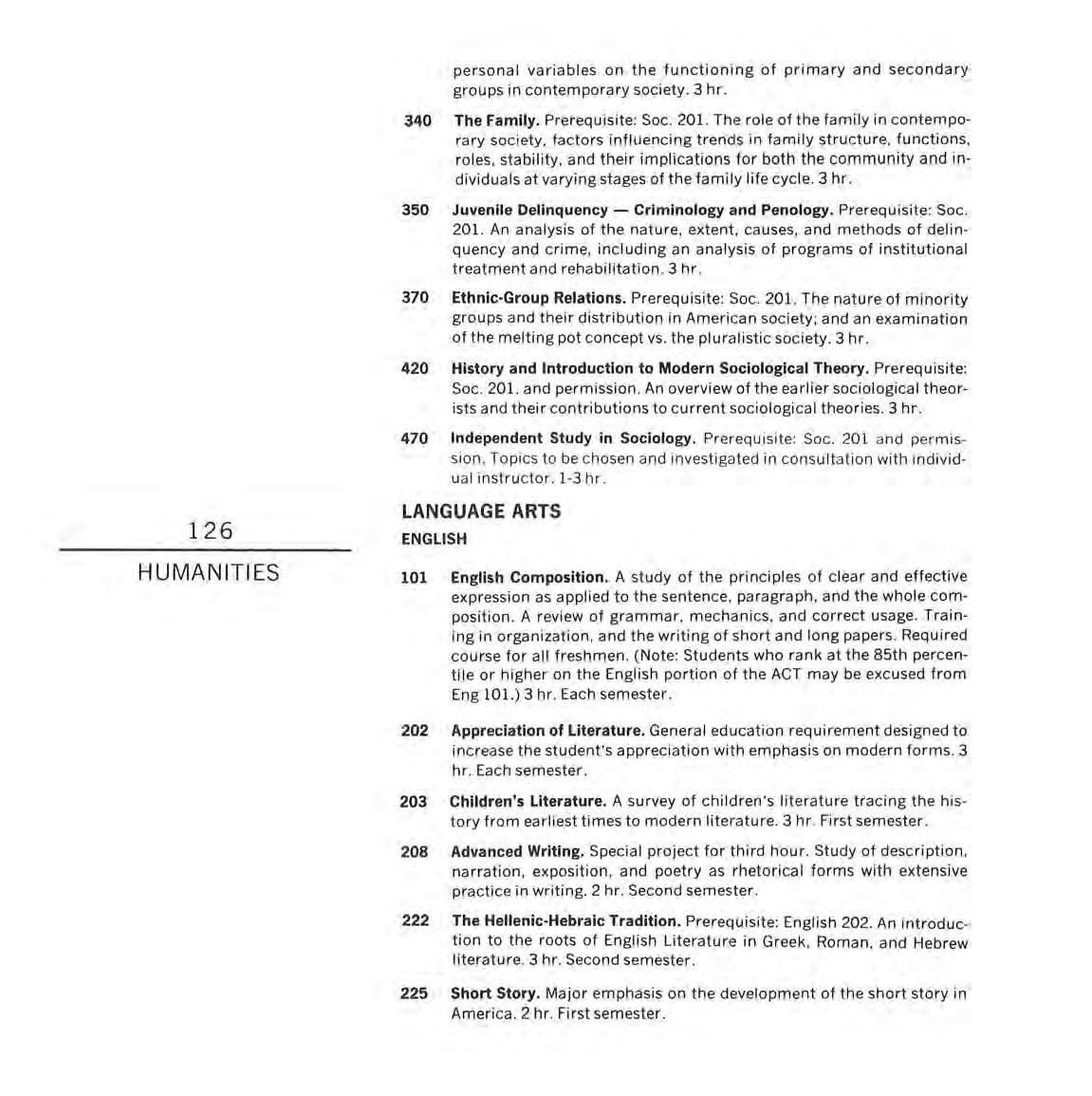
202 Appreciation of Literature. General education requirement designed to increase the student's appreciation with emphasis on modern forms. 3 hr. Each semester.
203 Children's Literature. A survey of children's literature tracing the history from earliest times to modern literature. 3 hr. First semester.
208 Advanced Writing. Special project for third hour. Study of description, narration, exposition, and poetry as rhetorical forms with extensive practice in writing . 2 hr. Second semester.
222 The Hellenic-Hebraic Tradition. Prerequisite: English 202. An introduction to the roots of English Literature in Greek, Roman , and Hebrew literature. 3 hr. Second semester.
225 Short Story. Major emphasis on the development of the short story in America. 2 hr. First semester
234
Beginning Journalism. Prerequisite: Ability to type. The fundamental principles of gathering and writing news work on The Pedagogian, the college newspaper. 3 hr. Each semester.
301 Traditional Grammar. Designed to provide students with a sound and comprehensive knowledge of traditional grammar: nomenclature, punctuation, sentence structure, and analysis. 2 hr.
302 English Composition. Prerequisite: Eng. 101 and junior standing. Further training in theme writing, with emphasis on organization and research, practice in the use of logic, and evidence to support generalizations. Required course for all juniors. 3 hr. Each semester.
305 Practicum in Composition. A study of the relationship of such factors as the study of grammar, reading level, and listening skills to a student"s ability to write effectively. 3 hr . Each semester.
306 Nebraska Literature . Prerequisite: co nsent of the department. An introduction to the works of Nebraska writers and literature about Nebraska. 2 hr. Second semester.
317 Chaucer. The fourteenth century as revealed by Chaucer a nd his contemporaries . 2 hr. First semester.
318 Neo-Classical Writers. The philosophy and esthetics of the eighteenth century as reflected in the major writers. 3 hr. Second semester.
321 Romantic Period. Characteristics of Romantic Period writers , as reflected in Pre-Romanti cs , such as Blake and Burns. Chief emphasis is on the major Romantic poets, with some attention to the novel a nd the Ballard Revival. 3 hr First semester.
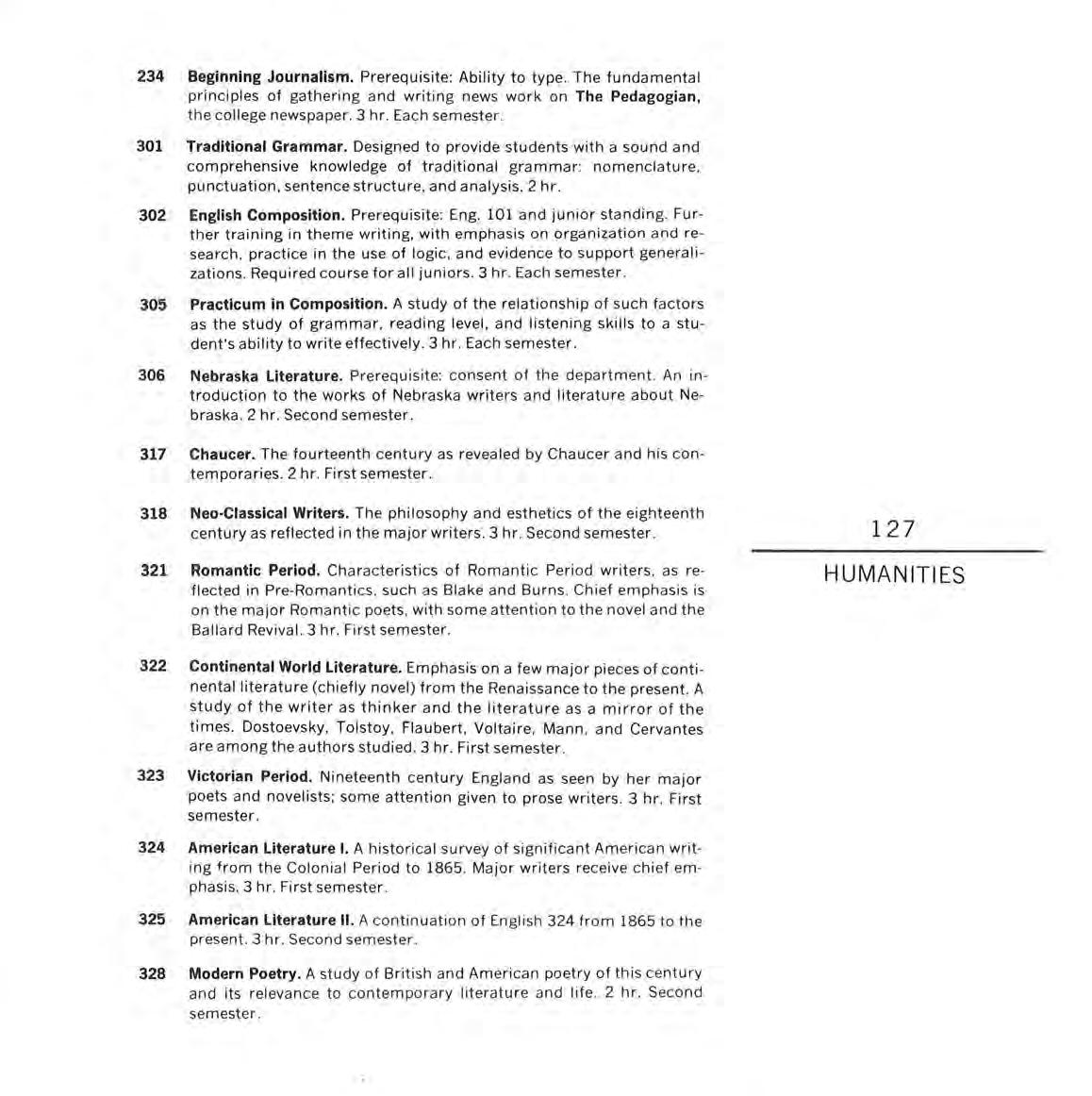
322 Continental World Literature. Emphasis on a few major pieces of continental literature (chiefly novel) from the Renaissance to the present. A study of the writer as thinker and the literature as a mirror of the times. Dostoevsky, Tolstoy, Flaubert, Voltaire, Mann, and Cervantes are among the authors studied. 3 hr. First semester.
323 Victorian Period. Nineteenth century England as seen by her major poets and novelists; some attention given to prose writers. 3 hr. First semester.
324 American Literature I. A historical survey of significant American writing from the Colonial Period to 1865. Major writers receive chief emphasis. 3 hr. First semester.
325 American Literature II. A co ntinuation of En g li sh 324 from 1865 to the present. 3 hr Second semester.
328 Modern Poetry. A study of British and American poetry of this century and its relevance to contemporary literature and life. 2 hr. Second semester.
405 Teaching English and Speech. This course is a study of the aims. objectives, and scope of English and speech in the curriculum. Resources such as textbooks. film lists, special equipment, records , c harts, and tests are examined and evaluated. Recent teaching techniques are explored. 2 hr. Second semester.
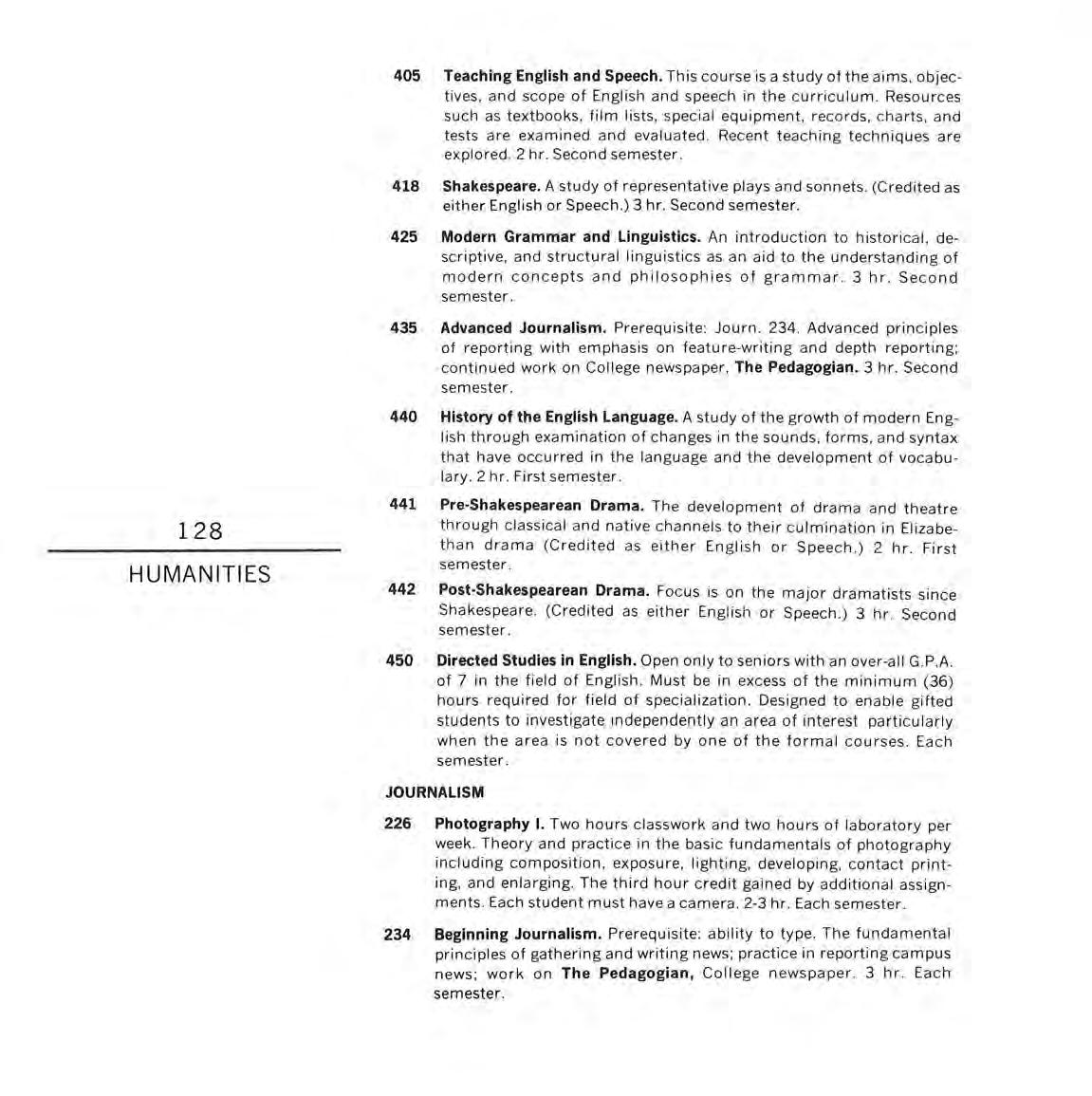
418 Shakespeare. A study of representative plays and sonnets. (Credited as either English or Speech.) 3 hr. Second semester.
425 Modern Grammar and Linguistics. An introduction to historical , descriptive, and structural linguistics as an aid to the understanding of modern concepts and philosophies of grammar. 3 hr. Second semester.
435 Advanced Journalism. Prerequisite: Journ. 234. Advanced principles of reporting with emphasis on feature-writing and depth reporting; continued work on College newspaper, The Pedagogian. 3 hr. Second semester.
440 History of the English Language. A study of the growth of modern English through examination of changes in the sounds, forms, and syntax that have occurred in the language and the development of vocabulary. 2 hr. First semester.
441 Pre-Shakespearean Drama. The development of drama and theatre through classical and native channels to their culmination in Elizabethan drama (Credited as either English or Speech.) 2 hr. First semester.
442 Post-Shakespearean Drama. Focus is on the major dramatists since Shakespeare. (Credited as either English or Speech.) 3 hr. Second semester.
450 Directed Studies in English. Open only to seniors with an over-all G.P.A. of 7 in the field of English. Must be in excess of the minimum (36) hours required for field of specialization. Designed to enable gifted students to investigate independently an area of interest particularly when the area is not covered by one of the formal courses. Each semester.
226 Photography I. Two hours classwork and two hours of laboratory per week. Theory and practice in the basic fundamentals of photography including composition, exposure, lighting, developing, contact printing, and enlarging. The third hour credit gained by additional assignments. Each student must have a camera. 2-3 hr. Each semester
234 Beginning Journalism. Prerequisite: ability to type. The fundamental principles of gathering and writing news; practice in reporting campus news; work on The Pedagogian, College newspaper. 3 hr. Each semester.
235 Newspaper Editing. Prerequisite: Journ. 234. Credit not to exceed a total of four hours An intensive co urse in journalisti c desk work that includes copy preparati o n, he ad lin e writ in g, page layo ut ; extensive work on The Pedagogian desk. 2 hr. Each semester.
237 Graphic Arts. Six hours laboratory. Study and pra c ti ce in basic processes of printing and al li ed industries, including work in l etterpress, silkscreen printin g, bookbinding, rubberstamp making, and goldleaf stamping. 3 hr. Each semester.
325 Photography II. Lens testing, infra -red photography, hi g h speed photography, portraiture, use of negative and positive co lor films, co lor printing, and o il co lorin g of prints. 2 -3 hours On demand.
329 Advertising. A st udy of adver ti se ments and media from thr ee v i ewpoints : man agement -marketing, co mmuni cat i ons-c r eat ivity , and co n sumer-cit iz en 2 hr On demand.
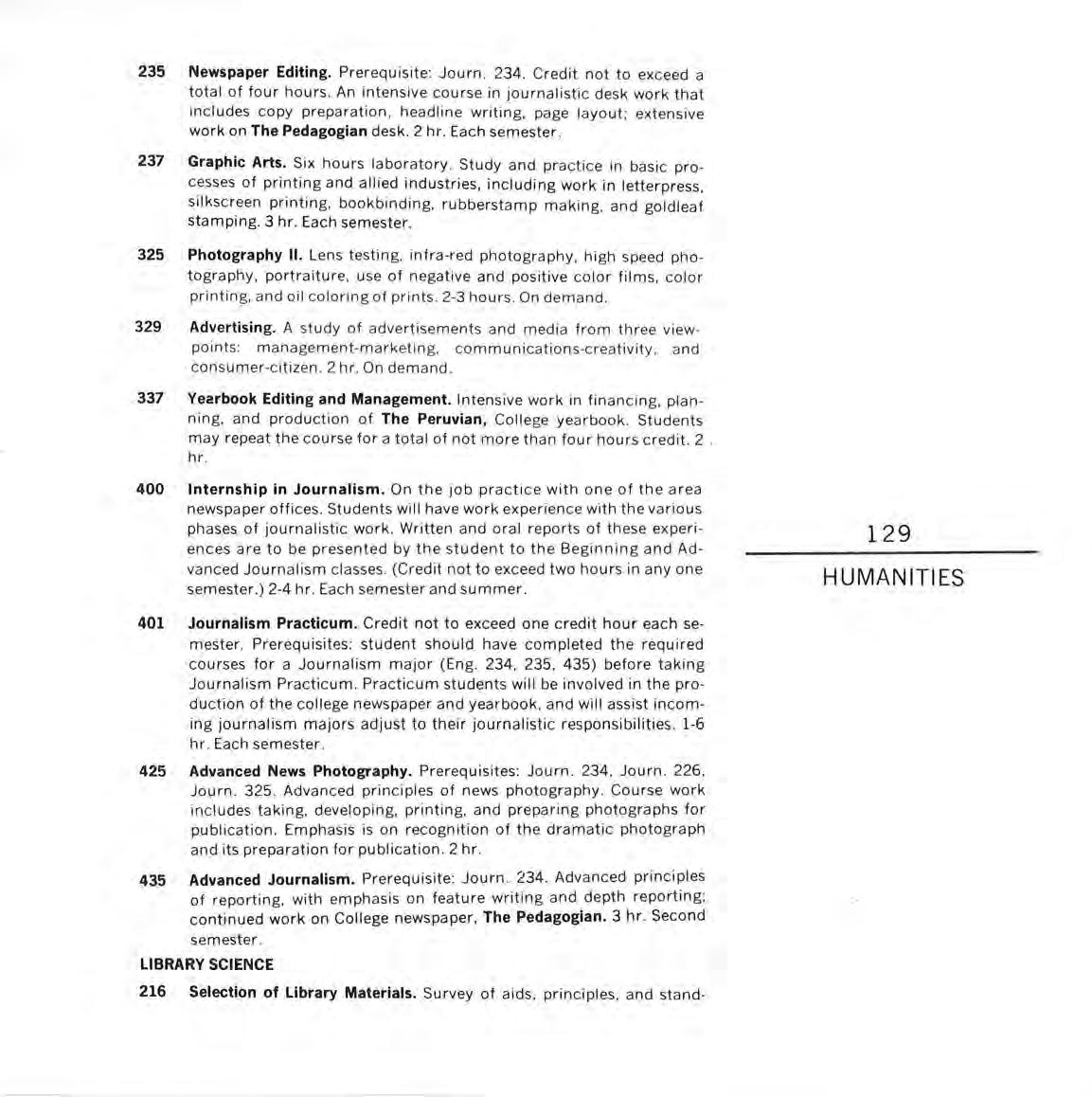
337 Yearbook Editing and Management. Intensive work in fin a n c ing , planning , and produ ction of The Peruvian, College yearbook. Students may repeat the course for a total of not more than four hours credit. 2 hr.
400 Internship in Journalism. On the job practice with one of the area newspaper offices. Students will have work experience with the various phases of journalisti c work Written and oral reports of these experiences are to be present ed by the student to the B egi nnin g and Advanced Journalism c lasses. (Credit not to exceed two hours in a ny one semester ) 2-4 hr. Each se mester and summer.
401 Journalism Practicum. Credit not to exceed one credit hour each semester . Prerequisites : student shou ld have comp l eted the required courses for a Journalism major (Eng. 234 , 235, 435) before taking Journalism Practicum. Practicum students will be involved in the production of the co ll ege newspaper and yearbook, and will assist incoming journalism majors adjust to their journalistic responsibilities. 1-6 hr Each semester.
425 Advanced News Photography. Prerequisites: Journ . 234 , Journ . 226 , Journ. 325. Advanced principles of news photography Course work includes taking , developing, printing, and preparing photographs for pub li cation . Emph as is is on recognition of th e dramatic photo g raph and its preparation for public a tion 2 hr.
435 Advanced Journalism. Prerequisite: Journ. 234. Ad va nced prin c iples of reporting, with emphasis on feature writing and depth reporting; continued work on College newspaper, The Pedagogian. 3 hr. Second semester.
216 Selection of Library Materials. Survey of aids, principles, and stand-
ards in selection of books tor a school library, culminating in a basic collection either elementary or secondary. 3 hr.
300 Reference. Principles and problems in organizing reference sources and materials, with special emphasis on the nature, preservation, availability, and reference use of primary and secondary sources. 3 hr.
315 Selection and Preparation of Non-Book Materials. The course will cover the selection, preparation, evaluation, organization , and utilization of non-print materials. 3 hr.
317 Library Reading Guidance. Principles and practices in reading characteristics of appropriate books for children of average or exceptional ability , individual and group guidance, development of reading interests. 3 hr.
100 Introduction to Mass Communications. The nature, function, and responsibilities of communications agencies, including newspapers, radio and te l evision, film, and advertising; the services that the mass media perform for society and the role of the media in censorship, persuasion, and propaganda. 2 hr.
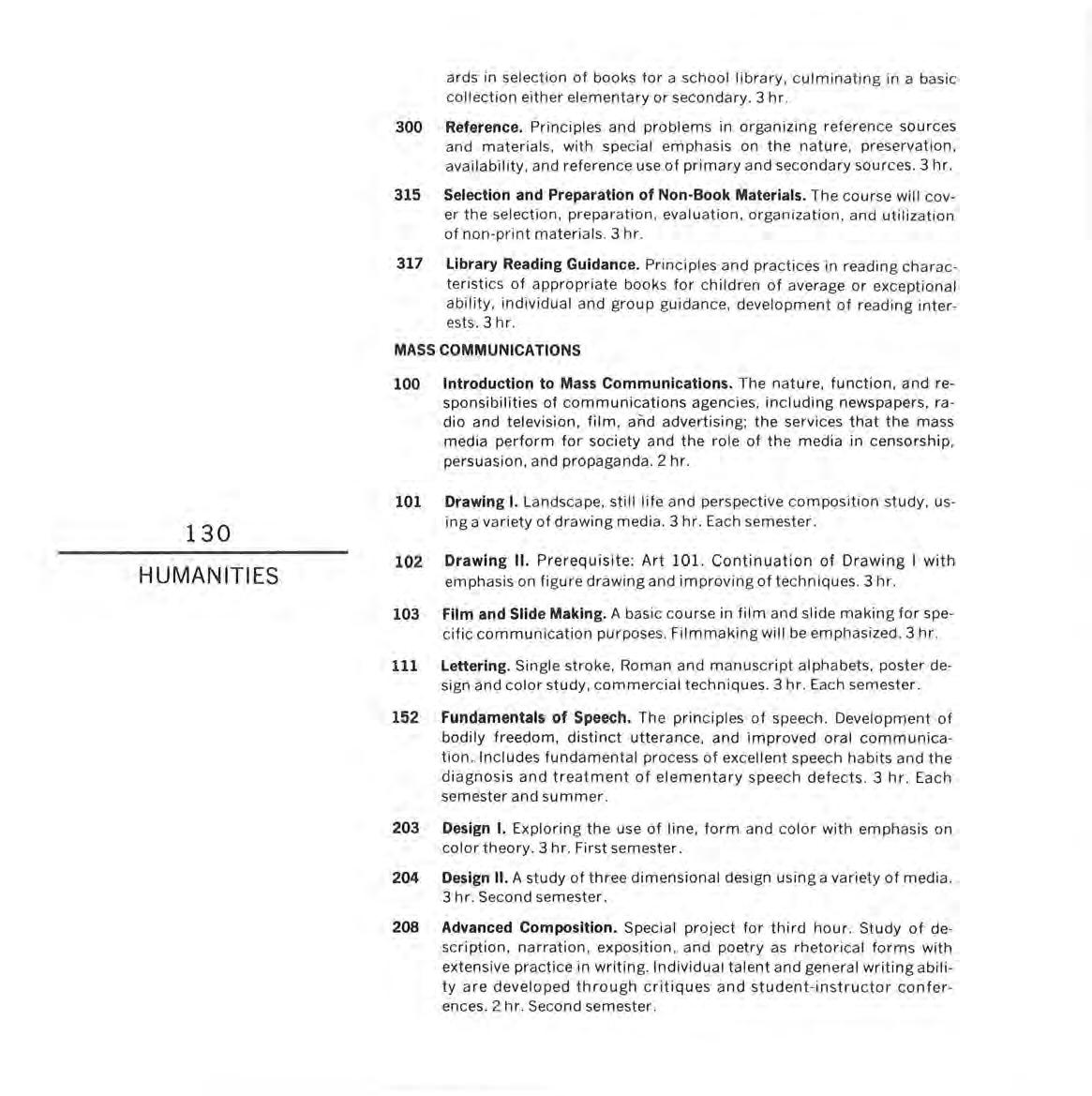
101 Drawing I. Landscape, still life and perspective composition study, using a variety of drawing media. 3 hr. Each semester.
102 Drawing II. Prerequisite: Art 101. Continuation of Drawing I with emphasis on figure drawing and improving of techniques . 3 hr.
103 Film and Slide Making. A basic course in film and slide making for specific communication purposes Filmmaking will be emphasized 3 hr.
111 Lettering. Single stroke, Roman and manuscript alphabets, poster design and color study, commercial techniques. 3 hr. Each semester.
152 Fundamentals of Speech. The principles of speech. Developl'T)ent of bodily freedom, distinct utterance, and improved oral communication . Includes fundamental process of excellent speech habits and the diagnosis and treatment of elementary speech defects. 3 hr. Each semester and summer.
203 Design I. Exploring the use of line , form and color with emphasis on color theory 3 hr. First semester.
204 Design II. A study of three dimensional design using a variety of media. 3 hr. Second semester.
208 Advanced Composition. Special project for third hour. Study of description, narration, exposition, and poetry as rhetorical forms with extensive practice in writing. Individual talent and general writing ability are developed through critiques and student-instructor conferences. 2 hr Second semester.
210 Water Color Painting. Prerequisites: Art 101 , 102 , and 203. Compositions in color, using opaque and transparent water color. 3 hr. Second semester
226 Photography I. Two hours classwork and two hours of laboratory per week. Tneory and practice in the basic fundam e ntals of photography including composition, exposure, lighting, developing, contact printing, and enlarging. The third hour credit gained by additional assignments . Ea c h student must have a camera. 2-3 hr. Each semester.
234 Beginning Journalism. Prerequisite: ability to type. The fundamental principles of gathering and writing news; practice in reportin g campus news; work on The Pedagogian, College newspaper. 3 hr. Each semester.
235 Newspaper Editing. Prerequisite: Journ. 234. Credit not to exceed a total of four hours. An intensive course in journalistic desk work that includes copy preparation, headline writing, page layout; extensive work on Pedagogian desk. 2 hr. Each semester.
237 Graphic Arts. Six hours laboratory. Study and practice in basic processes of printing and allied industries, including work in letterpres s, silkscreen printing, bookbinding , rubberstamp making , and goldleaf stamping. Also beneficial for those interested in journalism. 3 hr. Each semester.
254 Public Speaking. Training in effective methods of adapting composition and delivery to various types of audiences. A study is made of the forms of address, impelling motives , speech ends, speech organization, composition, and delivery Practice is given in gathering, choosing, working and mastering speech materials. Direct and purposeful conversational delivery for the purpose of communication is stressed. 3 hr . Each semester.
260 Introduction to Radio and Television. An introduction to radio and television as communication media. Introduction to modern facilities and practices. Laboratory projects related to both media. 3 hr. Second semester.
300 Communications Law. The laws regarding media responsibility, placing the legal problems of media work in a practical context; libel, contempt, constitutional guarantees, access to public records , the invasion of privacy, criticism, a nd copyright. 3 hr.
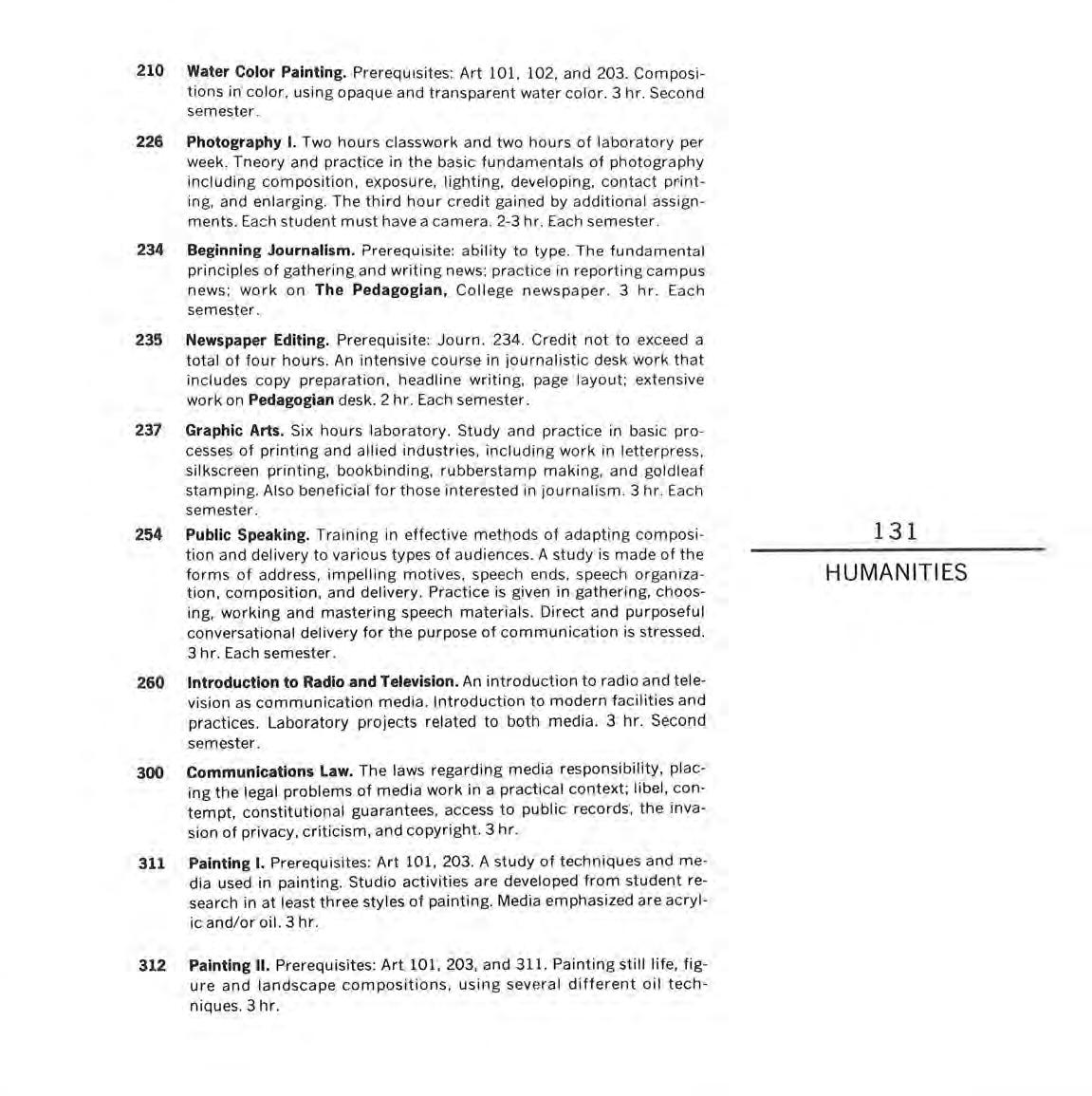
311 Painting I. Prerequisites: Art 101, 203. A study of techniques and media used in painting. Studio activities are developed from student research in at least three styles of painting. Media emphasized are acrylic and/or oil. 3 hr .
31Z Painting II. Prerequisites: Art 101, 203, and 311. Painting still life, figure and landscape compositions, using several different oil techniques . 3 hr.
325 Photography II. Lens testing infra-red photogr a phy , high speed photography , portraiture. use of negative and positive co lor films co l or printing, and oil co l or in g of prints. 2-3 hr
329 Advertising. A study of the planning and preparation of advertisements. the selection of appropriate advertisin g media and agencies. and the ro l e of advertising in the total marketing program. 2 hr. On demand.
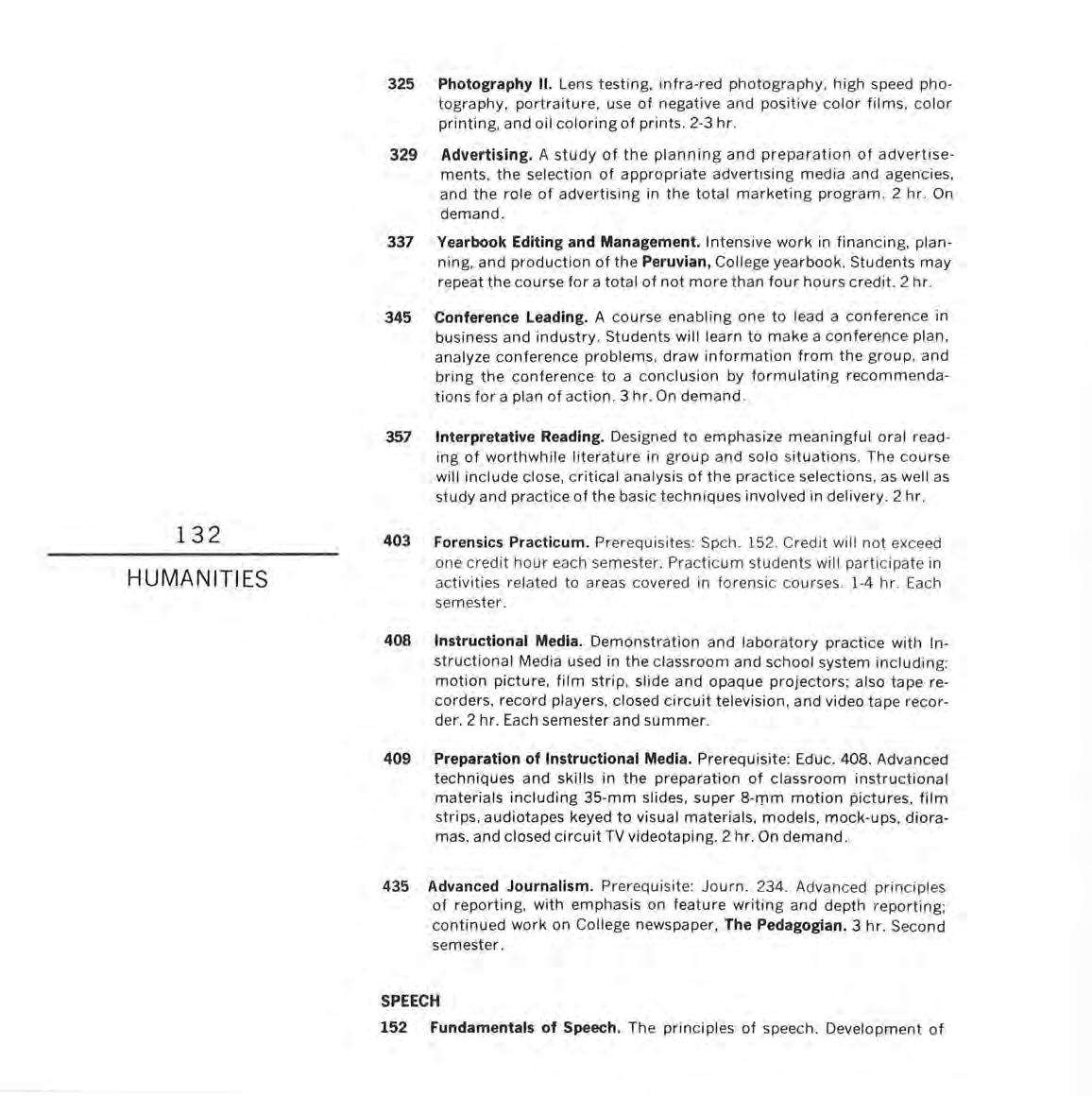
337 Yearbook Editing and Management. Intensiv e work in financing, planning, and production of the Peruvian, College yearbook. Students may repeat the course for a total of not more than four hours cred it. 2 hr.
345 Conference Leading. A course enab lin g one to lead a conference in business and industry. Students wil l learn to make a conference plan analyze conference problems. draw information from the group, and bring the conference to a conc lu sion by formulating recomm e ndations for a plan of action. 3 hr. On demand.
357 Interpretative Reading. De s igned to emphasize meaningful oral reading of worthwhi l e lit erature in group and solo s ituations. The course will include close. critical analysis of the practice se l ections. as well as study and practice of the basic techniques involved in delivery 2 hr.
403 Forensics Practicum. Prerequisites: Spe h. 152 Credit wil l n ot exceed one credit hour each semester. Practicum st ud ents w ill participate in ac tivities related to areas covered in forensic courses. 1-4 hr. Each semester.
408 Instructional Media. Demonstration and labor atory practice with Instructional Media used in the classroom and schoo l system including: motion picture. film strip, slide and opaque projectors; a l so tape recorders. record players, closed circuit television. and video tape recorder. 2 hr. Each semester and summer.
409 Preparation of Instructional Media. Prerequisite: Educ. 408. Advanced techniques and skills in the preparation of classroom instructional materials including 35-mm slides. super 8-fTlm motion pictures, film strips, audiotapes keyed to visual materials, models, mock-ups, dioramas . and c los ed circuit TV videotaping. 2 hr. On demand.
435 Advanced Journalism. Prerequisite: Journ. 234. Advanced principles of reporting, with emphasis on feature writing and depth re porting ; continued work on Co lle ge newspaper , The Pedagogian. 3 hr Second semester.
152 Fundamentals of Speech. The principles of speech. Development of
bodily freedom, distinct utterance, and improved oral communication. Includes fundamental process of speech correction and development. with emphasis on the development of excellent speech habits and the diagnosis and treatment of elementary speech defects. 3 hr. Each semester and summer.
254 Public Speaking. Training in effective methods of adapting composition and delivery to various types of audiences. A study is made of the forms of address, impelling motives, speech ends, speech organization, composition, and delivery. Practice is given in gathering, choosing, working and mastering speech materials. 3 hr. Each semester.
255 Beginning Acting. A study ;md application of principles of dramatic interpretation with particular emphasis on personality development; the development of creative imagination; analyzing and playing a part; an intensive training in pantomime, posture, movement, stage business, body control, vocal control , dialogue and characterization. 3 hr. First semester.
258 Debate. Basic theory and practice of argumentation, tne conventions of debate, parliamentary procedure, and the analysis of questions. 3 hr. Second semester.
260 Introduction to Radio and Television. An introduction to radio and television as communication media. Introduction to modern facilities and practices. Laboratory projects related to both media. 3 hr. Second semester.
300 Summer Theatre Workshop. Practical training in all aspects of theatre production: acting, set design, lighting, costuming, make-up, improvisation, music, and dancing. Public performance every weekend. Offered both sessions , no prerequisites, may be taken either or both sessions for a total of six hours credit. Three hours credit per session.
350 Contest Speech. 1 hr. Course designed to prepare students to coach speech contestants, jud ge contestants , and manage contests.
353 Speech Correction and Development. The physiological factors_ involved in oral communication, the genetic basis of speech and development of excellent speech habits in the individual. Diagnosis and treatment of speech defects. 3 hr. Each semester.
355 Stage Craft. A course for the director of dramatics in schools and communities. It answers the fundamental questions pertaining to play selection, casting, directing, steps in rehearsal, scenery, lighting, costume, make-up, and business organization. 3 hr. First semester.
357 Interpretative Reading. Designed to emphasize meaningful oral reading of worthwhile literature in group and solo situations. The course will include close, critical analysis of the practice selections, as well as study and practice of the basic techniques involved in delivery. 2 hr. First semester.
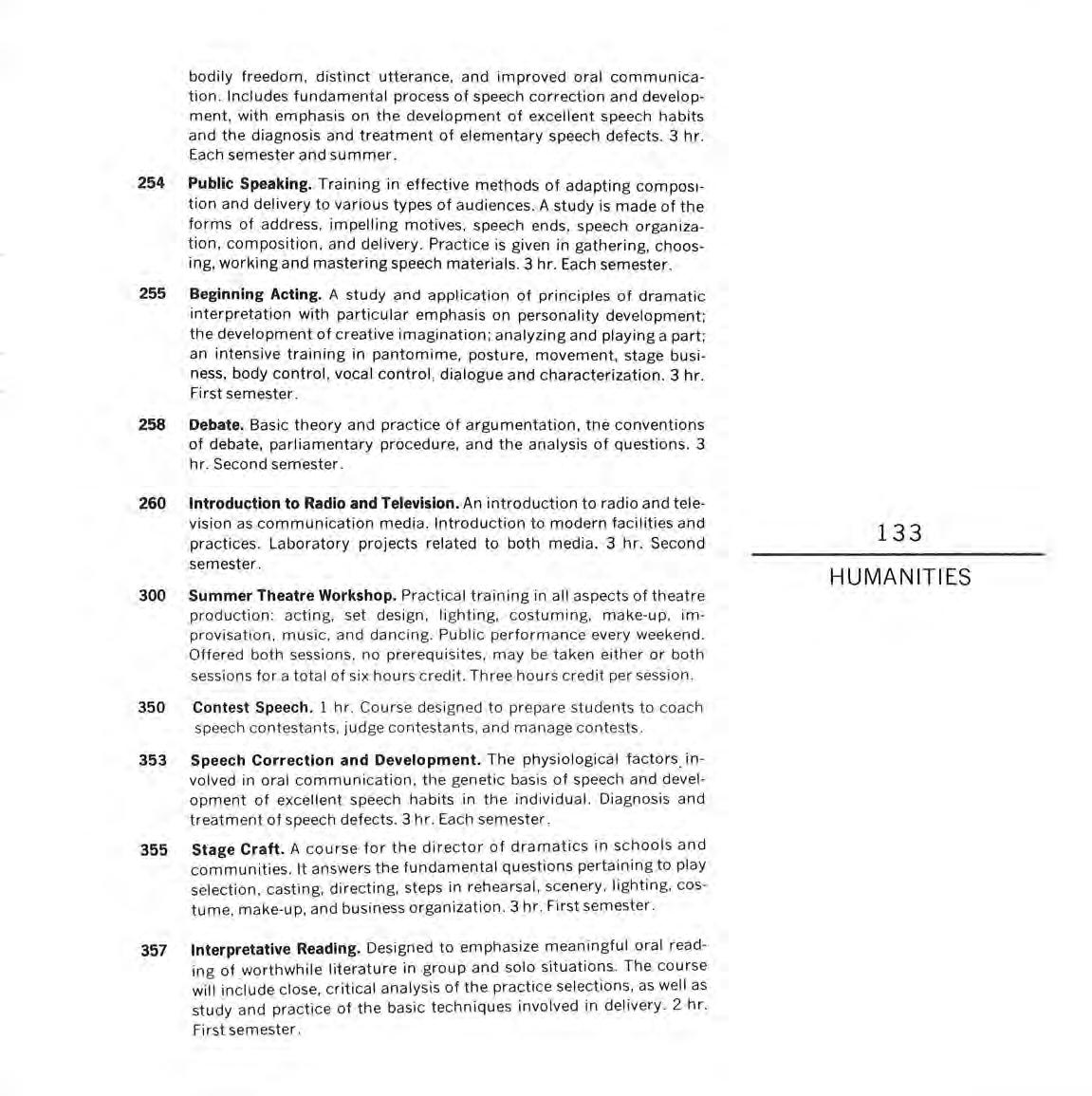
359 Advanced Debate. Prerequisit e: Speech 258. Advan ce d forensic theory and practice; psychology of persuasion ; rhetoric of argumentation; the construction of briefs; analysis of evidence; and judging debate. 3 hr. First semester.
360 Play Directing. Prerequisite: Speech 355 A study and application of the theories of play direction. 3 hr. Second semester.
362 Psychology of Speech. An investigation into the process of speech as a form of communication Attention will be given to the psychological field, socionomy, general semant i cs, and group dynamics. 3 hr. Second semester
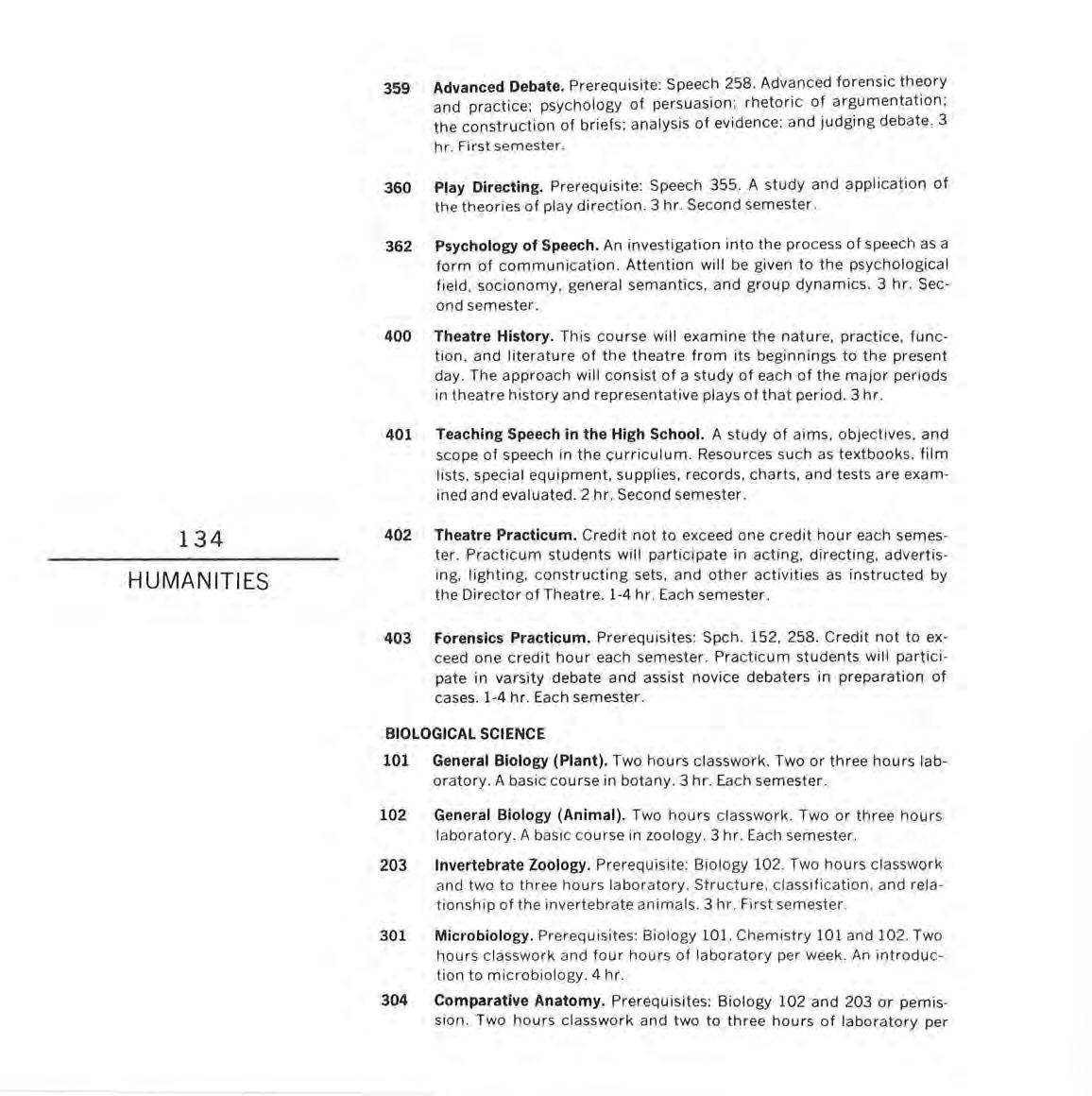
400 Theatre History. This course wi ll examine the nature, practice , function , and liter ature of the theatre from its beginnings to the present d ay . The approach wi ll consist of a study of each of the major periods in theatre history and representative plays of that period. 3 hr.
401 Teaching Speech in the High School . A study of ai ms, objective s, and scope of speech in the curriculum. Resources such as textbook s, film li sts, special eq uipm ent, supplies, records, charts, and tests are examined and evaluated 2 hr. Second semester
402 Theatre Practicum. Credit not to exceed one credit hour each semester. Practicum students will participate in act in g, directing , advertising, lighting , construct in g sets, and other activities as instruct ed by the Director of Theatre. 1-4 hr. Each semester.
403 Forensics Practicum. Prerequisites: Speh 152, 258. Credit not to exceed one credit hour each semester. Practicum students wi ll participate in varsity debate and assist novice debaters in preparation of cases. 1-4 hr. Each semester
101 General Biology (Plant). Two hours c l asswork. Two or three hours laboratory. A basic co urse in botany. 3 hr. Each semester.
102 General Biology (Animal). Two hours c l asswork. Two or three hour s laboratory A ba s ic course in zoology 3 hr. Each semester.
203 Invertebrate Zoology. Prerequisite: Biology 102 . Two hours c l asswork and two to three hours labor atory. Structure, c l assi fication , a nd relationship of the in ve rtebrate an imal s. 3 hr. Fir st semester.
301 Microbiology. Prerequisites: Biology 101, Chemistry 101 and 102 Two hours classwork a nd four hours of laboratory per week An introdu ction to microbiology. 4 hr.
304 Comparative Anatomy. Prerequisites: Biology 102 and 203 or pemission. Two hours classwork and two to three hours of l aboratory per
week. The anatomy of the shark, salamander, and cat. 3 hr. Second semester.
305 Human Anatomy. A study of the digestive tracts, nervous , circulatory , skeletal, and respiratory systems 1 hr
306 Morphology of the Lower Plants. Prerequisite: Biology 101. Two hours classwork , two to three hours laboratory. Structure, anatomy and form of the lower plants, and their effects on man. 3 hr. First semester.
307 Morphology of the Seed Plants . Prerequisites: Biology 101 and 306. Two hours classwork, two to three hours laboratory. Form and structure of the seed plants and their ec onomic value. 3 hr Second semester.
310 Biological Readings. Prerequisite: 12 hours of science. Work is done under the guidance of the instructor through a series of written reports and conferences . May not be used to meet science requirements. 1-3 hr. By arrangement only
311 . Evolutionary Theory. A course designed to acquaint the student with the various theories regarding evolution. 1-2 hr.
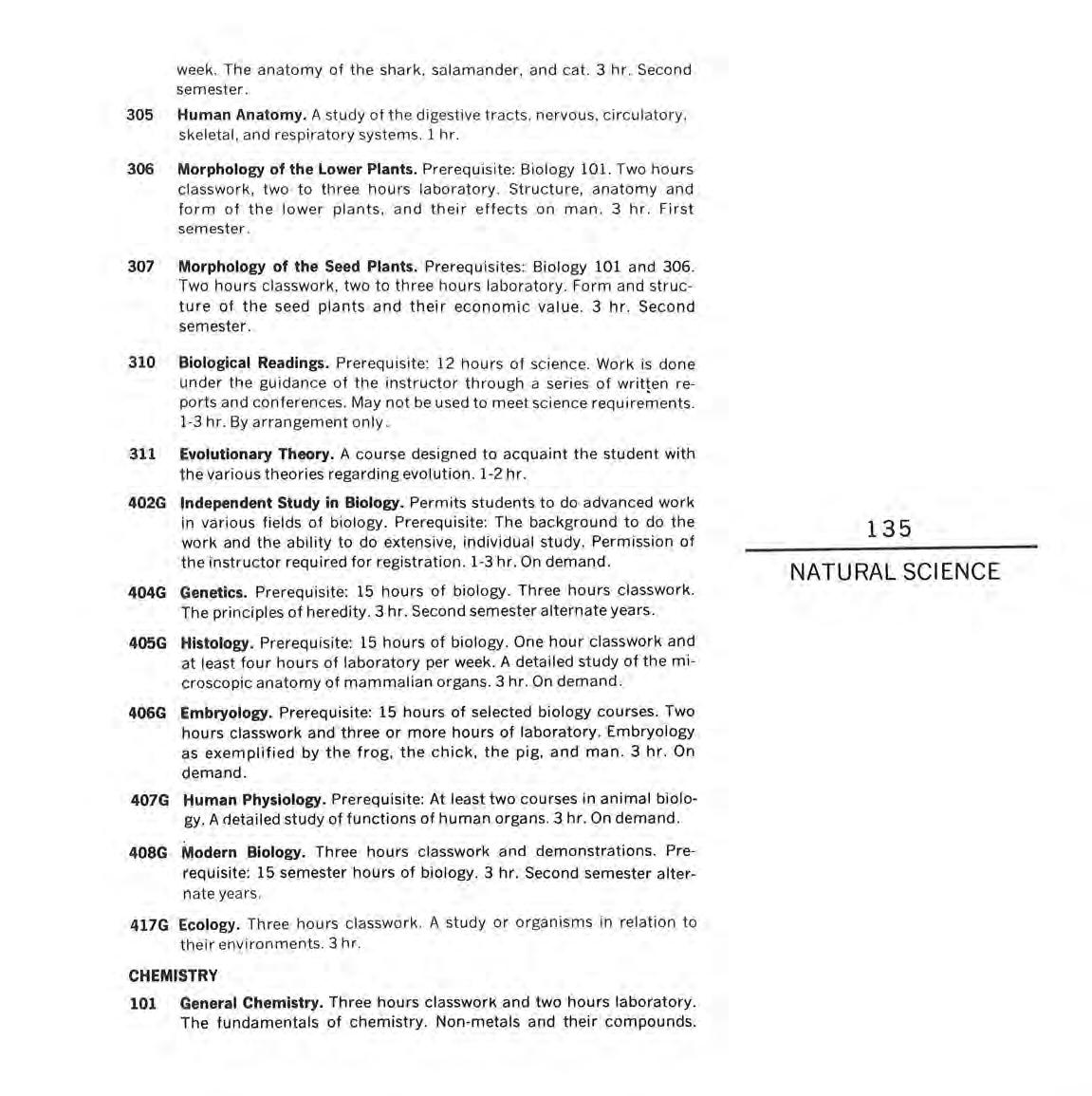
402G Independent Study in Biology. Permits students to do advanced work in various fields of biology. Prerequisite: The background to do the work and the ability to do extensive, individual study. Permission of the instructor required for registration . 1-3 hr. On demand .
404G Genetics. Prerequisite : 15 hours of biology . Three hours classwork. The principles of heredity 3 hr. Second semester alternate years.
405G Histology. Prerequisite: 15 hours of biology One hour classwork and at least four hours of laboratory per week. A detailed study of the microscopic anatomy of mammalian organs. 3 hr . On demand .
406G Embryology. Prerequisite: 15 hours of selected biology courses. Two hours classwork and three or more hours of l aboratory Embryology as exemplified by the frog, the chick, the pig, and man. 3 hr. On demand.
407G Human Physiology. Prerequisite: At least two courses in animal biology. A detailed study of functions of human organs. 3 hr. On demand.
408G Modern Biology. Three hours c la sswork and demonstrations. Prerequisite: 15 semester hours of biology . 3 hr. Second semester alternate years.
417G Ecology. Three hours classwork. A study or organ isms in relation to their environments. 3 hr.
101 General Chemistry. Three hours classwork and two hours laboratory. The fundamentals of chemistry. Non-metals and their compounds .
For those who have not had high school chemistry 4 hr First semester .
102 Gene ra l Chemistry. Prerequisite: Chemistry 101. Three hours classwork , two hours laboratory Application of the fundamentals of c hemistry , metals , and their compounds, and an introduction to organic and analytical chemistry. 4 hr . Second semester.
205 Principles of Qualitative Analy sis. Prer equisite: Chemistry 10 2. Two hours classwork, six hours laboratory . Principles of qualitative analysis and their application in the laboratory . 4 hr . First semester , alternate years .
206 Principle s of Qu a ntitative Analy sis . Prerequisite : Chemistry 205 Two hours classwork, six hours laboratory. Pr inciples of quantitative analysis and their application in the laboratory 4 hr Second semester, alternat e y ea rs .
303 Organic Chemi stry. Prerequisite : Chemistry 102. Three hours classwork, three hours laboratory . Compounds of the aliphatic series . 4 hr . First semester , alternate years
304 Organic Chemistry. Prer equisite : Chemistry 303 . Three hours of c lassw o rk , three hours of la b o ratory . A continuation of Chemistry 303 with fur t her intensive study of aromatic series , dye s, hormones, vitamins, and dru g s 4 hr. Second seme ster , alternate ye a rs
305 Organic Preparation s. w,tn the consent of the instructor , the student m a y take ex tra labor a tory work in the synthesis or org a nic c ompo unds . 2 hr . Sec ond se m es t er , a lt ern at e yea r s.
308 Biochemistry. Pre r equi s it es : Che m. 101 , 10 2. Thr ee ho ur s c l asswo rk . T wo hour s l a bo r at o r y A pr es ent at i o n o n th e phy si o l og ica l re act i o n s o f a ll fo o d el ement s, en zy m es , di ges ti o n , a n d m et a bo li s m . 4 hr s .
310 Hi story and Literature of Chemistry. Prerequisite : 13 hours of approved chemistry. The work to b e done under guidance of the instructor through a series of conferences and reports. 1-4 h r . By arrangement
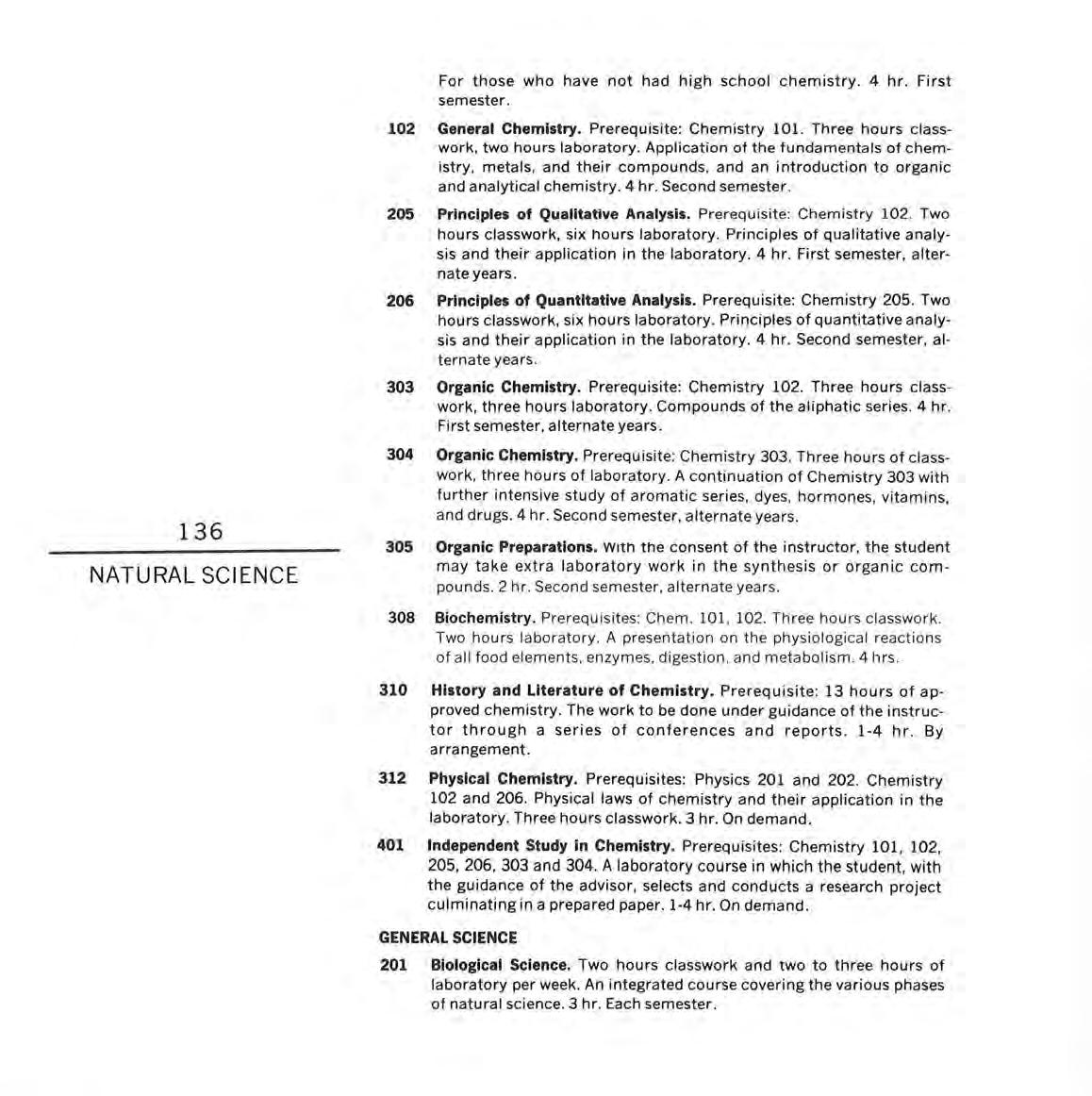
312 Phy sical Ch emistry. Prerequisites : Physics 20 1 and 202 . Chemistry 102 and 206 . Physical laws of chemistry and their application in the laboratory. Three hours classwork 3 hr On demand
401 Independent Study in Chemistry. Prerequisites : Chemistry 101 , 102 , 205, 206, 303 and 304 A laboratory course in which the student, with the guidance of the advisor, selects an d conducts a research project culminating in a prepared paper . 1-4 hr. On dem a nd .
201 Biological Sci ence. Two hours cl asswork and two to three hours of laboratory per week. An integrated course covering the various phases of natural science . 3 hr. Each semester .
202 Physical Science. Two hours of classwork and two or three hours of laboratory per week An integrated course covering the various phases of physical science. 3 hr Each semester
205 The Principles of Biological Science. An integrated course specifically designed for the non-science student, covering the various phases of man's biotic world, by a variety of learning experiences in demonstrations, experimentation and visual aids. Does not apply on the major or support in biology. 3 hr. Each semester.
206 The Principles of Physical Science. An integrated course specifically designed for the non-science student, covering the various phases of man's physical and chemical world Experiences in a variety of learning situations, such as demonstrations, experiments , instructional television and other visual aids. Does not apply on the major or support in physical science.
301 Earth Science. Prerequisite : Junior or senior standing. 6 hours of laboratory science. A course dealing with the physical aspects of our environment, including astronomy, climatology, meteorology, geology, ana oceanography 3 hr.
430G Environmental Science. A workshop designed to provide an understanding of the ecological problems confronting modern man and proposed techniques for their solution . 3 hr.
476 Methods of Teaching Science and Mathematics. First and second semester. Objectives, content and methods of teaching science and mathematics in the high school. 2 hr.
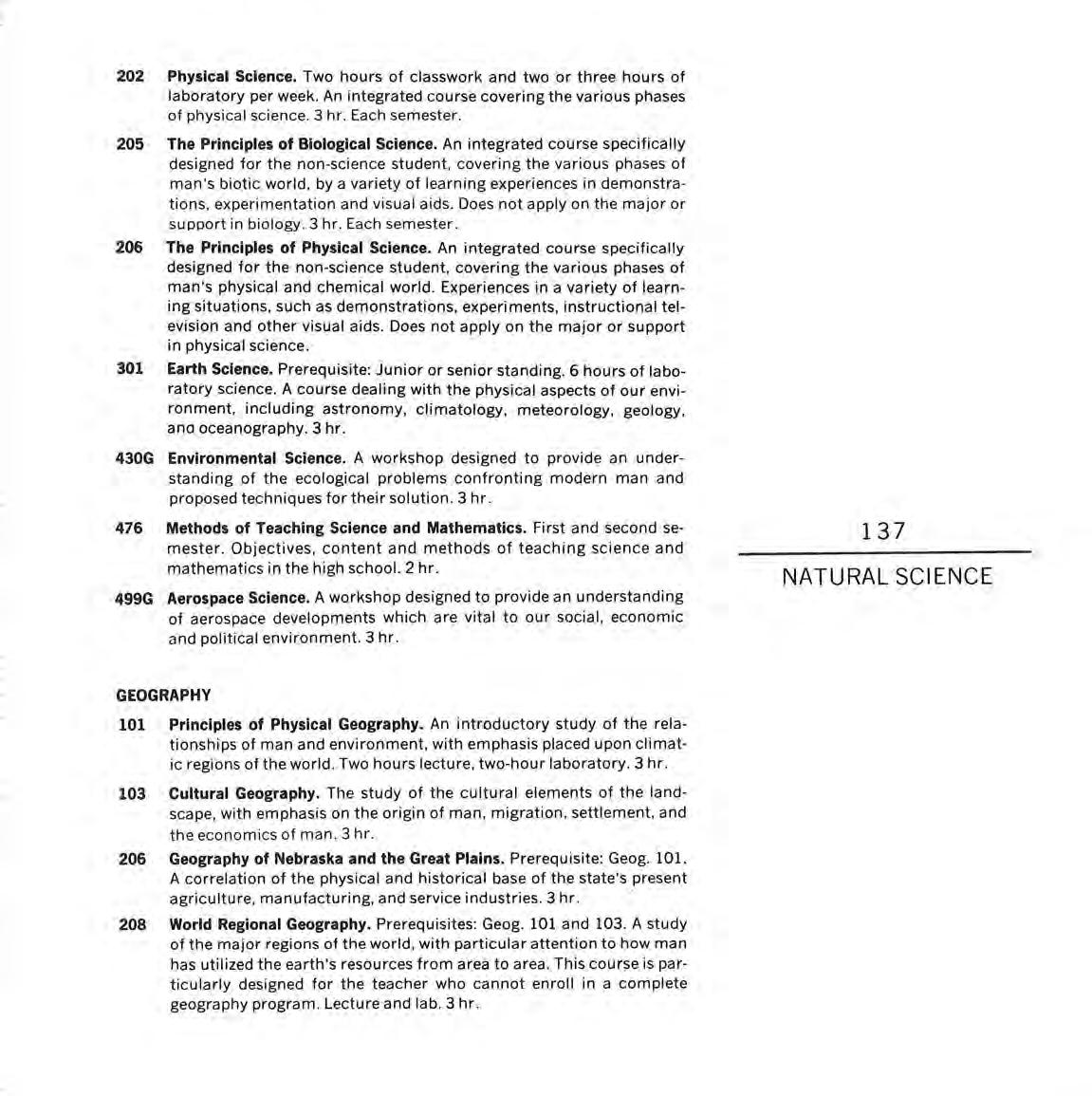
499G Aerospace Science. A workshop designed to provide an understanding of aerospace developments which are vital to our social, economic and political environment. 3 hr.
101 Principles of Physical Geography. An introductory study of the relationships of man and environment, with emphasis placed upon climatic regions of the world. Two hours lecture, two-hour laboratory. 3 hr.
103 Cultural Geography. The study of the cultural elements of the landscape, with emphasis on the origin of man, migration. settlement, and the economics of man. 3 hr.
206 Geography of Nebraska and the Great Plains. Prerequisite: Geog. 101. A correlation of the physical and historical base of the state's present agriculture, manufacturing, and service industries. 3 hr. '
208 World Regional Geography. Prerequisites: Geog. 101 and 103. A study of the major regions of the world, with particular attention to how man has utilized the earth's resources from area to area. This course is particularly designed for the teacher who cannot enroll in a complete geography program. Lecture and lab. 3 hr.
300 Geography of Asia . Prerequisite: Geog. 101. A regional study of the major co untries of Asia, with emphasis upon relief, climate , resources, government, and industrial development. 3 hr.
305 Economic Geography. Prerequisites: Geog 101 and 103. An analys i s of world land r esour c es, a gricu ltur al products , forest and marine resources, basic mining industries, manufacturing, trade patterns, and transportation routes. 3 hr
310 Geography of Africa. Prerequisite: Geog. 101. A geographical analysis of the continent. Emphasis is placed upon recent spirit of nationalism and the economic and physical base of selected nations. 3 hr.
311 Urban Geography. Study of the origin, distribution , intern a l structure and functions of urban developments, with emphasis on location features of economic and c ultural phenomena. 3 hr .
312 Geography of Anglo-America. Prerequisite: Geog. 101 or senior standing. A study of the United States and Canada by natural re g ions. In each case an evaluation of the physical and economic base will be made in the light of present economic development. 3 hr.
313 Geography of South America. Prerequisite : Geog. 101. The geographic regions of South America analyzed in their natural, political a nd economic settings. The economic relations between South America and the United States. 3 hr. First semester
314 Reading in Geography. Prerequisite , 12 hours of geography. Work is done under the guidance of the instructor through a series of written reports and con ferences. 1-3 hr By arrangement only.
326 Conservation of Natural Resources. An evaluation of soil, water, mineral , forestry, fish, air, and recreation resources in order to develop an appreciation of their importance and the seriousness of the problem. 3 hr.
403G Special Problems and Techniques in Geography. Designed to provide an opportunity for students to experiment with and le arn new techniques in geography instruction based upon the individual needs and interest of each student. For teacher education cand idate s. 2 hr. Second semester.
404G History and Philosophy of Geography. Prerequisites: Geog. 101 and 103 A study of the basic philosophies of geography including the study of the history of geographic thought from ancient to modern times. 2 hr
411G Field Geography. Prerequisite: Geog. 101. An intensive course of training in the geographic field m et hods and in the direct application of geographic principles to important problems in selected districts. Two hours lecture , laboratory by arrangement. 2 hr.
470 Independent Study.in Geography. Prerequisite: junior or senior stand-
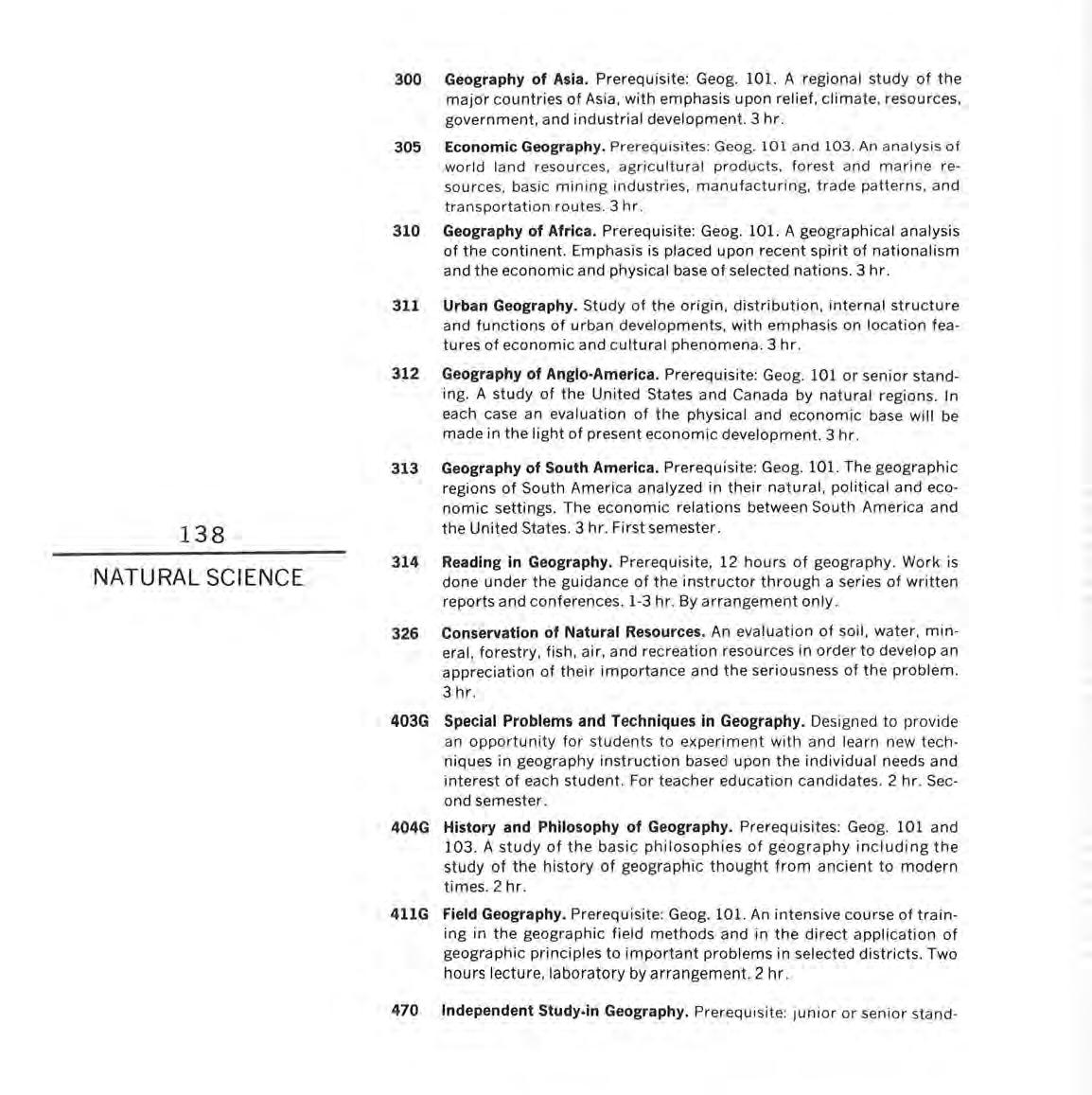
ing, with adequate preparation in the field and the instructor's permi ssion. Individual instruction in the techniques of geographic research, with either extensive readings and reports or a term paper required. Highly recommended for students contemplating graduate work in geography. 1 to 3 hr.
494 Current Topics in Geography. A geographic study of current topics generally involving such subjects as pollution, space geography, agricultural geography, geography of transportation , geography of primary produ c tion , and rocks and minerals These courses to be given on demand, but only one topic 494 to be given each semester . 3 hr.
495 Regional Topics in Geography. A study of world areas by physical division, with emphasis on the interrelationship between cultural and physical features of each region Course topics selected from the following regi0ns: Middle East, Southeast Asia , U.S.S.R., Asia, Middle America, South America, Australia, and the Islands, Eastern Europe and Western Europe. Only one topic course 495 offered each semester. 3 hr.
499G Political Geography. Prerequisites : Geog . 101 and 102. Geography as a factor in the differentiation of political phenomena in various parts of the world . The modern state in relation to its environment and the interrelationship of nations as a result of their geographical strengths and weaknesses 3 hr.
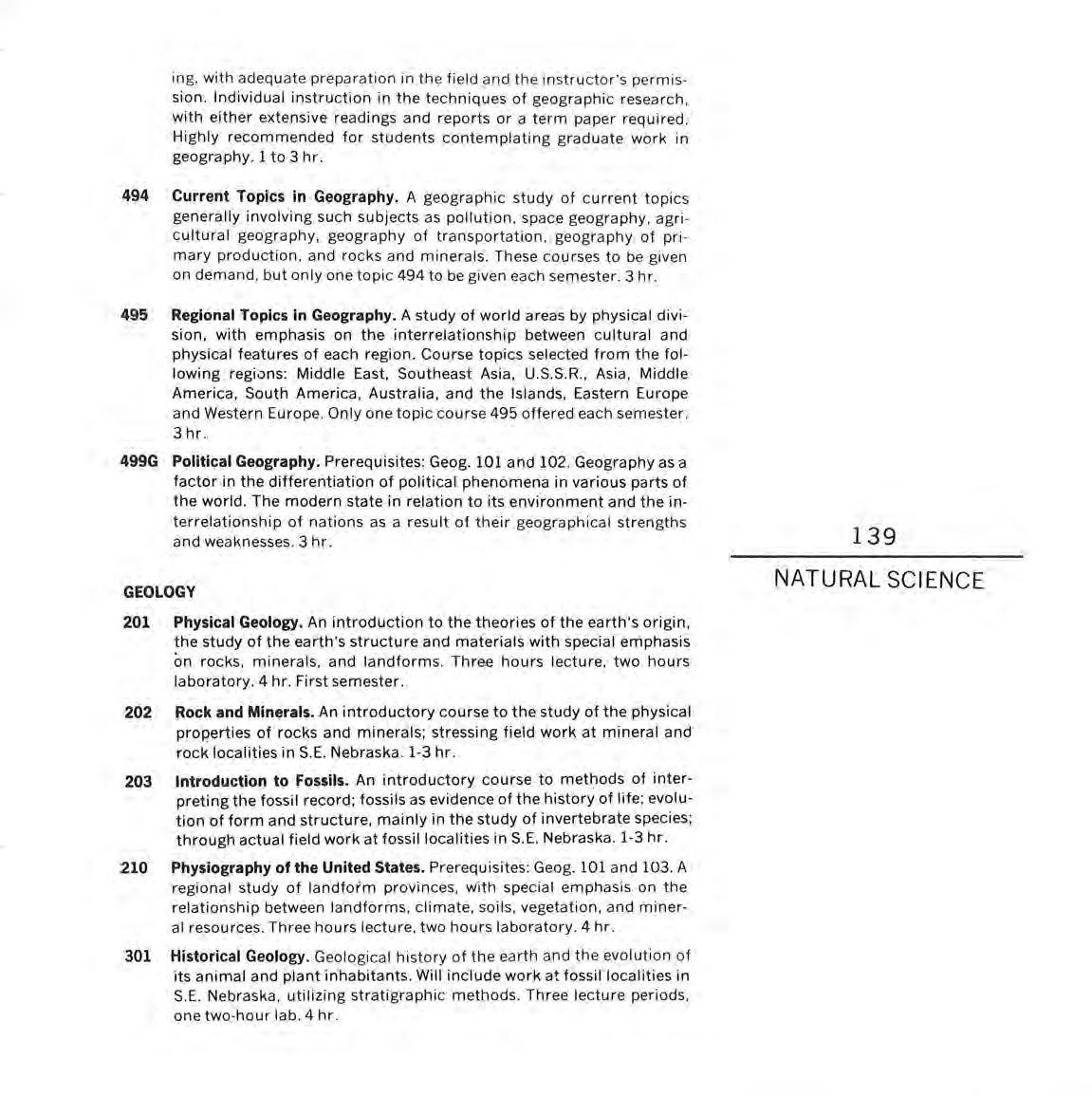
201 Physical Geology . An introduction to the theories of the earth's origin, the study of the earth ' s structure and materials with special emphasis on rocks, minerals, and landforms. Three hours lecture, two hours laboratory. 4 hr. First semester.
202 Rock and Minerals. An introductory course to the study of the physical properties of rocks and minerals; stressing field work at mineral and rock localities in S.E. Nebraska. 1-3 hr.
203 Introduction to Fossils. An introductory course to methods of interpreting the fossil record; fossils as evidence of the history of life ; evolution of form and structure, mainly in the study of invertebrate species; through actual field work at fossil localities in S.E Nebraska. 1-3 hr
210 Physiography of the United States. Prerequisites: Geog 101 and 103. A regional study of landfor'm provinces, with special emphasis on the relationship between landforms, climate, soils, vegetation, and mineral resources. Three hours lecture, two hours laboratory. 4 hr.
301 Historical Geology. Geological history of the earth and the evolution of its animal and plant inhabitants. Will include work at fossil localities in S E Nebraska, utilizing stratigraphic methods Three lecture periods, one two-hour lab. 4 hr .
304 Meteorology and Climatology. The physical factors intluencing the climate with practical work in interpreting meteorological records and forecasting. Two hours lecture, two hours laboratory. 3 hr.
314 Reading in Geology. Prerequisite, 12 hours of geology. Work is done under the guidance of the instructor through a series of written reports and conferences. 1-3 hr. By arrangement only.
10 Elementary Descriptive Statistics. Organization and representation of data. Normal distribution, measures of central tendency, and variation. Prerequisite: Non-mathematics major or minor. 1 hr.
20 Probability. Permutations, combinations, probability, odds, and games of chance. Prerequisite: Non-mathematics major or minor. 1 hr.
30 Logic and Sets. Statements truth tables, connectives, symbolic proofs, and relationship of lo gic and sets. Prerequisite: Non-mathematics major or minor. 1 hr.
40 Geometry. The study of geometr i c concepts from an intuitive approach. Prerequisite: Non-mathematics major or minor. 1 hr.
50 Practical Trigonometry. Right triangle trigonometry, l aw of sines, law of cosines, and applied problems. Prerequisite: Non-mathematics major or minor 1 hr.
60 Surveying. Prerequisite: Math 50 or equivalent Fundamental theory and practice, use of transit, U.S. Public Land Surveys, and field off i ce work. Will be counted toward a math major or minor. 1 hr.
70 Slide Rule and Logarithms. This course gives the student skil l in the use of the slide rule and logarithms. Recommended for science majors. Can be used on a math major or minor. 1 hr.
80 Mathematics Appreciation. A course of mathematical reasoning, sequences, functions, and graphs. Prerequisite: Non-mathematics maior or minor. 1 hr.
100 Business Mathematics. A review of the four fundamental operations of arithmetic applied to whole numbers, fractions, and decimals; applications of percentage; computing interest and discounting notes; consumer credit; cash and trade discount; computing markup , retail and commission; marking goods; the arithmetic of payrolls . 3 hr. First semester.
101 College Algebra. Prerequisite: one year of high school a l gebra. For terminal students or those who specifically need a l gebra in certain pre-professional programs. Fundamental algebraic principles and subsequent a l gebraic processes. This course not to be taken for credit by students who have completed Math. 105. 3 hr.
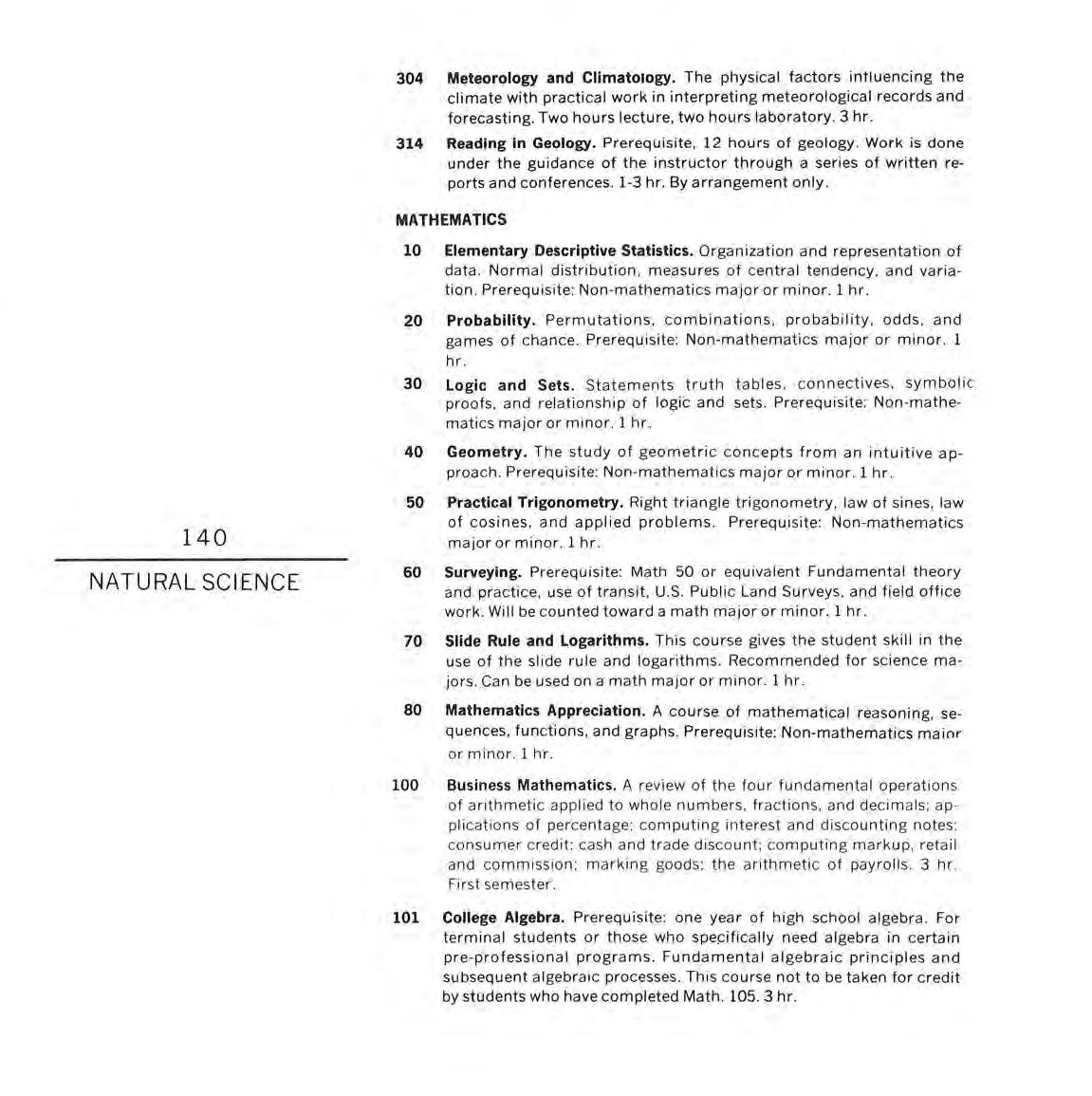
102
Introduction to Data Processing. An introduction to the concepts and basic features of e l ectronic computers. An overview of the makeup of computer systems and of the structure and usage of computer languages is presented. FORTRAN IV is used to illustrate the course and give the student direct computing experience. 3 hr.
105 Fundamentals of Mathematics. A course intended for tne student who plans to pursue a co ll ege program requiring a substantial amount of training in mathematics. The content of this course includes an introduction to symbo li c logi c and set theory of applications. a study of the number system, elementary theory of gro ups and fields, an introduction to the function concert, and study of a l gebraic functions. 5 hr. First semester.
106 Fundamentals of Mathematics. Prerequisite: Math. 105. Content inc ludes the study of trigonometri c, exponentia l and logarithmic function s , and introduction to analytic geometry , and some calculus. 5 hr. Second semester.
200 Basic Concepts of Mathematics. An introduction to the various numbe r bases and the development of concepts fundamental to each. Other topics included are: elementary set theory, algebra, geometry, and problems related to the field of business; does not apply on the mathematics major. 3 hr. Second semester .
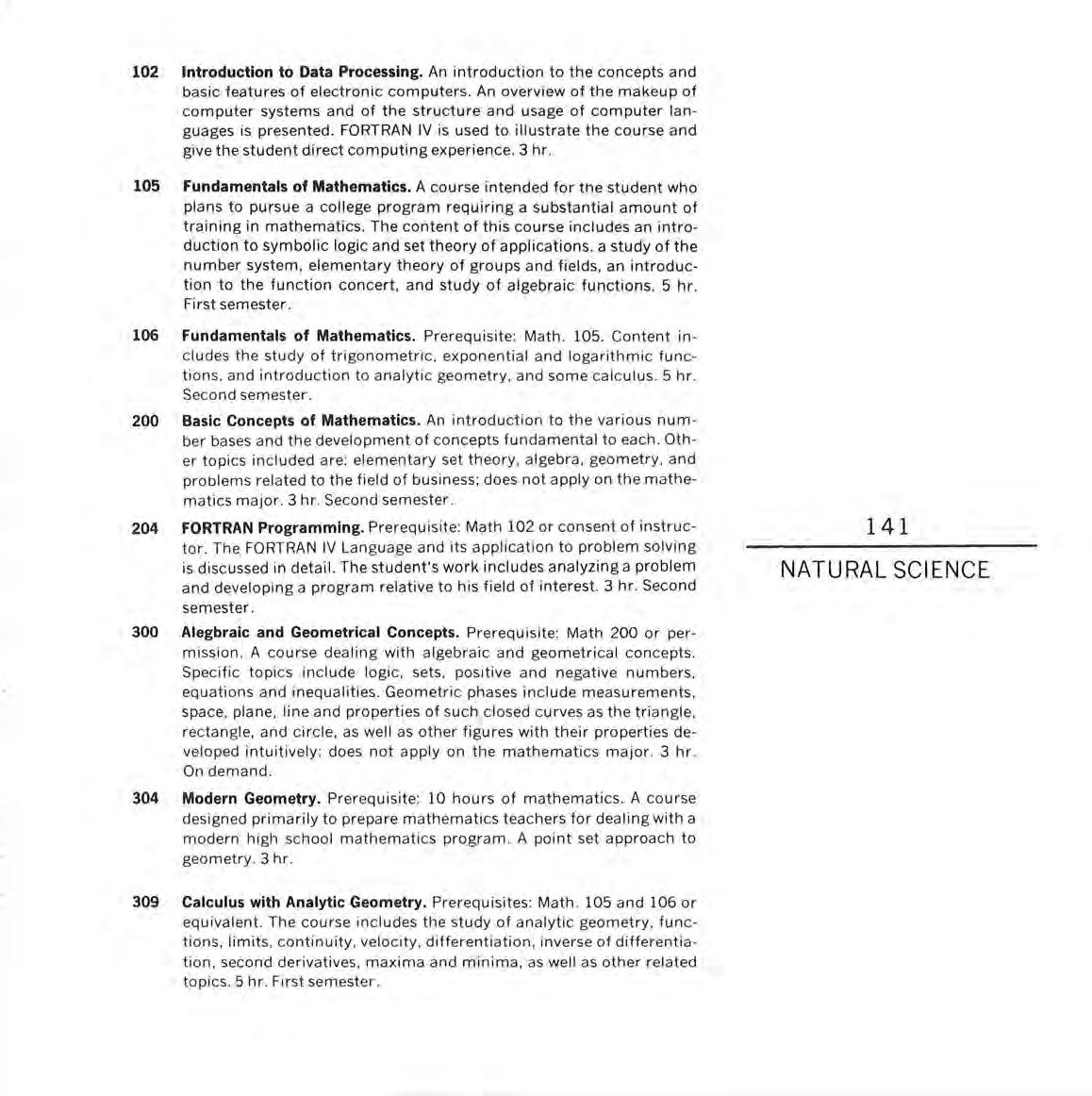
204 FORTRAN Programming. Prerequisite: Math 102 or consent of instructor. The FORTRAN IV Language and its application to problem solving is discussed in detail. The student's work includes ana ly zing a problem and developing a program relative to his field of interest . 3 hr. Second semester.
300 Alegbraic and Geometrical Concepts. Prerequisite: Math 200 or permission. A course dealing with a l gebraic and geometrical concepts . Specific topi c s include logic, sets, positive and negative numbers , equations and inequa li ties. Geometric phases include measurements , space, plane, lin e and properties of such c l osed curves as the triangle, rectangle, and circle, as well as other figures with their properties developed intuitively; does not apply on the mathematics major 3 hr. On demand.
304 Modern Geometry. Prerequisite: 10 hours of mathematics. A course designed primarily to prepare mathematics teachers for dealing with a modern high school mathematics program . A point set approach to geometry 3 hr.
309 Calculus with Analytic Geometry. Prerequisites: Math. 105 and 106 or equivalent. The course includes the study of analytic geometry, function s, lim its, continuity, ve l ocity , differentiation, inverse of differentiation, second derivatives, maxima and minima, a s well as other related topics. 5 hr. First semester.
310 Calculus with Analytic Geometry. Prerequisite: Math. 309 or equivalent. Topics include trigonometric functions, antiderivatives, the definite integra l , three-dimensional figures , trans l ation and rotation, exponential functions , hyperboli c functions, integration , polar coordinates, and related topics. 5 hr. Second semester.
311 Independent Study in Mathematics. Prerequisite: 15 hours in mathematics. By permission only. Special assignments, projects and reading to be arranged. 1-2 hr.
312 Calculus Ill. Prerequisites: Math. 309 and 310 or equivalent. Designed to give the student a rev i ew of ca lculus and app lyin g it to comp l ex problems in mathematics. 3 hr.
340 Statistics. A study of the methods of summarizing and interpreting data , elementary probability, and its relation to distributions. The meanings, importance, and app li cat ions of the normal and binomical distributions. The methods of random samp lin g, testing of hypotheses, analysis of paired data, and interpretation of standardized test scores . 3 hr. Second semester .
406 Modern Algebra. Prerequisites: Math 105, 106, 309 and 310 or equivalent. A study of various a l gebraic systems aris ing in modern mathematical computations Content includes a st udy of sets, mappings and operations , relations, development of real numbers systems, integral domains and fields, polynomial domains , and complex number field 3 hr.

407 Modern Algebra. Continuation of Math. 406. A study of groups, vector spaces, linear transformations and matrices, linear equations and determinants, linear a l gebras , rings and Boolean a l gebras. 3 hr.
416 Differential Equations. Formation of differential equations, equations of high order , linear equation with constant and variable co-efficients, partial differentiation , application of geometry, mechanics, and physics. Student must have proficiency in ca l culus. 3 hr. On demand.
417G Introduction to Real Analysis. Prerequisite: Math. 310. Topics in cluded are number , limits, convergence , continuity differentiability, the Riemann integral, sequences, series , and special functions of the Real Calculus. 3 hr.
418G Linear Algebra. The theory of linear transformations in vector spaces, the representation of linear spaces in matrices, lin ear functionals , and the app li cation of these concepts 3 hr.
419G Topology. A modern treatment of topology with emphasis on fundamental concepts and principal results of homology theory, topologica l spaces , lin ear graphs, set theory, metric interpretation, as well as other related topics. 3 hr.
201 General Physics. Prerequisite: Mathematics 105. Three hours classwork , two hours laboratory, Mechanics, sound, and heat. 4 hr First semester.
202 General Physics. Prerequisite: Physics 201 or permission. Three hours classwork, two hours lab oratory. Light , electricity, and magnetism. 4 hr. Second semester.
302 Analytical Mechanics. Prerequisites: Physics 202 and Math 310. The development of the principles of mechanics by the use of calculus and vector ana ly sis. 3 hr.
304 Elements of Optics. Prerequisite: Physics 202. Three hours classwork, two hours laboratory. Geometrical optics, physical optics, quantum optics, optical instruments , and polarization. 4 hr.
306 Astronomy. A basic course dealing with a study of the heavenly bodies, the solar system, and the universe. Telescopic observation is a part of this course. 3 hr. On demand.
307 Introduction to Modern Physics. Prerequisites: Physics 202 and Chemistry 101. Three hours classwork , two hours laboratory. Atomic and nuclear relativity, Bohr atom theory, quantum theory , X-rays, nuclear instruments, radioactivity, nuclear reactions, and elementary particles 4 hr
310 History and Literature of Physics. Work to be done under the guidance of the instructor through a series of reports and conferences. 1-2 hr . Each semester and summer. By arrangement.
328 Electronics. Prerequisite : Physics 202. See 1. A. 328.
341 Electromagnetic Theory. Prerequisites : Physics 202 and Math 309, Electric and magnetic theory, wave propagation, A.C. and D.C. circuit theory, magnetic induction , dielectrics, Gauss ' law, and Maxwell's equations . 3 hr.
400 Thermodynamics. Prerequisites: 15 hours of physics and Math 310. A study of temperature and thermometry, the laws of thermodynamics and their applications, and an introduction to kinetic theory 3 hr
401 Independent Study in Physics. Individual projects of a labo r atory and library nature for qualified physics students By special permission only. 1-3 hr .
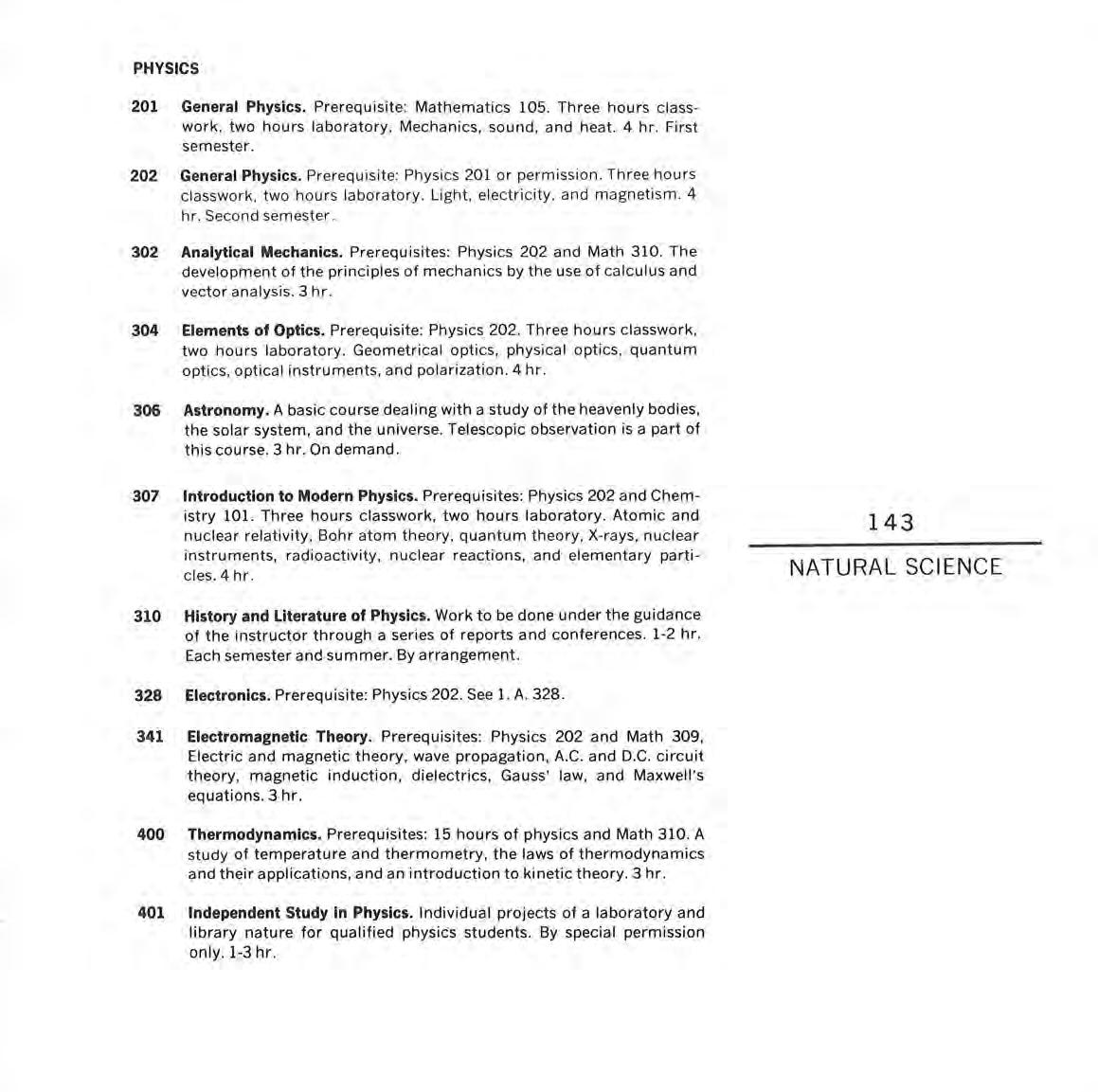
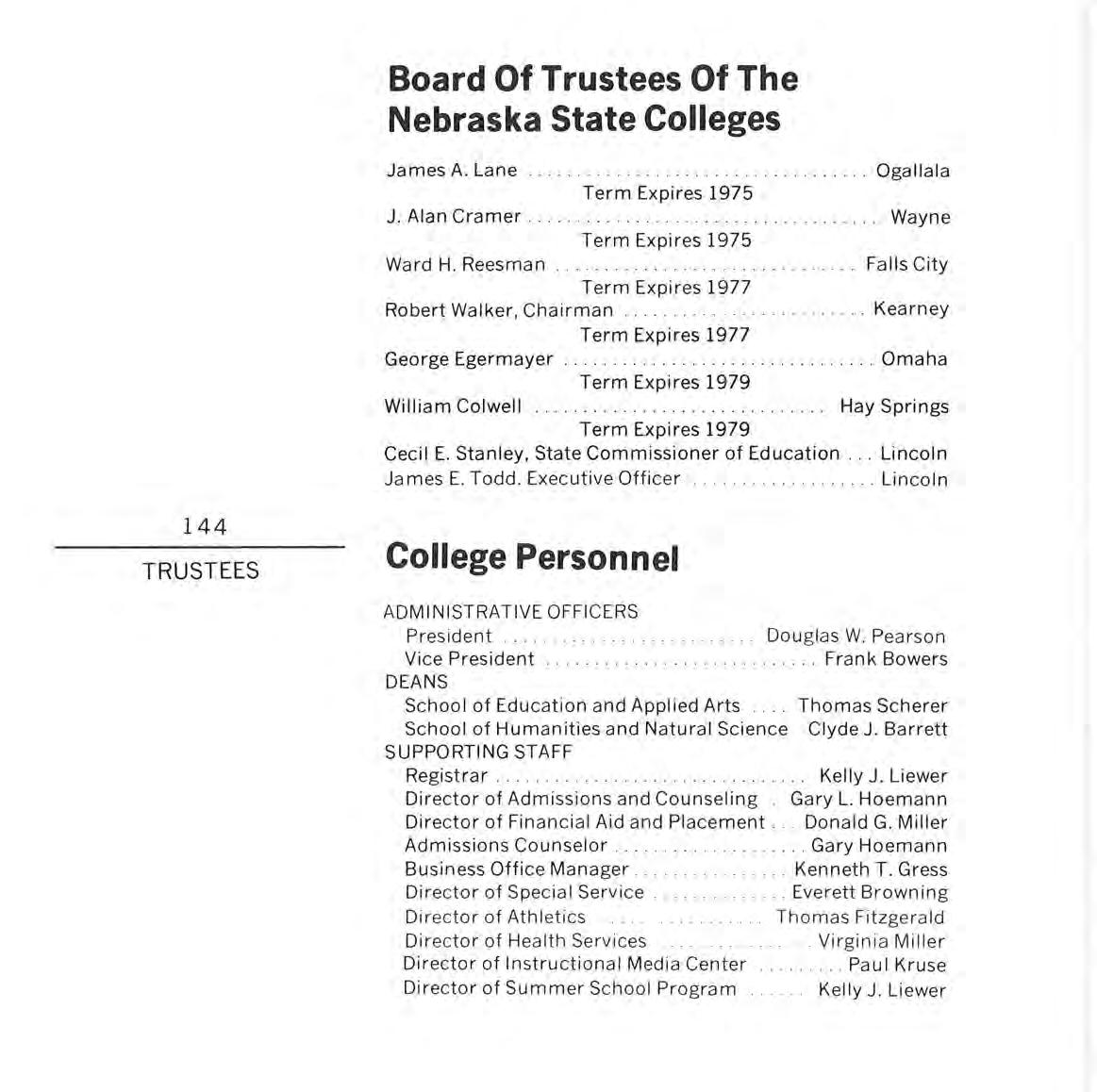
James A. Lane
J. Alan Cramer
Term Expires 1975
Term Expires 1975
Ogallala
Wayne
Ward H. Reesm a n . . . Falls City
Term Expi r es 1977
Robert Walker, Chairman . . . . . . . . . . . . . . Kearney
Term Expires 1977
George Egermayer . .... ..... .
Term Expires 1979
William Colwell
Term Expires 1979
... . Omaha Hay Springs
Cecil E. Stanley, State Commissioner of Education Lincoln
J a mes E Todd Exec utive Offi ce r Lin co ln
ADMINISTRATIVE OFFICERS
Pre s ident
Vice President
DEANS
School of Educ at ion and Applied Arts
Dou g las W. Pearson
Frank Bowers
Thomas Scherer
School of Hum a nities and Natural Science
SUPPORTING STAFF
Registrar ..
Dir ec tor of Admi ss ions and Counseling
Dire ctor of Fin anc ial Aid and Pl ace ment .
Admission s Counselor
Business Offi ce Manager
Dir ecto r of Special Service
Dire cto r o f Athletics
Dire c tor of Health Serv i ces
Dir ec tor of In st ru c tional M ed i a Center
Dire c tor of Summer School Pro gram
Clyde J . Barrett
Kelly J . Liewer
Ga ry L. Hoem a nn
Donald G. Miller
Gary Hoemann
Kenneth T Gress
Ev erett Browning
Thomas Fitzgerald
Virginia Miller
Pa ul Kru se
Kelly J Li ewe r
Director of Physical Plant
Librarian .
Assistant Librarian
Reference Librarian
Director of Data Processing .
Director of Student Teaching. Residence Director,
Delzell Hall
Residence Director , Morgan Hall
...... . . . . .... .....
Residence Director , ClayburnMathews Hall
Residence Director, DavidsonPalmer Hall
. George Wendel . ...
Faye M. Brandt
Sharon Mccaslin
Paul Kruse
Stanley Mccaslin
Lloyd Kite
Mrs. Linda Schnaser
Miss Adrienne Berger
Mrs. Florence Johnson
Mrs Susan Hallock
Auxiliary Residence Director Mrs Loretta Lutt
Auxiliary Residence Director. Mrs . Helen Algood
Director of Student Personnel Services Guy L. Rosenberg
Director of Housing and Student Activities .... John D. Letts
Manager of Bookstore Mrs. Karlene Sherwood
Manager of Food Service. Merle Huber
Director of Intramural Athletics Thomas Fitzgerald
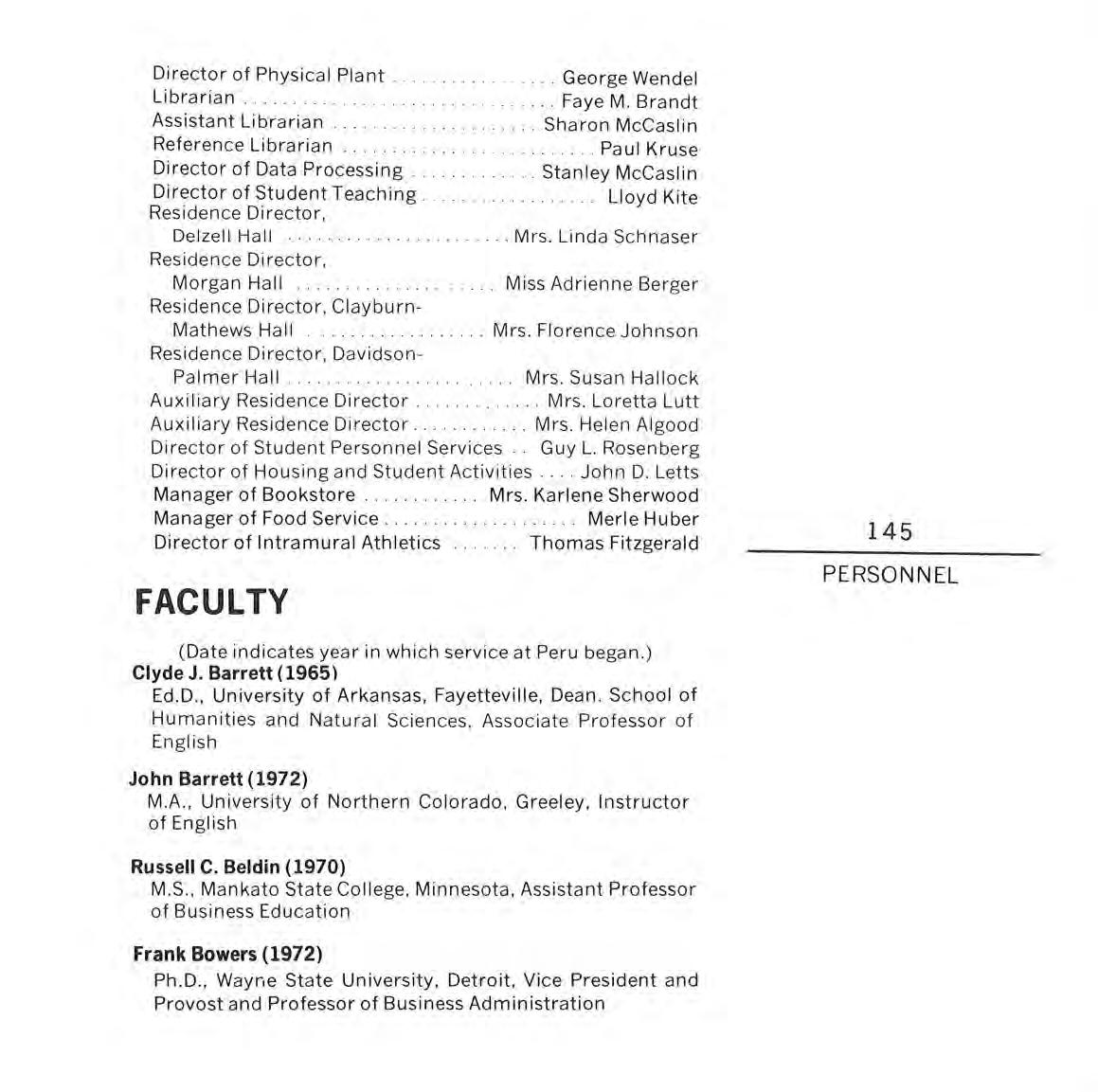
(Date indicates year in which service at Peru began.)
Clyde J. Barrett (1965)
Ed.D . , University of Arkansas, Fayetteville, Dean . School of Humanities and Natural Sciences, Associate Professor of English
John Barrett (1972)
M.A., University of Northern Colorado, Greeley, Instructor of English
Russell C. Beldin (1970)
M .S. , Mankato State College, Minnesota, Assistant Professor of Business Education
Frank Bowers (1972)
Ph.D. , Wayne State University, Detroit, Vice President and Provost and Professor of Business Administration
145
PERSONNEL
Juanita Bradley (1956)
M.A., George Peabody College for Teachers, Nashville, iennessee, Associate Dean of Students , Associate Professor of Education
Albert 0. Brady (1957)
M.A ., University of South Dakota, Vermillion, Associate Professor of Biological Science
Faye M. Brandt (1960)
M.A . L.S., Denver University, Colorado, Librarian, Associate Professor of Library Science
Everett W. Browning (1969)
M.S ., Kansas State University , Manh a ttan, In structor of En g lish and Journalism and Dire cto r of Special Service s.
Edward G. Camealy (1960)
M S., University of Illinois, Champaign-Urbana, Direct o r of College Choir, Associate Professor of Voice
Michael Currier (1973)
M.S ., University of Neb raska at Omaha, Nebrask a, Assi stant Prof essor of Element ary Educ at ion .
Martin Dwine (1973)
M S. , Bemidj i State , Minnesota. In st ructor of Phy s i ca l Education .
Tom J. Fitzgerald (1967)
M .S., Kansas State Teachers College, Emporia, Chai r man, Department of Physical Education, Director of lntrat'nural Athletics , Assistant Professor of Physical Education, Assistant Football and Head Baseball Coach
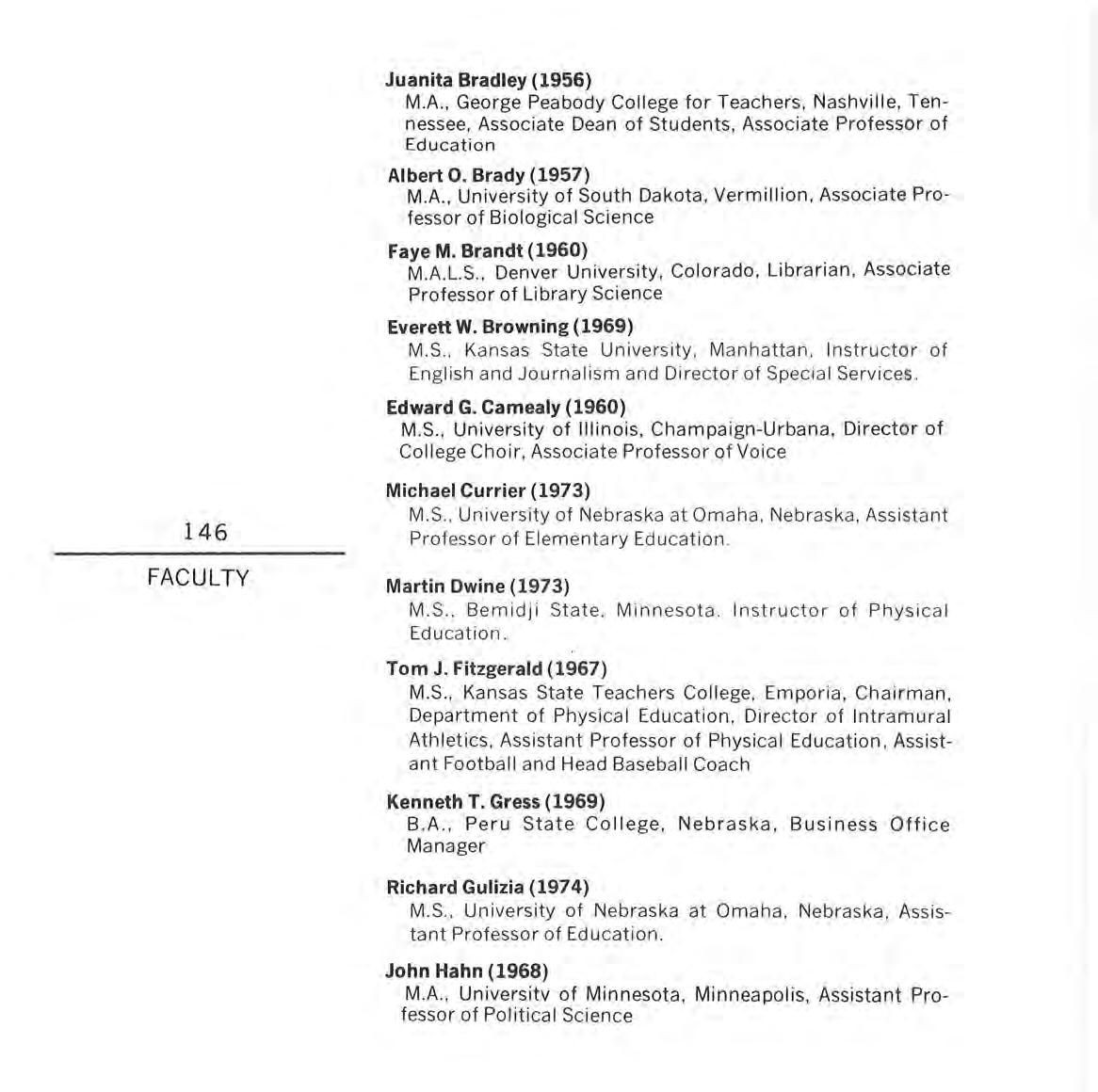
Kenneth T. Gress (1969)
B . A . , Peru State College, Nebraska, Business Office Manager
Richard Gulizia (1974)
M S , University of Nebraska at Omaha, Nebraska, Assistant Professor of Edu ca tion.
John Hahn (1968)
M.A., Universitv of Minnesota, Minneapolis, Assistant Professor of Political Science
Fredrick Hamann (1973)
M.S. Fort Hayes State College, Kansas, Assistant Professor of Science
Jack Hamilton (1972)
M.S., Kansas State College, Pittsburg, Instructor, Vocational Business Education
Wreathea Hicks (1968)
M.A., Kansas State Teachers College, Emporia, Instructor of English
Gary Hoemann (1972)
S.S., Peru State College, Nebraska, Director of Admissions and Counseling
D. V. Jarvis (1948)
M.E., Colorado State University , Fort Collins, Associate Professor of Industrial Arts
Louise Kregel (1957)
M.S., University of Nebraska, Lincoln, Assistant Professor of Home Economics
Pau1Kruse(l969)
M.S , Emporia State, Kansas, Reference Librarian, Director of Instruction al Media Center, Assistant Professor of Library Science
William D. Landis (1972)
Ed . D., University of Nebraska, Lincoln. Associate Professor of Education
John D. Letts (1973)
B.A., Chadron State Co ll ege , Nebraska , Director of Housing and Student Activities
Robert Lewellen (1972)
M .S., Northwest Missouri State, Maryville, Instructor, Business Administration
Kelly Liewer (1968)
Ed . D., University of Nebraska, Lincoln, Registrar
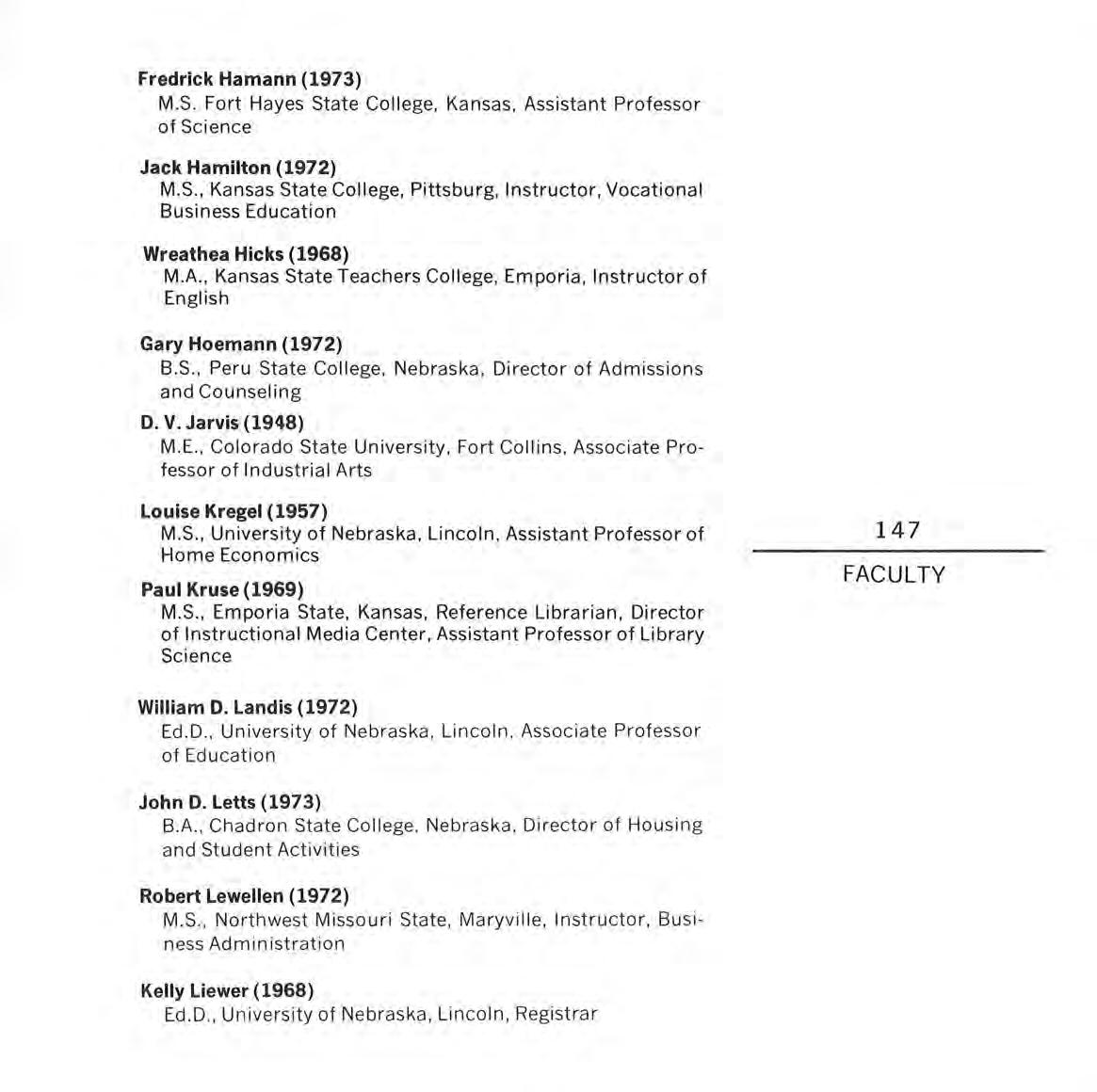
Daryl C. Long (1967)
Ph D., University o f Ne br as ka , Lincoln , Assi stant Profe sso r of Science a nd Mathematics
Sharon Mccaslin (1971)
M L. , Kansas State Teachers College , Emporia , Assist a nt Libr a rian
Stanley Mccaslin (1971)
M .S., California Institute of Technology , Pas ade na, Instructor of Data Proc es sing
Lyle C. McKercher (1959)
M.S ., University of Iowa , Iowa City, Associate Professor of Mathemati cs
Mary Jo Mier (1973)
M.S. , Northwestern Missouri State, Missouri, Instru c tor of Physical Education
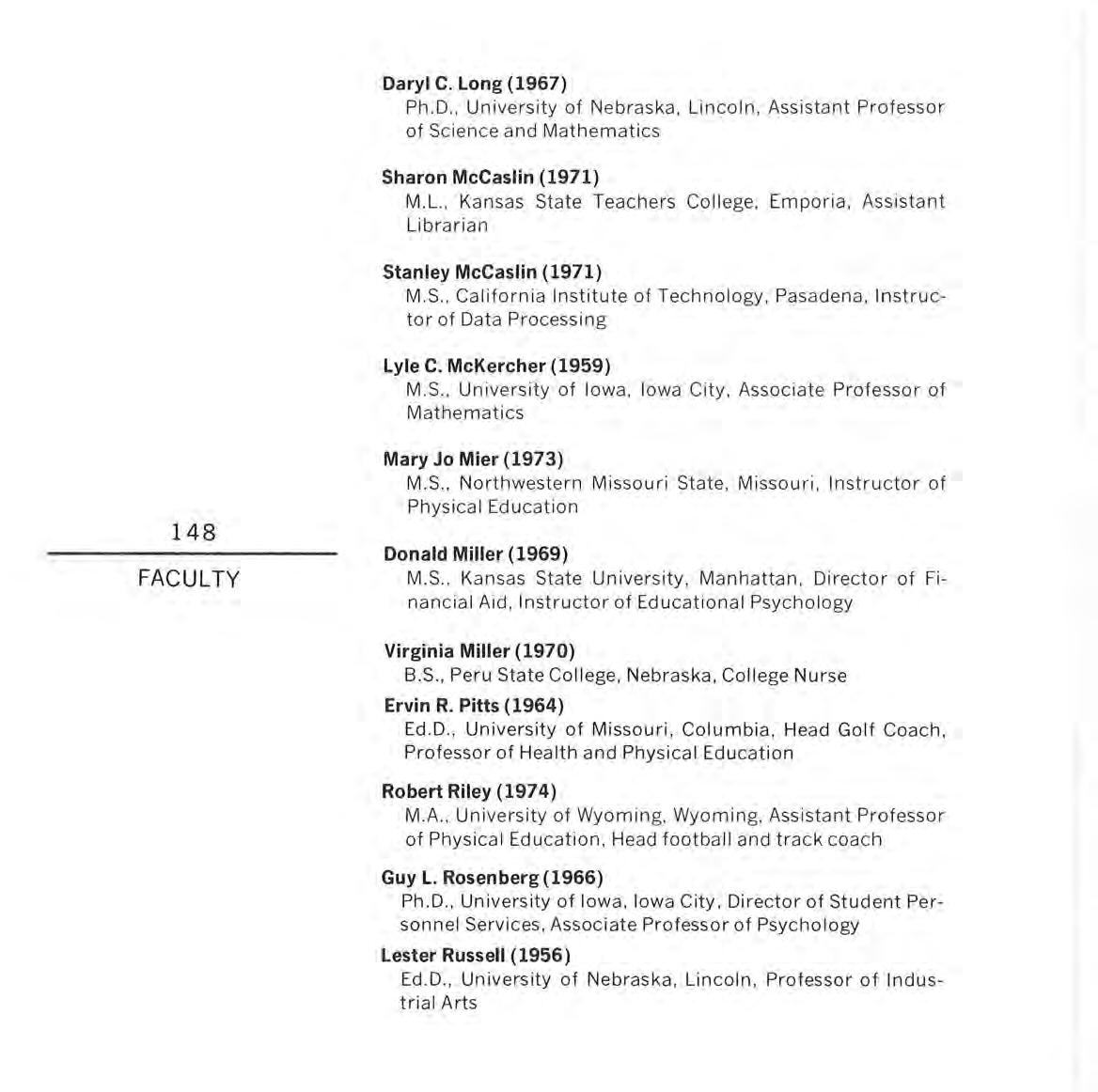
Donald Miller (1969)
M.S, Kans as State University , Manhattan, Dire cto r of Financial Aid, Instructor of Educational Psychology
Virginia Miller (1970)
B.S ., Peru State College, Nebraska , College Nurse
Ervin R. Pitts (1964)
Ed D., University of Missouri, Columbia , Head Golf Coach, Professor of Health and Physical Education
Robert Riley (1974)
M . A. , University of Wyomin g , Wyomin g, Assistant Profes sor of Physical Education, Head football and track coach
Guy L. Rosenberg (1966)
Ph.D., University of Iowa , Iowa City, Director of Student Personnel Services , Associate Professor of Psy c hology
Lester Russell (1956)
Ed . D., University of Nebraska, Lincoln , Professor of Industrial Arts
Thomas Scherer(1969)
Ph D., University of Wyoming, Laramie , Dean of Education and Applied Arts , Assistant Professor of Education
RogerSchnaser(1974)
M.A., University of Northern Colorado, Colorado , Instructor of Physical Education and Administration Assistant
George Schottenhamel (1957)
Ph.D ., University of Illinois, Urbana , Professor of History and Social Sciences
Leland H. Sherwood (1963)
Ed.D ., Indiana University, Associate Professor of Art
Evan Van Zant (1961)
M.A . , University of Nebraska, Lincoln, Associate Professor of Education
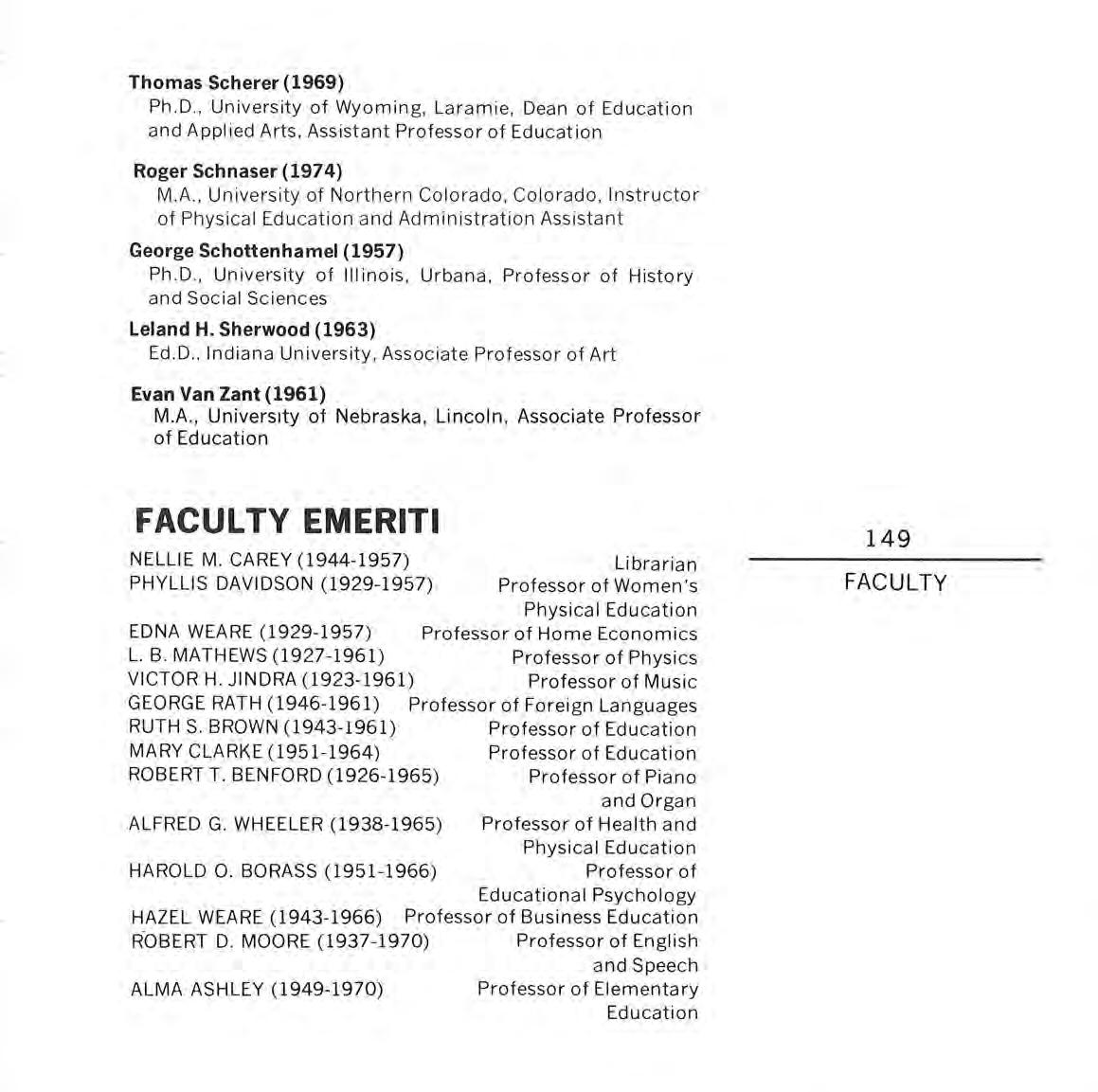
NELLIE M . CAREY (1944-1957)
PHYLLIS DAVIDSON (1929-1957) Librarian Professor of Women ' s Physical Education
EDNA WEARE (1929-1957) Professor of Home Economics
L. B. MATHEWS (1927-1961) Professor of Physics
VICTOR H. JINDRA (1923-1961)
Professor of Music
GEORGE RATH (1946-1961) Professor of Foreign Languages
RUTHS. BROWN (1943-1961)
MARY CLARKE (1951-1964)
ROBERT T . BENFORD (1926-1965)
Professor of Education
Professor of Education
Professor of Piano
ALFRED G. WHEELER (1938-1965) and Organ
Professor of Health and Physical Education
HAROLD 0. BORASS (1951-1966) Professor of Educational Psychology
HAZEL WEARE (1943-1966) Professor of Business Education
ROBERT D. MOORE (1937-1970)
ALMA ASHLEY (1949-1970)
Professor of English and Speech
Professor of Elementary Education
FRIEDA D. ROWOLDT (1952-1970)
HANFORD MILLER (1947-1971)
HAROLD JOHNSON (1951-1972)
SILAS SUMMERS (1960-1972)
JOHN C. CHRIST (1947-1973)
LUCY HOVEY (1967-1973)
Professor of Business Education
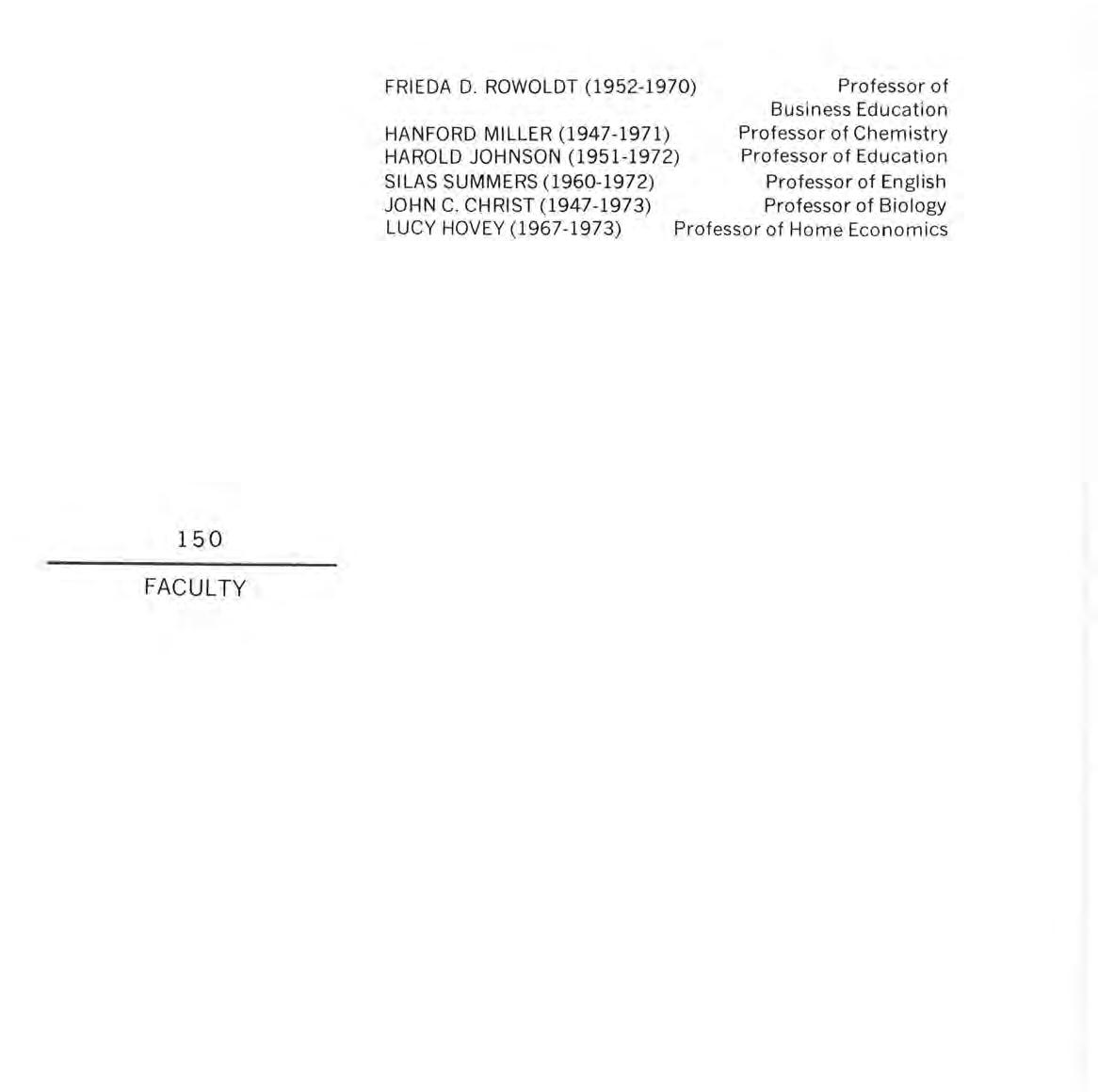
Professor of Chemistry
Professor of Education
Professor of English
Professor of Biology
Professor of Home Economics
Th e Council is the representative of the professional staff of the College and is concerned with the general welfare of the profe ss ional staff and the students. It establishes and revises all policies related to the internal affairs of the college.
The Commission carries on a continuous study of the instructional program and recommends policy to the College Affairs Council. It is concerned with interschool and interdepartmental coordination and relationships . The various instructional programs are evaluated in terms of accrediting standards and guidelines of national academic associations It evaluates the work and responsibility of its various committees.
The Committee reports regularly to the Academic Affairs Commission and recommends policy to the Commission. It serves in a liaison capacity between the Library and the faculty -student bodies . It advises in regard to the administration of the policies and regulations related to the Library , and makes suggestions regarding the services, the budget, purchases, allocation of funds, accreditation standards, and the over -all needs.
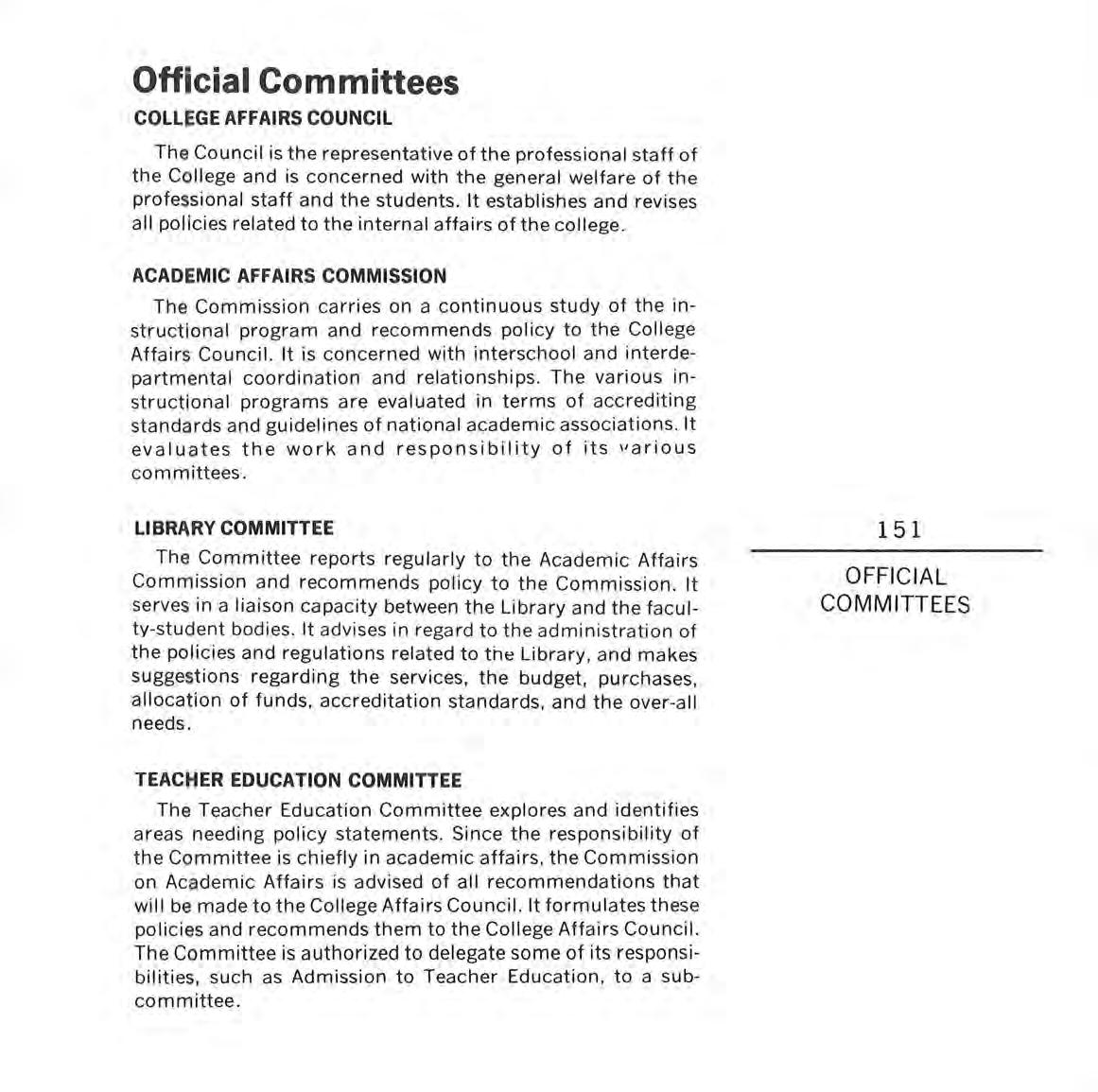
The Teacher Education Committee explores and identifies areas needing policy statements. Since the responsibility of the Committee is chiefly in academic affairs, the Commission on Ac a demic Affairs is advised of all recommendations that will be made to the College Affairs Council. It formulates these policies and recommends them to the College Affairs Council. The Committee is authorized to delegate some of its responsibilities, such as Admission to Teacher Education, to a subcommittee.
151 OFFICIAL COMMITTEES
The Committee advises the Director of Admissions on first time admissions as these may deviate from established policy, or may be irregular in any manner. It has the authority to act on all applications for readmission. The Committee administers policies regarding scholastic probation and/or suspension. It recommends policy to the Academic Affairs Commission.
The Commission recommends policy to the College Affairs Council. It interprets the philosophy and policy to students, faculty, parents, and the public . It provides for the centralized administration and coordination of all student personnel functions. The Commission serves as an appeal or hearing body on decisions related to non-academic matters of the student.
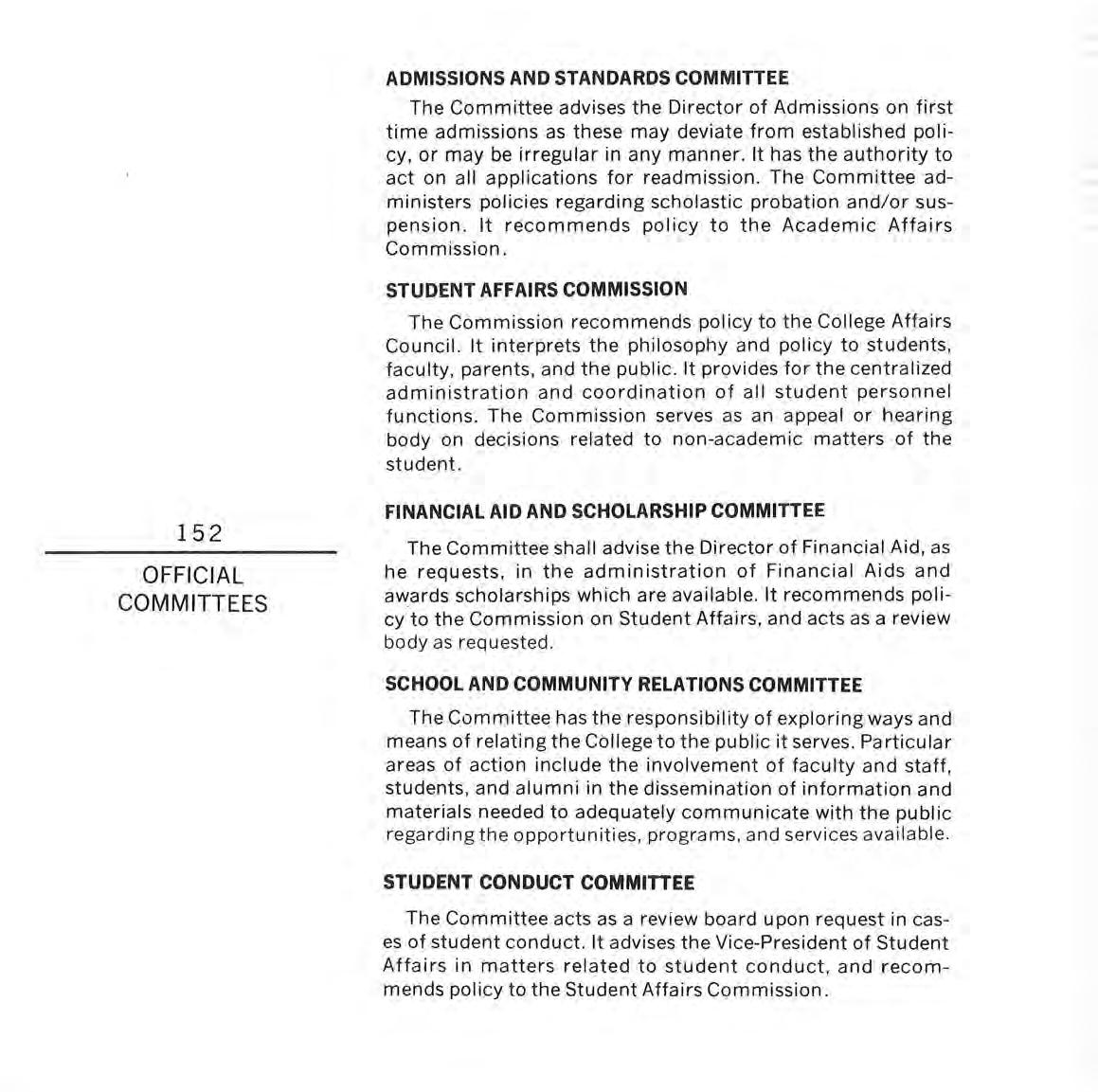
The Committee shall advise the Director of Financial Aid, as he requests, in the administration of Financial Aids and awards scholarships which are available . It recommends policy to the Commission on Student Affairs, and acts as a review body as requested.
The Committee has the responsibility of exploring ways and means of relating the College to the public it serves. Particular areas of action include the involvement of faculty and staff, students, and alumni in the dissemination of information and materials needed to adequately communicate with the pub I ic regarding the opportunities , programs, and services available
The Committee acts as a review board upon request in cases of student conduct. It advises the Vice-President of Student Affairs in matters related to student conduct, and recommends policy to the Student Affairs Commission.
The membership of the committee representing the Faculty Association consists of the Executive Committee of the Association. The chairman of the Executive Council is the chairman of this committee. The Committee concerns itself with both academic and personnel matters of the faculty and reports to either the Academic Affairs Commission or the College Affairs Council. The Faculty Association has the responsibility of assisting with the orientation of new faculty members, and assisting in the evaluation of objectives, policies, and with the professional growth and development of faculty members.
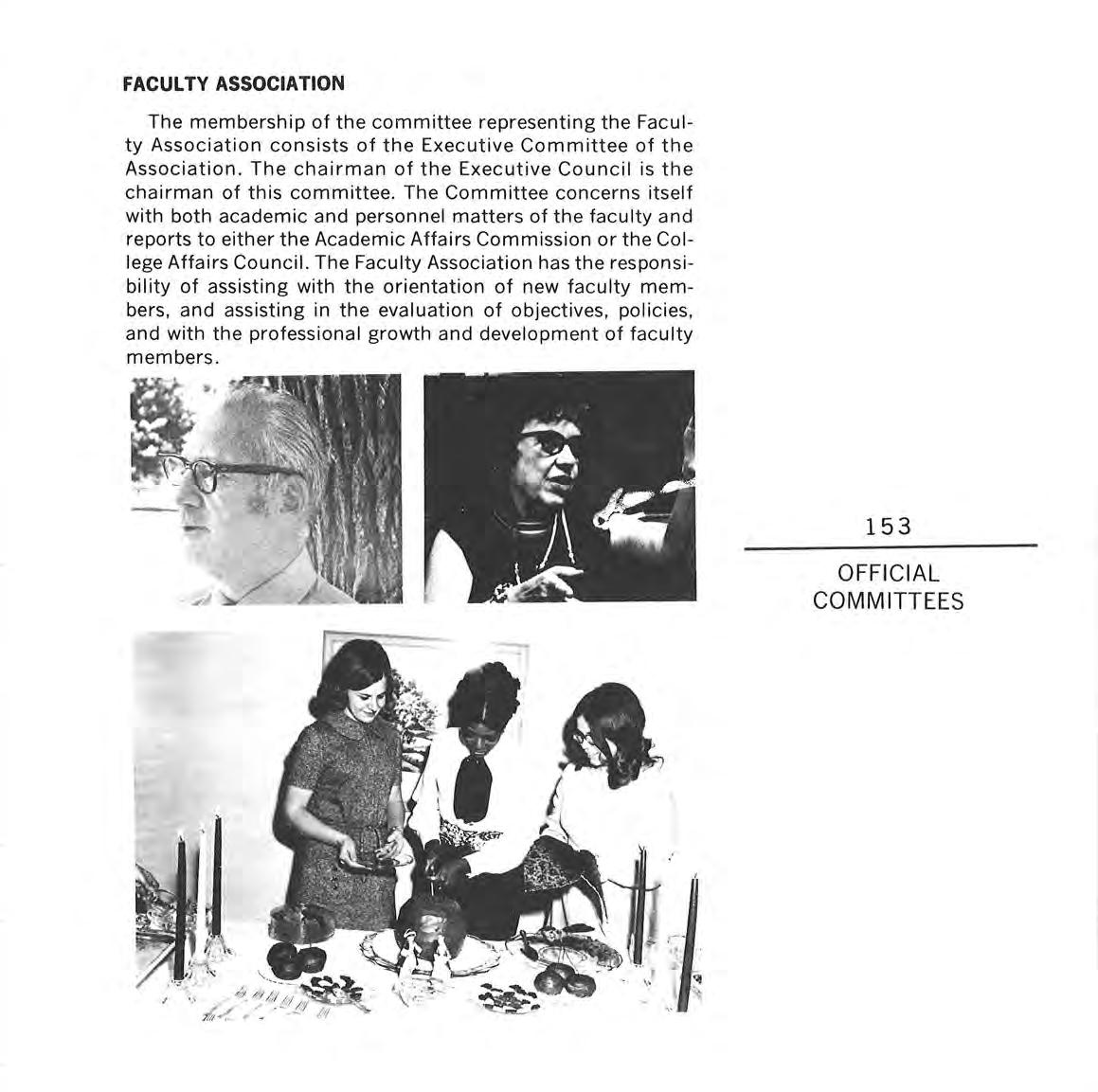
John L. Lewis ('48) President
Elaine Brier Gleason ('48) ...
Barbara Berger Johnson ('48) . . . . . . . Vice President . .... Secretary-Treasurer
in The Student Teaching Program
1974-1975
Auburn Albert C. Austin, Superintendent
Principal : Marvin H Gerdes
Beatrice Robert Cothren, Superintendent
Assistant Superintendent: W. A. Schlichting
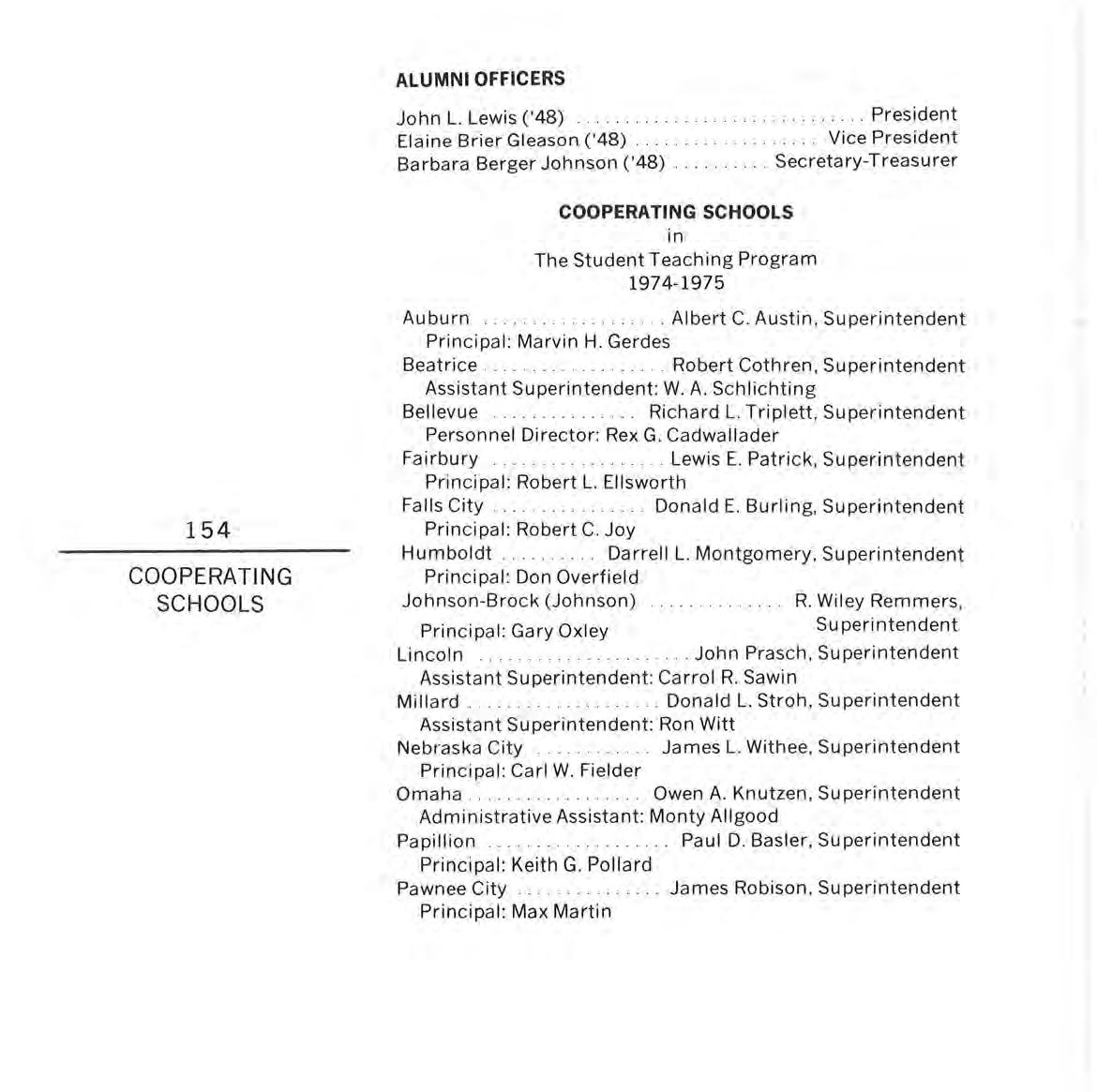
Bellevue Richard L. Triplett. Superintendent
Personnel Director: Rex G. Cadwallader
Fairbury ....... Lewis E. Patrick, Superintendent
Principal: Robert L. Ellsworth
Falls City . Donald E. Burling, Superintendent
Principal : Robert C. Joy
Humboldt Darrell L. Montgomery, Superintendent
Principal: Don Overfield
Johnson-Brock (Johnson) R. Wiley Remmers,
Principal: Gary Oxley Superintendent
Lincoln ......... John Prasch, Superintendent
Assistant Superintendent: Carrol R Sawin
Millard Donald L Stroh, Superintendent
Assistant Superintendent: Ron Witt
Nebraska City James L Withee , Superintendent
Principal: Carl W. Fielder
Omaha Owen A . Knutzen, Superintendent
Administrative Assistant: Monty Allgood
Papillion Paul D. Basler, Superintendent
Principal: Keith G. Pollard
Pawnee City James Robison, Superintendent
Principal: Max Martin
Plattsmouth Deward R. Finch , Superintendent
Principal: Fred Kaufman
Ralston Brice Stallard , Superintendent
Southeast Nebraska (Stella) Allan Lavigne, Superintendent
Principal: William Tempelmeyer
Springfield (Platteview) . Harold Luttman , Superintendent
Principal: Louis V Dambrosia
Syracuse - Dunbar -Avoca (Syracuse) Donald W Craig,
Principal: John Rhodus Superintendent
Tecumseh Richard A. Brommer , Superintendent
Principal : Donald Zeiss
Westside (Omaha) . H . Vaughn Phelps, Superintendent
Assistant Superintendent: Robert M . Adams
Farragut, Iowa Leo Humphrey, Superintendent
Principal : Lloyd Bishop
Fremont -Mills , Iowa (Tabor) . Wayne Burk. Superintendent
Principal : Verl Flack
Glenwu0d, Iowa . Earl L. Tubbs, Superintendent
Principal : Robert Blasi
Hamburg, Iowa .. ........ Ervin DeBoer, Superintendent
Principal: Gary Anderson
Lewis Central, Iowa (Council BluffsJ Frank L Lee ,
Principal : Clarence E. Miles Superintendent
Shenandoah, Iowa Kenneth W. Sand , Superintendent
Principal : Alvin S. Carlson
Sidney, Iowa Eugene Hess, Superintendent
Principal: Duane Ridnour
Rock Port. Missouri ......... Frank Rybnick, Superintendent
Principal : Gerald W. Shineman
COOPERATING AGENCY
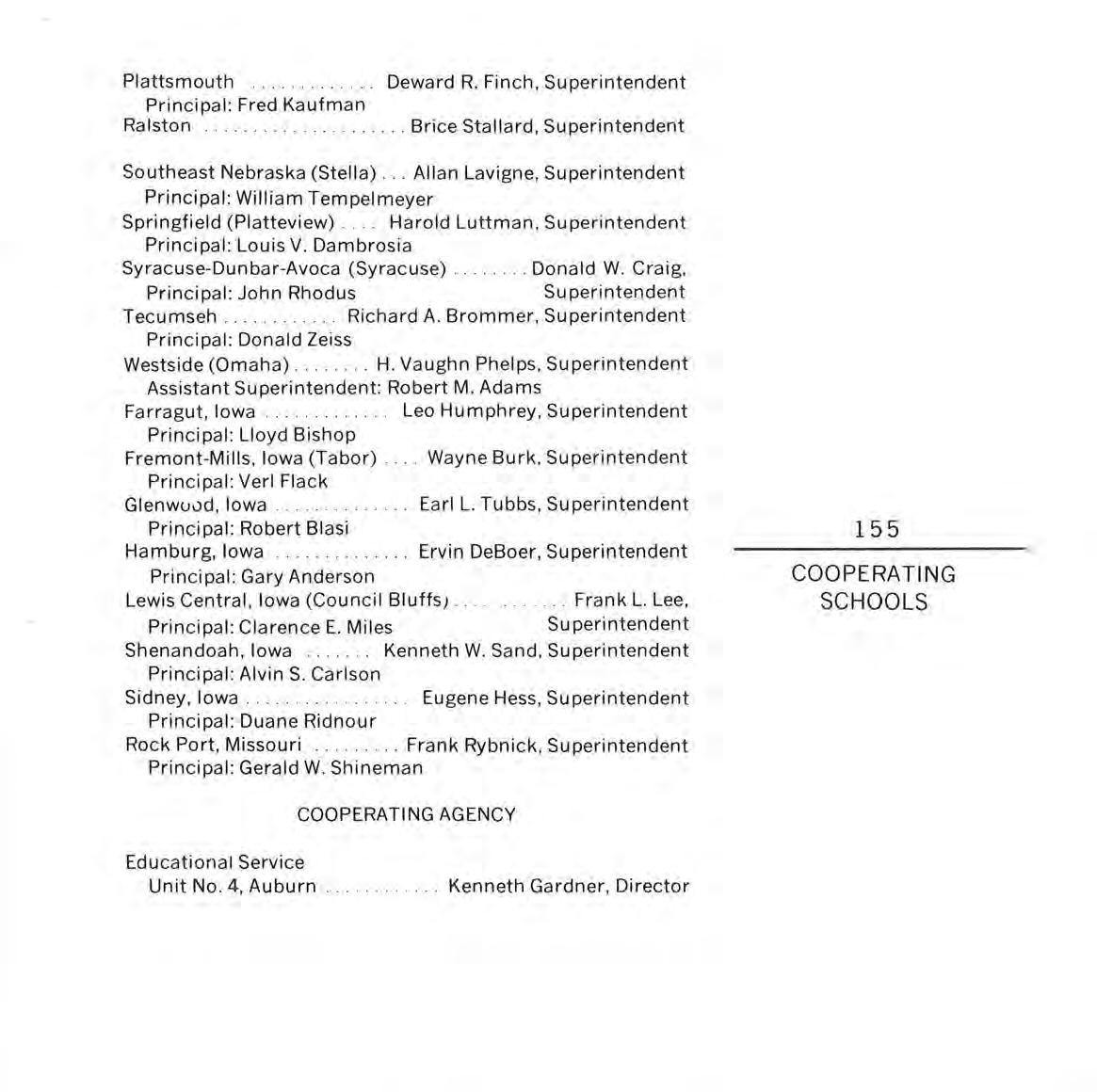
Educational Service
Unit No . 4, Auburn .. . ... . . . . . Kenneth Gardner, Director
155
COOPERATING SCHOOLS

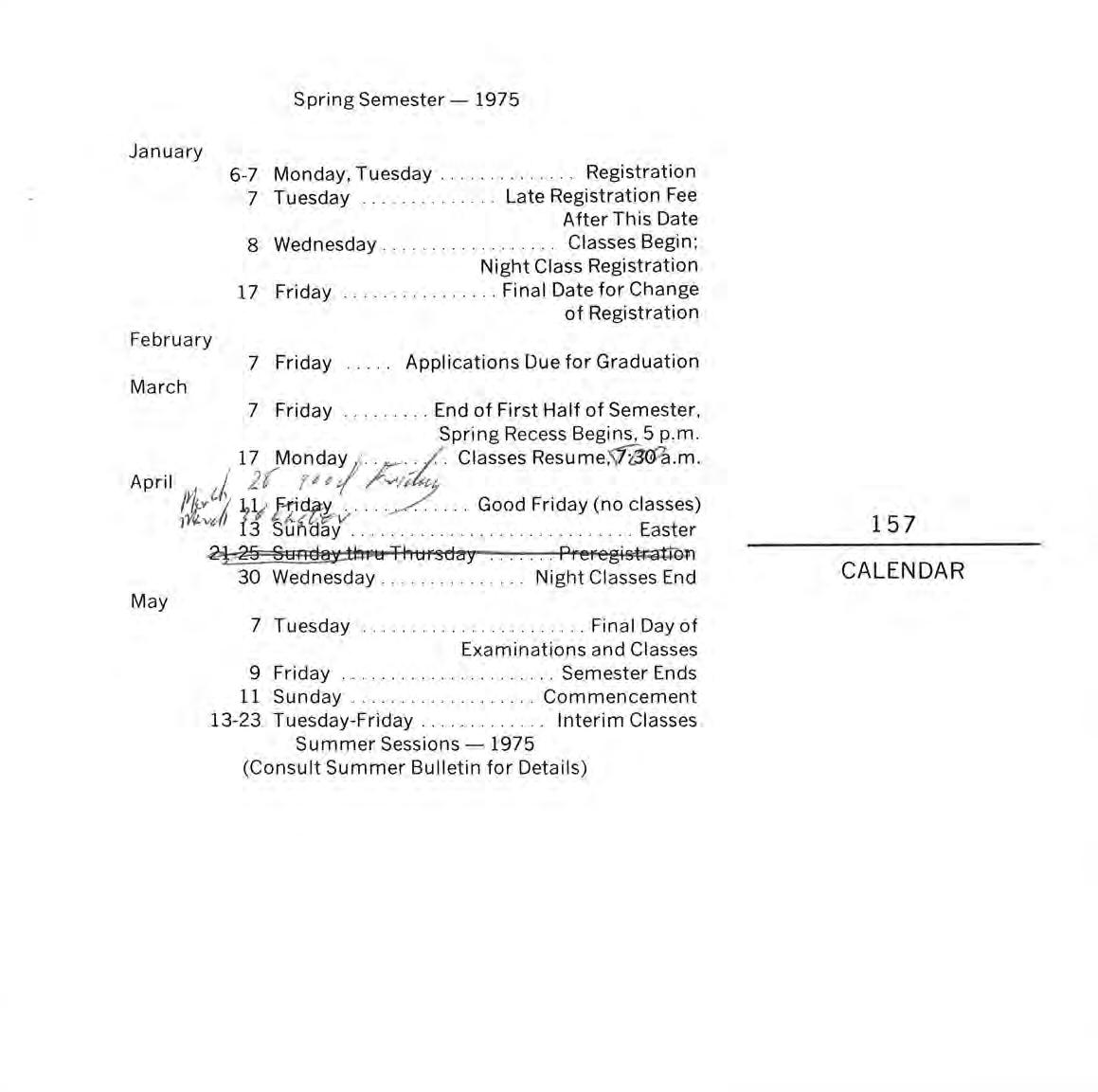
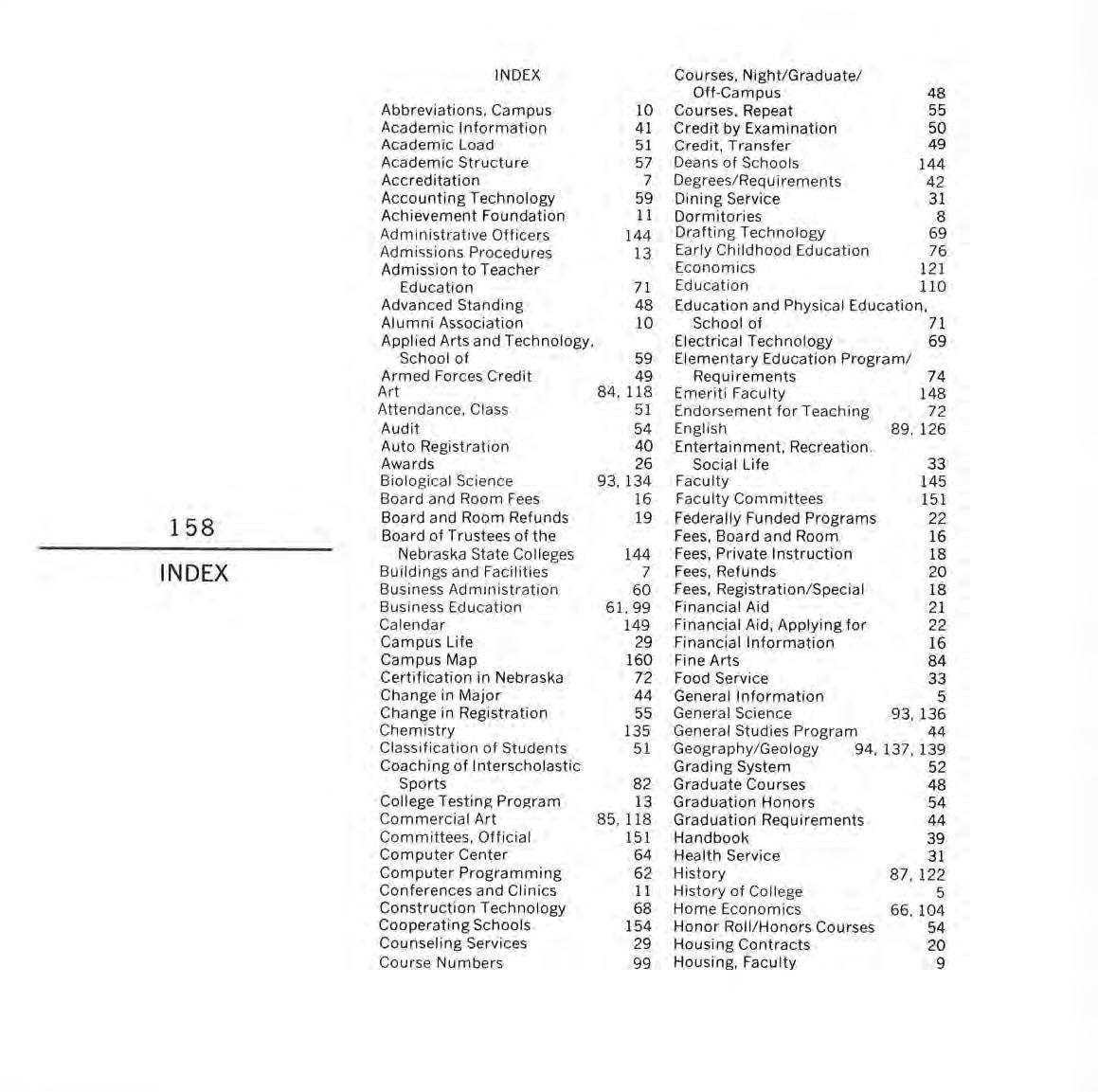
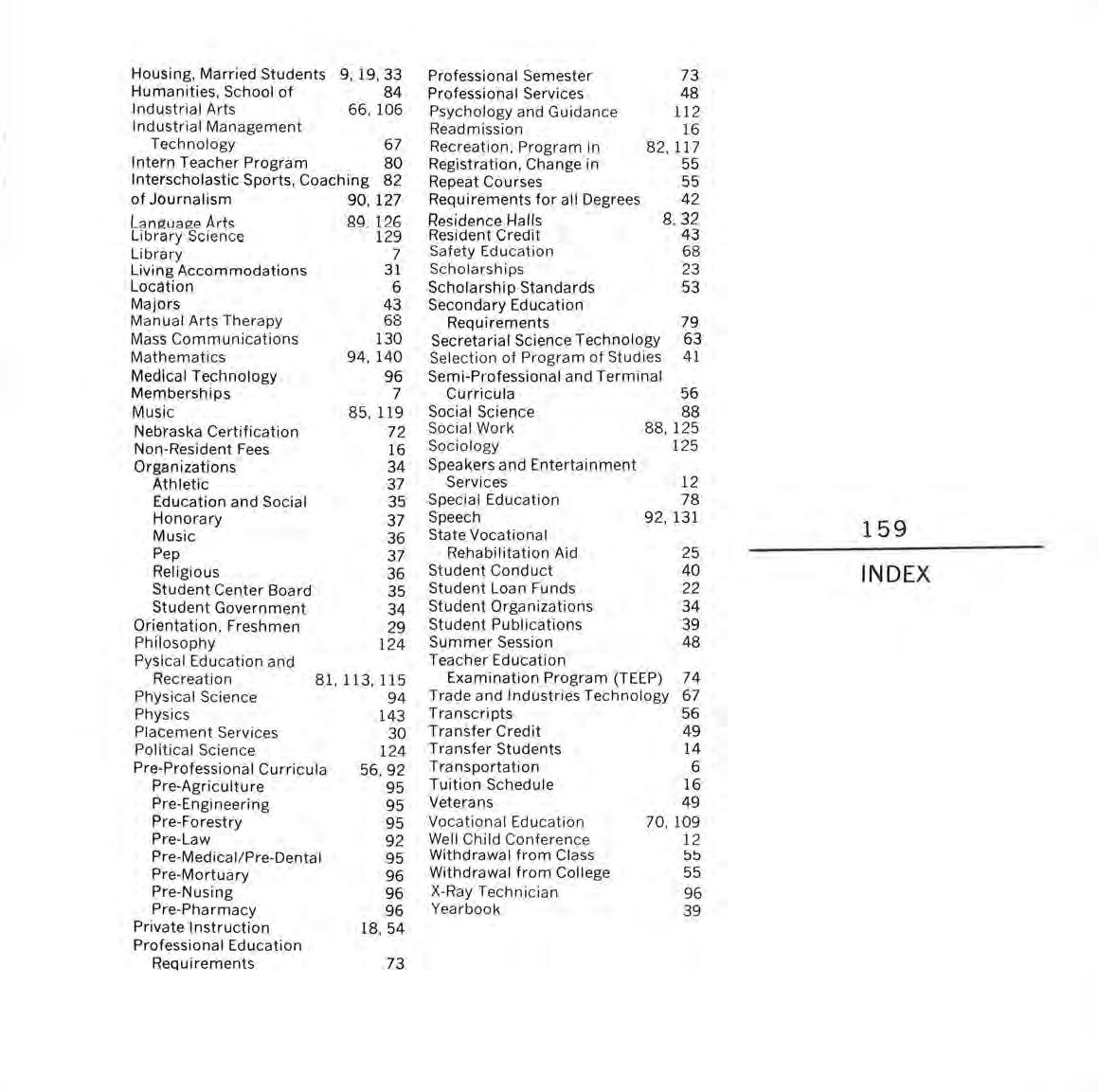
Peru State Co ll ege
Peru , Nebraska 68421
Serving State and Na tion Since 1867
INDEX OF BUILDINGS

1. Administration Building
2 Auditorium
3. Centennia l Residence Comp l ex
4 Delzell Men's Dormitory
5. Faculty Apartments
6. Fine Arts Center
7 . Greenhouse
8. Gymnasium
9. Hea Ith Center
10 . Hoyt Science Hall
11. Larson Indu strial Arts
12. Library
13. A. D. Majors Men ' s Dormitory
14 T. J. Majors Education Hall
15. Eliza Morgan Women's Dormitory
16. Oak Bowl Athleti c Fields , Dres sing Rooms
17. Oak Hill Married Student Housing
18. President's Home
19 Services, Heating Plant
20. Student Center
P. Parking
3. Centennial Residence Complex
(3 blocks south of main campus)
A Davidson E Nicholas
B Palmer F Pate
C Clayburn G Neal Dining Hall
D Mathews
